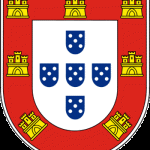|
So how has the lady lived for thousands of years?
|
|
|
|

|
| # ? Apr 25, 2024 20:03 |
|
Free to patronize whoever we want!Siegkrow posted:So how has the lady lived for thousands of years?
|
|
|
|
Siegkrow posted:So how has the lady lived for thousands of years? Explanations will be forthcoming. No need to worry.
|
|
|
|
My guess is a dream sequence or something scrawled on the walls of a cell by our favourite crazy monarch.
|
|
|
|
Nah, Civ takes place in a nightmare realm where humanity is forced to relive a jumbled recreation of the past for the amusement of cthonic and capricious gods. That's why there's win conditions and the nation leaders are seemingly immortal.
|
|
|
|
 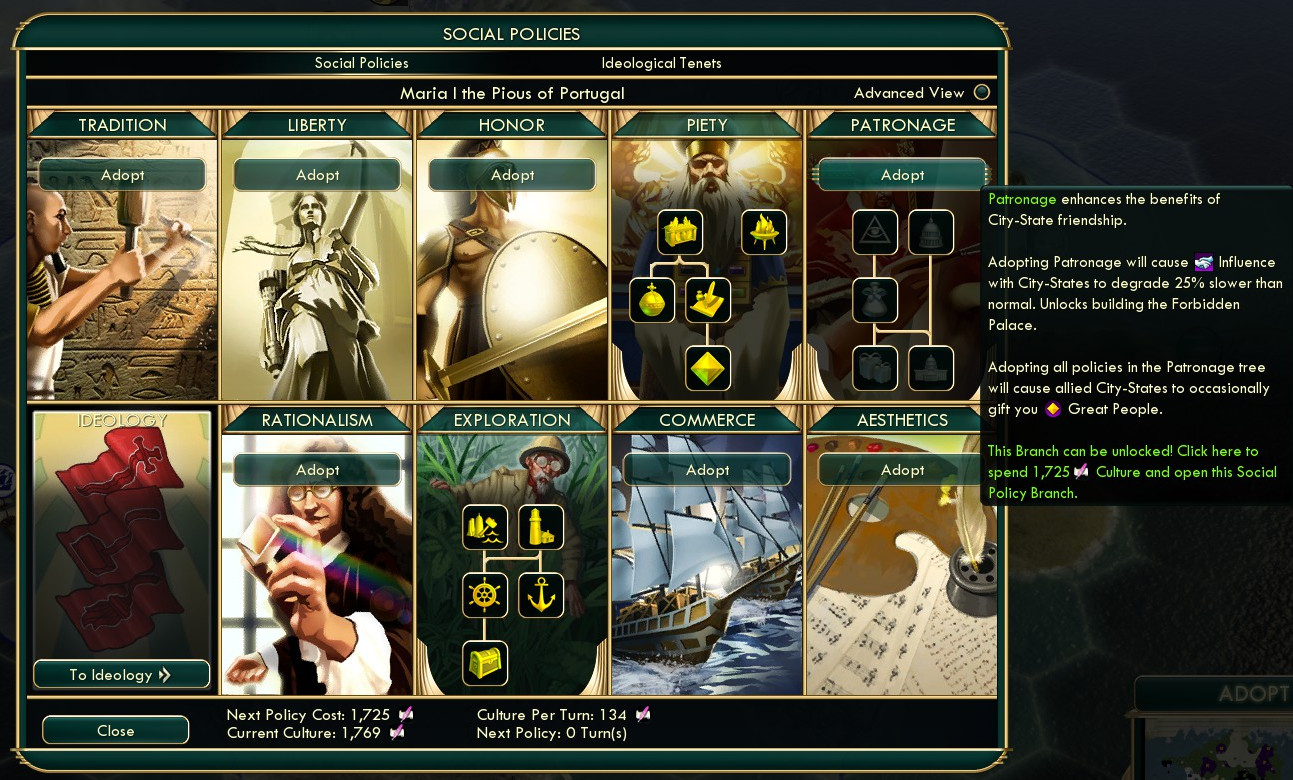 Dona Maria, recognizing that her people wished for freedom and peace for the foreseeable future, was prepared to take steps towards improving her appearance as a diplomat and stateswoman of renown.  She was also cognizant of the fact that the spread of Sebastianism formed a good opportunity to do just this, as her people might find common ground with like-minded thinkers around the world. 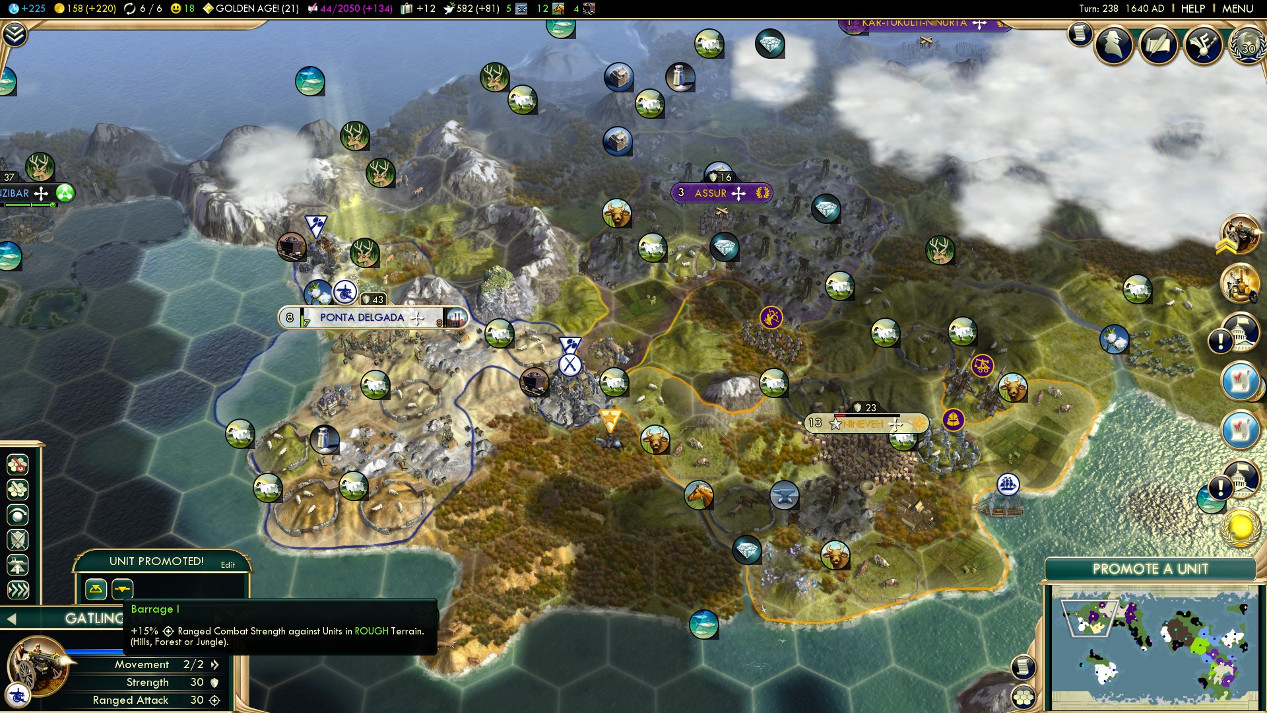 The Açores also saw to expanding their operations, using the new mounted guns purchased from Lisboan centres in order to fund an increasingly furious private army conprised largely of displaced Assyrians and Afghani.  Venice, however, was continuing along a path of peaceful seclusion, and seemed to approve of steps the Portuguese were taking to enable that lifestyle. 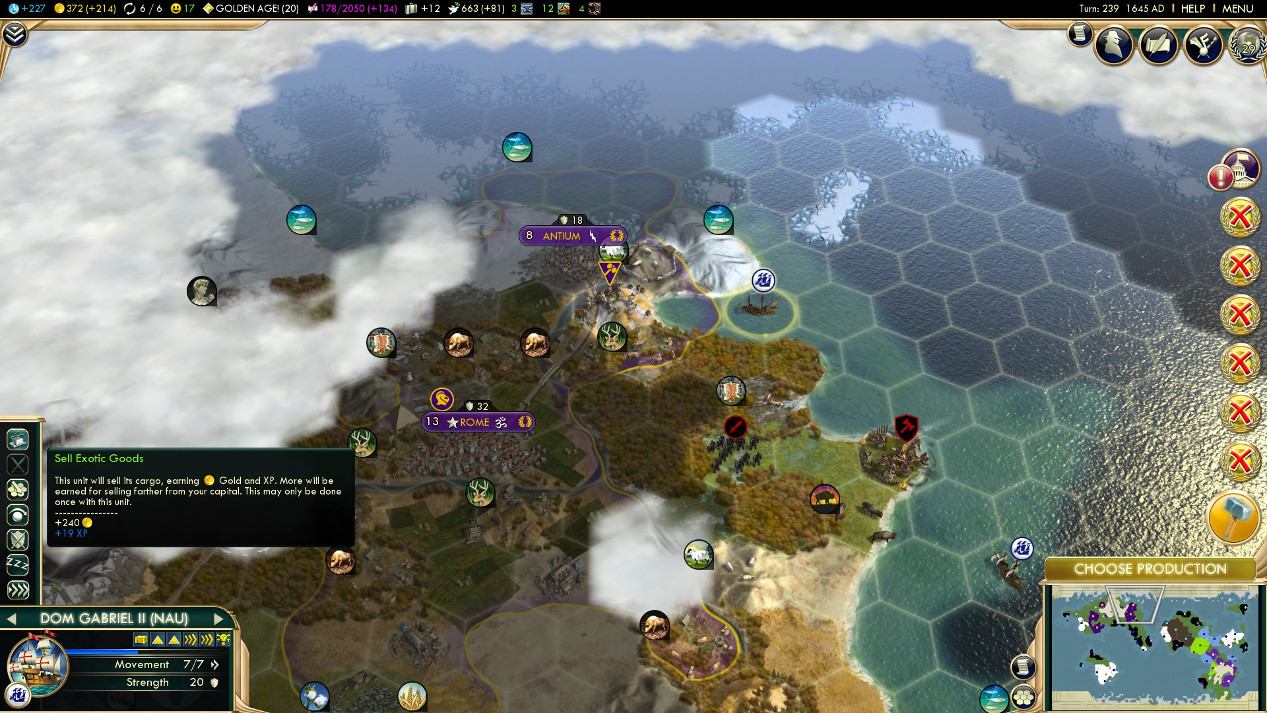 The Dom Gabriel II conducts a trading mission close to a Roman city in the interest of developing more intelligence around the circumstances of the Roman people. What they discover is a populace impoverished in manpower and morale by the efforts in overtaking an entire other empire.  However, the Romans were nothing if not determined, and there would be no more miracles for Nineveh. Dona Maria found herself out of contact with one of her oldest friends, and her sorrow at the loss was palpable even in Portuguese times of celebration.  The Roman, for his part, seemed eerily good-natured about the whole affair, and one could imagine him inebriated from the feeling of conquest while his people starved. 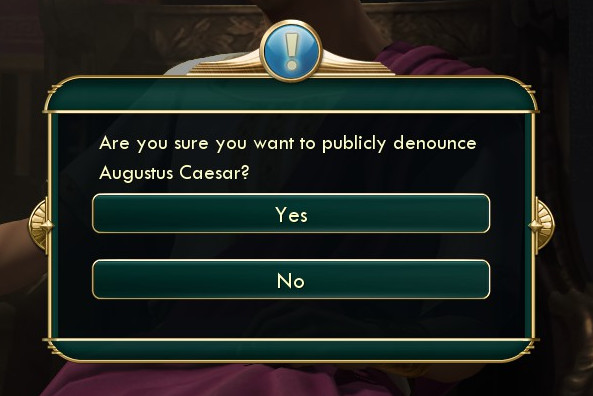 His behaviour, however, would be revealed to the world for the sociopathy that it was. 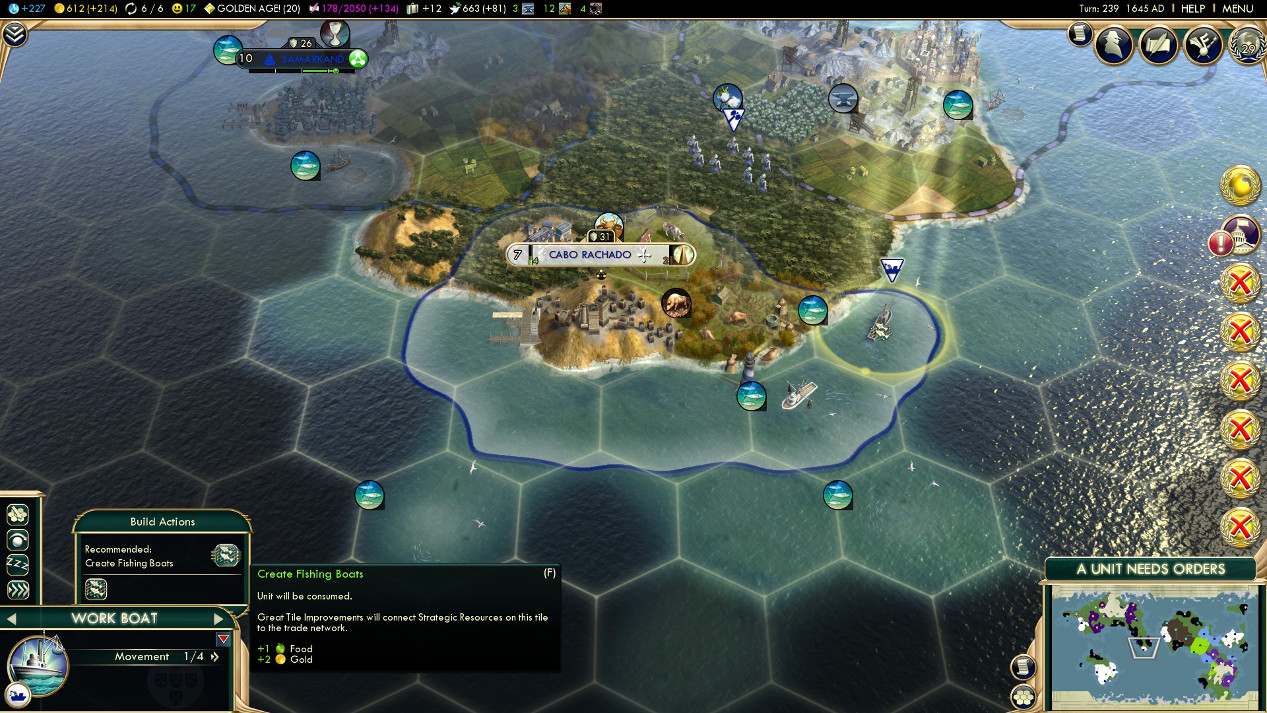 Cabo Rachado, however, cared little for the machinations of war or politics, and developed a reputation for contenting themselves with fishing and leisure. 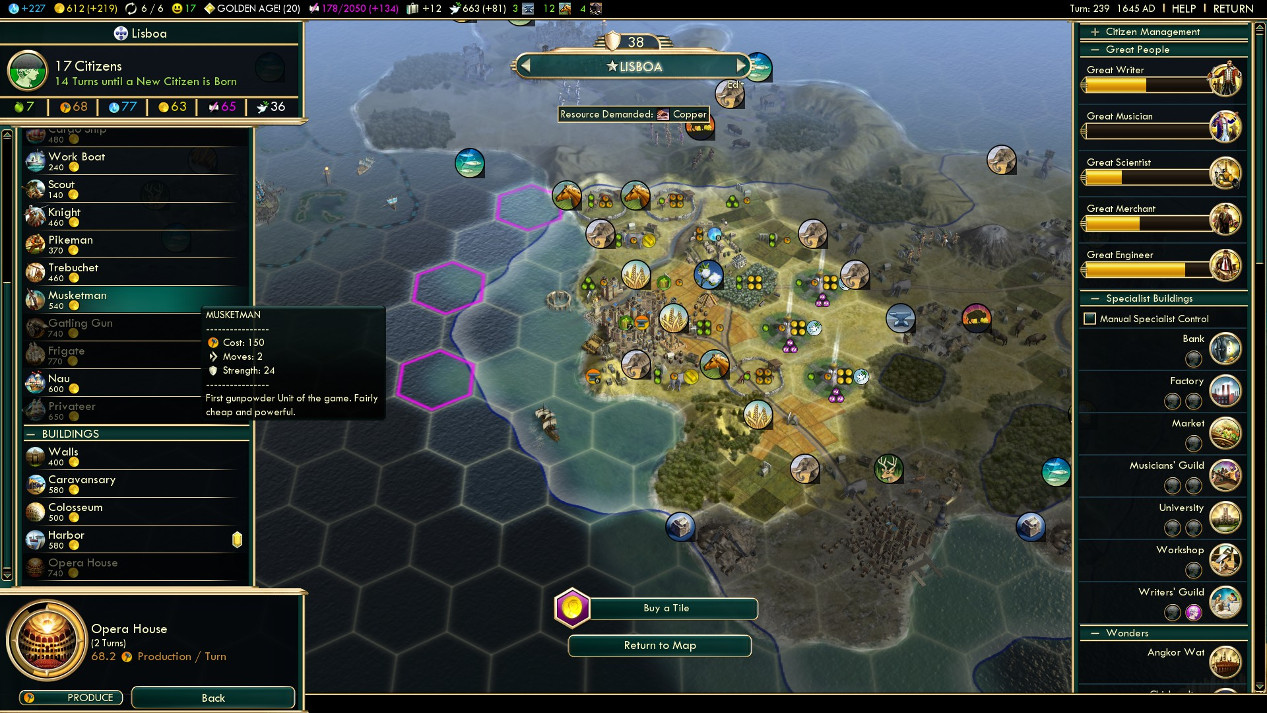 Lisboa, however, prepared their engine of war to operate on land, and purchased the services of a mercenary force to further support the Açores in their eventual mission. 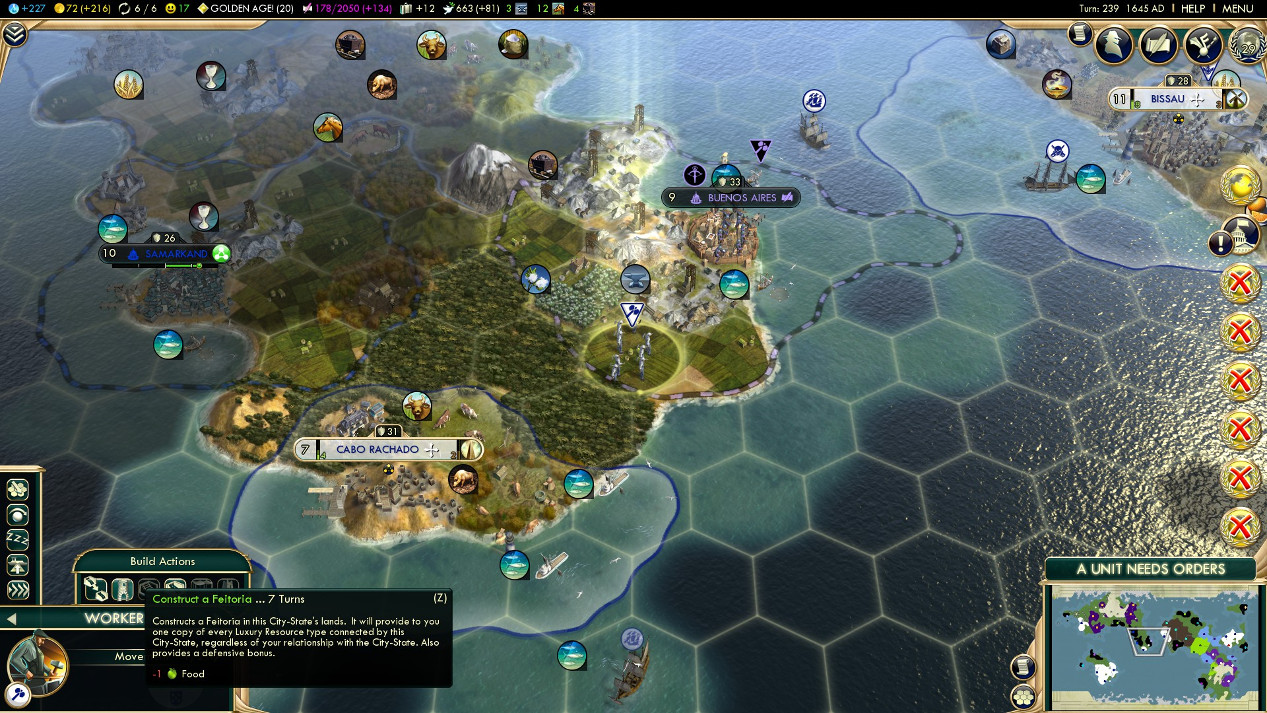 A group of workers local to Cabo Rachado decided to further support their empire by engaging in local cotton trade with Buenos Aires, that the Empire might be able to support other similar trades with locals.  The Portuguese diplomatic moves were also beginning to have an impact on past enemies.  These responses were also quite nicely received from friends.  The Dom Gabriel II develops a small network of spies and contacts to deliver information, and as such becomes more experienced with developing communications techniques to acquire long-range intelligence.  Dom João requests, and is granted, an extended leave of absence to spend time in Bissau, that he might better understand the thoughts of people in another part of the world, one that may have seen firsthand the flaws and failings of the Portuguese Empire. What he sees marks him for the remainder of his days. He is witness to both extreme poverty and grandiose wealth, Sebastianists, both native and originally of Lisboa and Luanda, extremely joyous at the state of the Portuguese Empire, while others who have refused conversion or failed to learn the ways of the Portuguese are marginalized and stricken by malnutrition and diseases thought long dead. Dom João wonders about the peace he fought for at one time, and wonders why every Portuguese cannot experience it the same way. 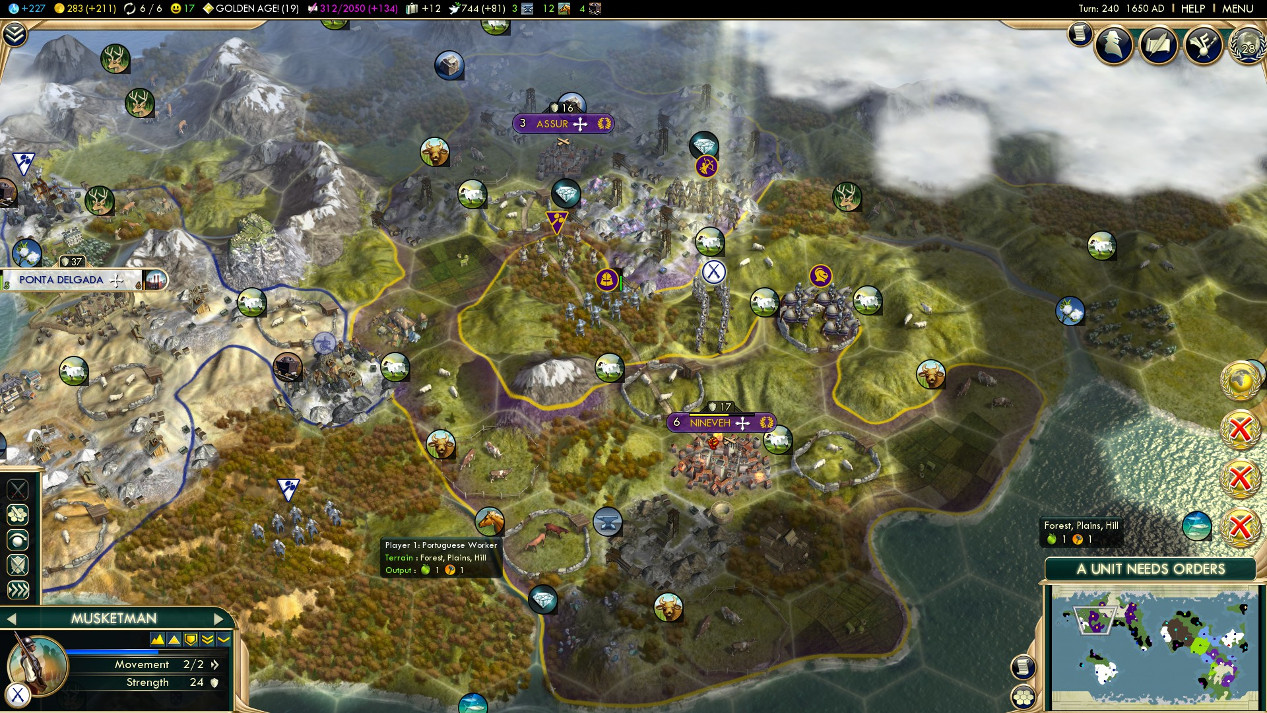 In light of this, he considers the fate of the Açores, and what they may face in the quest to bring peace back to Assyria. 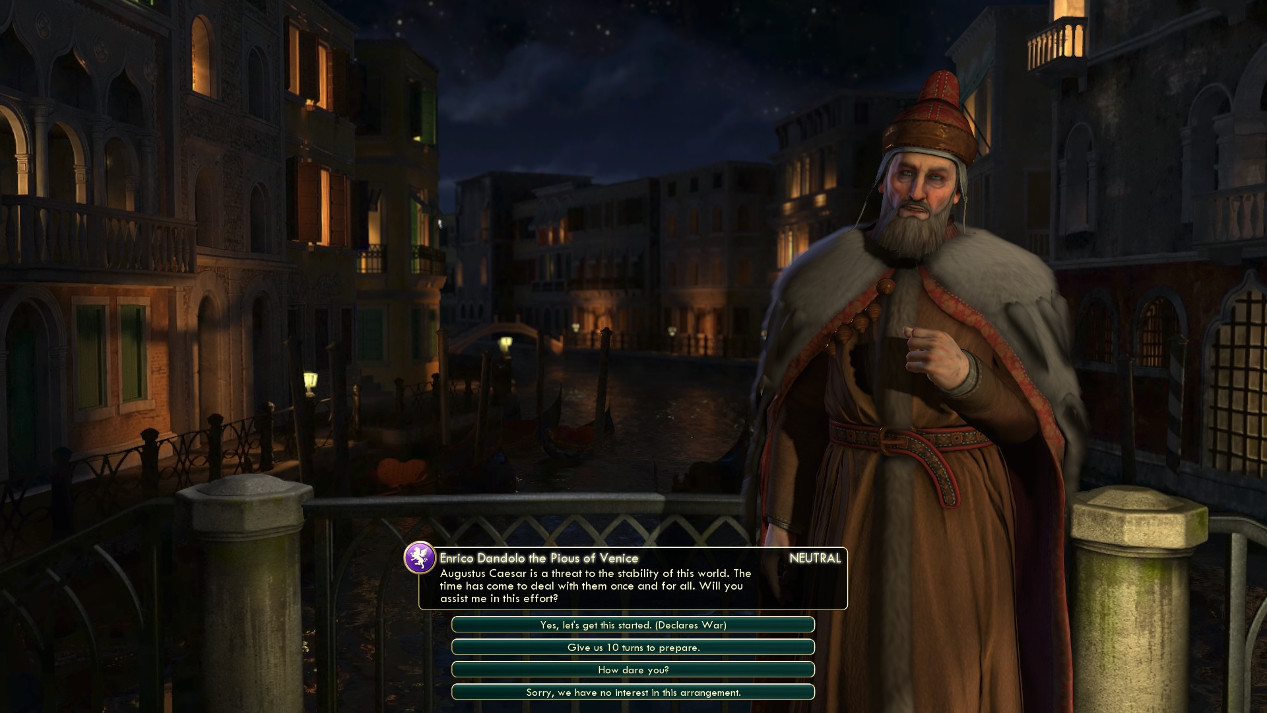 Dandolo, suddenly seeming quite cognizant of the circumstances of the Assyrians, suddenly requests aid from the Portuguese to make war upon the Romans. Dona Maria is so confused by this that she wonders if perhaps he has been overtaken by the fever of war that the Portuguese onced suffered from, and refuses his request for what she assumes is his own good.  Dom Pedro, however, offers only his measured words of support for the time being, and for Dona Maria, that is enough. 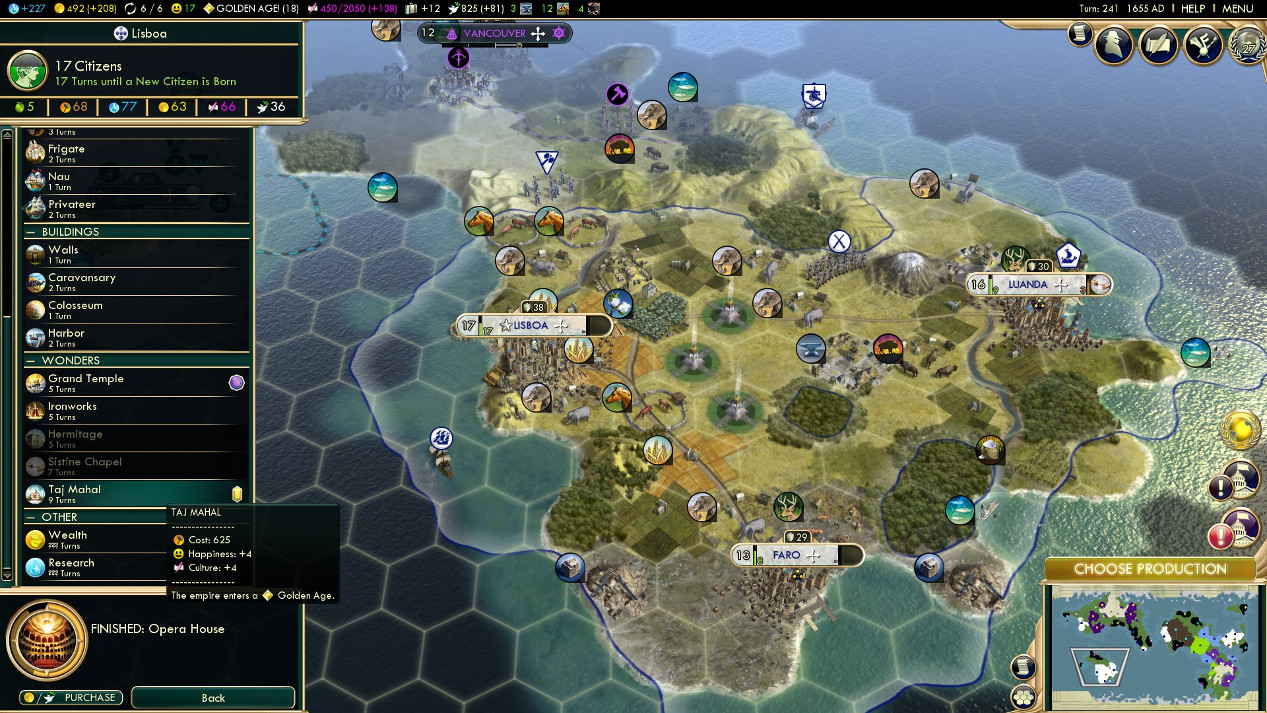 In light of these trying times, however, Dona Maria decides that keeping the spirits of her people up is a priority, and commissions various expansions to the royal palace where a number of festivals are still taking place. 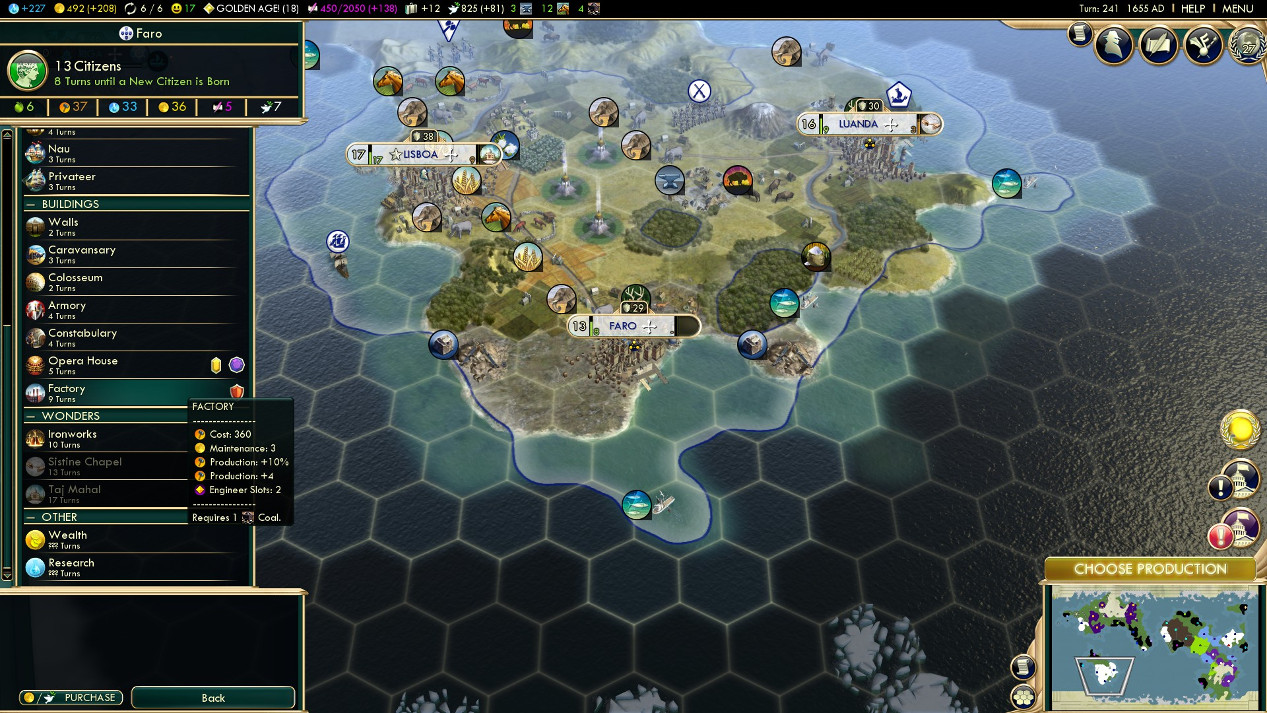 Faro, however, remains committed to industry as ever, and the hardy people of the southern tundra begin taking to steam power with surprising enthusiasm. 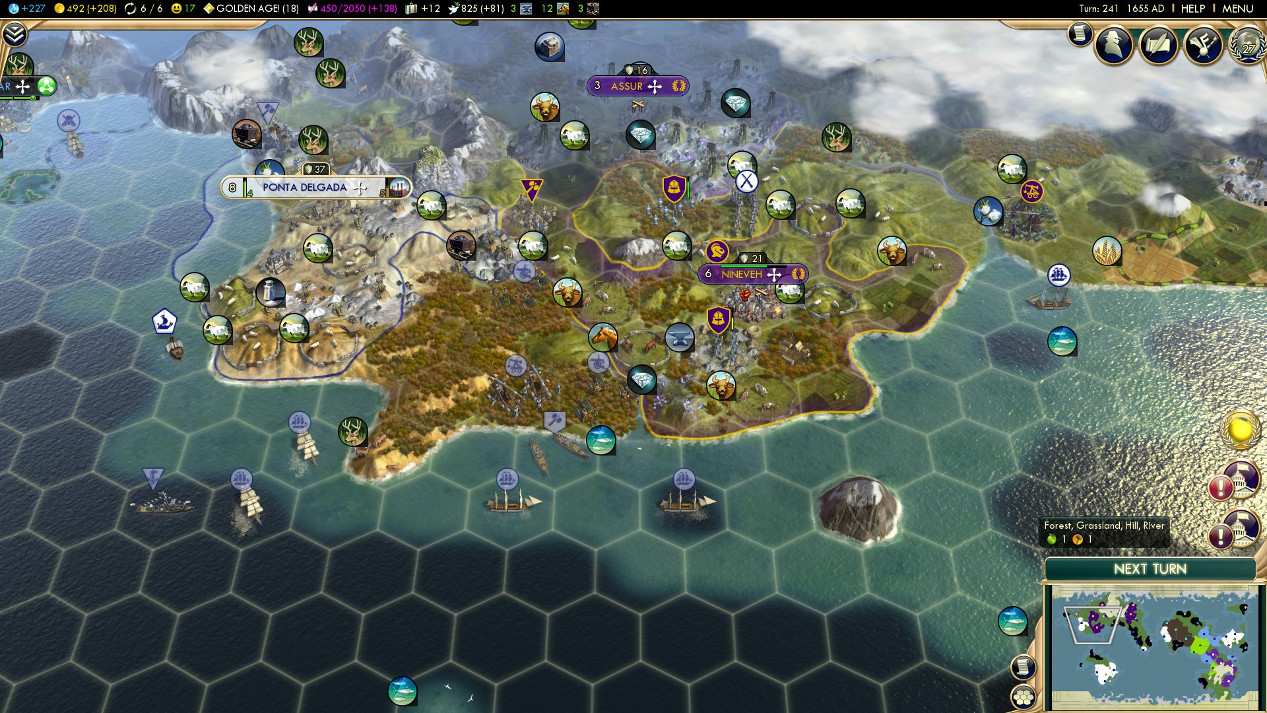 With each passing day, the anticipation builds for Portugal's first major campaign on land.  Dandolo makes another attempt to send his missionaries through Portuguese borders, but no, as it always does, means no. 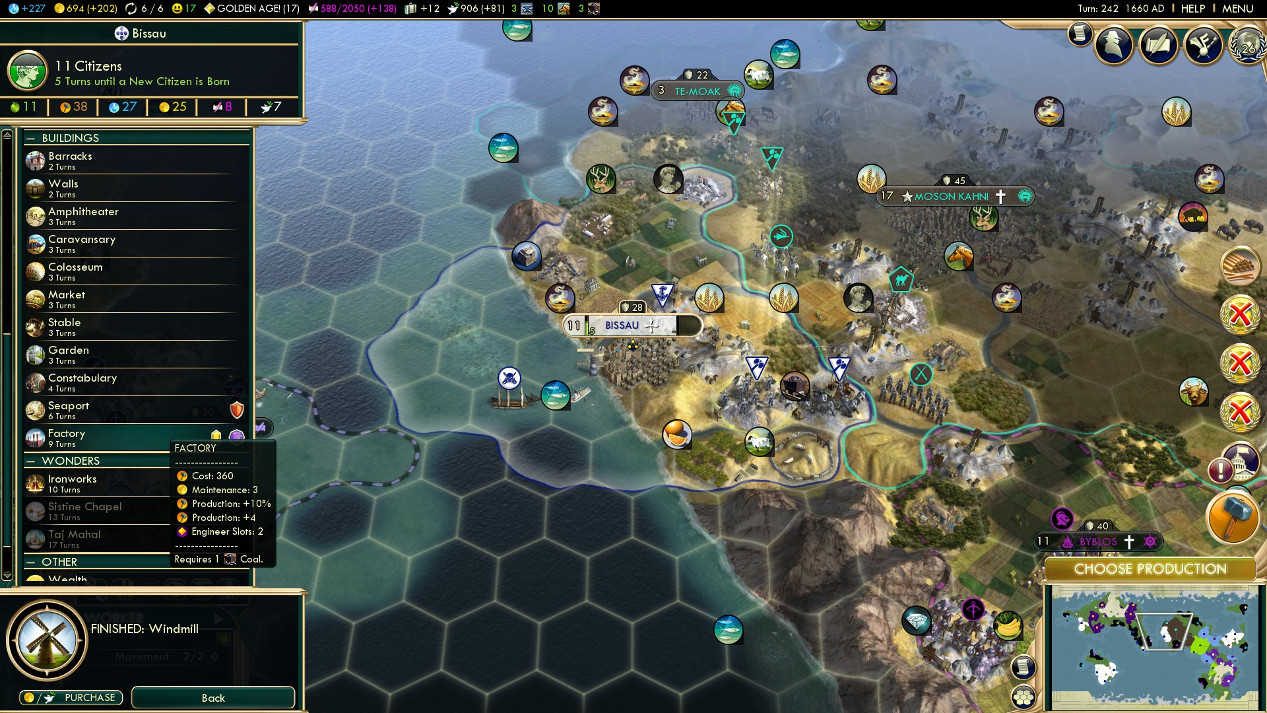 In Bissau, Dom João looks to providing jobs and opportunity to the locals by organizing a union of workers similar to that of a marine vessel. Though he acts as its head, he makes guarantees of certain labour rights and considerations and informs the local lawmakers that his intent is to provide his people with a space to find work under terms they find accessible. Though they are leery of the particulars, Dom João convinces them of the opportunity to find profit through a happy labour force, and the Sebastianist mayor agrees to implement the potential reforms and begins work on a Factory. The initial success of his idea is something that inspires Dom João to look deeper into the political world. 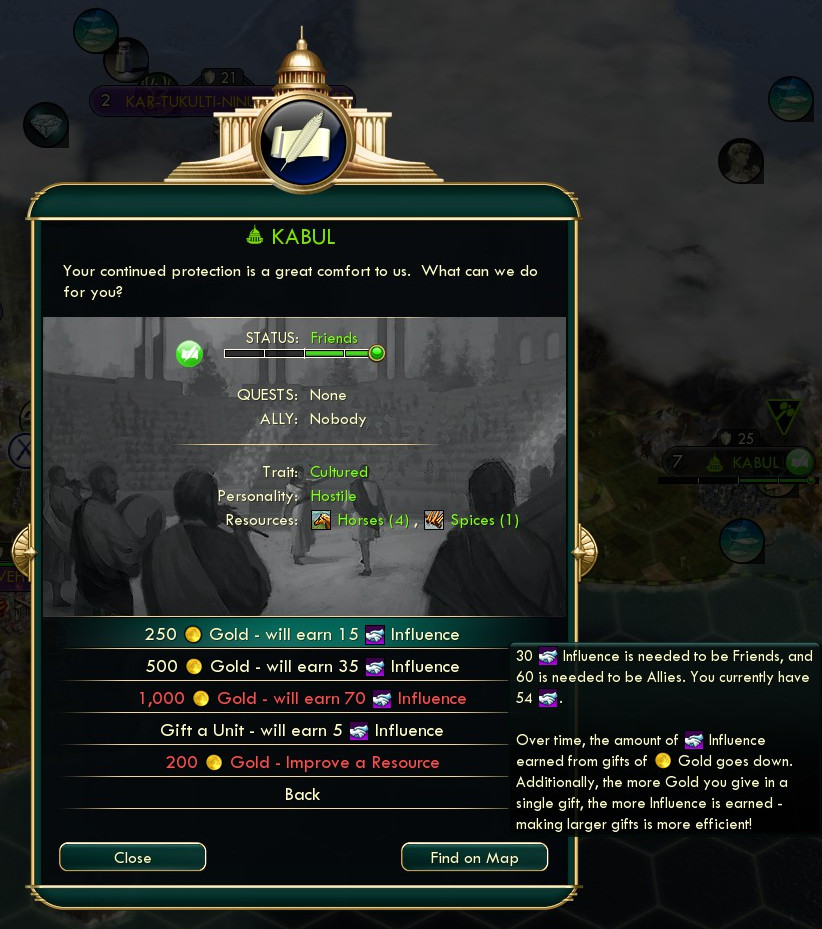 He sees that wealth, managed properly, may indeed by a mechanism for positive social change. 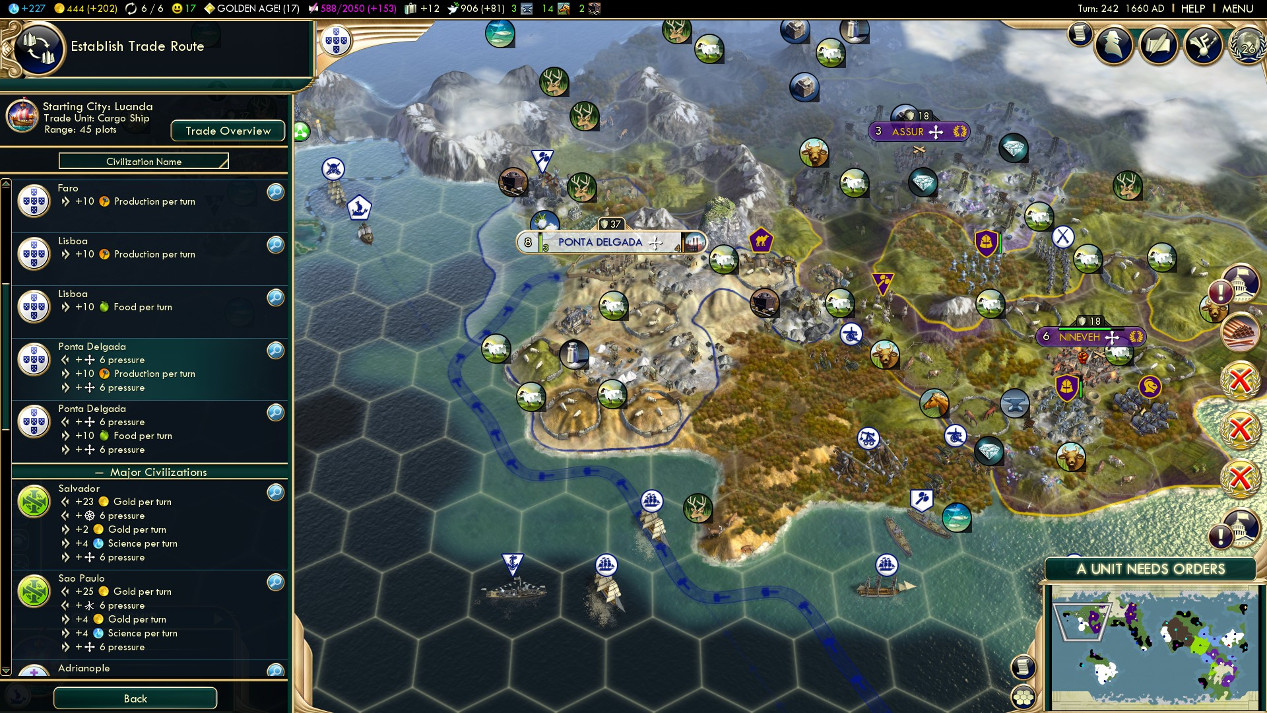 Labour, when shared and approached as a fundamental act of cooperation between people of different backgrounds, can bring power and even enlightenment to local populations.  However, it is also important to recognize that even in times of conflict, a degree of self-governance is important to ensure the satisfaction of local populations. 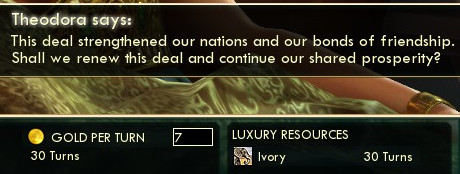 Deals with other nations are an important step to ensuring that peace can thrive 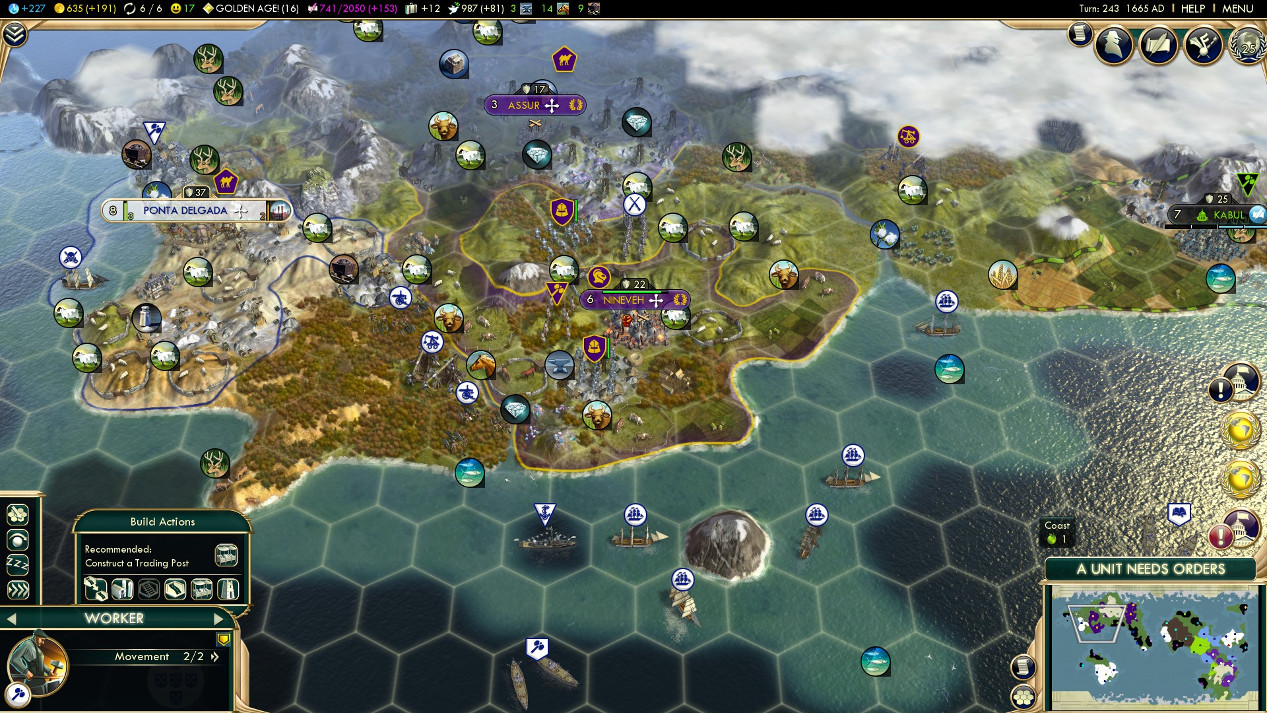 However, when war is the only option, then it must be sought with the full will of the population to achieve victory against tyrants and oppressors. 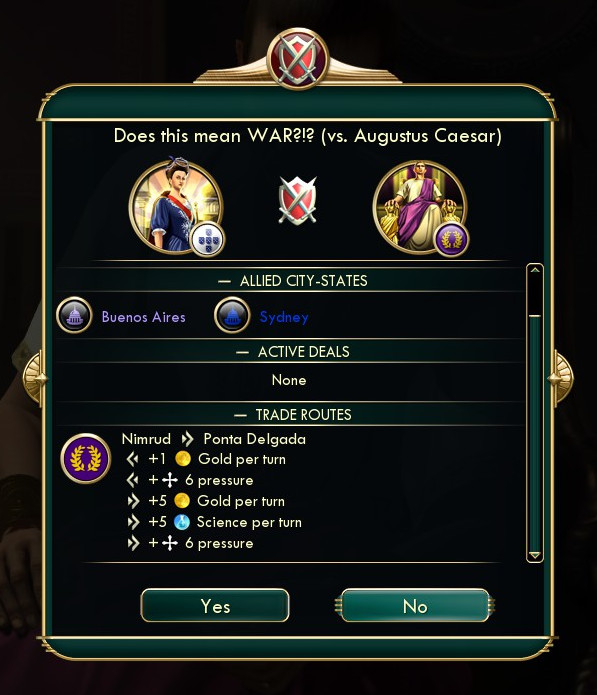 Yet...there is a problem.  The Roman somehow has the allegiance of Buenos Aires, and going to war with them would place Cabo Rachado in some danger. 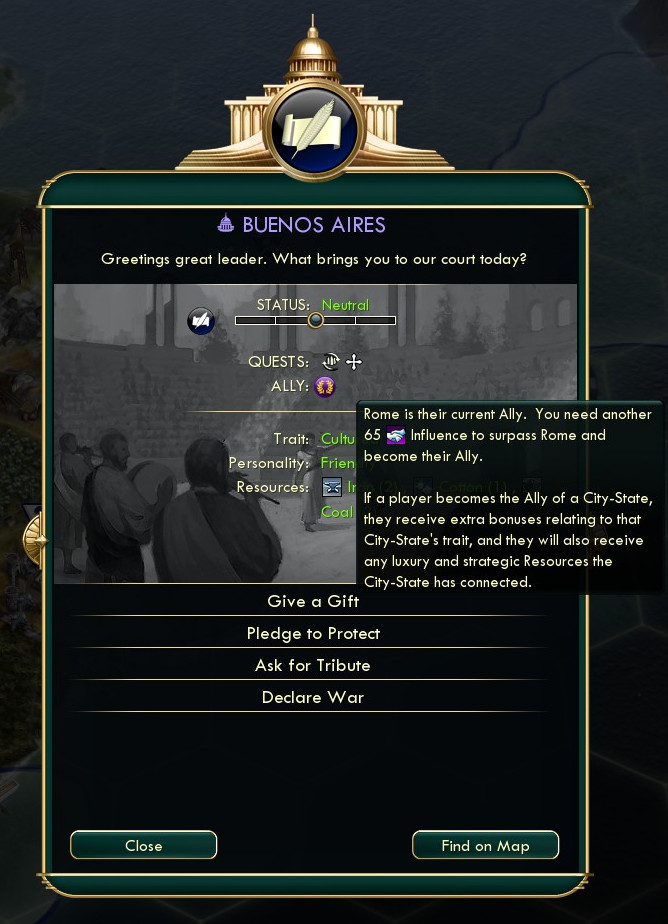 However, Dona Maria sees an interesting opportunity to resolve the problem almost immediately. The locals are curious about Sebastianism and are looking to bolster their economy through trade. 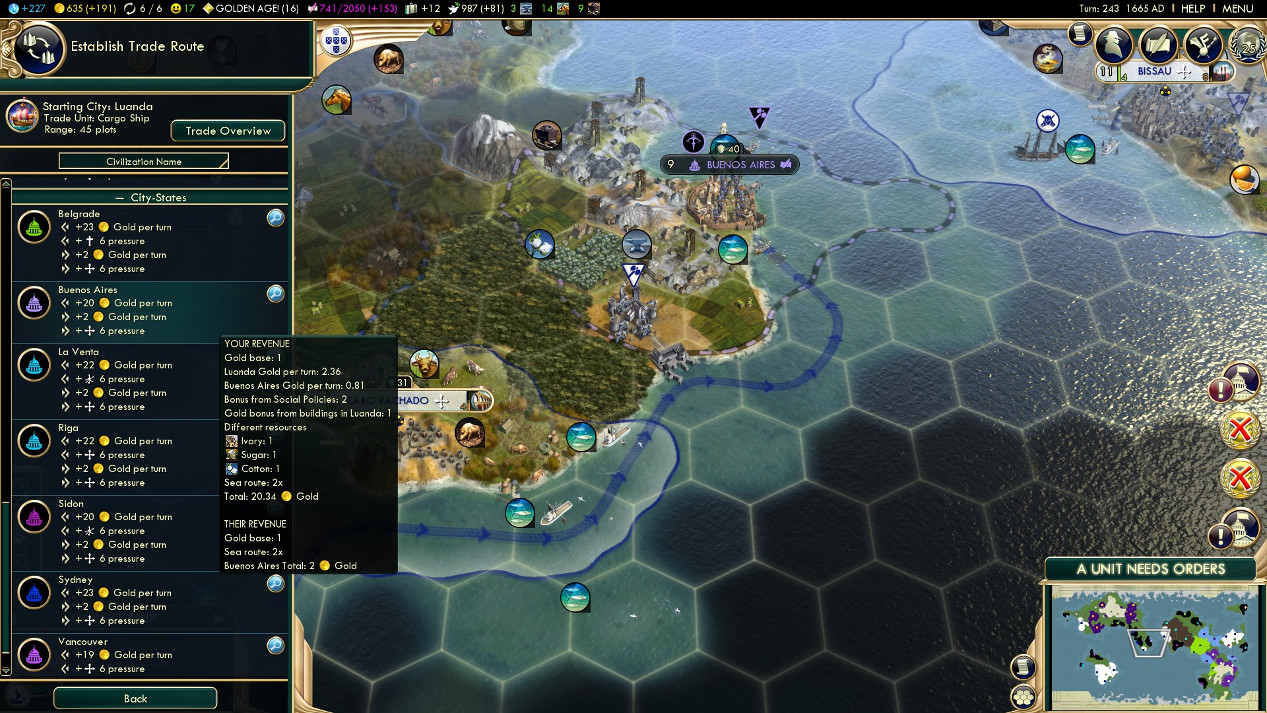 The former will have to wait, but the latter is an area that the Casa can address easily.  The Armada continues the process of getting into position, and the Shoshone begin to reveal new developments in national defence. 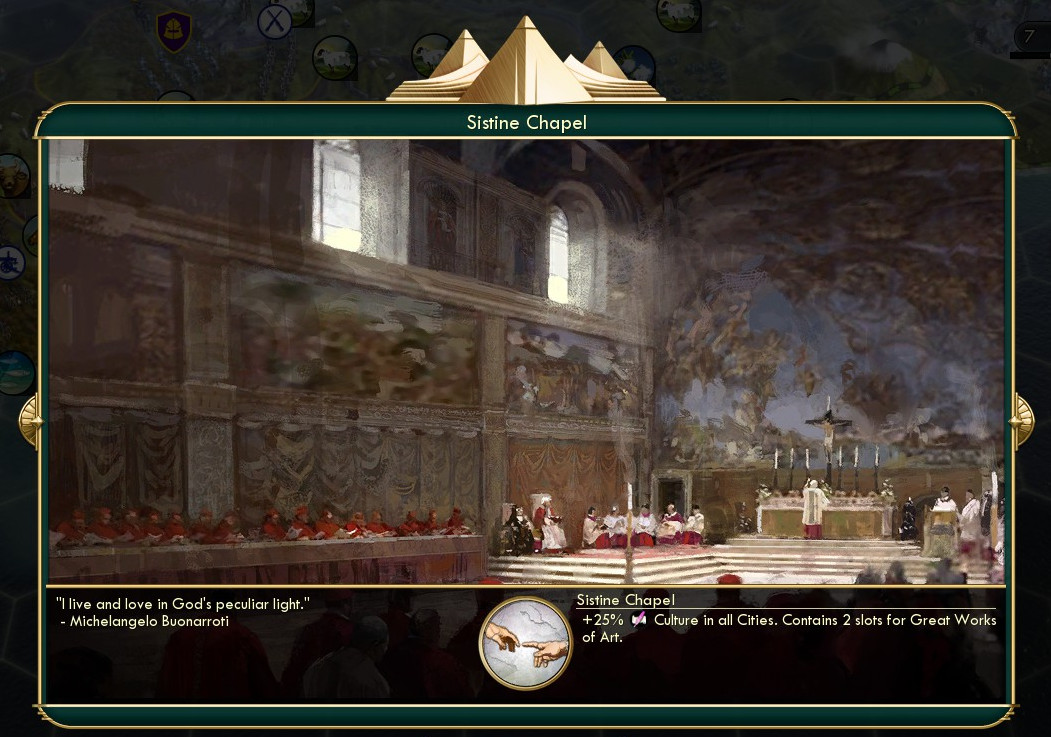 For the Portuguese mainland, however, the time has come to celebrate art like never before. 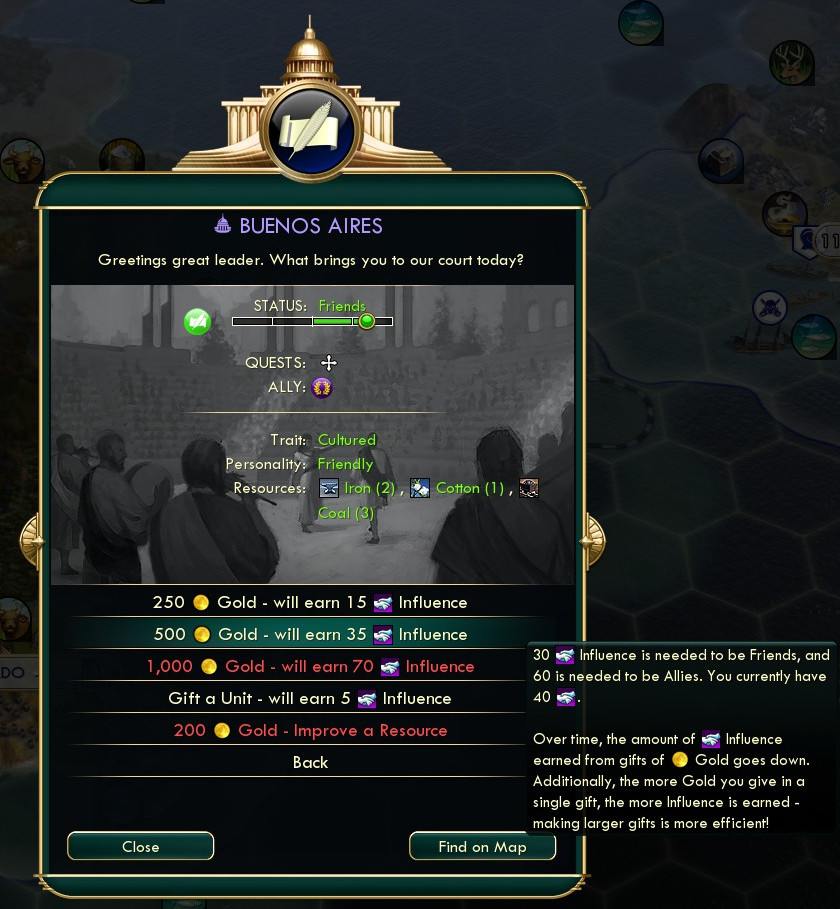 With an infusion of funds from the national coffers, the Argentinians are convinced to rescind their agreement with the Roman in favour of Portuguese alliance. 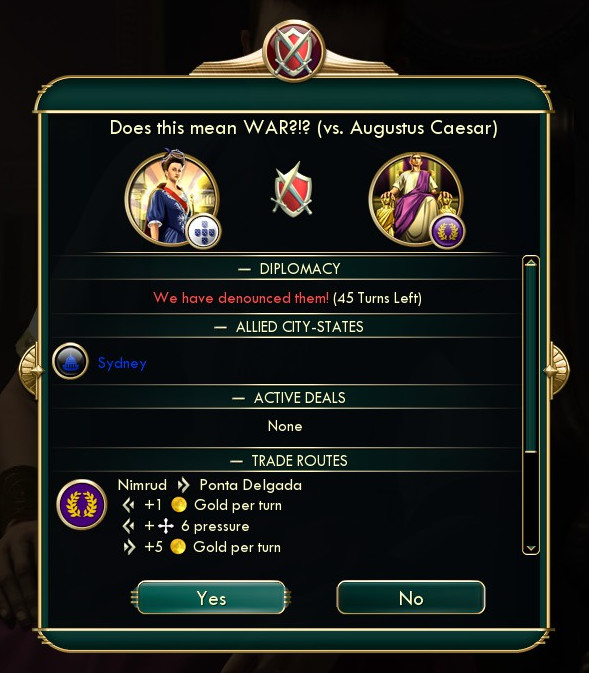 Now is the time for conflict. 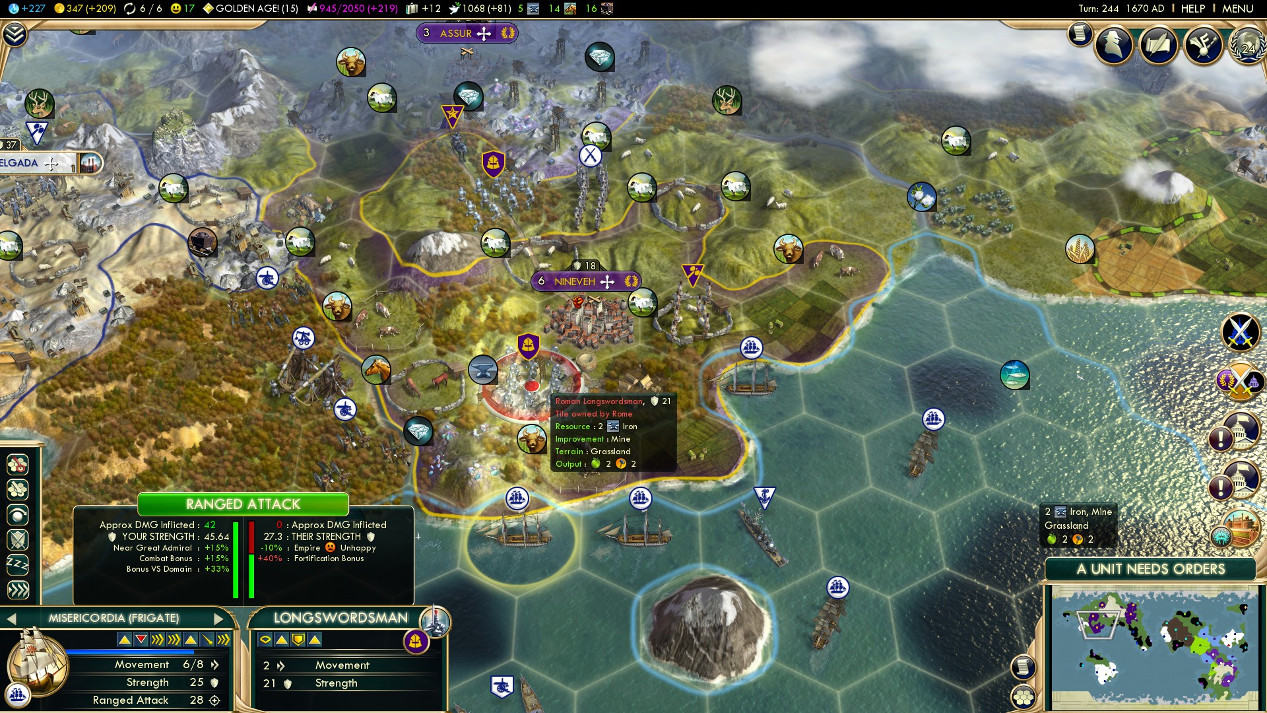 Per usual, Nossas Senhoras fire volleys at land targets, but their cannons are unable to reach Nineveh as their lines of sight are blocked by forests and hills.  However, in the midst of the war, Dom João returns to Lisboa with a surprising declaration. "My Queen, it is time to give freedom to the people of Portugal." He states, provoking a seemingly...practiced reaction from his former liege. "I have seen it in Bissau, the people there grow stronger, more enlightened, more capable than they ever have before. Who is to say that a monarch of Lisboa is fit to rule them? Who is to say that we cannot find a better way of ensuring that these myriad people we call Portuguese live better lives?" 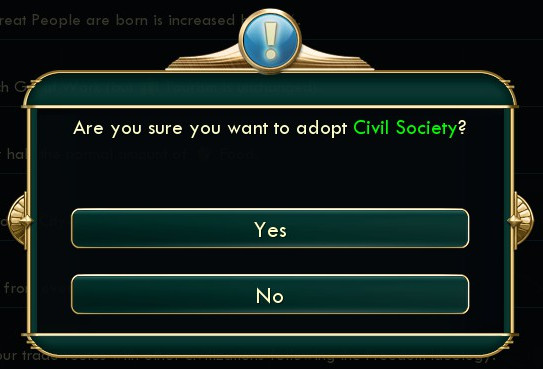 Salazar, also present, responds icily. "You fool, we live in a world where strength and power determines the shape of the future. It was so when Sebastião hunted in the fields, and it is true now when we face the Roman mongrel once more. Whatever ideas you have about the hope for the future are hopelessly mired in delusions and dreams. People cannot coexist without conflicting strength determining victory, no matter how you wish it were so." "I've heard enough!" Dona Maria explodes. "I have seen it to be so. The two of you may never see the future of Portugal as one, but both your ideas hold merit. Indeed, strength will still determine the future of our nation, and the people from everywhere from Kyoto to Ponta Delgada must have a stake in that future. However, in the end, I expect the two of you to coexist in such a future, because your nation and I demand it of you!" Both men fall silent, and Dona Maria storms outside to address the festival-goers, eliciting cheers before silencing the crowd.  "I have seen, in many dreams past, that the people of this world possess many wonderful and terrifying ideas about the future. Each and every one of you bears a vision of how this nation must be run, and upon awakening I remember hearing each and every one of your voices. I had thought our Goddess was blessing me with her own directive, but I now realize that it was all of you, determining how we must make Portugal grow and prosper. Now, I realize that the time has come to dispense with the dreams and the illusion of rulership, and allow you all to show the world that your decisions are what will steer this ship forward." The crowd is stunned into silence, though there are some screams of dismay and confusion when Dona Maria wildly rips her crown from atop her head and throws it violently into the crowd. "From this day forward, that crown's only value is in gems and gold. I hereby renounce my name as Dona Maria Primeira of the Kingdom of Portugal. From this day forward, I am Maria Bragança, and I am here to tell you all that it is my intention to run for President of the Portuguese Republic, if you will so have me.  The word barely had time to reach the front at Nineveh before Portugal's first elections were formally announced. The incredulous Portuguese were stunned to hear that their monarch was considering the likes of Almeida and Salazar as political rivals rather than underlings, but were finding themselves increasingly excited to represent a Republic. 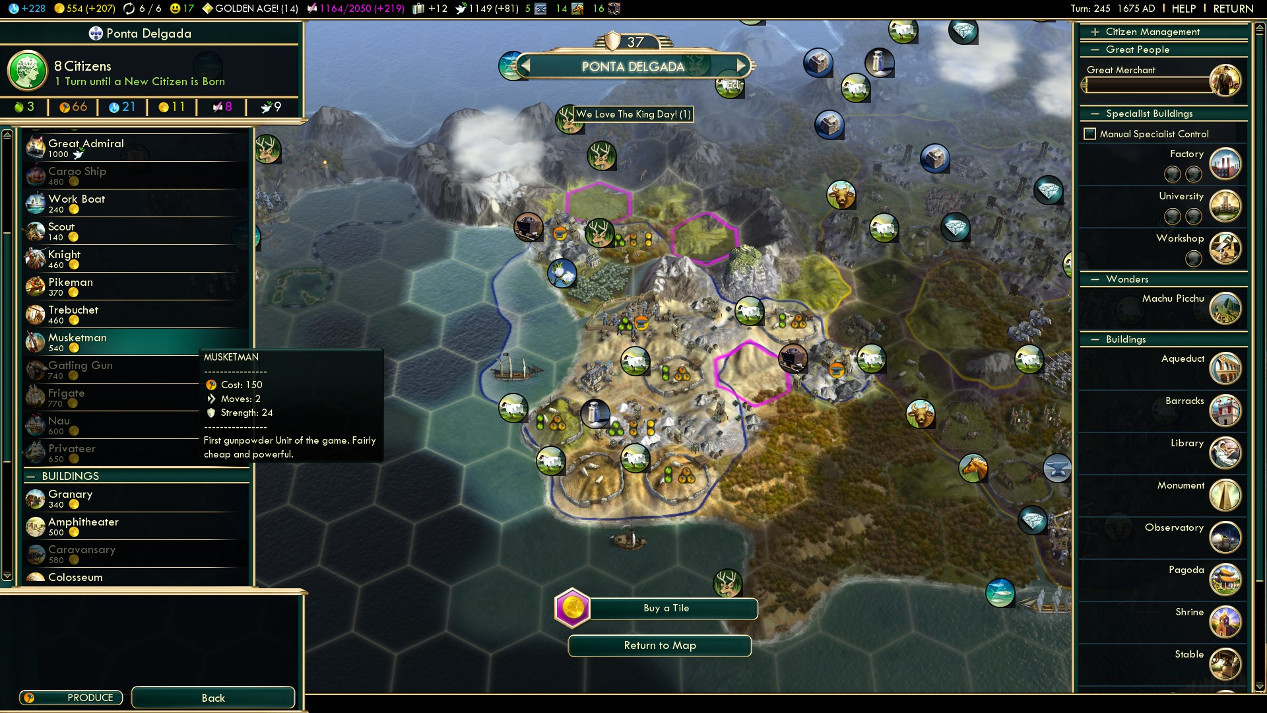 War remains businesslike as ever, though. More Assyrian mercenaries were hired from among the ranks of refugees, and they prepared to take up arms in the service of the liberation of their home.  The Sebastianists currently taking to Kabul to provide education were as shocked as the famous local artisans, who began making haste to tell the story of the birth of the Portuguese Republic. In their rush, several of them still included word of Maria as the leader of the nation, while there was still a possibility that this would not be the case. 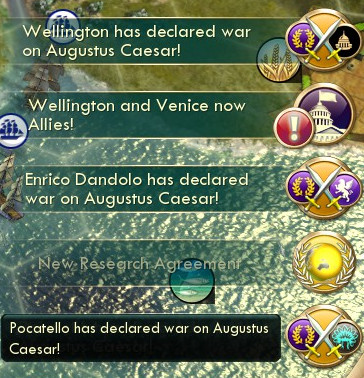 However, in light of Maria Bragança's acts of diplomatic prowess in taking the lead in this now world war against Rome, there seemed to be little doubt as to who could best capture the hearts, and votes, of the people in the end. 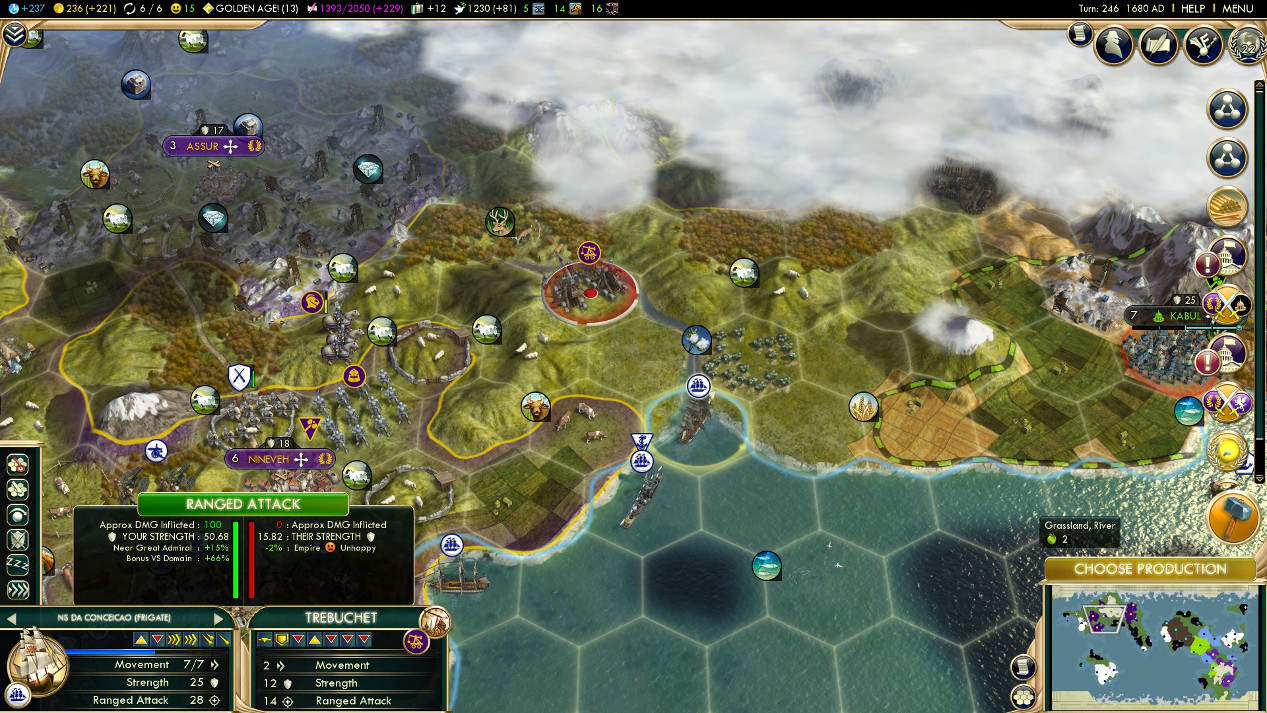 As the cannons of the modern Portuguese frigates crushed the feeble Roman trebuchets of yesteryear, the men of the Portuguese Armada debated the relative merits of their chosen leaders while filling out absentee ballots. 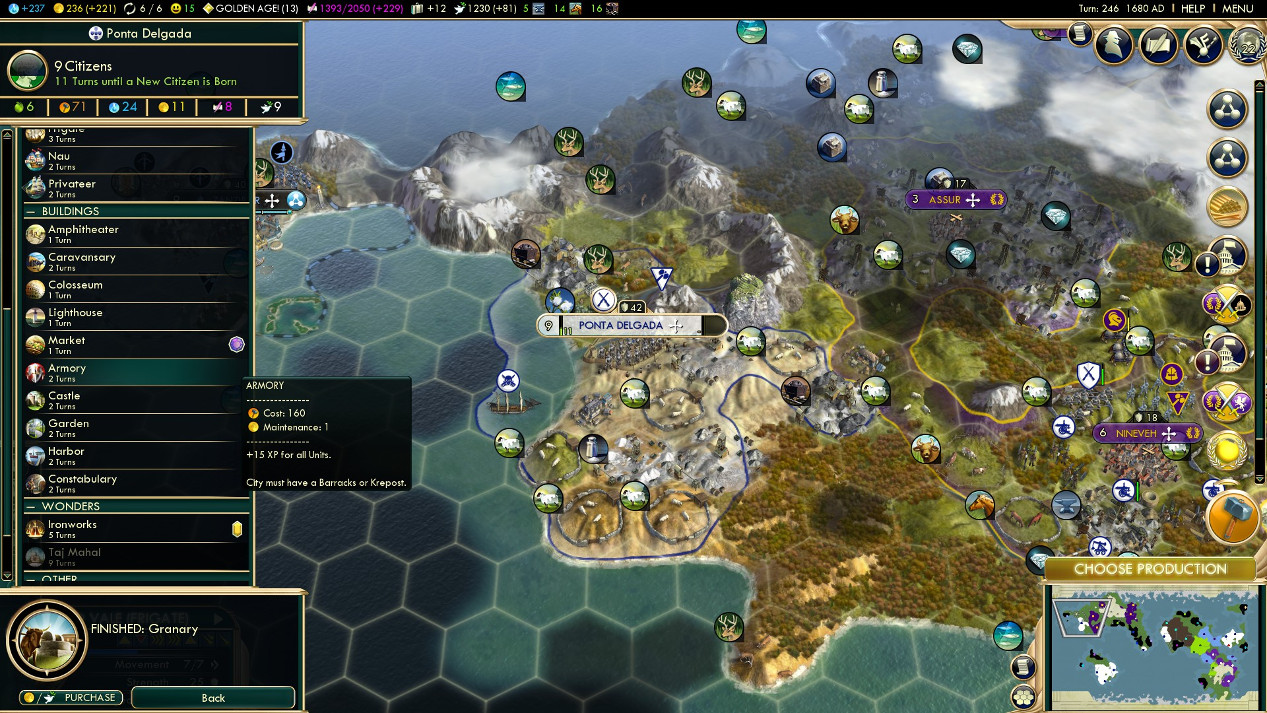 The people of Ponta Delgada seemed hopeful when they heard that the front was making steady advances on Nineveh. 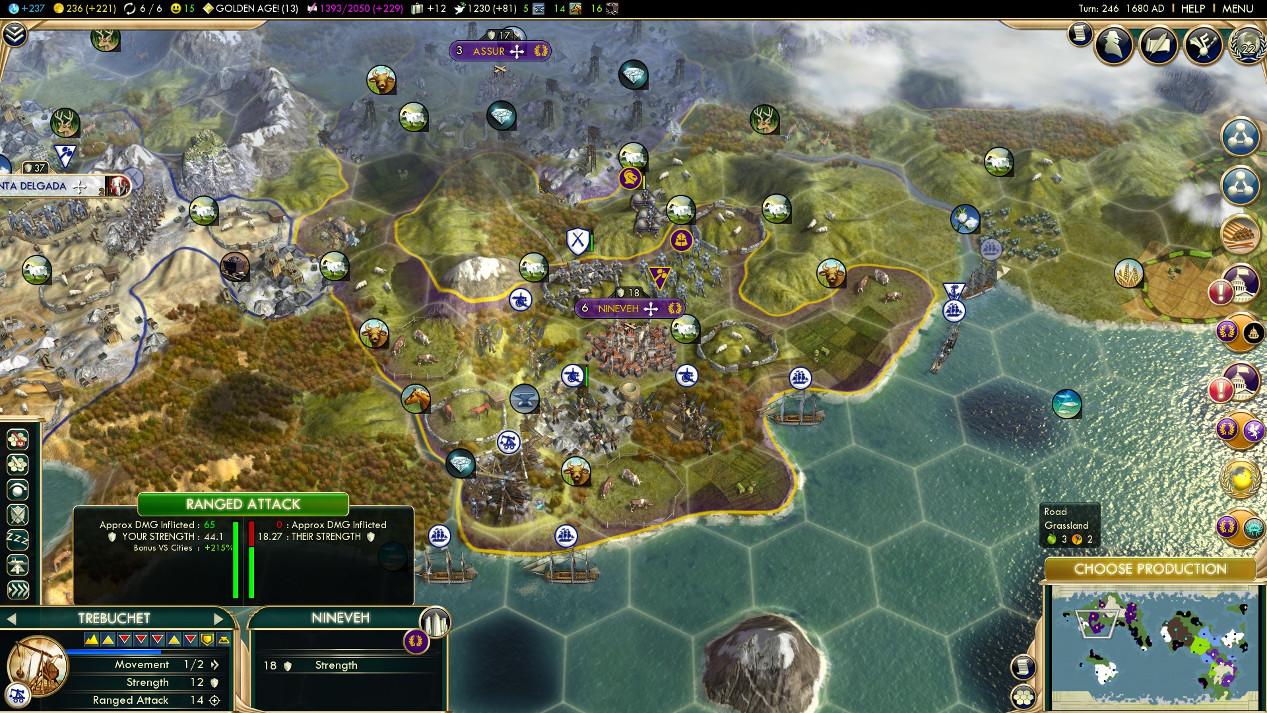 Portuguese weapons of war began making good on their promises of salvation 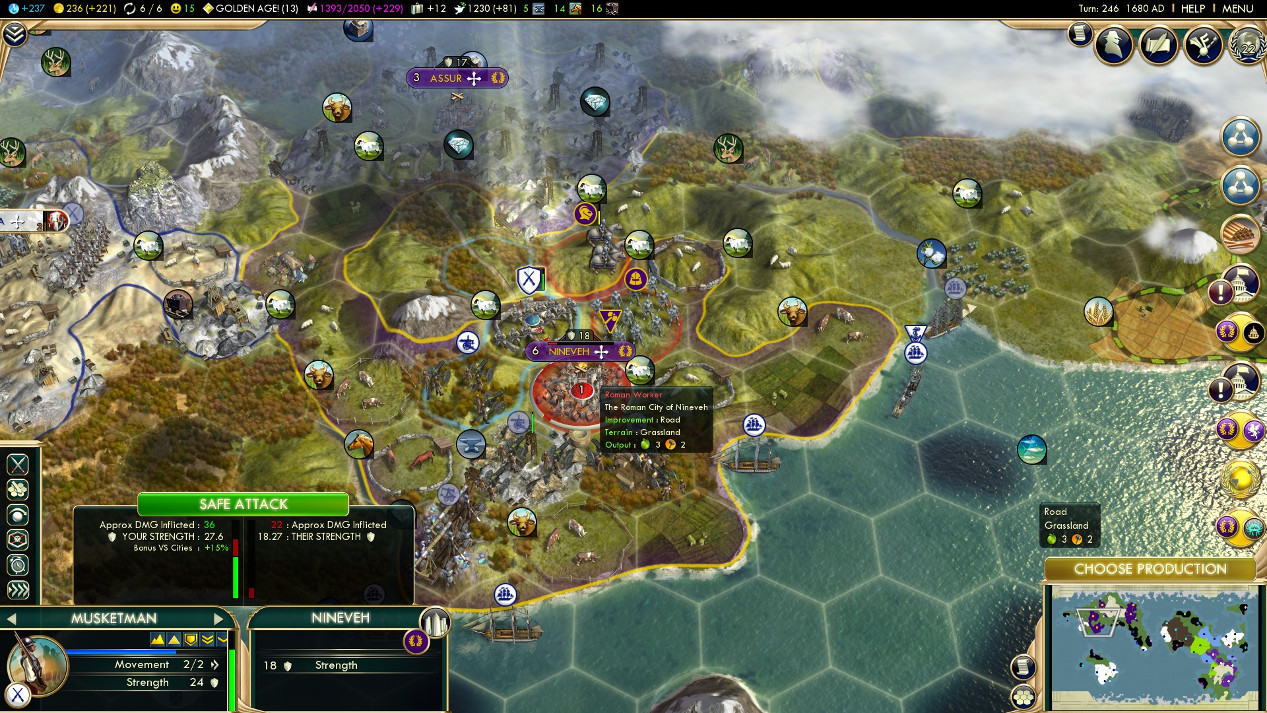 Just like that, the defences of Nineveh fell quickly. 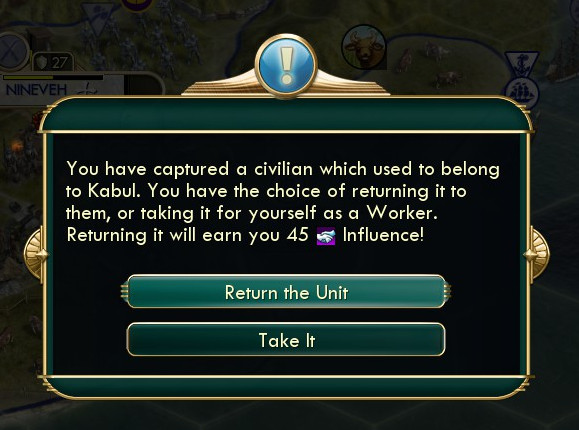 They fell so quickly, in fact, that the raiding Açores were also able to free a number of Afghani who had been enslaved by the Romans. This move earned the Portuguese a significant measure of diplomatic support in Kabul. 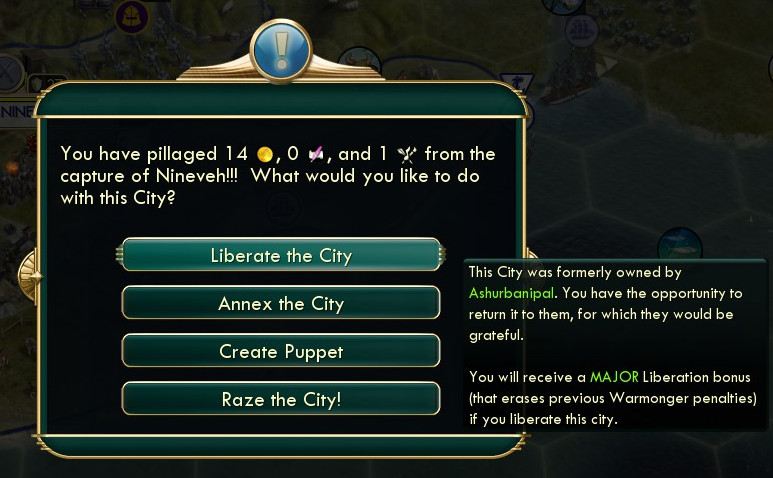 Even more surprising was the fact that they located the monarch in exile, Ashurbanipal, hiding in the city of Nineveh as well. He had been spirited away by Assyrian loyalists hiding from the Roman, but upon the City's capture he was quickly returned to his local palace to ostensibly resume the business of running what remained of his country.  "I cannot even begin to thank you for what you have done today." Ashurbanipal said to the musketeers. "I had thought my people would be crushed outright by the Romans, but somehow you Portuguese have found the strength needed to find victory where I could not." The Açor captain currently guarding the monarch simply nodded in response. "My only hope, your Majesty, is that you consider this moment when the time comes to determine who your allies are on the world stage." As you can see, you have a unique relationship with a Civ that you restore after its complete destruction at the hands of another. This guarantees friendship for a while, and gives you certain privileges like Open Borders for a time as well. There is a time limit, however, after which you cannot Recall a Civ whose cities belong to another for too long, since they are considered extinct at that point.  Ashurbanipal signs an agreement of mutual defence with the Republic, and the Açorean freedom fighters go forth to eliminate the next bastion of Roman tyranny. It is at this time that the election results arrive, and despite Maria's misgivings about her chances when she heard that equal votes would not in fact be awarded to horses or elephants, she was voted into office by a significant majority, with Almeida's raw popularity failing to translate into effective campaigning, and Salazar's rather difficult reform proposals meeting with significant resistance. 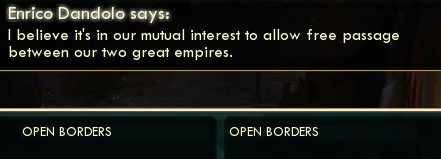 Dandolo, believing the time to be right, offered the now President Bragança a similar deal to those of the past, assuming that being able to discuss terms as now equal elected officials would result in a more favourable outcome. He assumed incorrectly.   The warmongers of the world, visibly shaken by these remarkable changes in the world, called off their seemingly eternal assault against the Byzantines in order to redouble their efforts. For better or worse, these gestures convinced the electorate that they had made the right choice in making their former Queen their new President. 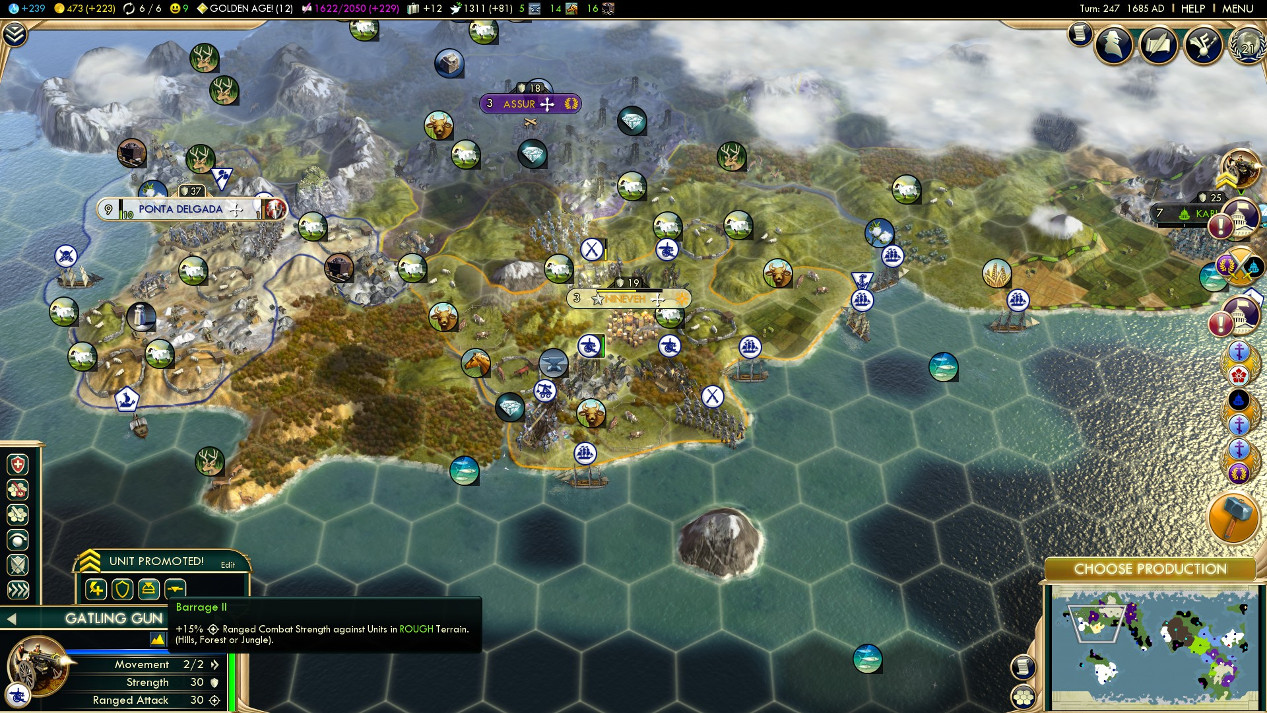 The Açores continued to develop their abilities on the battlefield, but they remained aware as ever of their true goal as Assur loomed in the distance  Cabo Rachado locals, still mystified at the ballots they received from the mainland, simply resumed the business of fishing after near-unanimously voting for the Queen, content with things as they ever were. 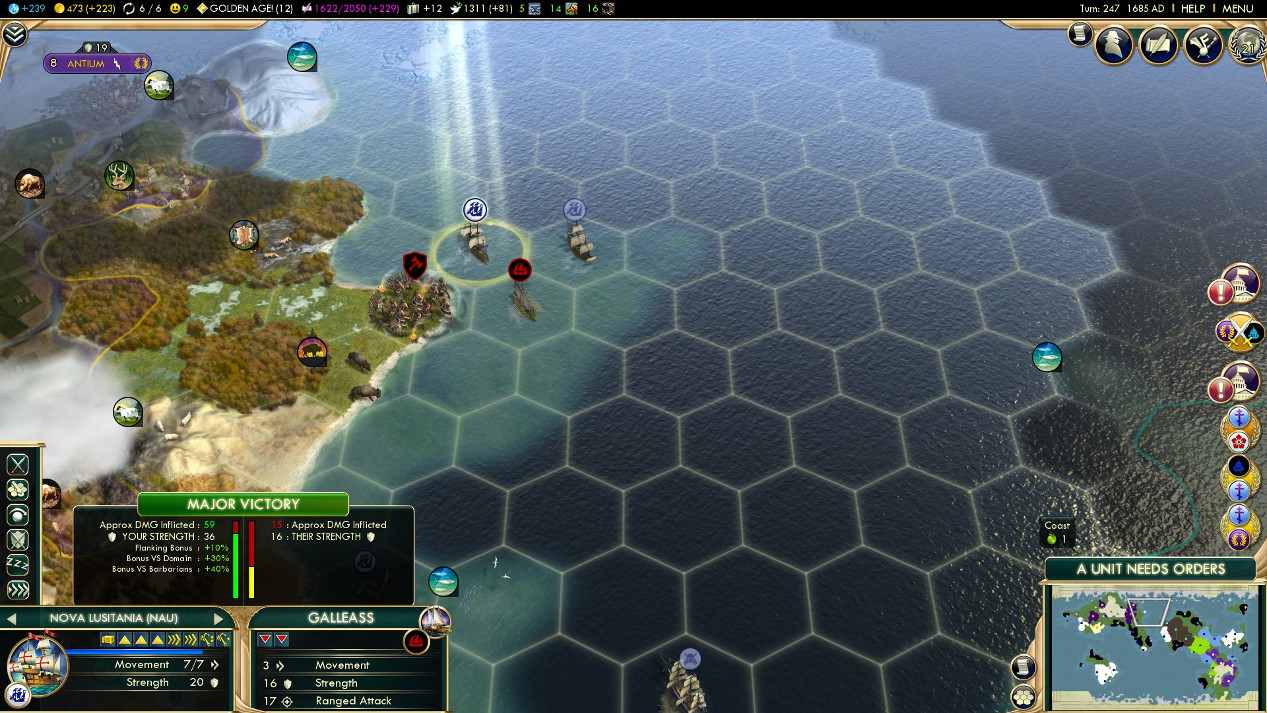 An unusual opportunity presented itself as what appeared to be Roman defectors built a ship off the west Roman coast that appeared hostile to the Portuguese, and may have presented a possible target for capture at the hands of the Barco de Guerra.  A similar opportunity presented itself to capture the hearts of the Shoshone, and President Bragança began recruiting speakers of the Shoshone language to act as diplomats to the increasingly cordial foreign power. 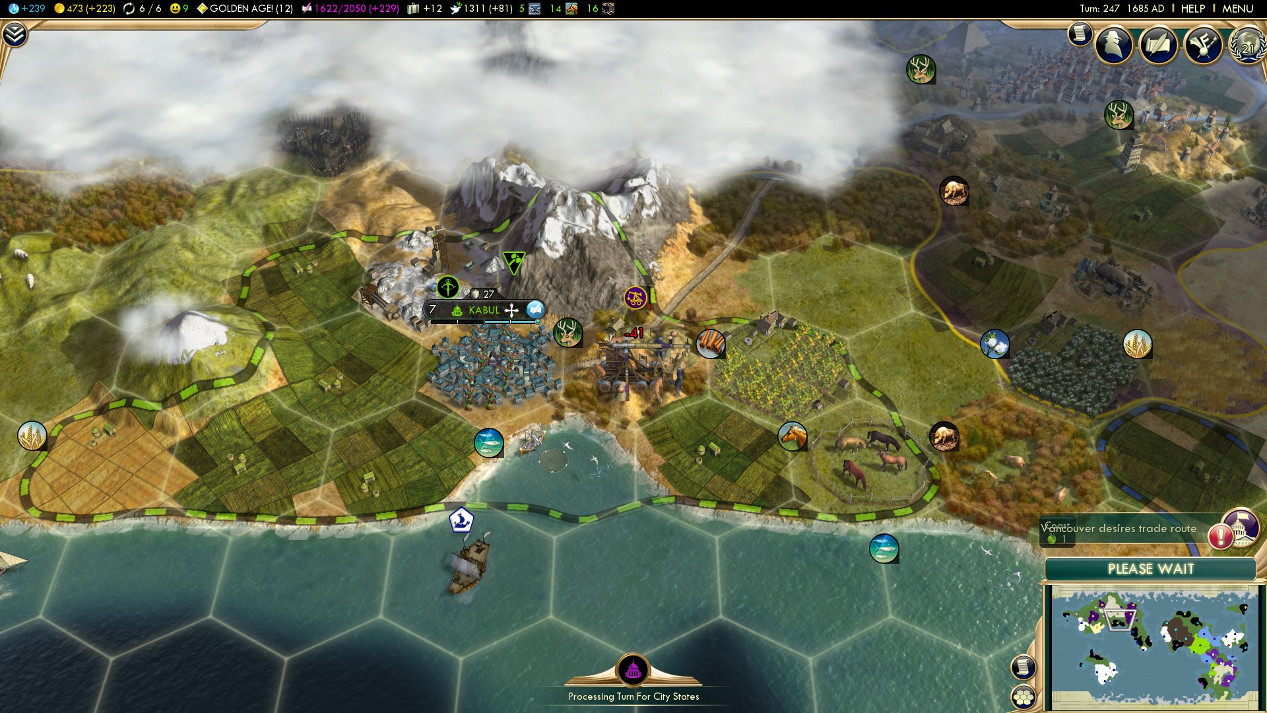 Roman weapons of war make themselves known on the eastern Kabul city limits, but they are not long for this world with the Armada so close by. 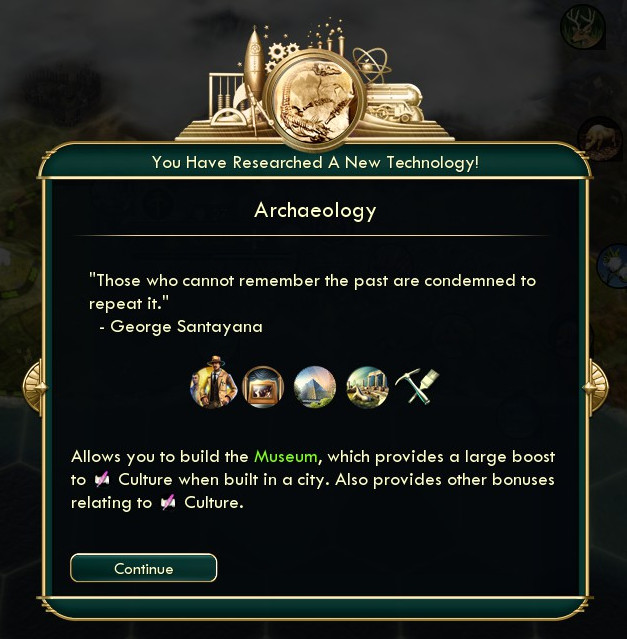 Yet, with all this focus on the future, the Universidades of Lisboa begin digging even deeper into the past. 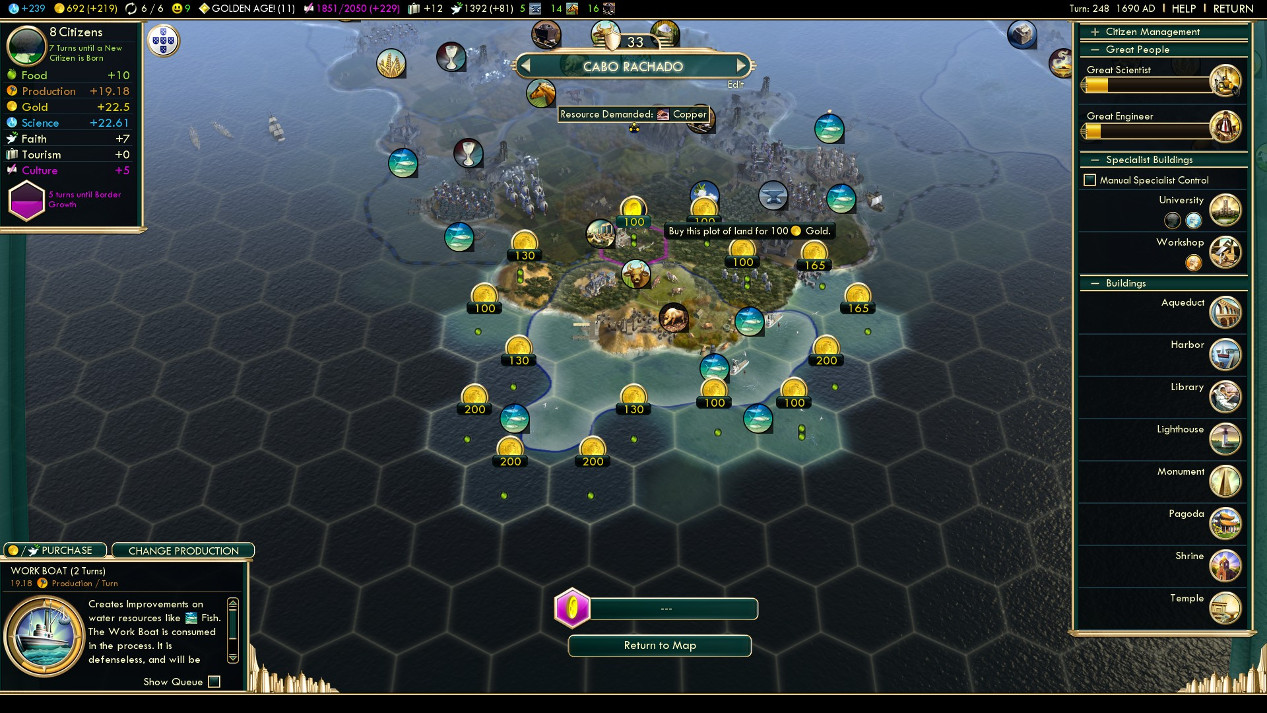 Cabo Rachado is discovered to have a site of some historical importance, and the Department of Education is petitioned to devote some of the old royal treasury to the project. 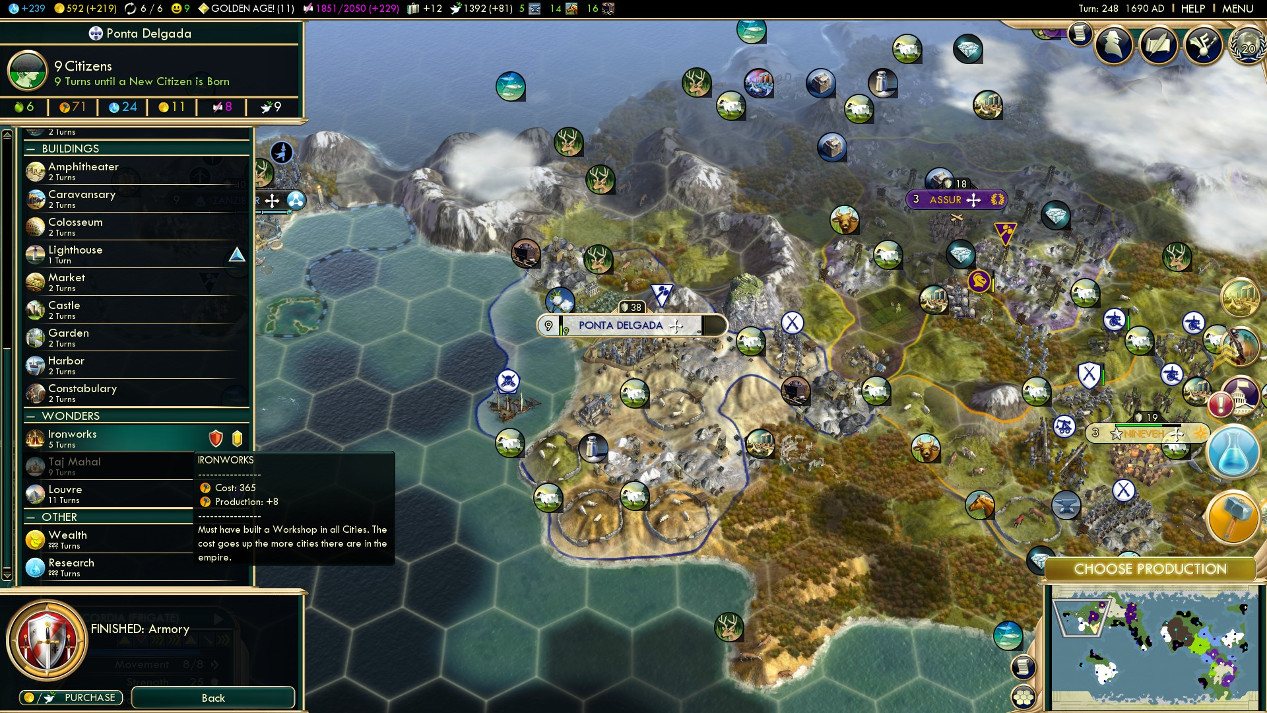 Ponta Delgada, meanwhile, begins developing a new type of iron foundry in the deepest parts of Macchu Picchu, hoping that it will contribute to the efforts against the Roman. 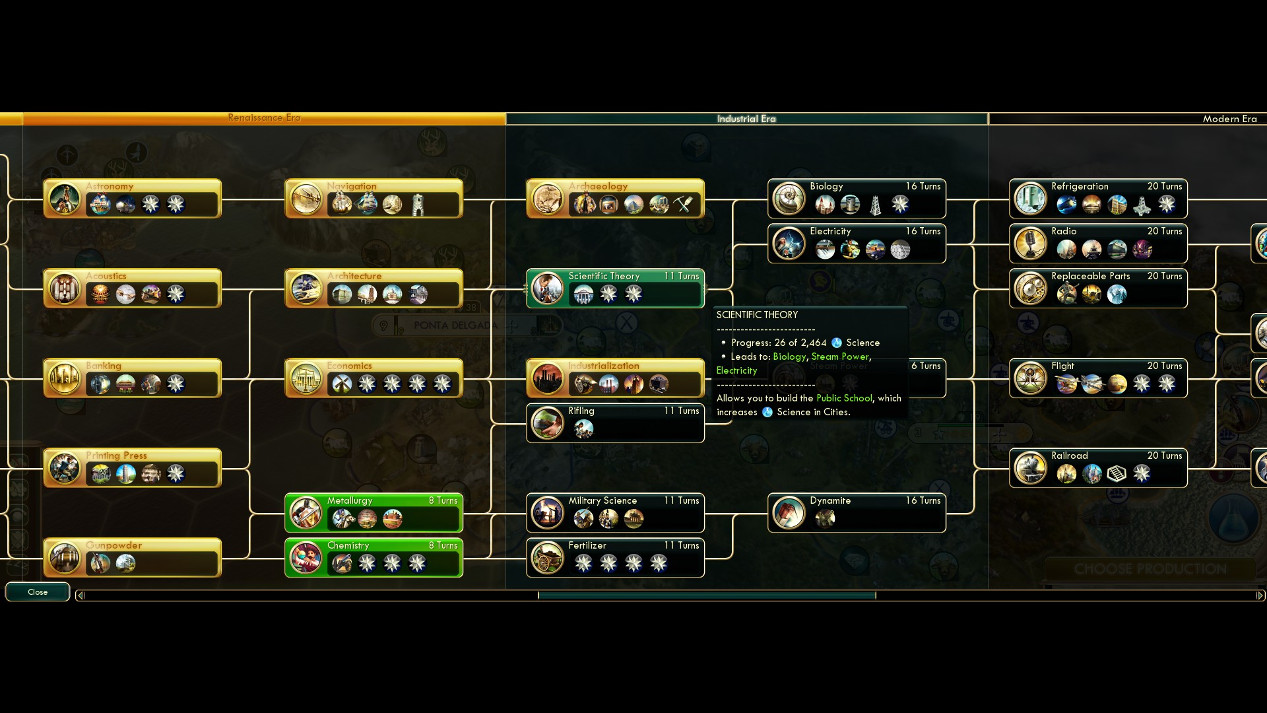 However, the Universidades also discovered some fascinating areas of research in the midst of their searches into the past. 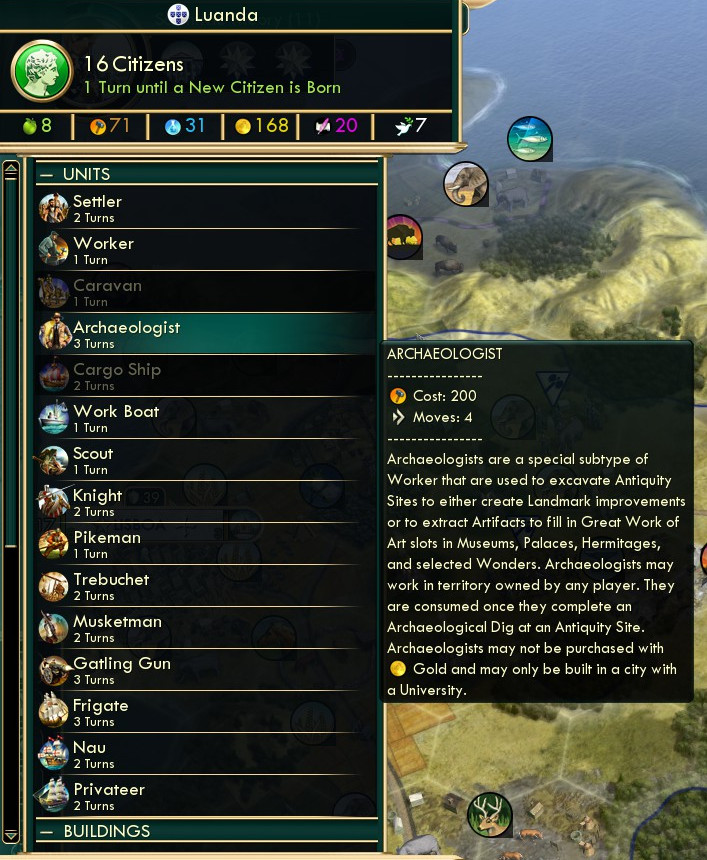 This new direction of research appealed to the ever-innovative locals of Luanda, and members of the local Universidade began to train parties of skilled explorers and scientists more about how to gleam the knowledge of the past. Archaeologists are explained fairly well in the side there, but what this does not explain is that Landmark Improvements add a significant Culture boost to the tile on which they are placed, taking an Artifact from another Civ's territory is considered a type of theft for which the Civ will dislike you and ask you to stop (with diplomatic penalties for trying to lie about it) but keeping the Improvement in another Civ's territory is considered a politically friendly gesture. Also, Artifacts can have their own theming bonuses as well, so it is worth paying attention to the type of Artifact that is spawned when the Archaeologist finishes their work. Also worth noting is that the blue and pink sites we see on the map are considered Hidden, and only Civs that fill the exploration tree entirely have access to them. 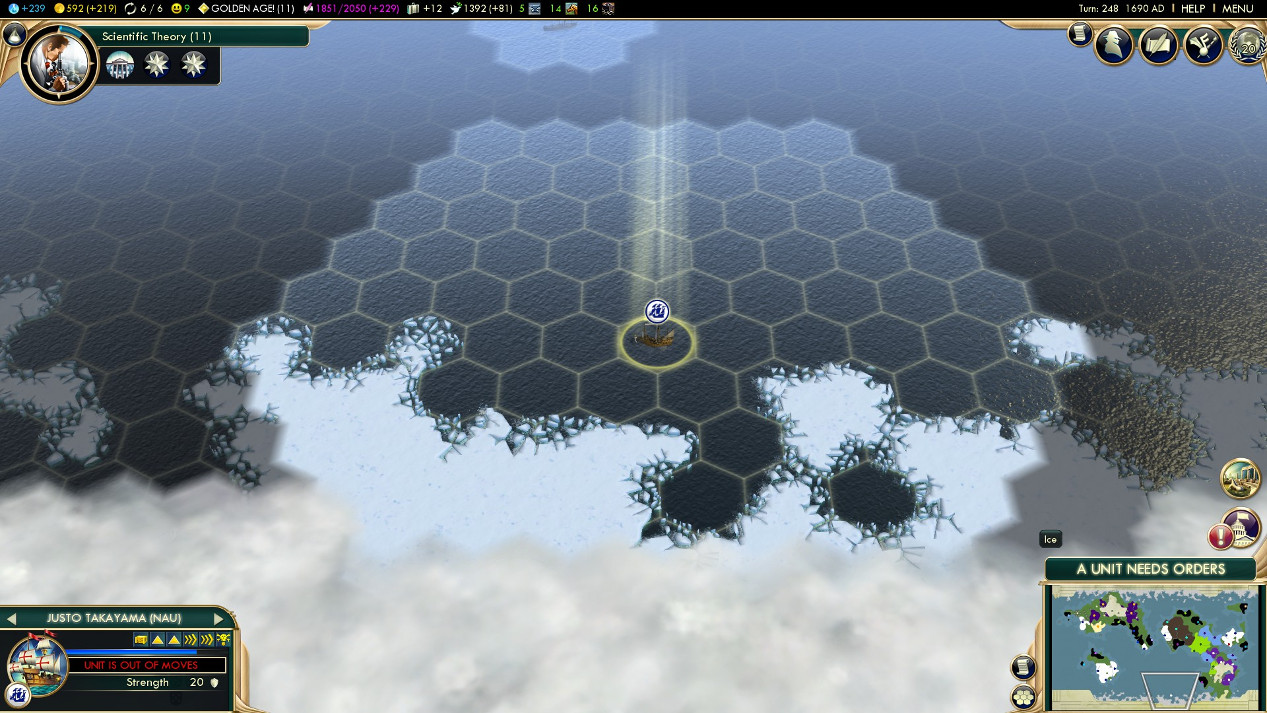 The Justo Takayama explores extremely far south in order to get a better lay of the land. However, when questioned about why they insisted on traveling so close to ice, they explained that part of the Confucian religious tradition demands a certain degree of exposure to cold water as a means of appeasing their crustacean ancestors. The Admiralty decides that it is better not to pry too deeply into Confucian religious practices. They will only cause confusion...perhaps hence the name. 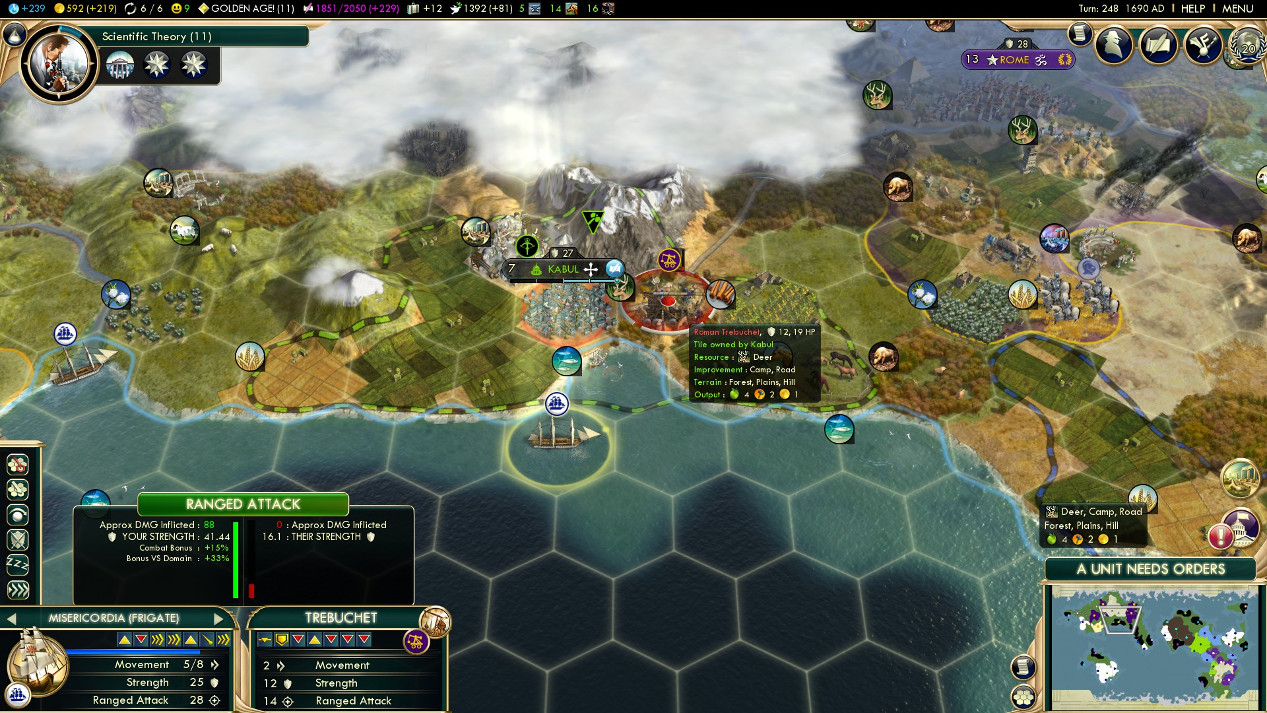 The assault force at sea makes the expected gains against Roman attempts at reinforcing Kabul.  However, the Barco is unable to capture the unusual ex-Roman Galleass, as the men aboard would sooner sink their vessel than submit to the Portuguese. 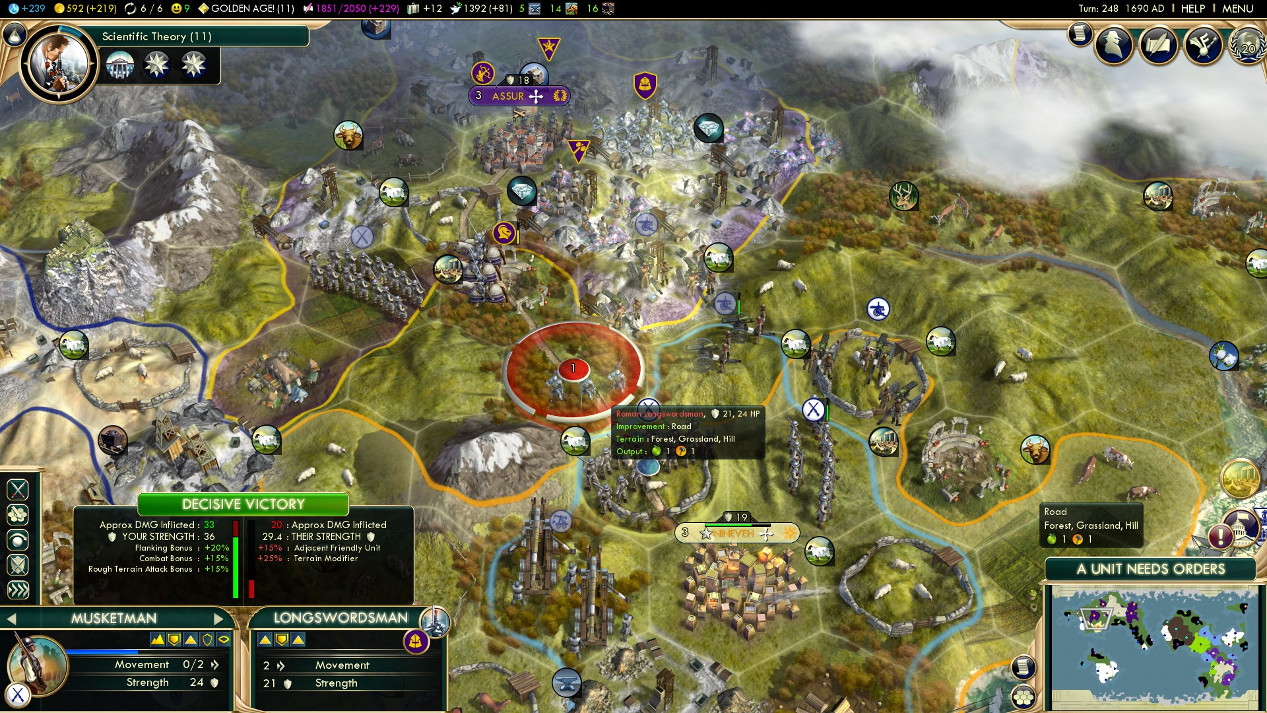 Portuguese guns decimate Roman swords, as expected, but the Romans are trained well and do not go down without a fight. 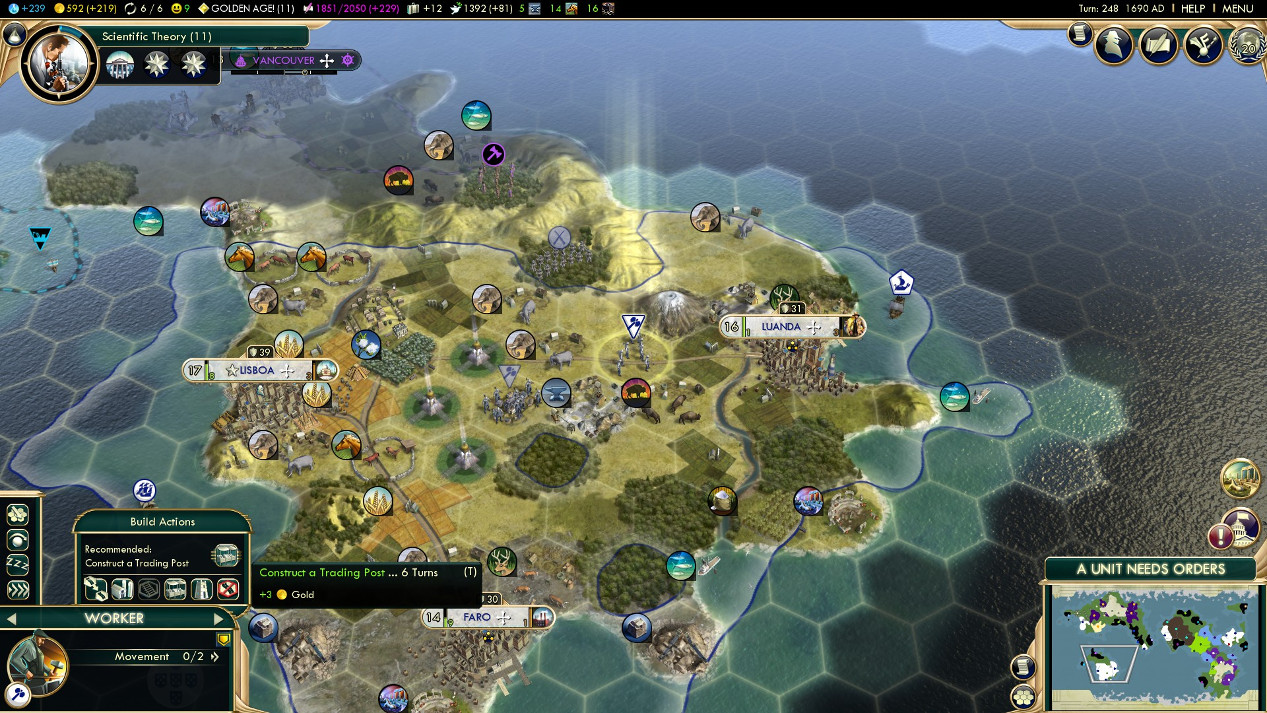 In Luanda, however, the business of commerce must always be present, and the locals build a trading post to facilitate trade between cities of the mainland. 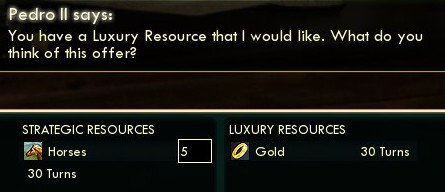 Pedro continues to make very poor offers, and Maria wonders if he may be a lost cause when it comes to international trade. 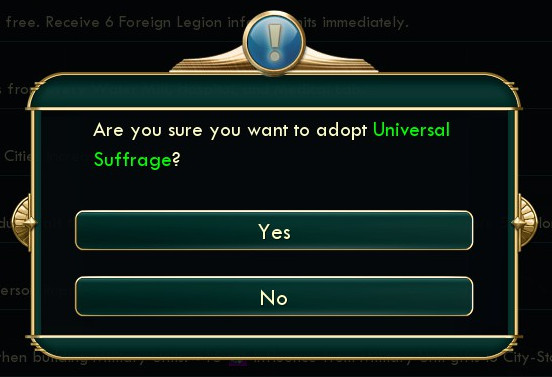 Though her reforms calling for the animal vote are shot down, Maria takes great strides to ensure that anyone calling themselves Portuguese has an opportunity to vote in the new elections, be they Sebastianist or no, Assyrian, Shoshone, or Japanese. If they live in a place claimed by Portugal, they have a right to decide who leads them. 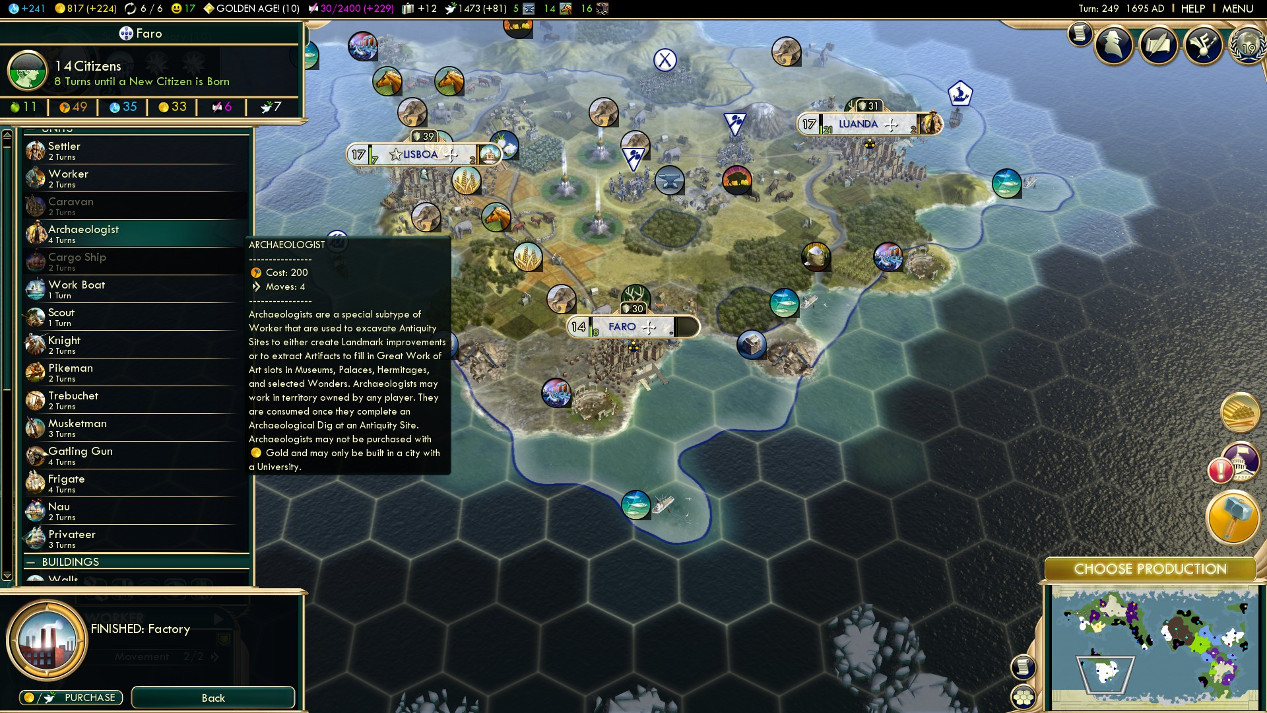 Faro, in a surprising move, also decides to explore the workings of the past, though there is a sense that they are doing so in order to find inspiring industrious heroes to lead by theoretical example. 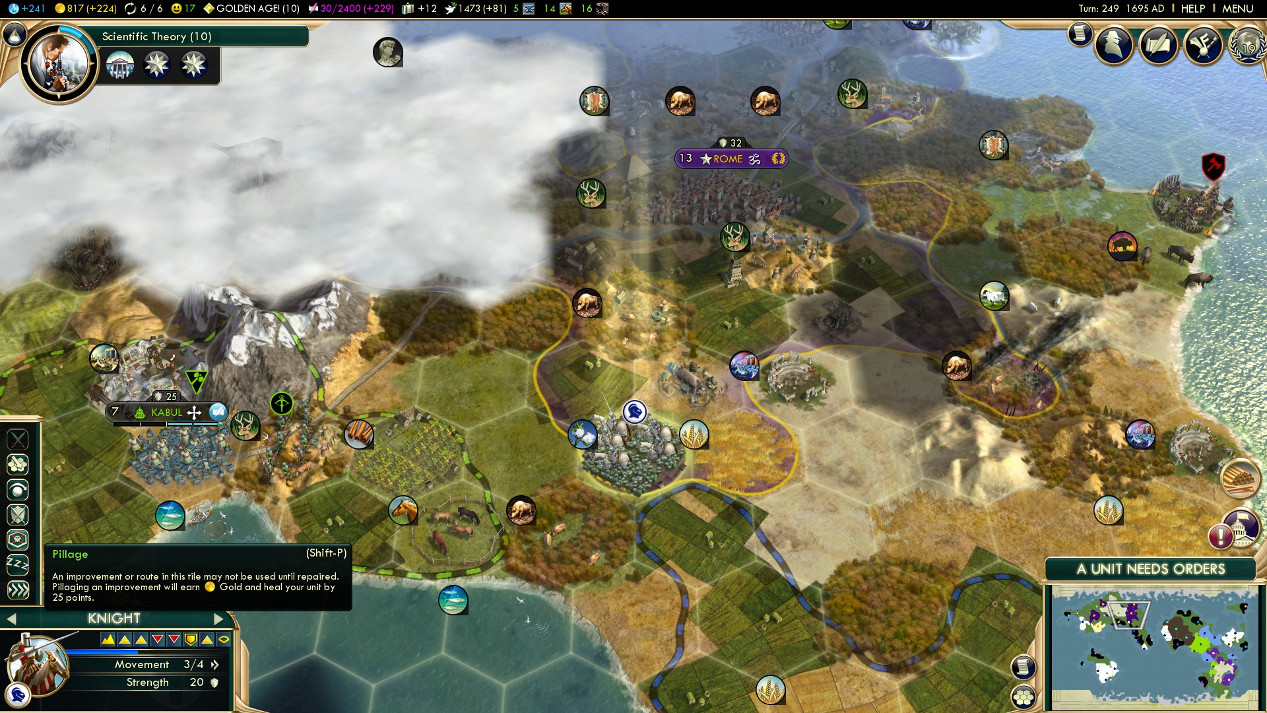 One of the Knightly orders from the mainland reaches Roman territory, and decides that the time is right to target a cotton plantation. The Afghani slaves present are freed while the plantation houses burn to the ground and the slave-masters are scattered to the winds. 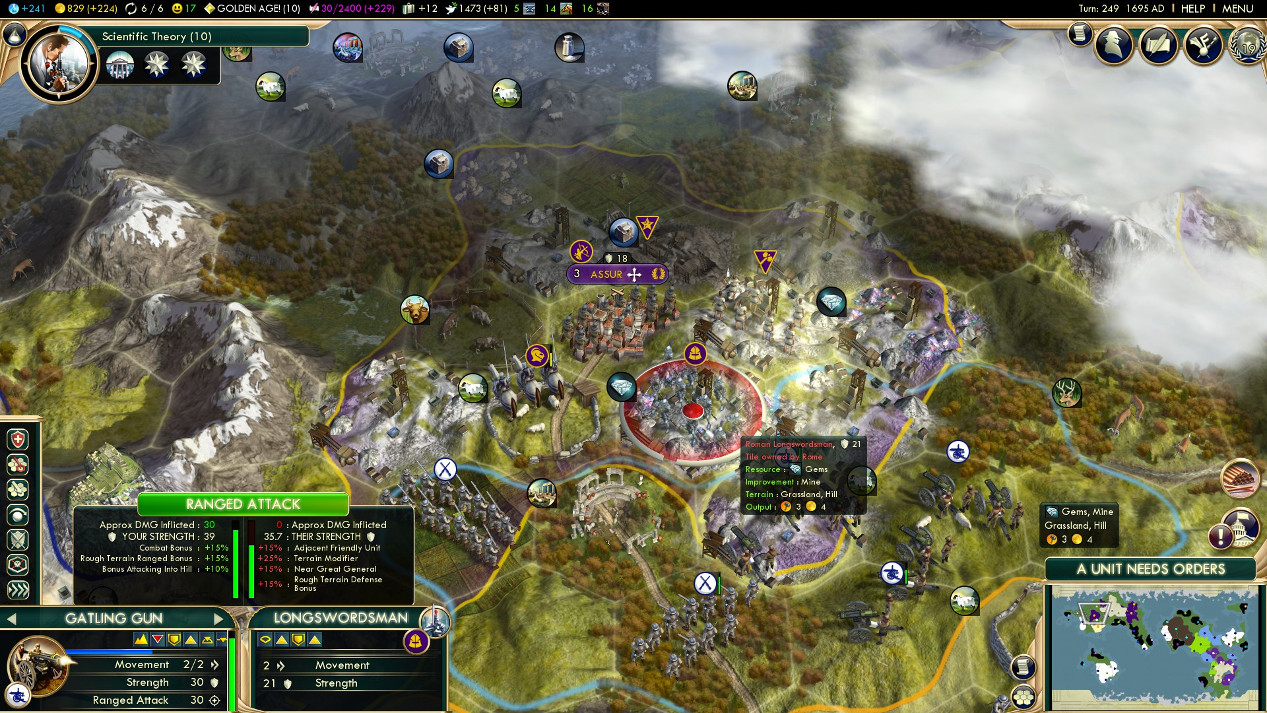 The front reforms closer to Assur, though the general charged with its defence is said to be talented and it appears as though the assault will take some time. 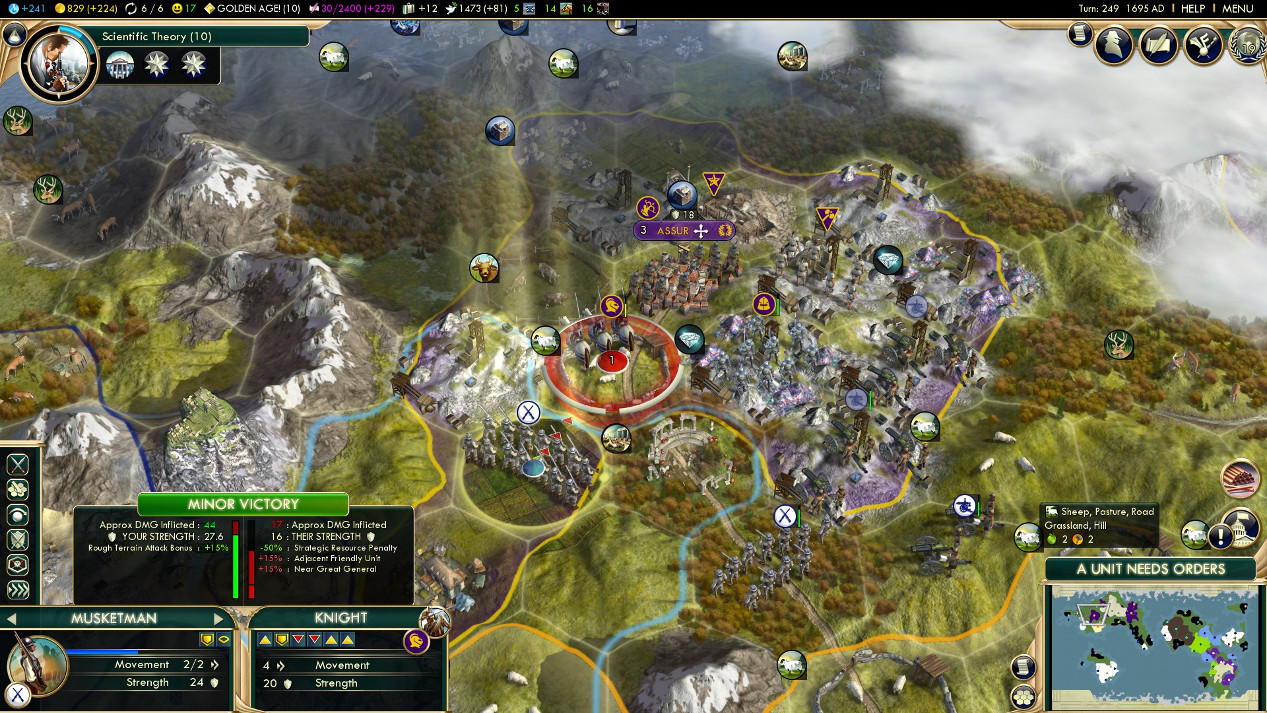 That said, chronic supply shortages mean that the Portuguese are also fighting a less effective force than they would be otherwise. According to this, the Romans are suffering a Strategic Resource Penalty, meaning that they do not have enough horses to maintain that Knight. They can still have the unit, but with a negative 50 percent modifier it may as well be dead. 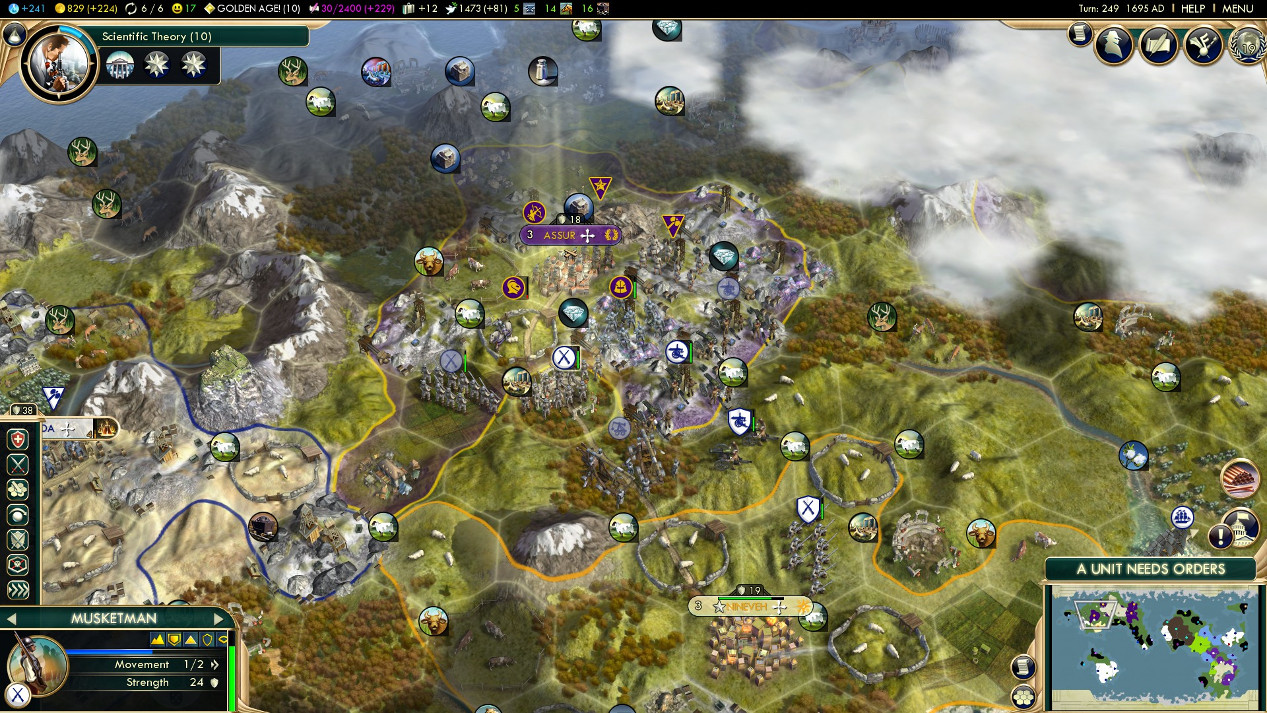 The assault force presses in slowly. 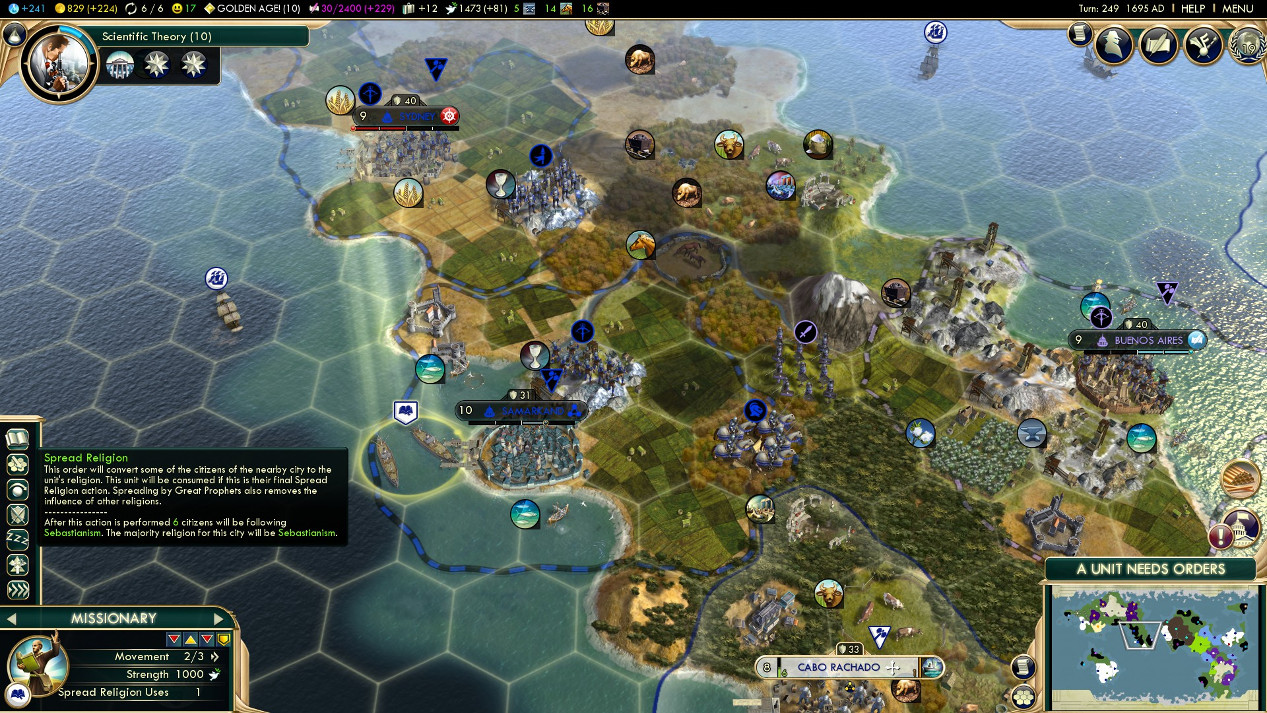 Bypassing the hostile Sydney, the Sebastianist mercenaries travel to Samarkand to spread the word of the faith, and finds receptive listeners in the locals. The spread of Sebastianism to the new continent seems all but assured at this point.  New scholars are brought into the fold, and plans are made to send them on a much greater mission. 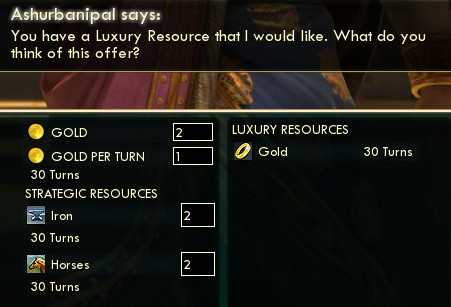 Ashurbanipal understands the value of trade. 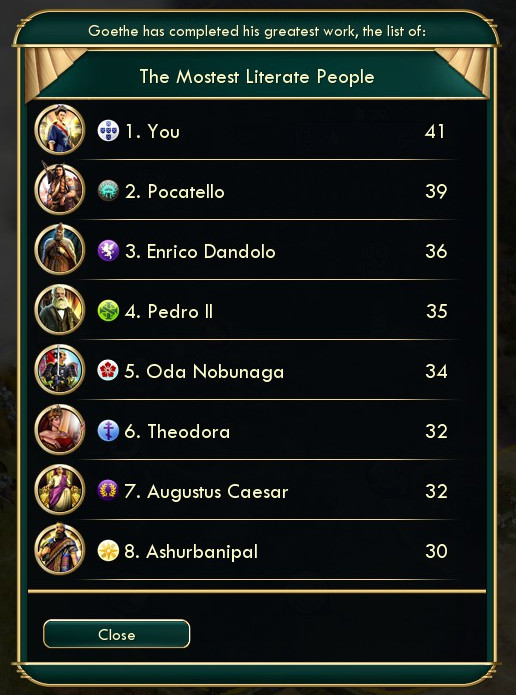 The Portuguese understand just about everything else. 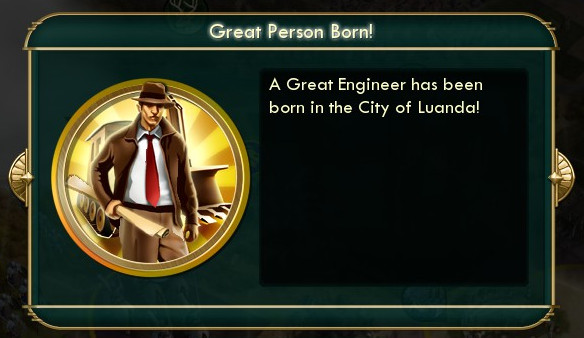 New great minds are born every day when they are free to think and act as they will. Note the new look for Post-industrial Great People. 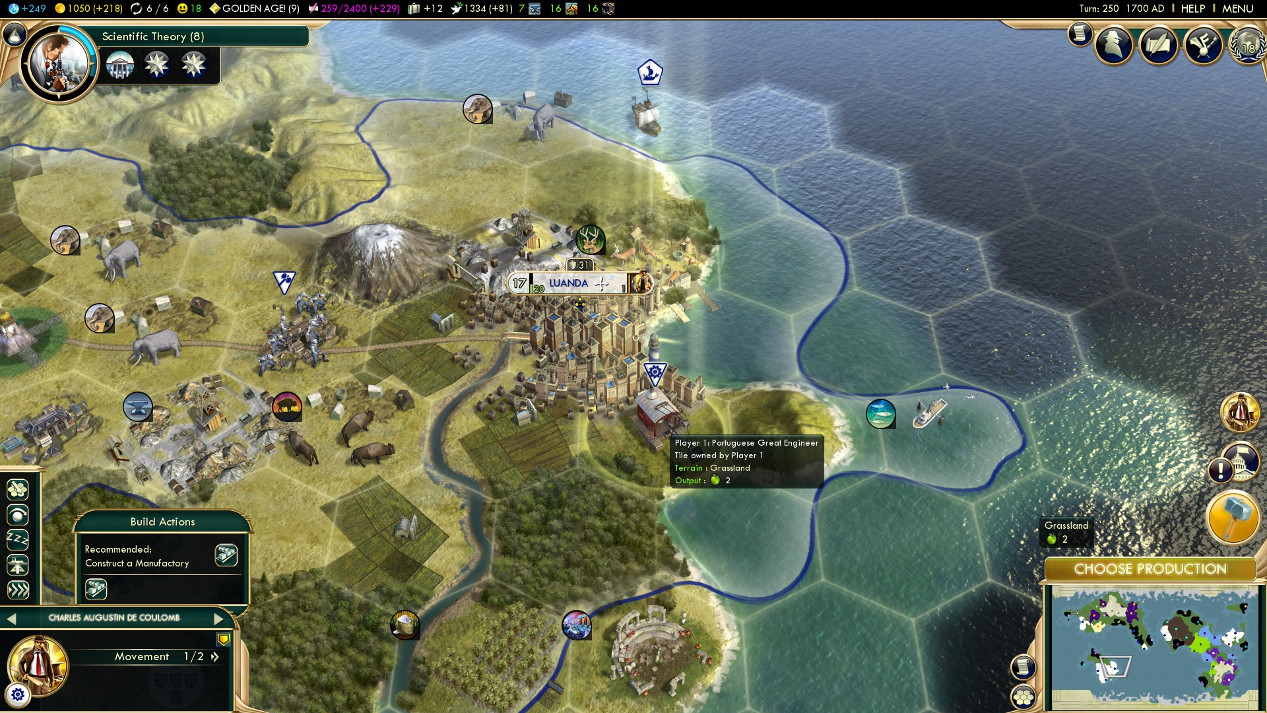 This one seeks to rival the famous shipyards of Lisboa with a manufactory of his own. 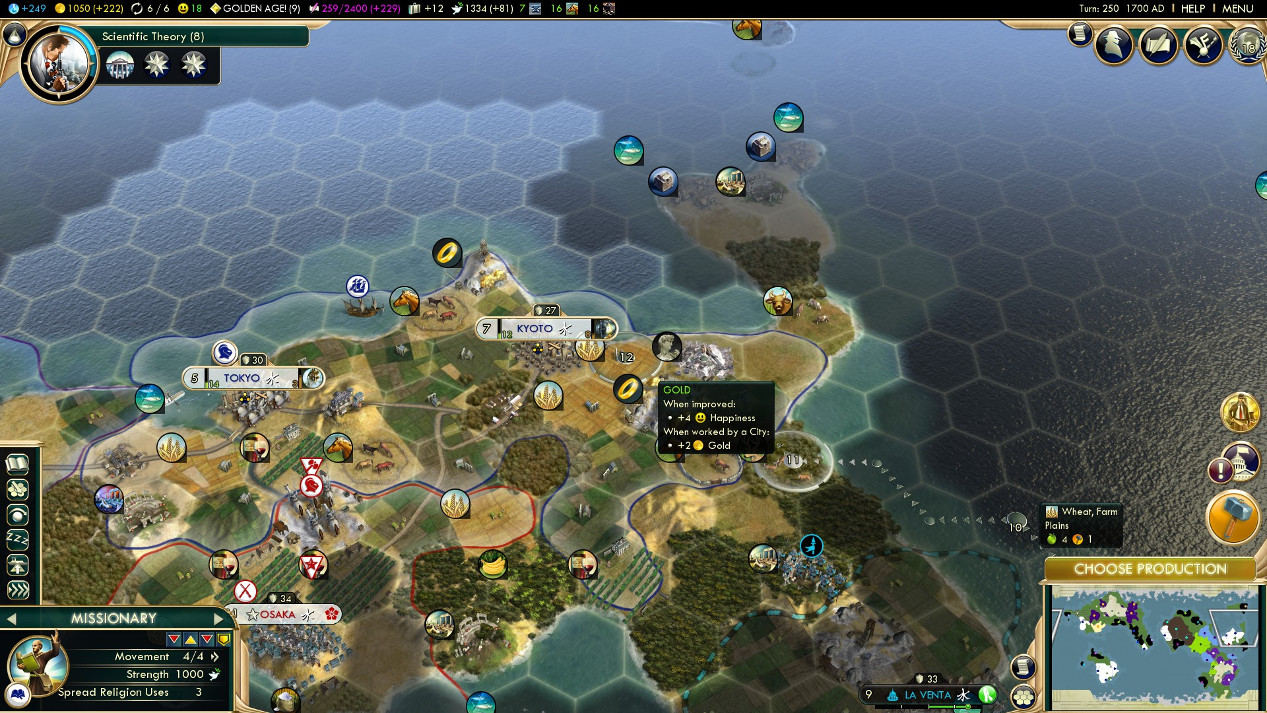 The Missionaries' new destination is Japan, to make good on promises made to educate the locals in the faith.  A retaliatory force in the East chases the Knightly liberators back into Kabul, but Andrea Doria stands ready to blast them to pieces once they blunder into firing range.  The Industrial Revolution affects all, as even the sleepy hamlet of Cabo Rachado is suddenly introduced to advanced manufacturing. 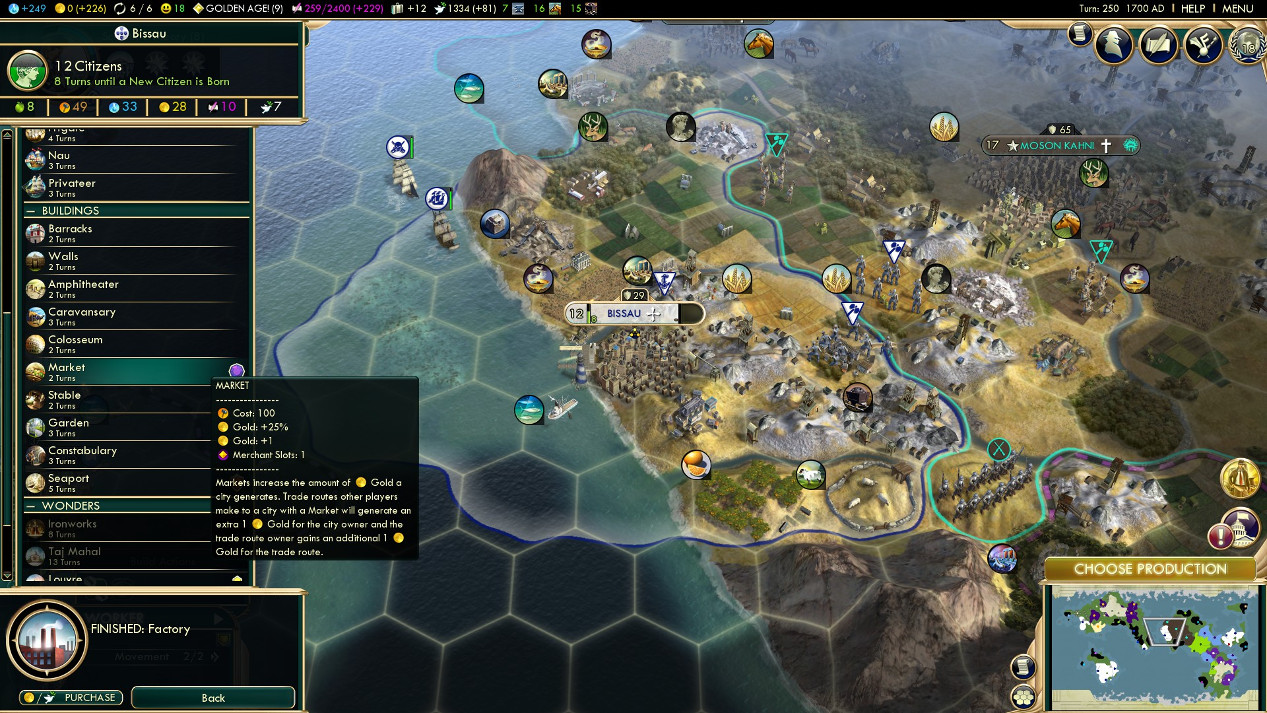 Bissau begins to explore the possibility of making more money, despite some characteristic protest from, well, Protestants. 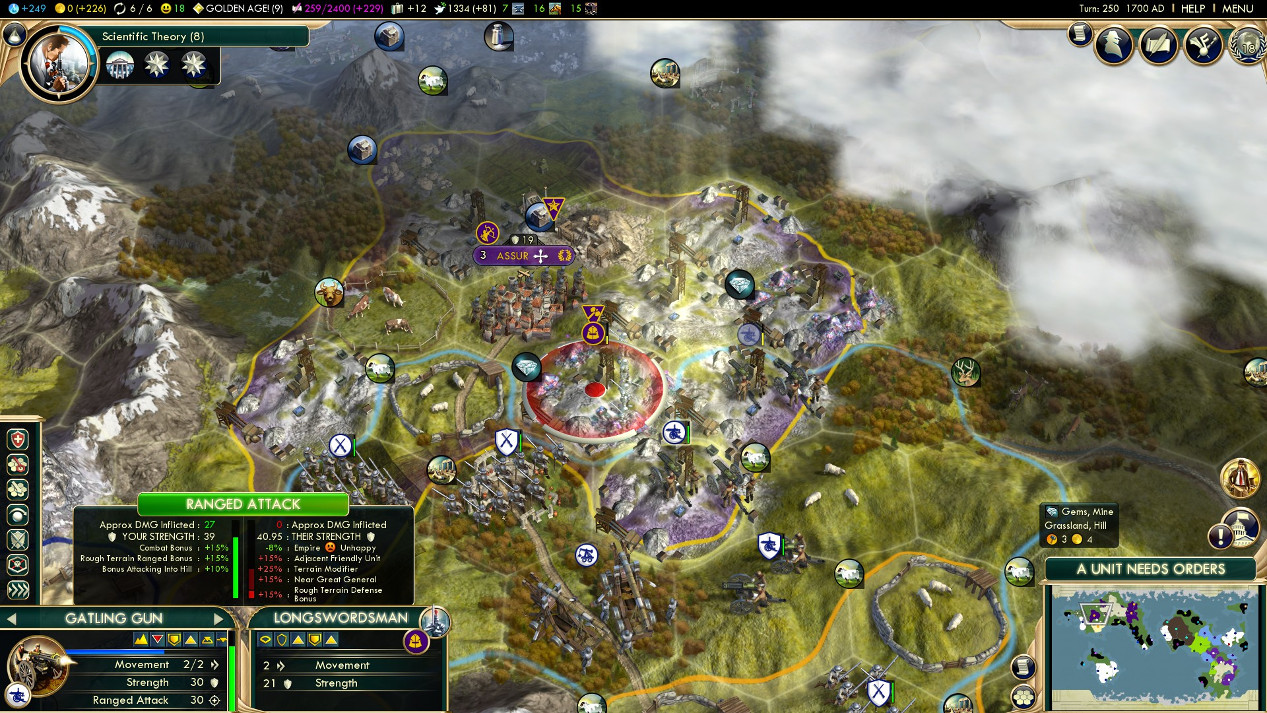 Gunfire rains down upon the Roman lines, and steel armour alone is not enough.  Upon realizing that this group was holding more Afghani hostage, the people of Kabul celebrated further upon the return of more of their long-lost relatives. 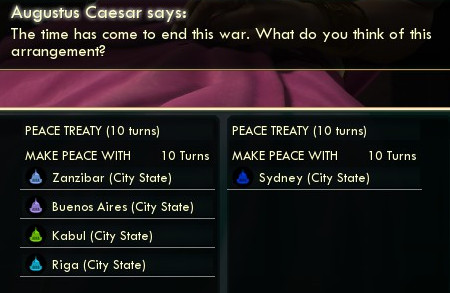 The Roman makes a pathetic excuse for a peace deal, and is rejected out of principle.  Doge Dandolo once again offers his hand in friendship, and to this, President Bragança is willing to concede that he may be making a good deal.  The Byzantines will always be friends to the Portuguese.  Brazil, however, also has a place as the architect of this strange web of allegiance. 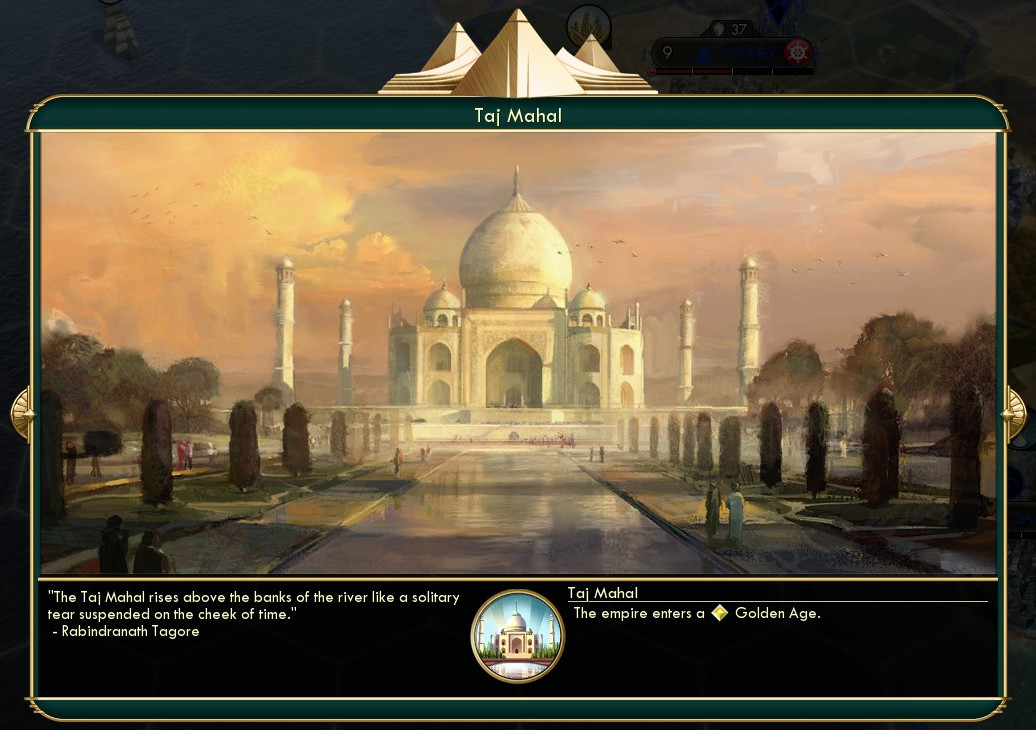 It is in the spirit of this togetherness that the palace of Lisboa is reborn as a building dedicated to art. Architecture as a measure of the power of the people, not just their monarch. (This added 20 turns to our extant Golden Age counter, which means we will be in a Golden Age for nearly 50 turns. Not too bad.) The celebrations continue long into the night.  During these celebrations, a lauded composer presents his latest piece to the populace. 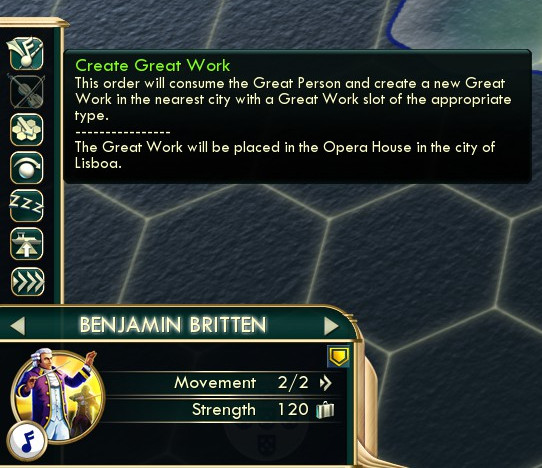 It is said to be a piece composed of samples of works from pieces he has heard in his travels around the world. 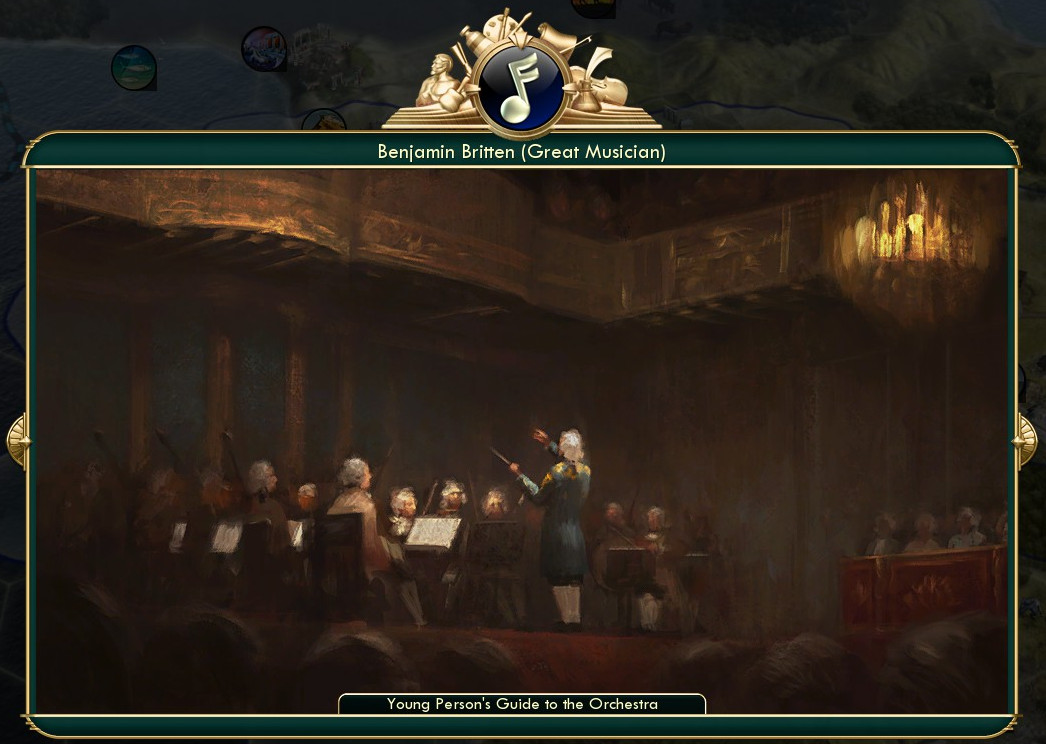 The medley is profoundly well-received and is said to be a wonderful way to experience world travel from its home in the Lisboan opera house. The other option for Great Musicians is to undertake a Concert Tour in another Civ's territory, which causes your Tourism score with that Civ to jump suddenly. If you want to gain Culture, though, it is work making the Great Work instead.  As anticipated, the Romans find themselves in cannon range and suffer wrathful retribution.  In the counter-charge, the Knights manage to corner and eliminate a famed Roman general, causing morale to plummet among their ranks. 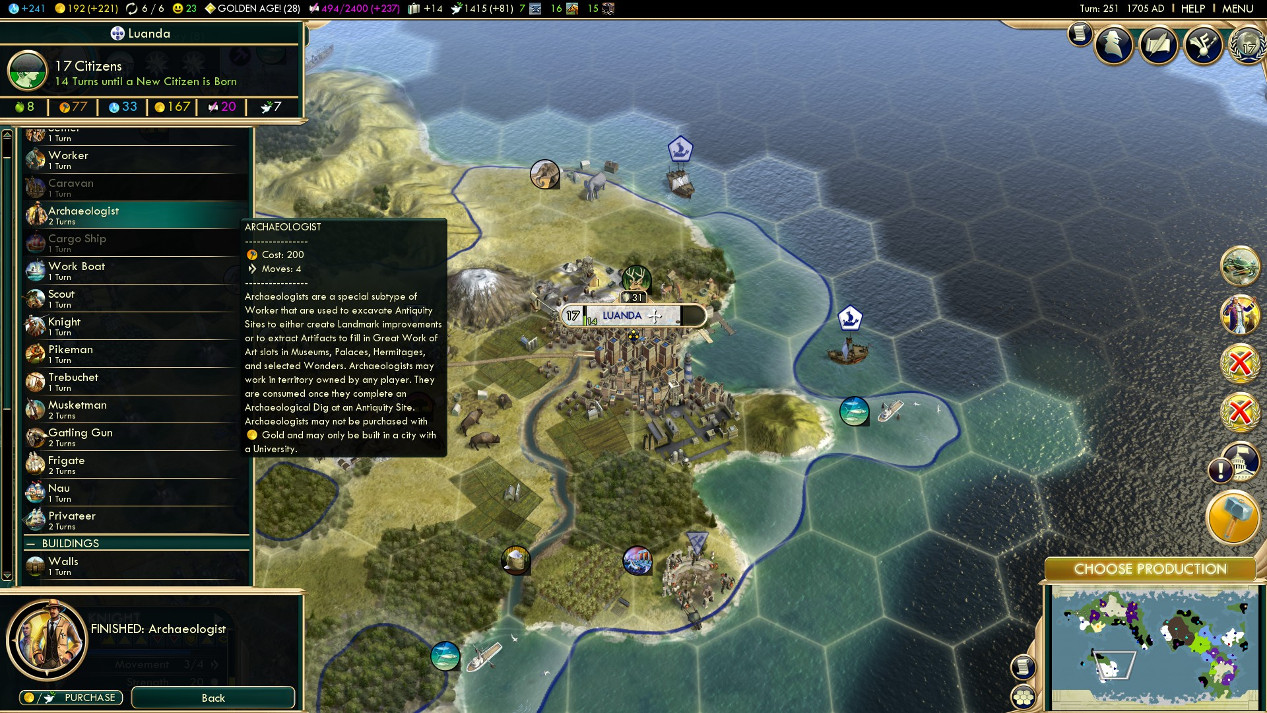 Luanda continues to make good on their promise to learn about the past. 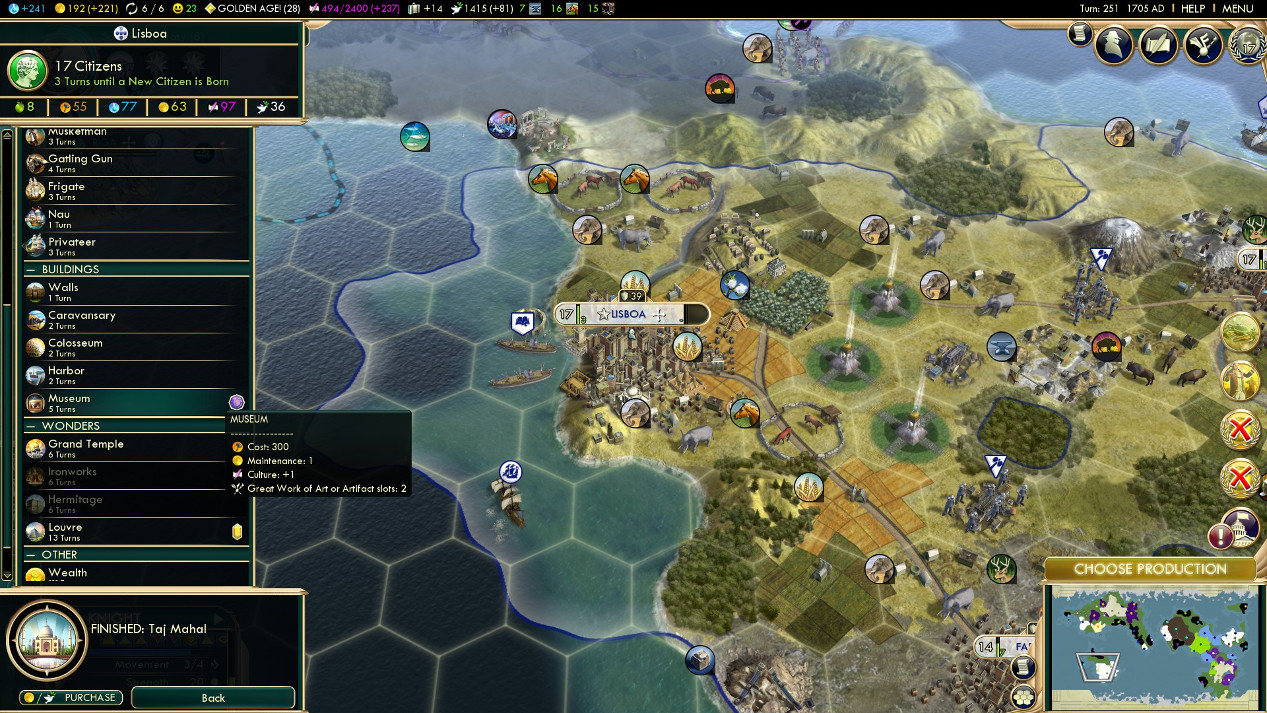 The ever-supportive capital responds in kind by offering a place to keep the resulting discoveries.  The Shoshone continue to display small appreciations for Portuguese actions on a global scale. 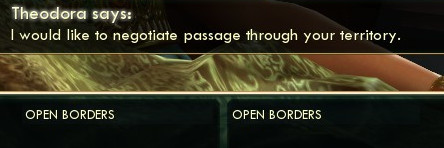 Byzantine borders are opened to the Portuguese once again in exchange for similar considerations.  Brazilians and Portuguese are joined at the hip if ever any two distinct cultures were. 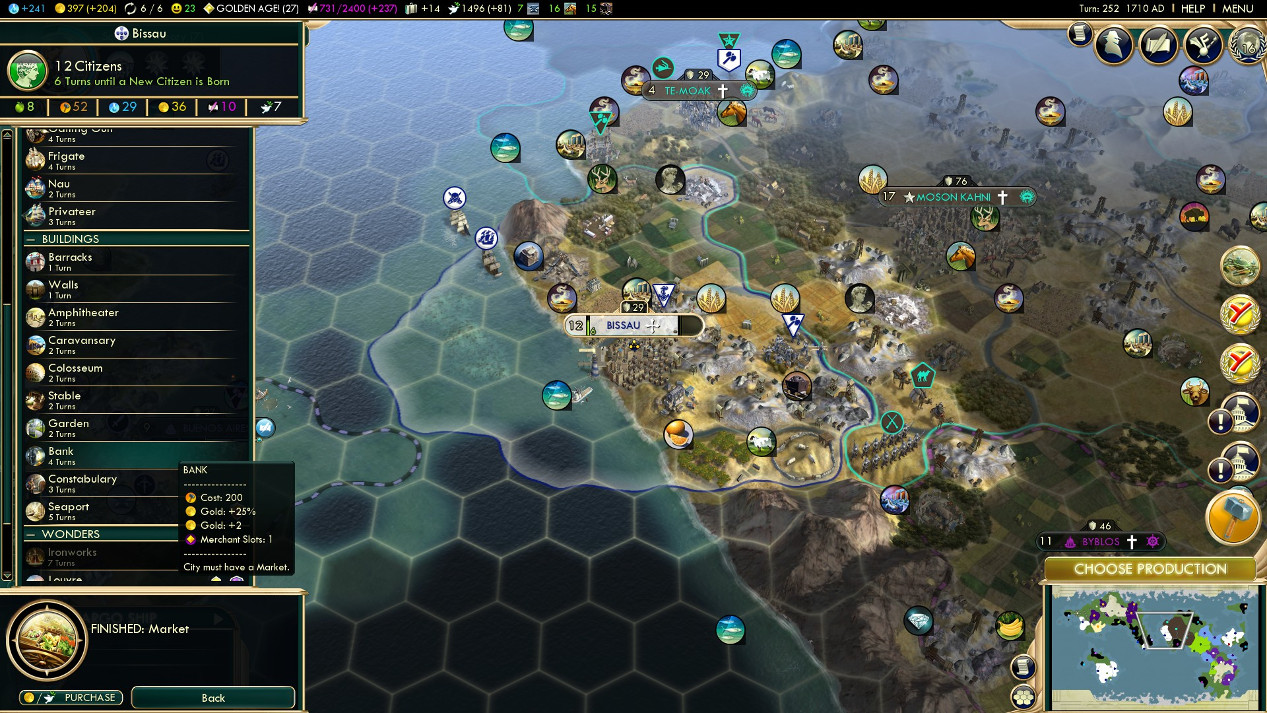 Bissau only grows wealthier, at times despite itself. 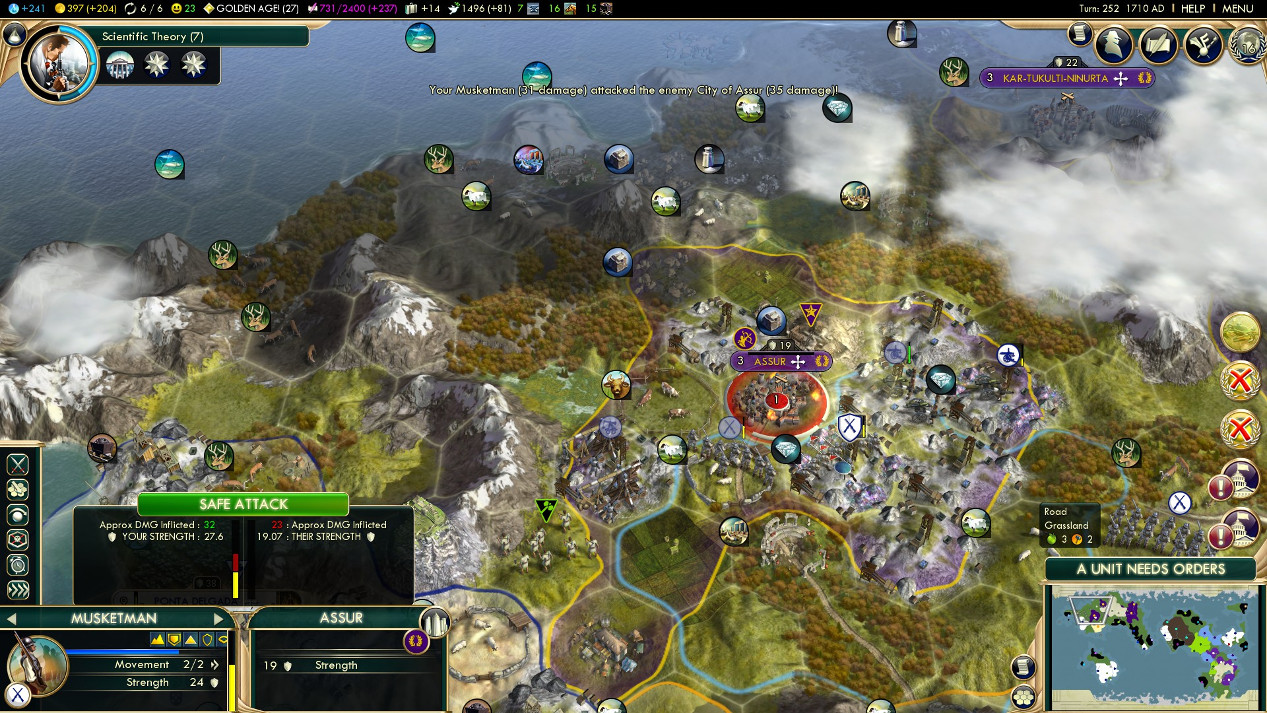 The Açorean muskets rain down fire upon Roman occupiers. 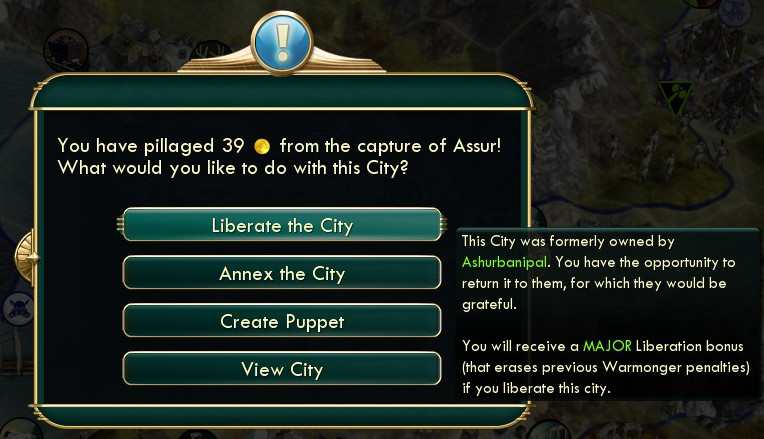 With predictable results.  The gears of the economy continue their eternal grind. 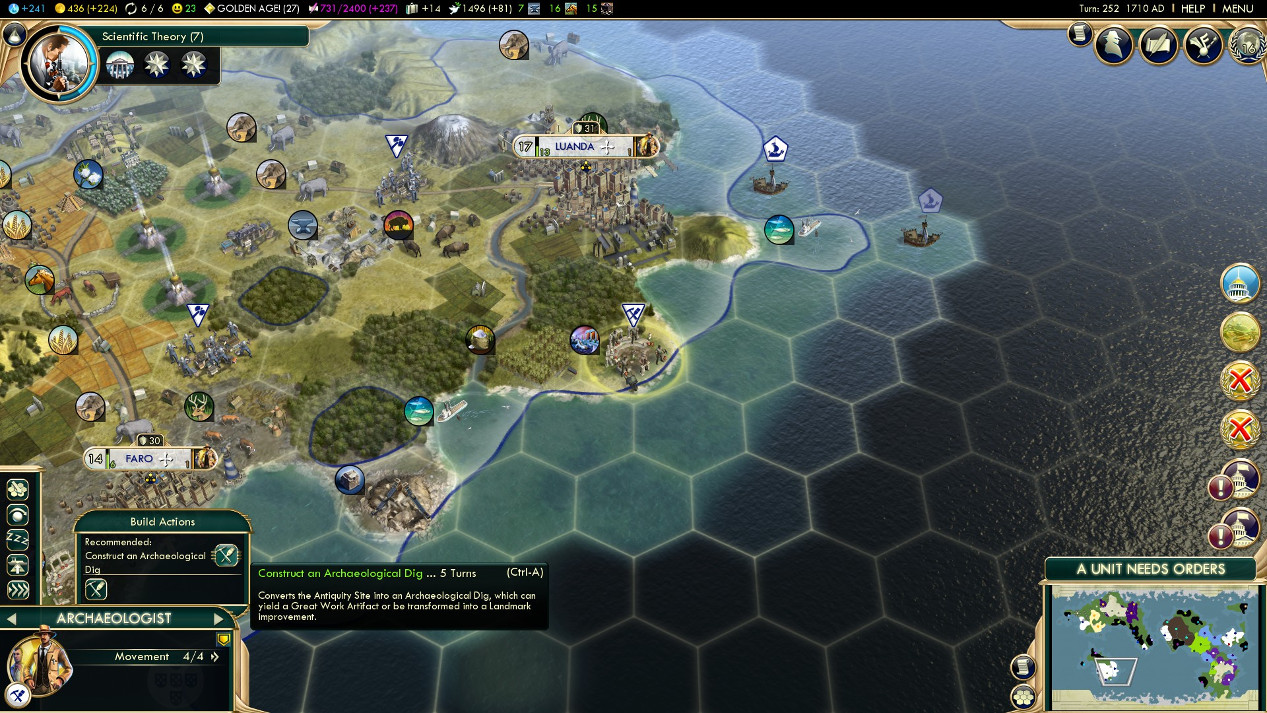 However, the time has come to unlock the meanings of the past.  Finally, the Shoshone leader displays an unprecedented willingness to bury the hatchet, and historic portraits are painted as President Bragança shakes his hand for the first time ever in the city of Bissau. The move is lamented by Protestants and Sebastianists alike due to supposedly irreconcilable differences between both groups, but on a global scale this new friendship represents the creation of the largest and most significant alliance the world has ever known.  Words of congratulations flood in as President Bragança considers her next move.  Of course, old friendships must be reinforced as ever by promises of mutual protection. 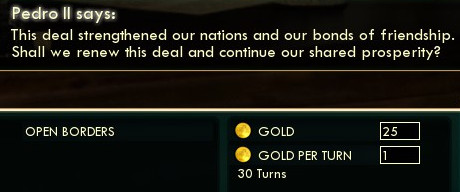 As well as economic considerations for services rendered. 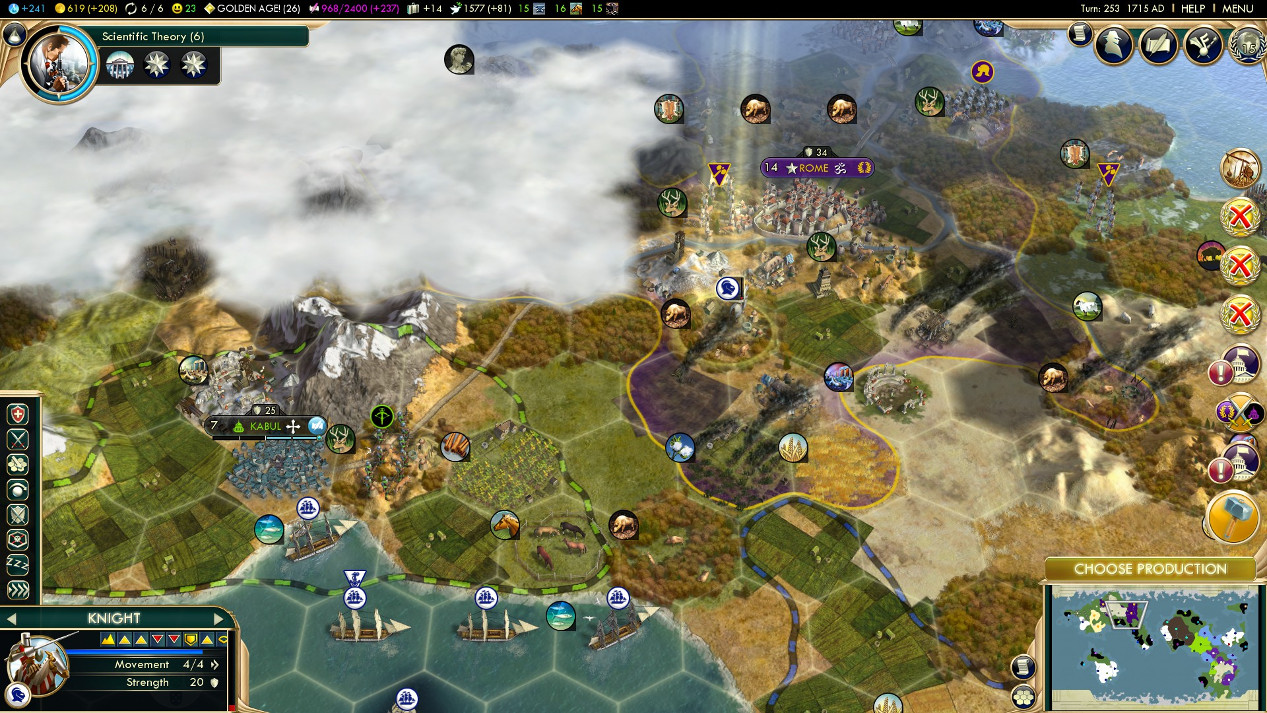 However, the political future of a hated enemy remains in the balance... We want the Romans punished, that much is clear, but the question is a matter of degree. We have the option of treating them as we did the Japanese. By capturing and installing puppets in Rome and possibly at least one other city, we can ensure that they can never again attempt such aggressive actions against other nations. This would of course also gain us access to their Wonders, Luxuries, and Great Works, and we would incur absolutely minimal diplomatic penalties for doing so since we are friends with every other nation and they all still hate Rome (I hovered over the city and saw that I would incur Minor penalties at worst for capturing the Roman Capital). Alternatively, we settle for the liberation of the remaining Assyrian territories and resolve the conflict quickly. This will likely be easier as I am certain we can negotiate that as a deal with Rome in short order, but it will likely...be a less interesting finish to the story both narratively and mechanically. We will miss out on seeing part of the interior of this continent, too. Either way, let me know what you all think. Also, sorry for the wait and intense length of this one post, as I will try to make them shorter for the future. Voting will close Friday.
|
|
|
|
At this point, a capture and occupation of the Roman capitol would be a mercy upon the people of the city.
|
|
|
|
Capture and occupation.
|
|
|
|
Since we're already in this liberation business, might as well also liberate some Romans of their holdings while we're at it. Capture and occupy!
|
|
|
|
Capture and occupy, since Roman empires do have a history of falling at the end.
|
|
|
|
Senhor Caesar has proven himself an enemy of the people, of both Assyria and Rome; liberate Rome and another city from his grasp, and reduce him to a more fitting stature, as a petty governor of a rump state. [So yes, Capture and Occupy]
|
|
|
|
Capture Rome! All those tasty wonders and works of art are just waiting for us!
|
|
|
|
Nekomimi-Maiden posted:Senhor Caesar has proven himself an enemy of the people, of both Assyria and Rome; liberate Rome and another city from his grasp, and reduce him to a more fitting stature, as a petty governor of a rump state. I agree! We should pet Senhor Caesar's rump!
|
|
|
|
Capture and Occupy!
|
|
|
|
Portugal is a nation of peace, of prosperity. We're not mindless warmongers who're out to take for the sake of taking, we defend for the sake of the innocents. We're not godless heathens, but instead we turn to Sebastianõ in our times of strife to see us to a brighter future. Too bad for Rome they've constantly proven they can't fit into such a world! Capture and Occupy!
|
|
|
|
Romans have proven themselves time and time again to be heedless warmongers. We must take decisive action and occupy Rome and install a puppet regime. Also another course of action - with the advent of archaeology, numerous cultural heritage sites are in vulnerable locales to raiders and other hostiles. We must settle encampments at as many of them as we can to ensure that mankind's historical legacy is preserved. There is a spot east of Sydney that is prime for such holdings - and it itself is a wealthy locale regardless. (Also, has Petra even been built yet? If it hasn't, that spot I'm thinking of is a desert, so you absolutely could nab that extra trade route.)
|
|
|
|
Well, sounds like we have a pretty strong directive going forward, so unless people come out of the woodwork to call for an earlier peace before, say 6 PM Eastern tomorrow, I will go ahead and end Caesar's rule over Rome.Gyra_Solune posted:(Also, has Petra even been built yet? If it hasn't, that spot I'm thinking of is a desert, so you absolutely could nab that extra trade route.) I may have skimmed over it earlier, but Byzantines have Petra...which they built in Adrianople while Constantinople was still in Japanese hands. Great priorities there, guys. Pvt.Scott posted:I agree! We should pet Senhor Caesar's rump! This gets top marks from me.
|
|
|
|
I can't even be mad about that rewriting of my quote. Pity about Petra, though.
|
|
|
|
Vae victis! Rome must be occupied.
|
|
|
|
All right, looks like the thread vote is unanimous. The time has come to help Nero get some fiddle practice. Update to follow.
|
|
|
|
ModeWondershot posted:help Nero get some fiddle practice. You name your updates, right?
|
|
|
|
ModeWondershot posted:The time has come to help Nero get some fiddle practice. 
|
|
|
|
  "Senhora Presidente, the colonial venture firm we were discussing in Cabo Rachado has been purchased by the Crown...I should say the Treasury." Antonio Salazar tripped slightly over his words while briefing the President. 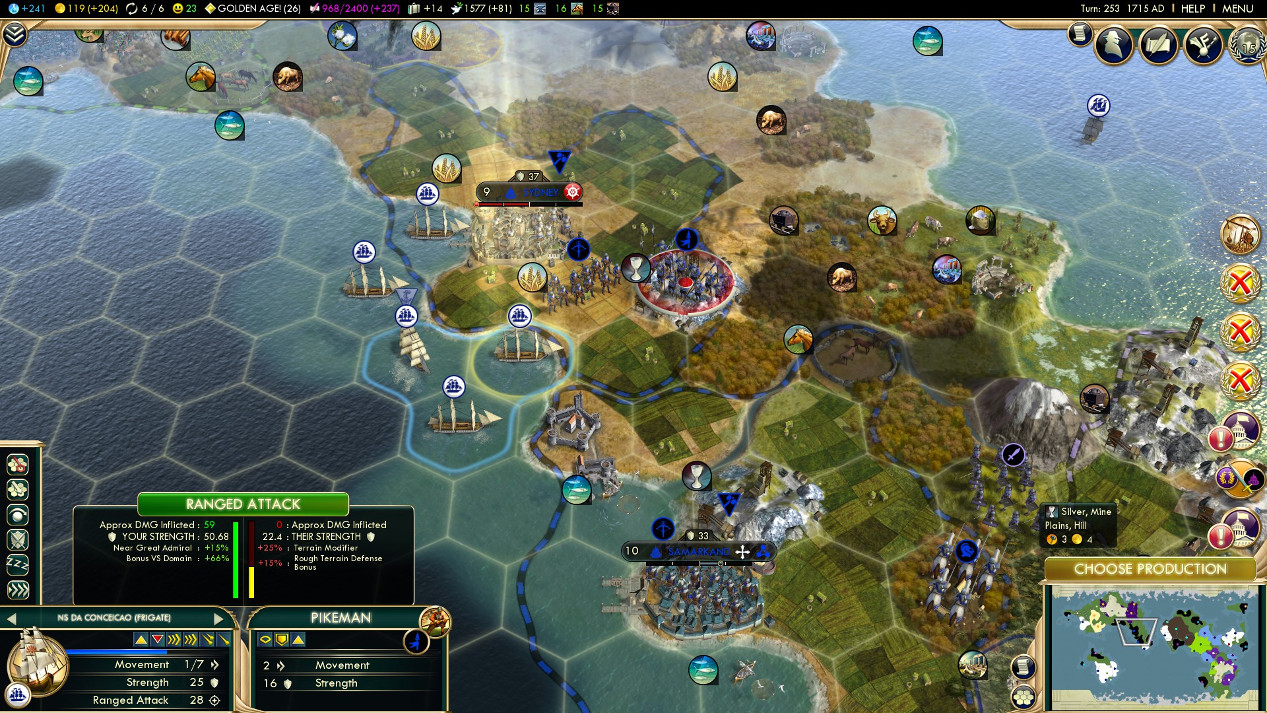 "Though Sydney was a concern due to its placement near the eventual site, Doria and his forces are more than a match for Sydneysider ground units." "Make sure they understand the city is not to be targeted. They are simply beholden to political ties to the Roman, and we will have to mend relations once the conflict is over." She replies coolly. "Of course." 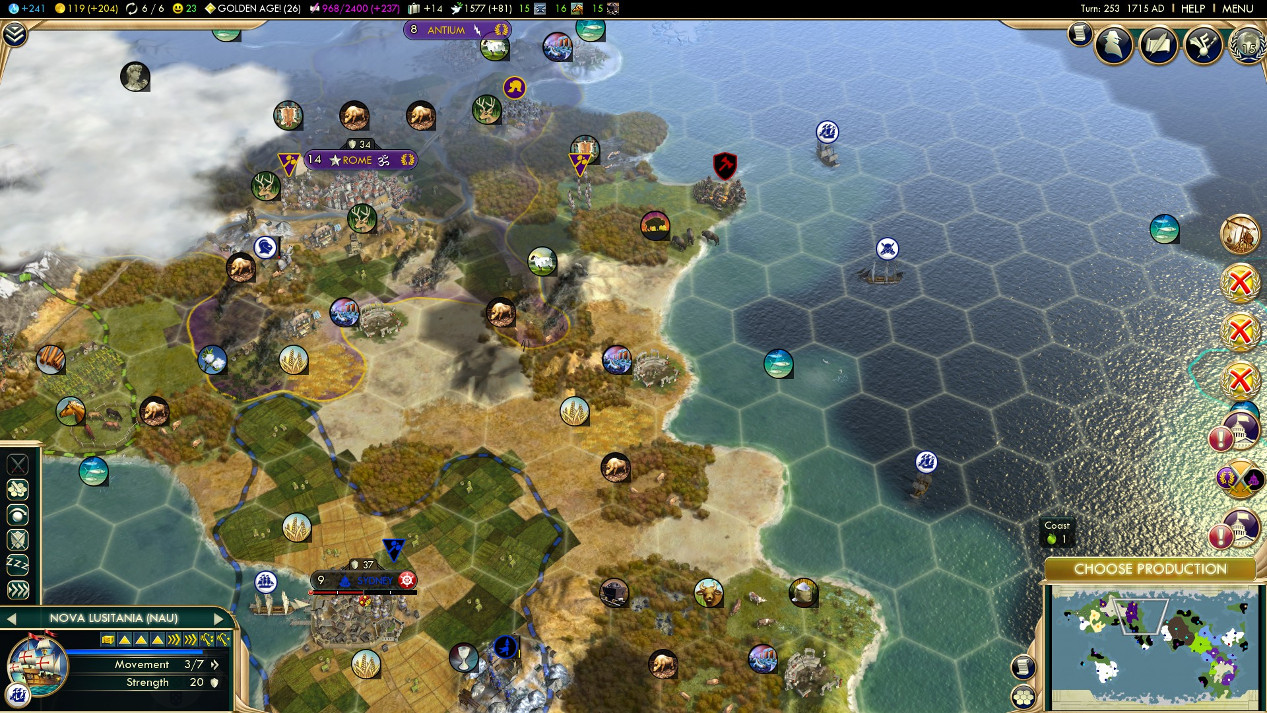 "Almeida's crews are providing substantial intelligence of the entire north end of the cape." Salazar continues. "The coast should be clear for settlement and devoid of any Roman intervention for some time, and in the unlikely event of an assault it can be easily reinforced by the Armada." 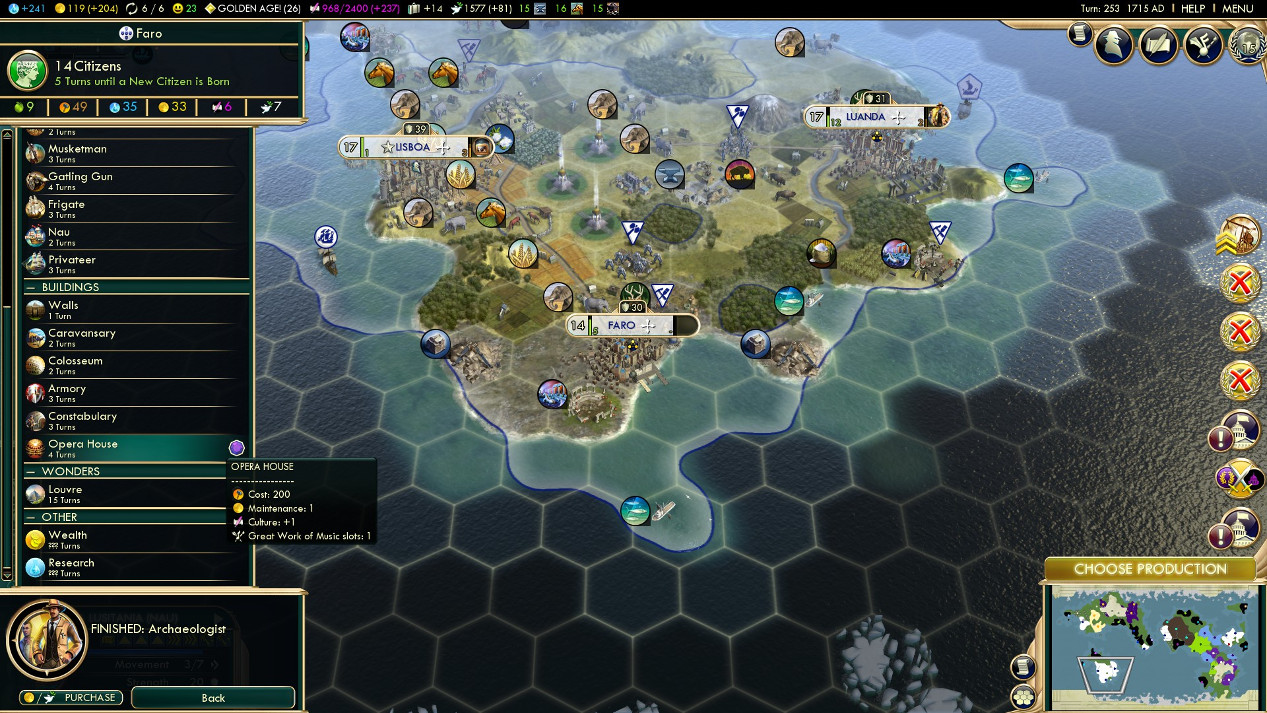 "If we are done here for now, I have an appointment in Faro. I hear they are going to perform Britten at the opening." "I am afraid I have no ear for music, Senhora." 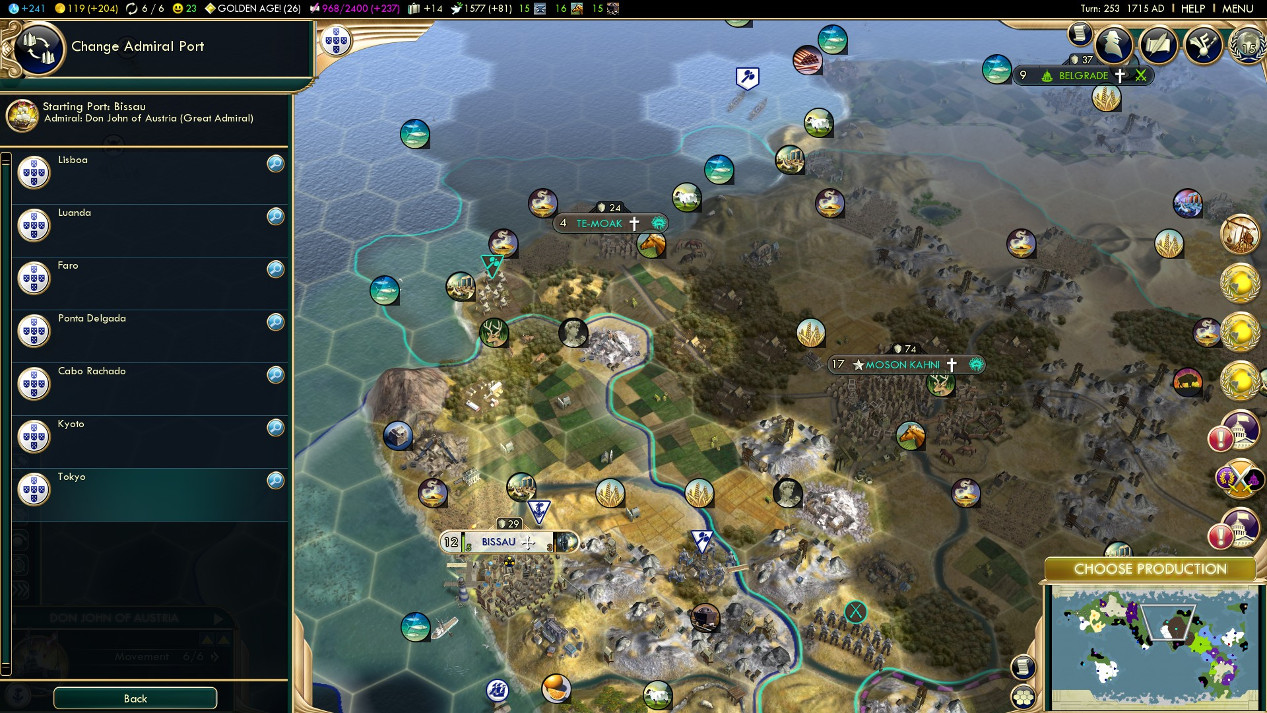 "Oh, you should also know that Almeida wrote me from Tokyo. He says that the Japanese Confucians are full of fascinating sayings, and only someone like yourself could possibly make sense of them." "What business is it of mine to make sense of absurd heresy?" President Bragança stops and regards her financial advisor sternly. "Don't take that tone with me, Antonio. I've heard from the Casa. They told you that your new position was a demotion, which is a lie. You're making a greater difference in your nation here than you would have in private enterprise." "The Estado Novo was..." "Not what we needed." She cuts him off sharply. 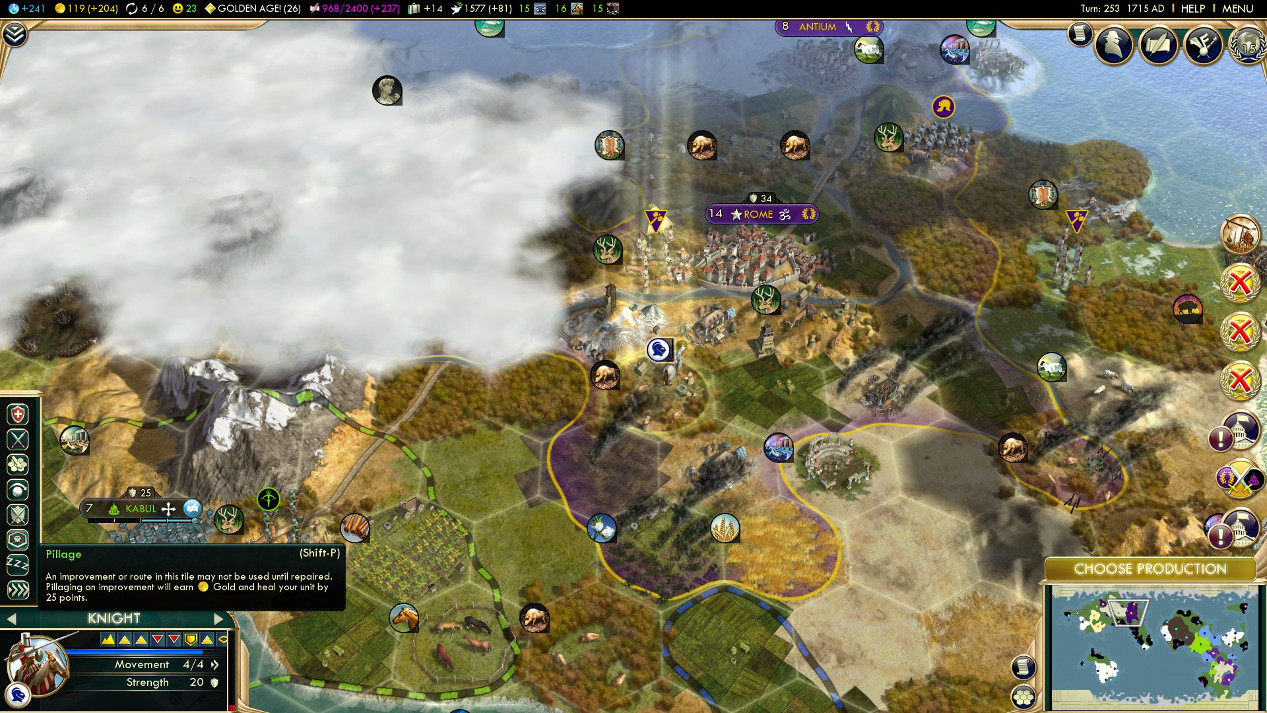 "Were we to live in a brutal world like the Romans seem to believe we do, then I can understand that your idea might have been regarded with more merit. However, we are blessed with the kind of enlightened thinking that affords us a better choice." 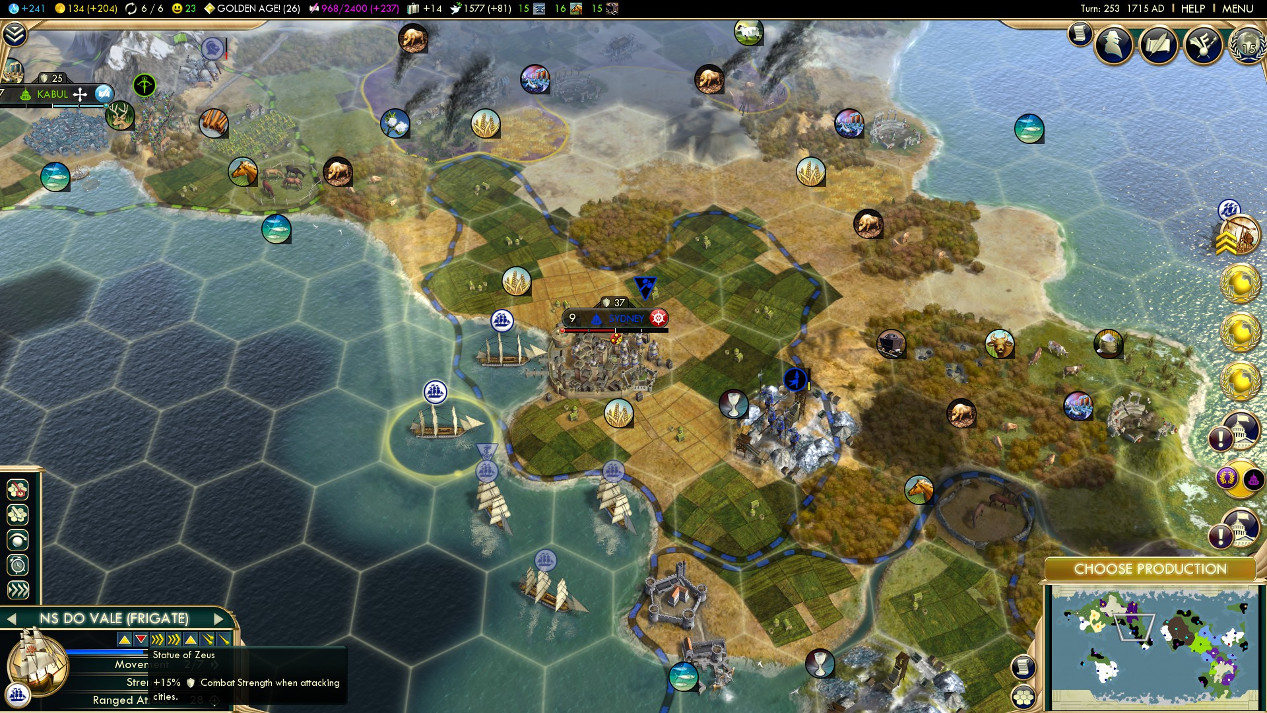 "Our actions on behalf of the Assyrians mean that even their primordial war god affords us protection in times like these. Would we have been given such a chance to realize this blessing had we not shown them their due mercy?" 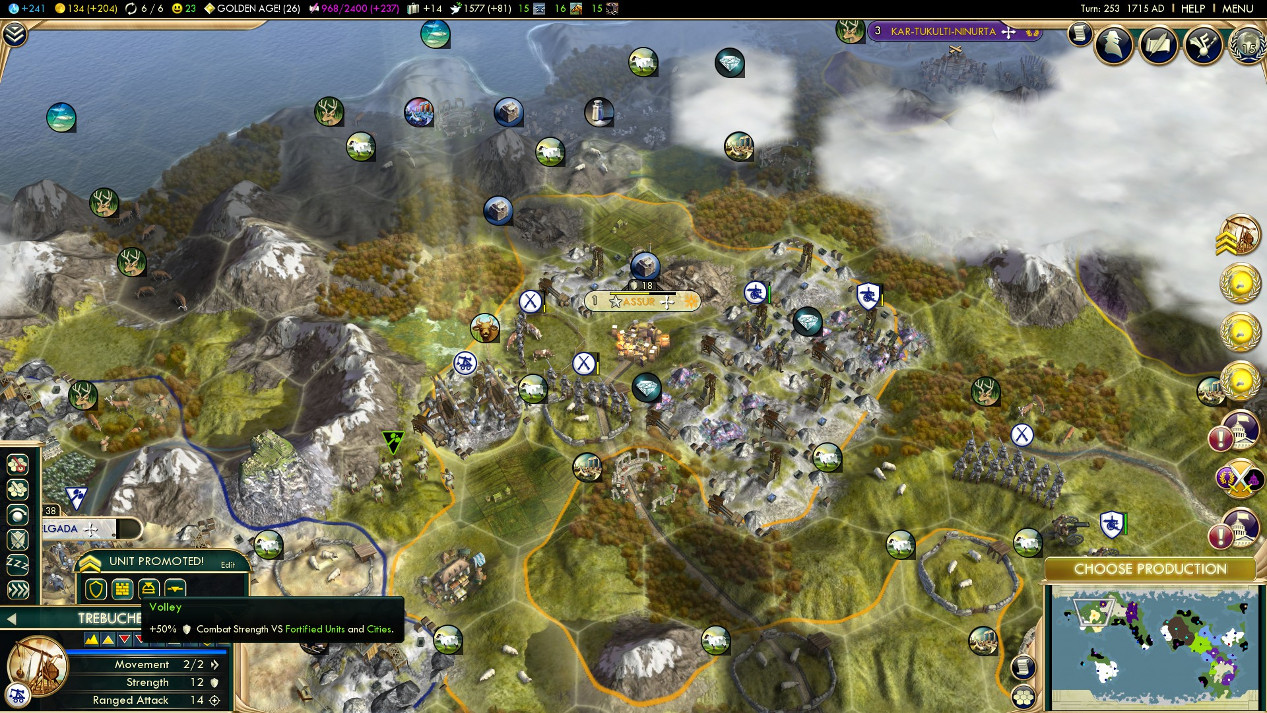 Salazar waits for a moment before responding. "It is because we develop our strengths in the field of battle, acting on behalf of a strong nation, that Portugal is even able to afford those mercies. We have not shared the Assyrians' fates because we prepared for the brutalities of the world."  "Diplomacy alone does not solve everything, and creates at least as many problems. I have heard that the Assyrians are becoming unsettled by your choices in the diplomatic sphere. Thus, while I voiced my misgivings at the time, perhaps their words will give you pause where mine could not."  "Diplomacy requires patience, Antonio, especially with friends." The President continues, though slightly less certainly. "These are but a vocal minority and not indicative of any great change in the plan we are creating for the future."  "Then I suppose that missive from Theodora that the foreign secretary told me about was just a sign that she is also in that minority." The President stops, taken aback, and Salazar continues. "War is just diplomacy by other means, Senhora Presidente. When your supposed friendship with that Pocatello fool falls apart, you should realize that it will be up to our military to pick up the pieces." 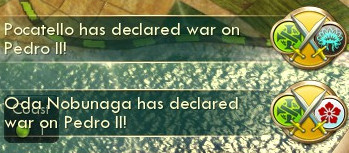 At this moment, a messenger barges into the situation room unannounced, and quickly informs the President that the Shoshone and the Japanese have begun a joint assault on Brazilian holdings. Salazar says nothing, but when his gaze meets that of the President, her temper takes over again and she shrieks at those assembled to leave her sight at once. She then hastily begins composing a message to Almeida. 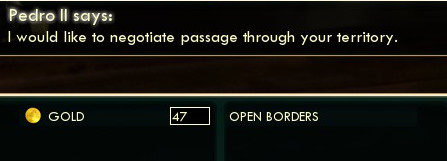 "Unfortunately," Almeida informs an advisor from within the Japanese court, "the terms of the defensive treaty with Brazil had expired by the time this attack was announced, and we believe some spies from among Pocatello's ensemble or Oda's prepared their attack for just such an occasion. Dom Pedro has made an unrelated offer, perhaps in the hope of being able to provide refuge to his people, but from a political standpoint it is almost certainly too costly to enter into a conflict with two other major powers while still engaged with a third." "What should I tell the President, then?" The aide asks nervously. "Tell her to respond with passive aggression. I'm wanted inside, excuse me." 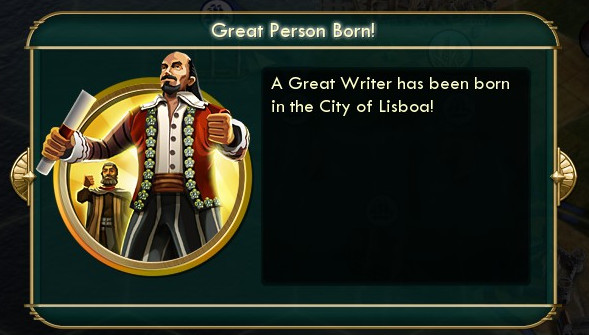 When he approached the assembly in the Japanese palace, the local Daimyo extended him an invitation to sit across from him at a small table and partake of a manuscript placed upon the table. Though his Japanese was rusty, he was able to identify the text as some form of story. "The words of your Sebastião have had a profound impact on one of our great poets, and he has decided to tell a story about his experiences under Oda. He told us that his ancestors suffered terribly for their adherence to a faith from your country, and were forced to endure terrible punishments for their refusal to recant."  "I can see that it is a hopeful tale, though." João adds. "I am not qualified to speak on the nature of your nation's poetry, but I think that perhaps he was reflecting on something magnificent in the fact that his antecedents survived such hardship and imparted the teachings of Sebastião unto him." He pointed out the passage he was considering to draw his host's attention. Shuusaku Endou posted:Man is a strange being. He always has a feeling somewhere in his heart that whatever the danger he will pull through. It's just like when on a rainy day you imagine the faint rays of the sun shining on a distant hill. "Your author is a wonderfully talented man. I should very much like to bring a copy of this text to Lisboa, that our President might have a chance to read it." The host smiles in response. 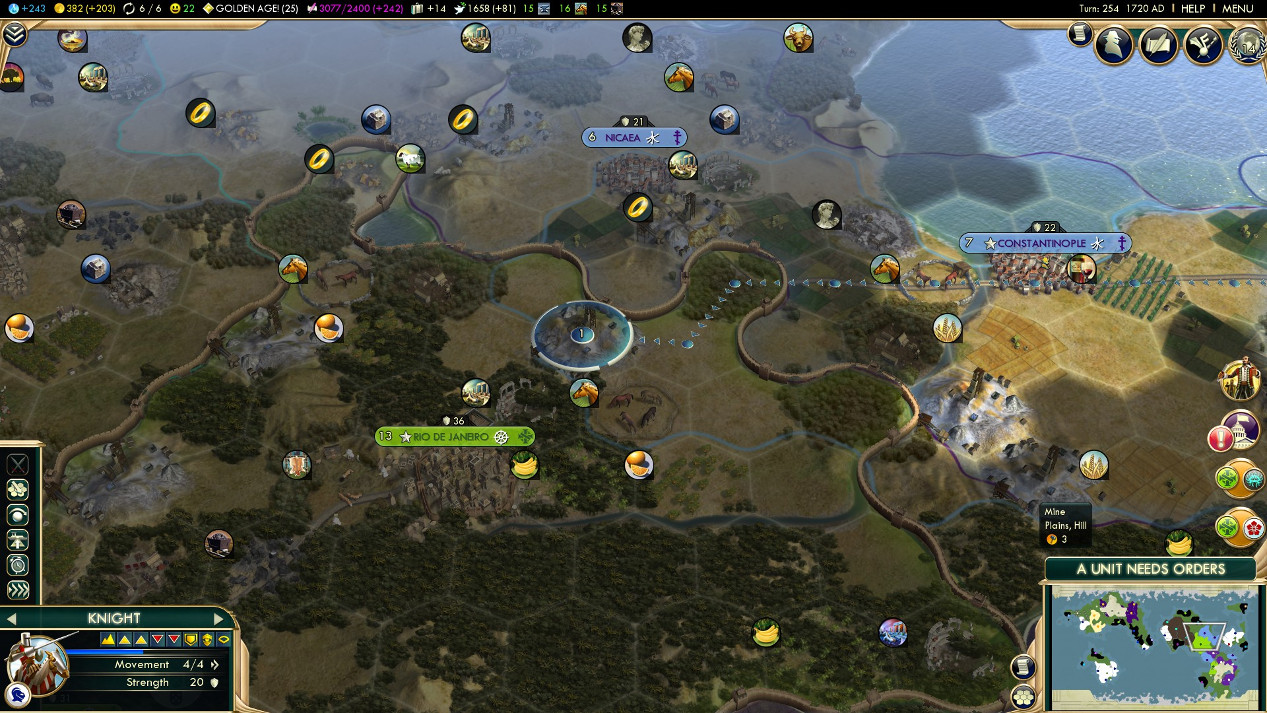 After some consternation, the President gives the order for a cavalry unit to march into Brazilian territory, intent on acting as Almeida's agent of "passive aggression." Though she had some understanding of the doctrine behind what Almeida suggested, the actual execution of it was somewhat foreign to her, and would require some luck to execute. 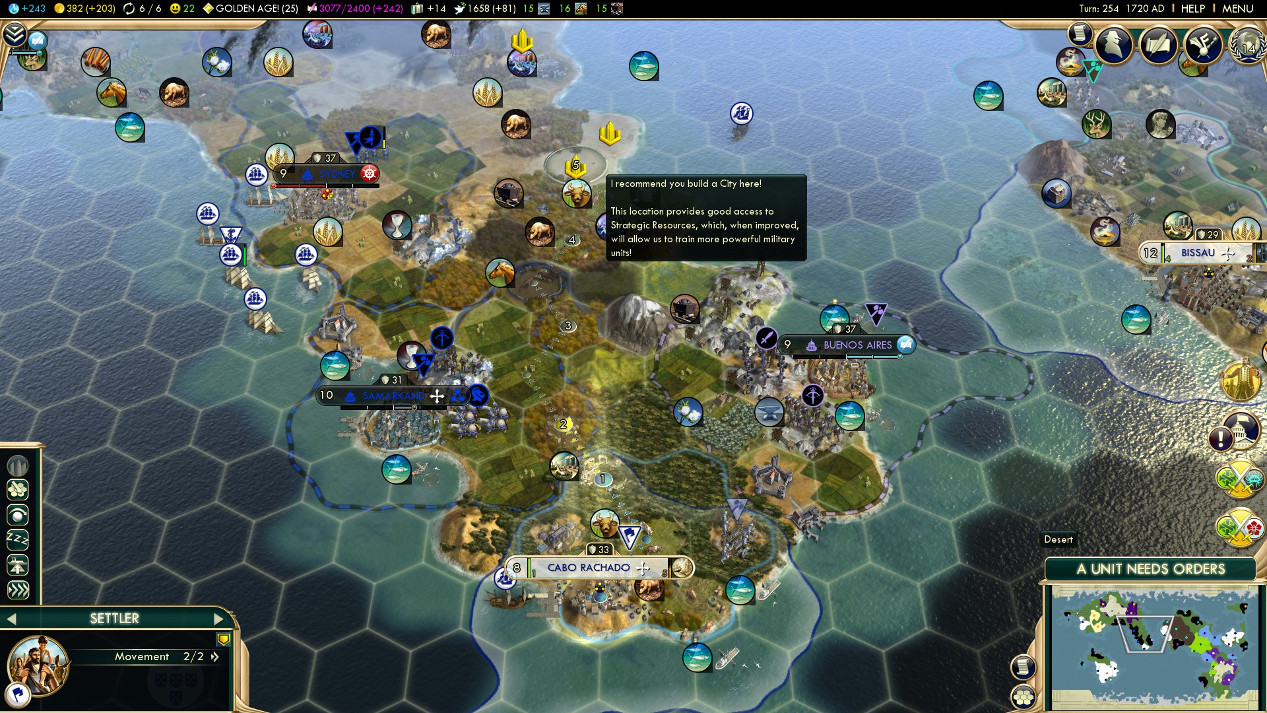 With their route carefully plotted, the venture company hired out of Cabo Rachado prepares for their journey north in order to hopefully find a decently habitable spot near the coast.  Unknown to them, Andrea Doria was busy ensuring that their passage would be safe and pleasant, albeit at the expense of Sydney. 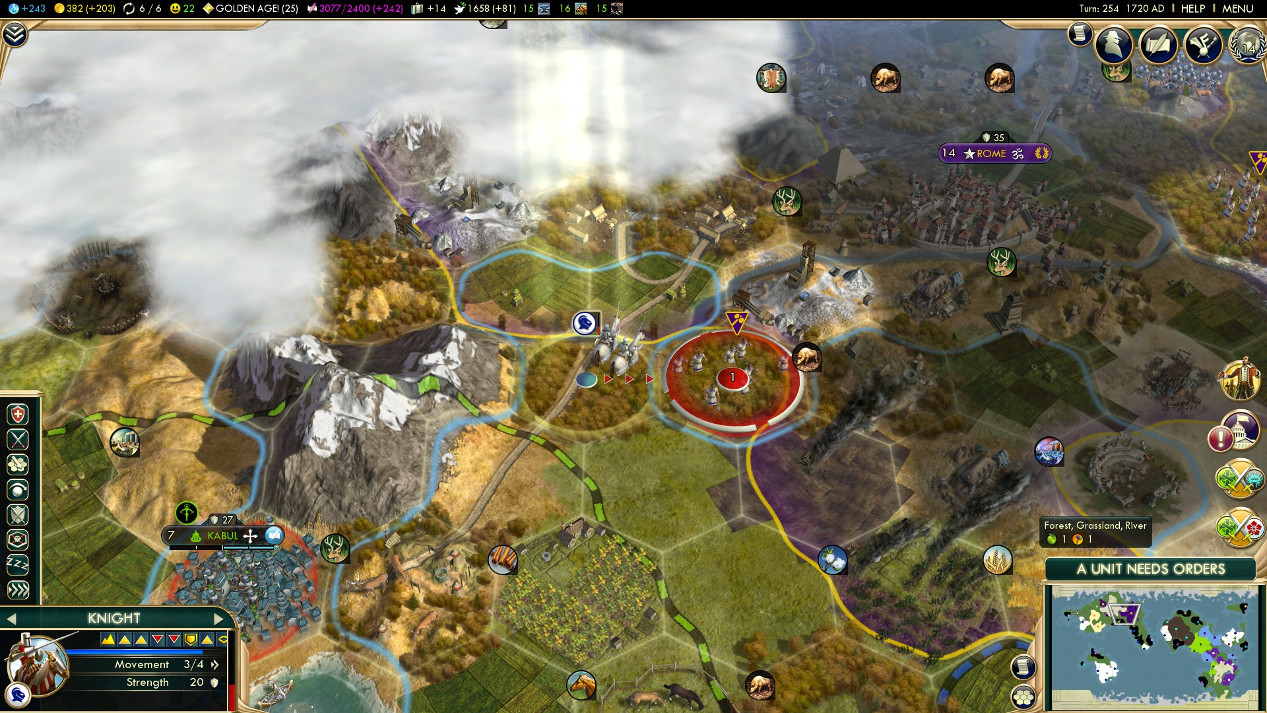 The mounted raiders locate another Assyrian contingent of slaves, and sends them home quickly, delivering another blow to Roman infrastructure. 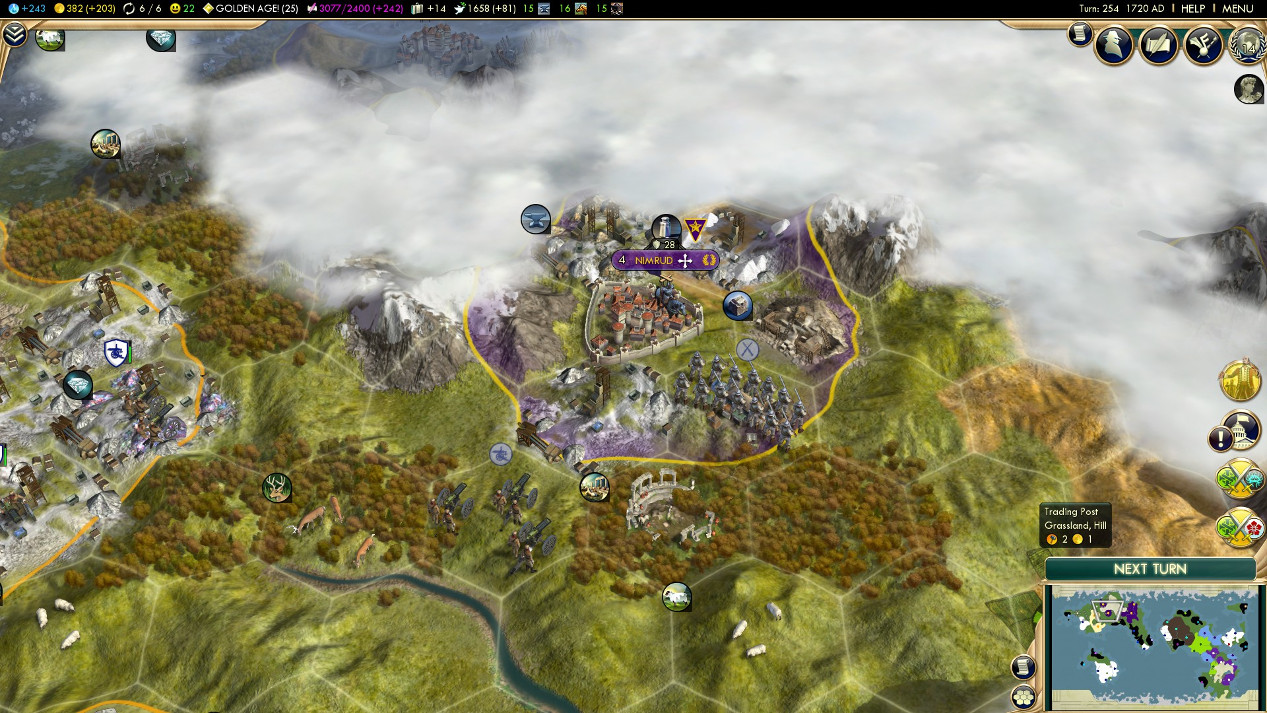 An exploratory group of Açores locate a city hidden in an Assyrian mountain range, housing a Roman general in charge of its defence. 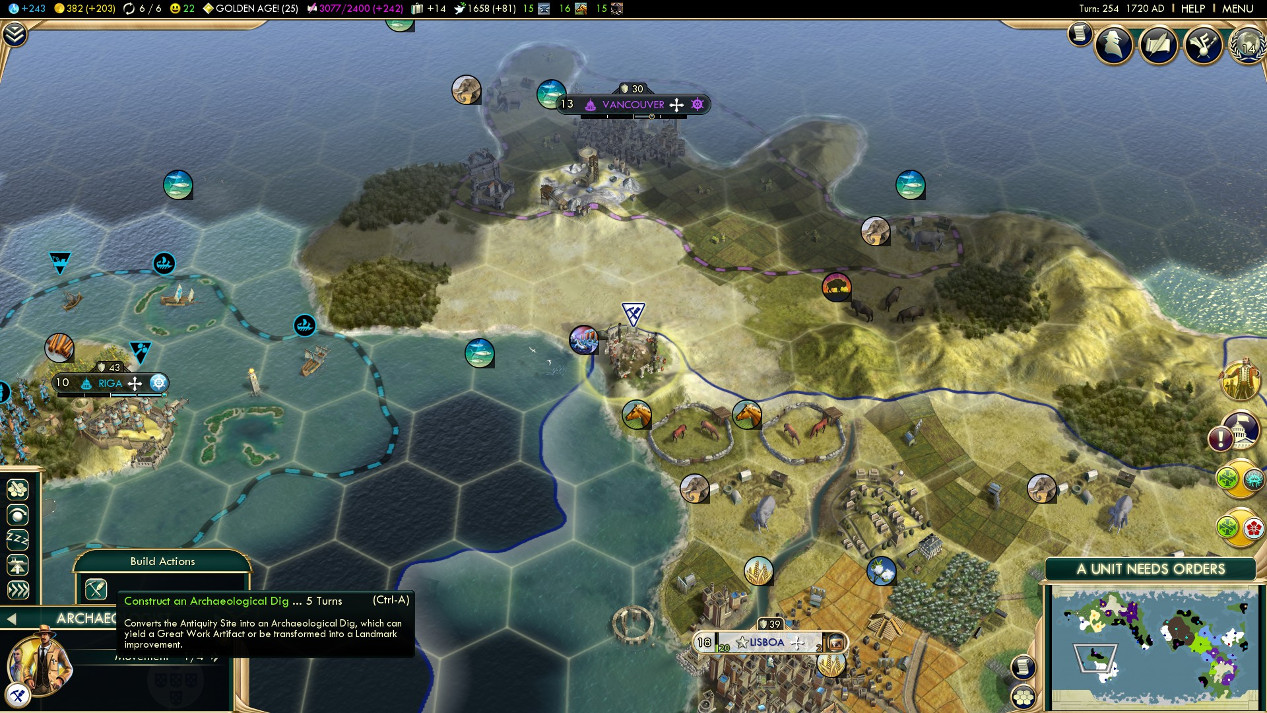 Back in Lisboa, another group of Luandan archaeologists begin to unpack the story of the past.  Ashurbanipal's missive seems like business as usual. Then President Bragança opens the package from Tokyo.  She is so moved by the Japanese story that she immediately declares a national holiday to celebrate the artists of the world, and the work that they do to improve the lives of those with whom they share their talents. 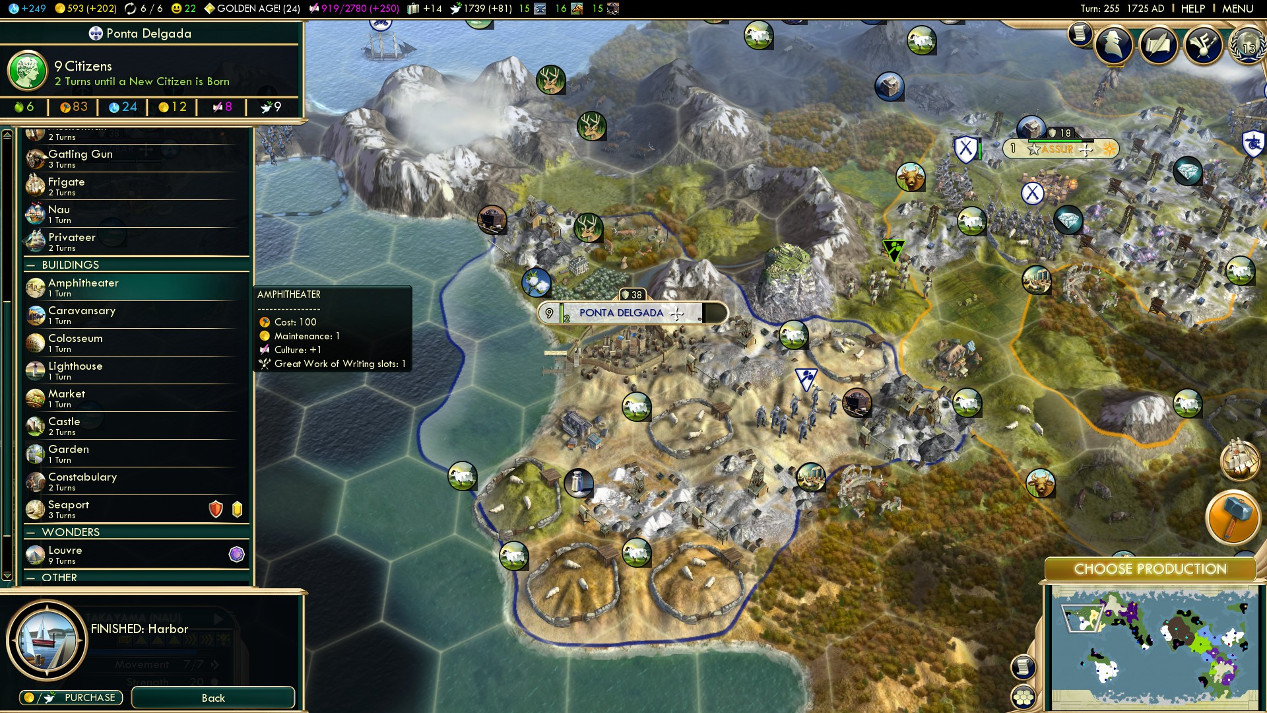 Even the highly-militarized Ponta Delgada is unable to resist the allure of high culture.  Luanda begins preparation for the storage and display of the numerous artifacts that they anticipate finding in the Lisboan environs. 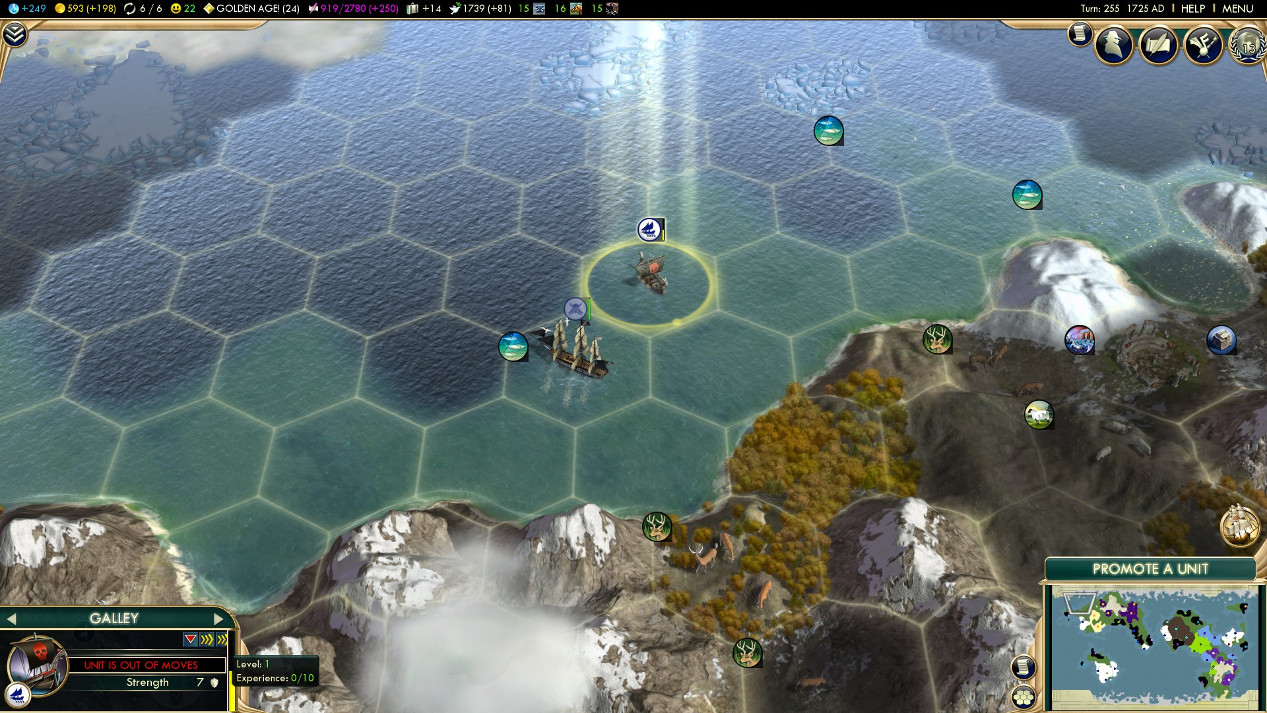 In the frozen north, the Caravela locates an ancient vessel and does some archaeology of its own, removing its Roman barbarian occupants in favour of returning the galley to Ponta Delgada. 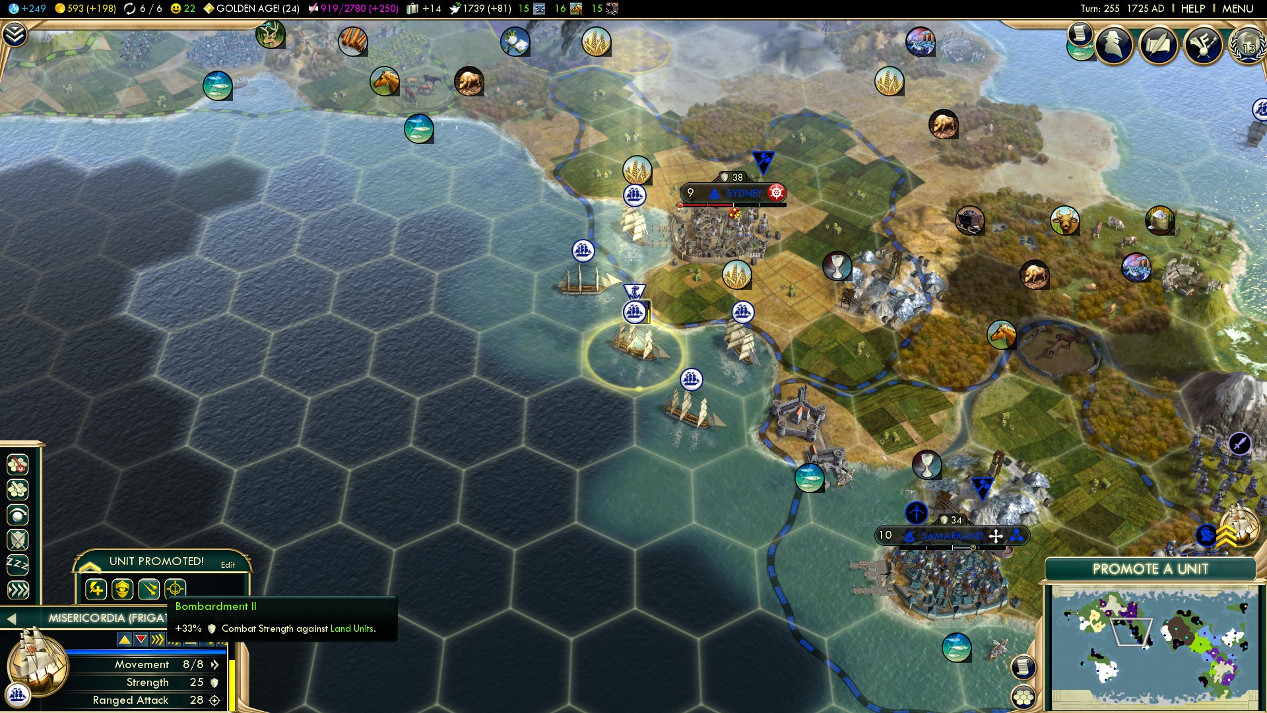 All the while, the Frigates of the Armada are bombarded by Sydney, but do not return fire. This forces them to practice defensive drills and evasive maneuvers constantly, resulting in some increased proficiency among the crew. 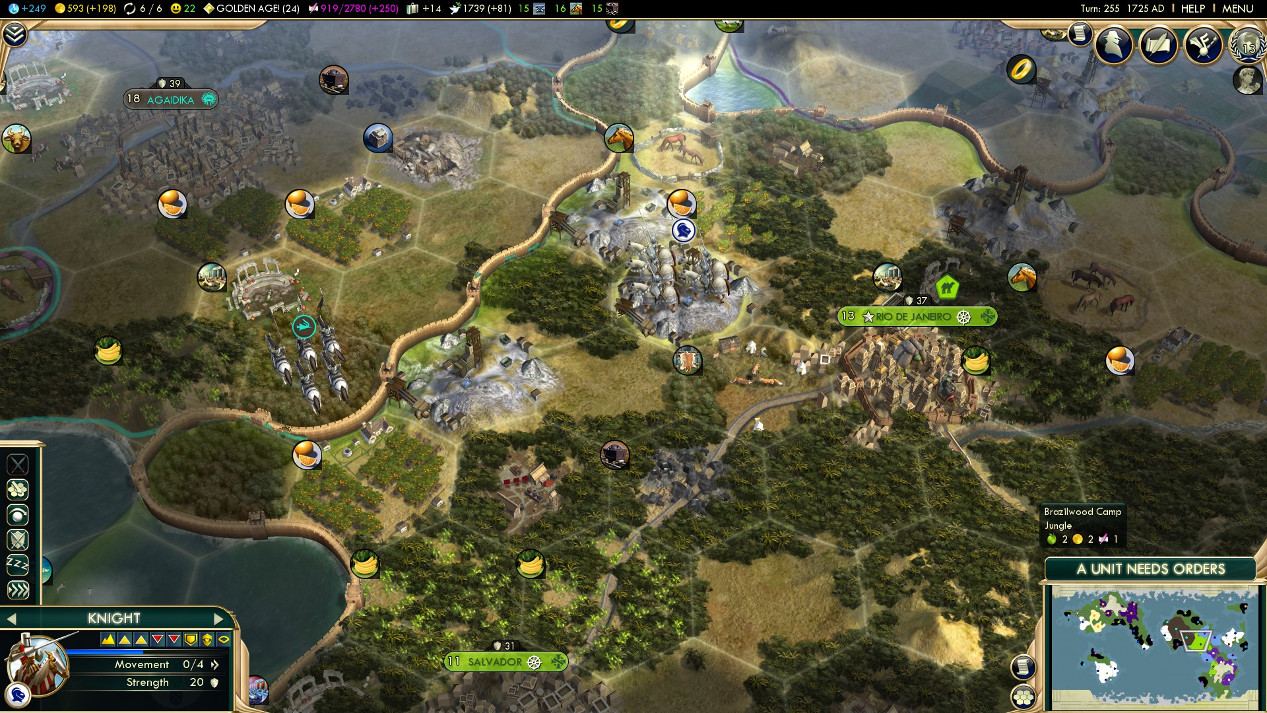 To the President's surprise, there is an "all clear" message from the Brazilian border. It looks as though Pocatello has not launched any sort of offensive yet. 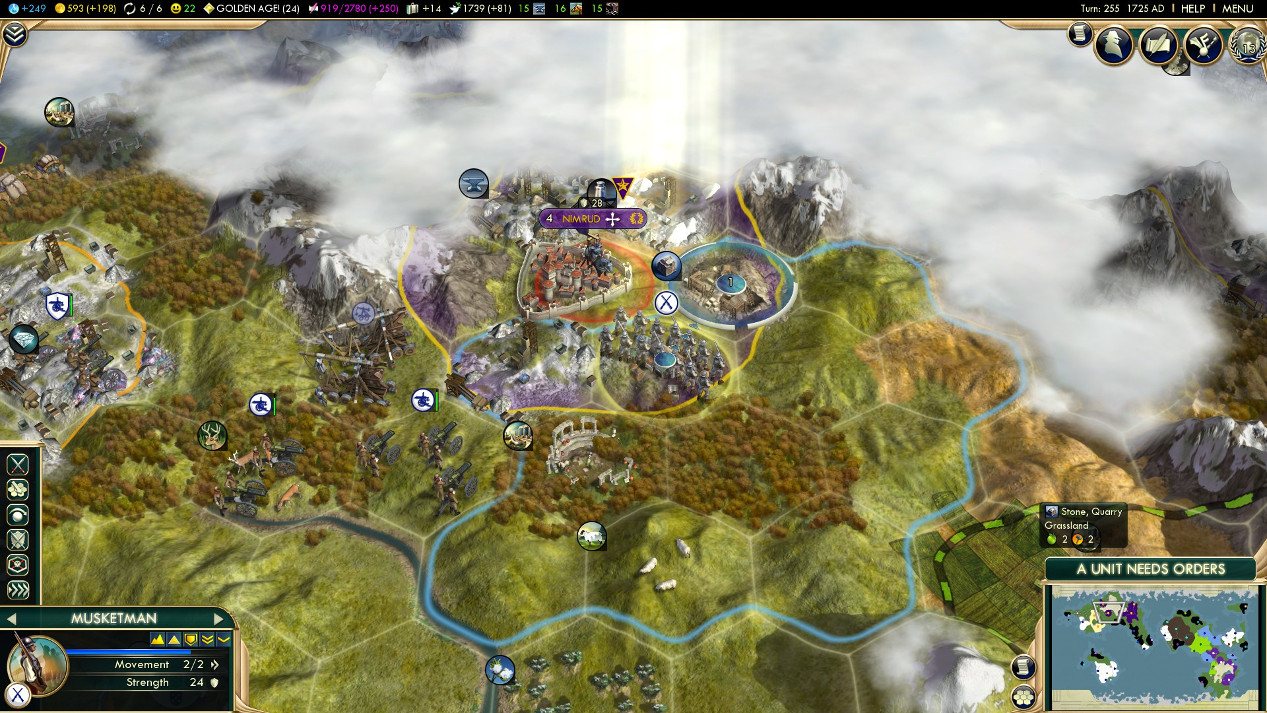 Despite undergoing a bombardment of their own, the Portuguese forces slowly encircle Nimrud. 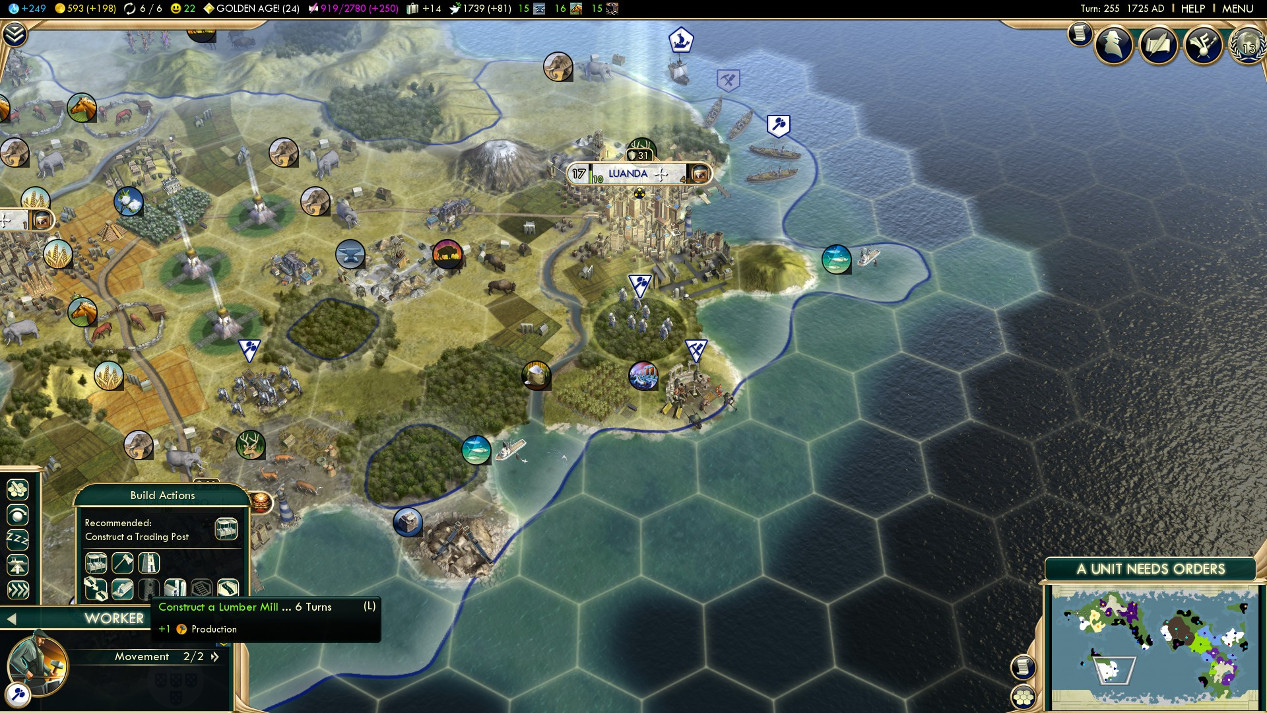 Luandan workers also begin developing a means of harvesting a local forest using more sustainable means than simple clear-cutting. 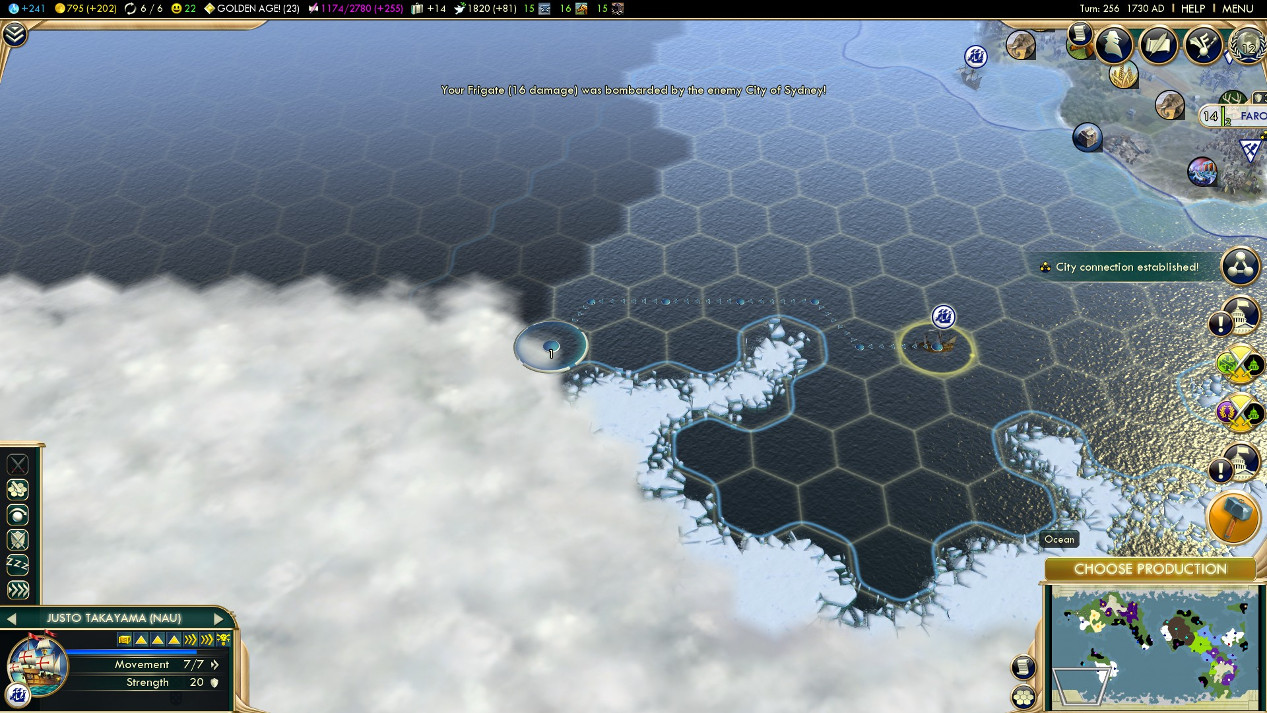 The Justo Takayama, meanwhile, continues a Confucian pilgrimage. 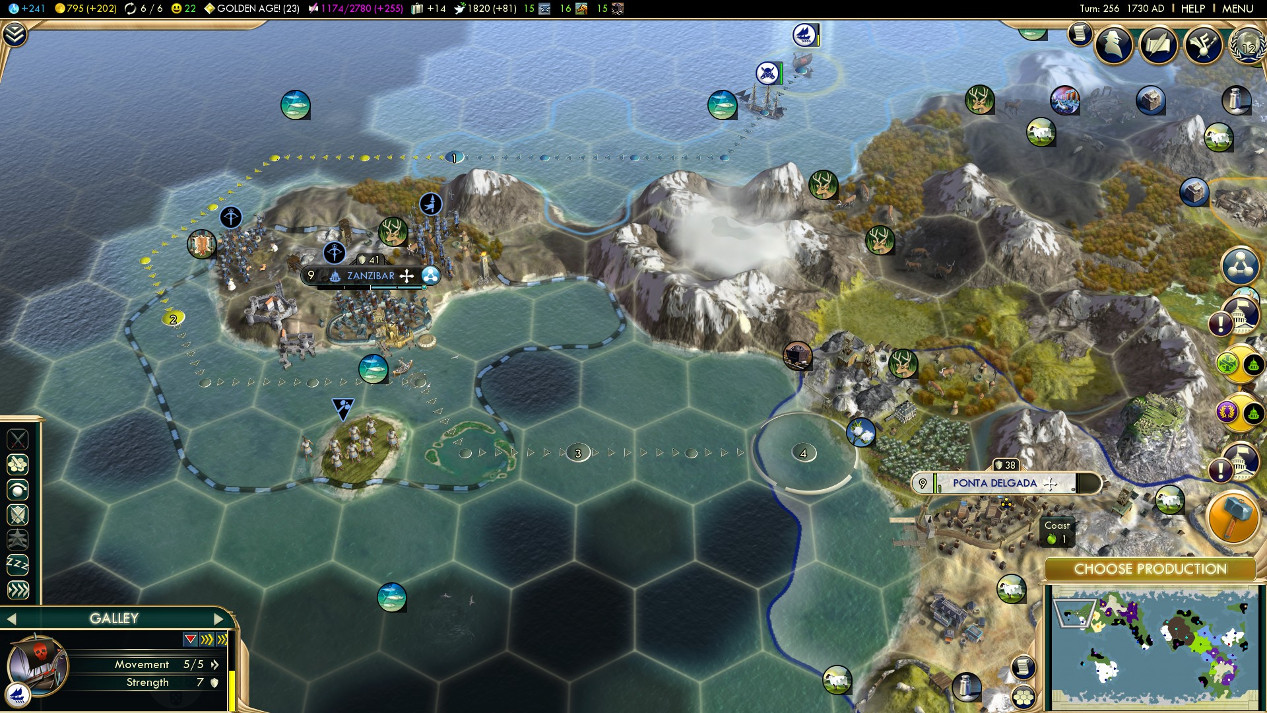 The Galley prepares itself for a trip to a Portuguese museum. 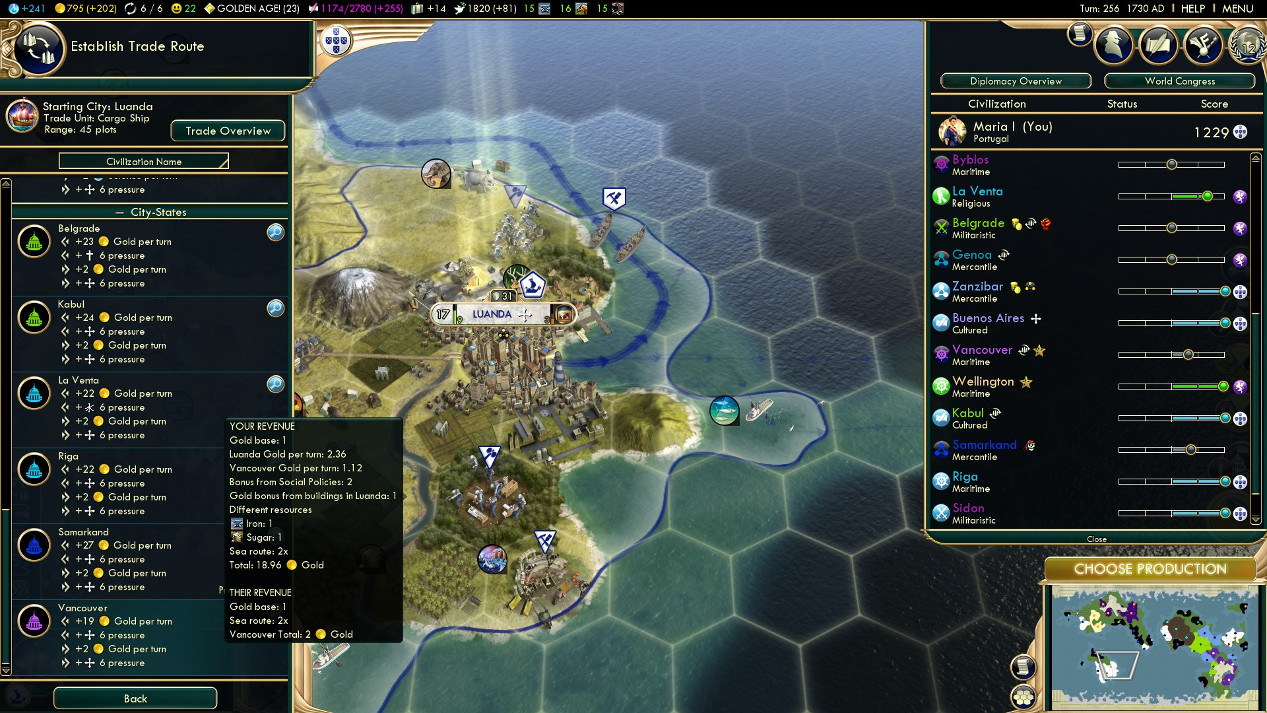 The President looks into the use of trade as a diplomatic tool as well as an economic one, and sends a trade ship to Vancouver in order to gain influence with its old neighbour.  Lisboa, meanwhile, decides to fully embrace its historical heritage and commissions an architect of some renown to create a gigantic museum complex. 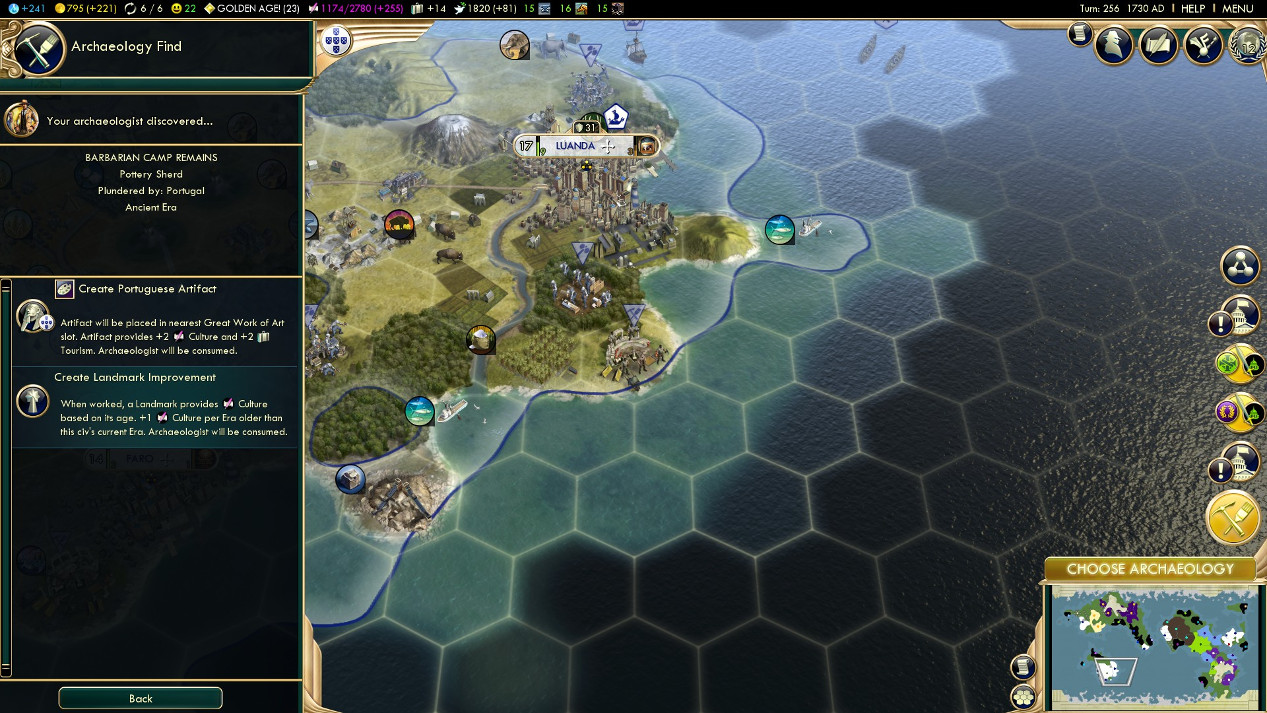 The Archaeologists of Luanda also identify some historical battle grounds of some import near their city, and commemorate it with a monument that draws visitors to the local municipality. Speculation that the people of this sleepy town were the descendants of a tribe that once taught the Portuguese about sea travel remain unverified. 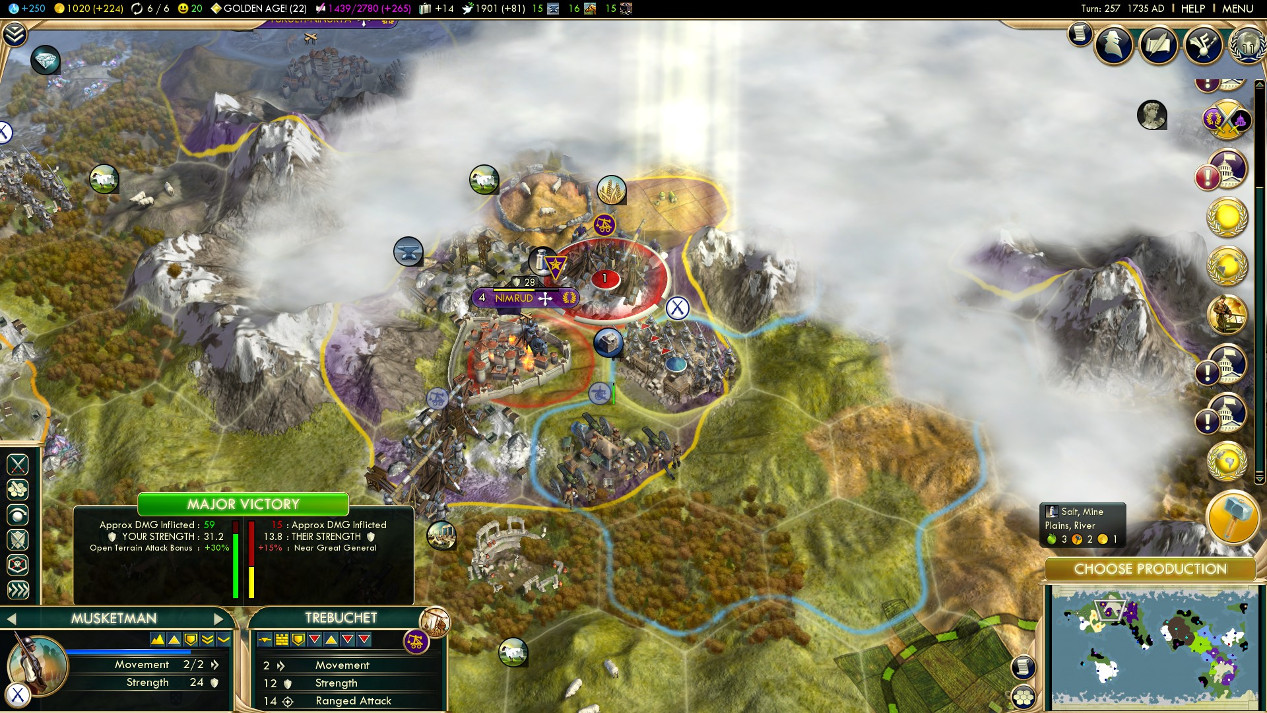 The war effort proceeds well, with Nimrud encircled and about to face down another assault.  The Byzantines, despite apparent earlier misgivings, have apparently also befriended the Shoshone, though this only annoys the President given that she is looking to exert some political pressure on Pocatello to get him out of conflict with Brazil.  Conflicts in Rome, however, result in talented people becoming famous in the military for their ability to assess and lead, and General Mayura is dispatched to Assyria in order to support the front. 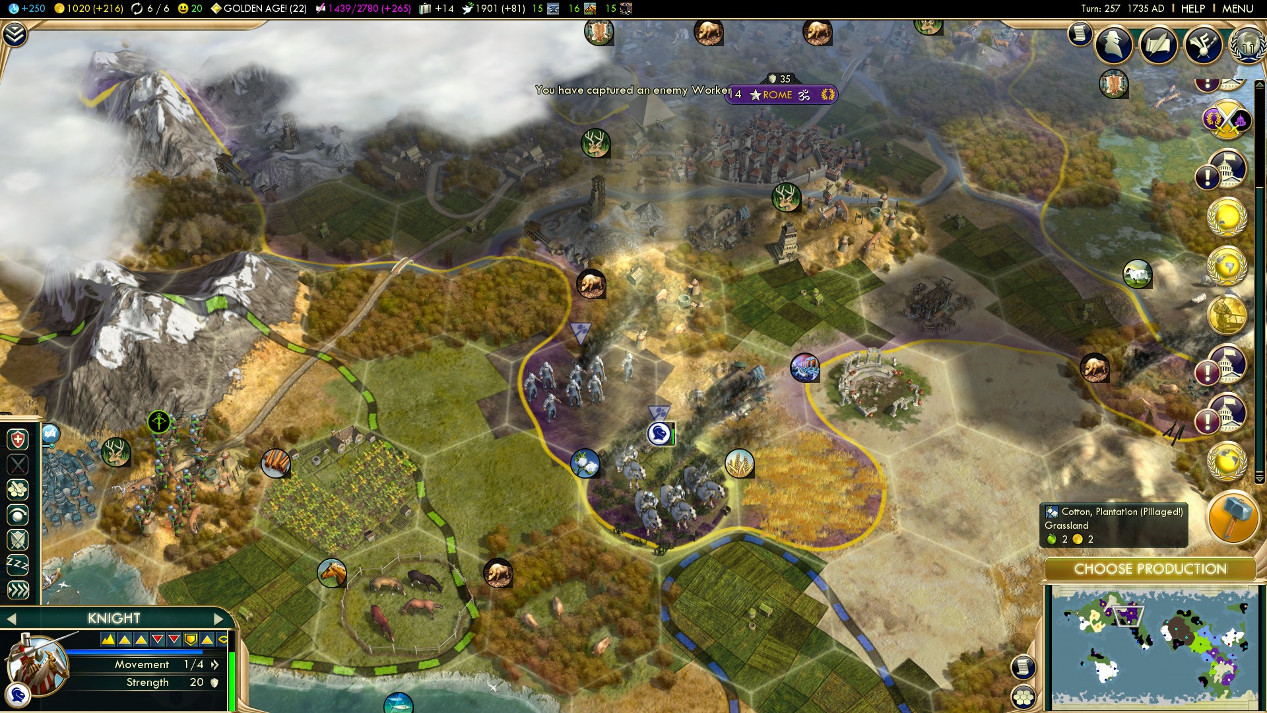 The Knights of Portugal, however, capture two units of Roman workers sent to repair the damages caused by their rampage through the country, and their taskmasters are swiftly executed. 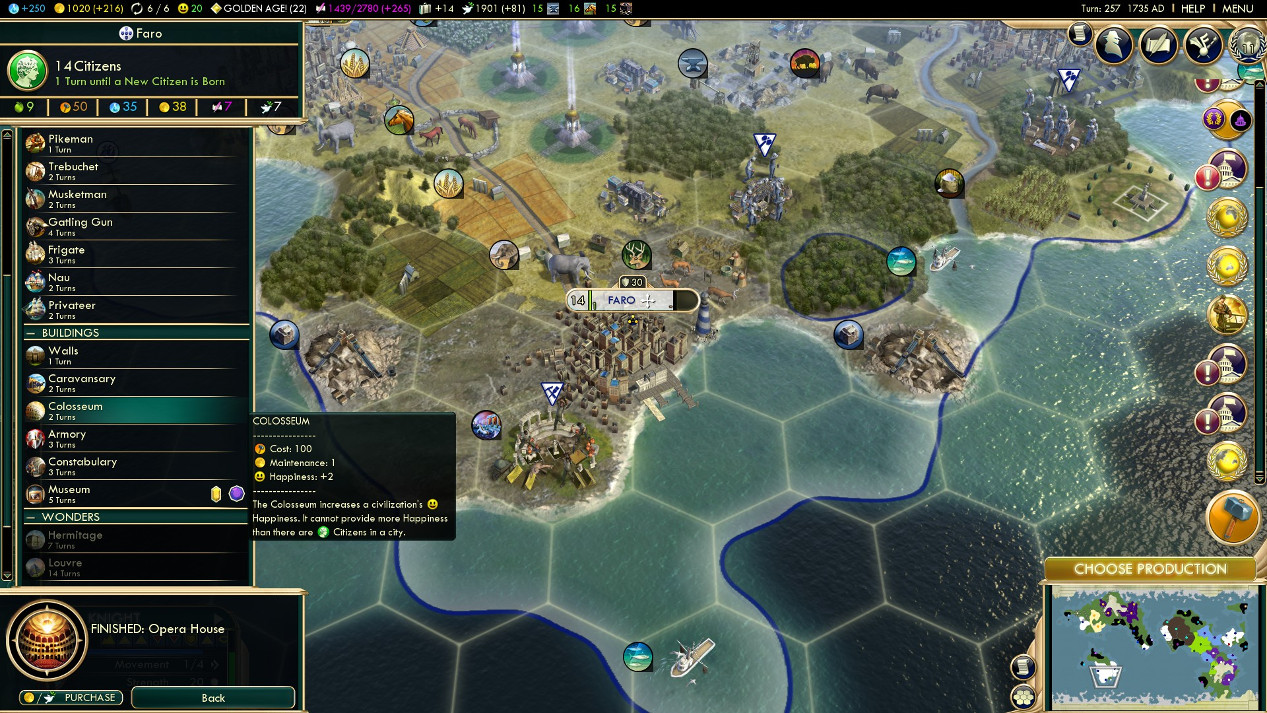 The word of their capture reaches the mainland, and the stories they tell about Roman entertainment shock and amaze the Portuguese. The people of Faro, bored easily of life in the frozen wilderness, decide to build one of these "Coliseum" in order to bring some excitement into their lives. 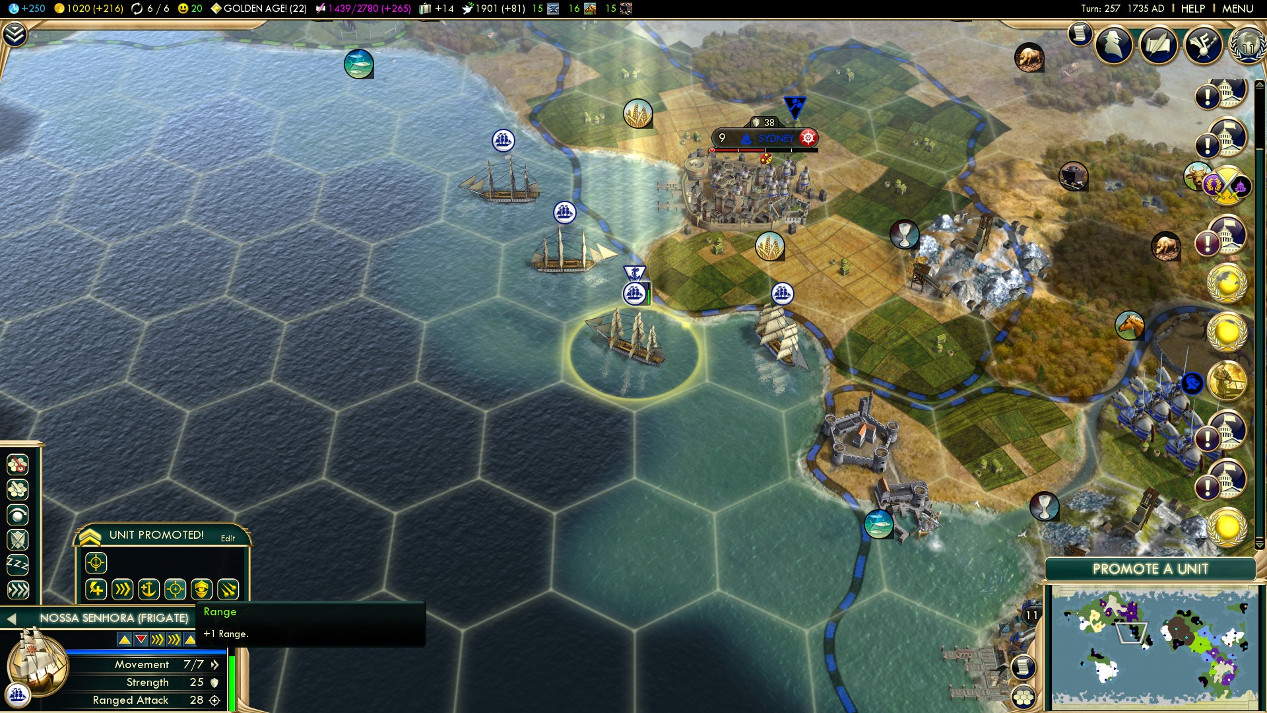 Though the Armada withstands constant fire from the Sydney mainland, the gunners become ever more proficient for their combat experience, and develop even more powerful techniques for attacking targets from a distance. 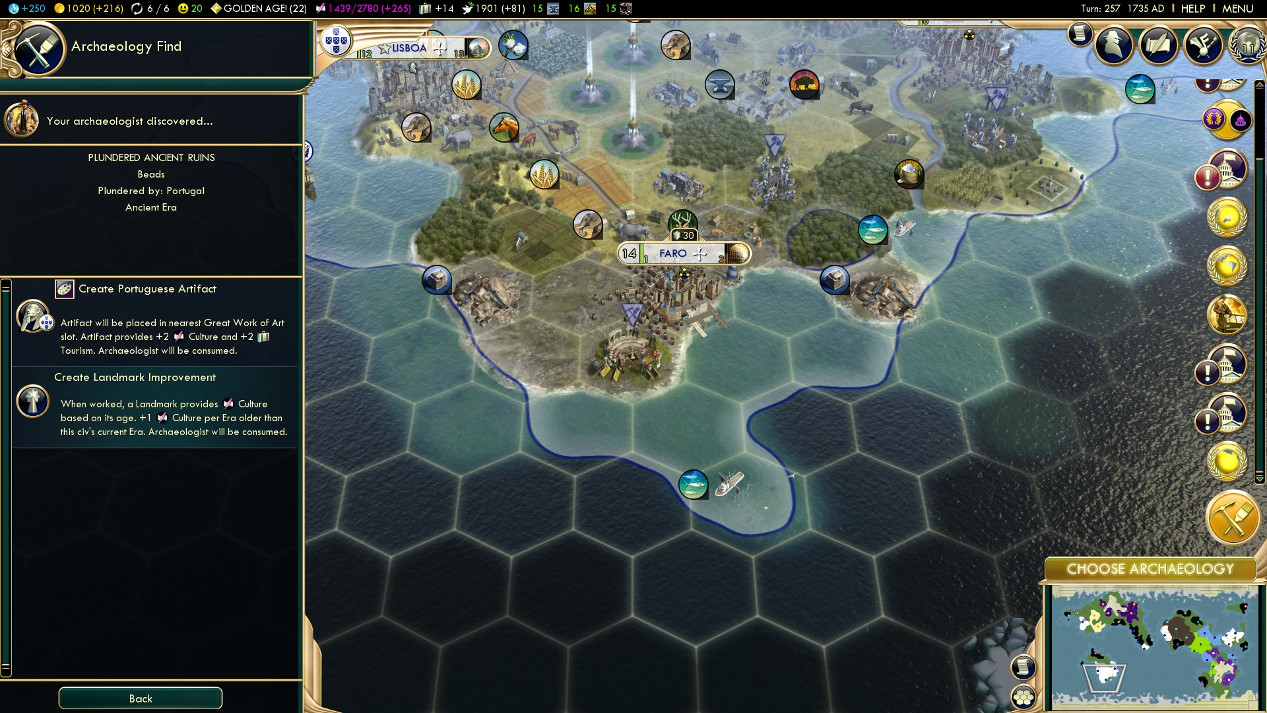 The locals of Faro are not terribly impressed by the findings of local historians, but their city becomes all the better known for them.  Pocatello seeks another trade on terms that past regimes found punitive, thus the President was in no mood to renew them.  Venice, however, was showing that they were delving into the political sphere with a bit more enthusiasm than before.  Though in her heart she is intrigued by the possibility, the President is not willing to further embroil her people in war, especially when she considers a large number of Japanese her fellow citizens.  This new focus on culture and historical precedent in Lisboa spurns a new generation of thinkers and scientists from even the unlikeliest sources, and their suggestions and collaboration serve to reform large swathes of the Portuguese education system as a whole. 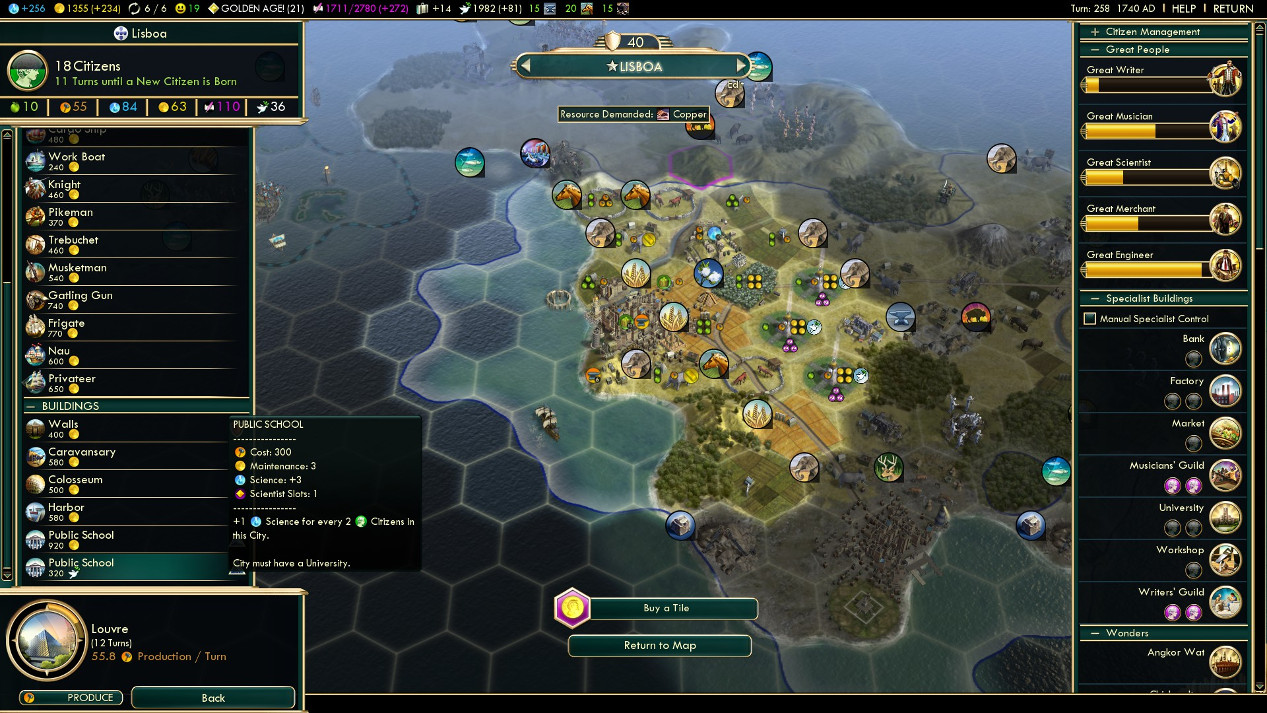 Given that education in Portugal is by and large a function of the clergy, there is a movement to support these changes from inside, and many local priests in training are offered a chance to become educators on secular matters as well as spiritual ones. 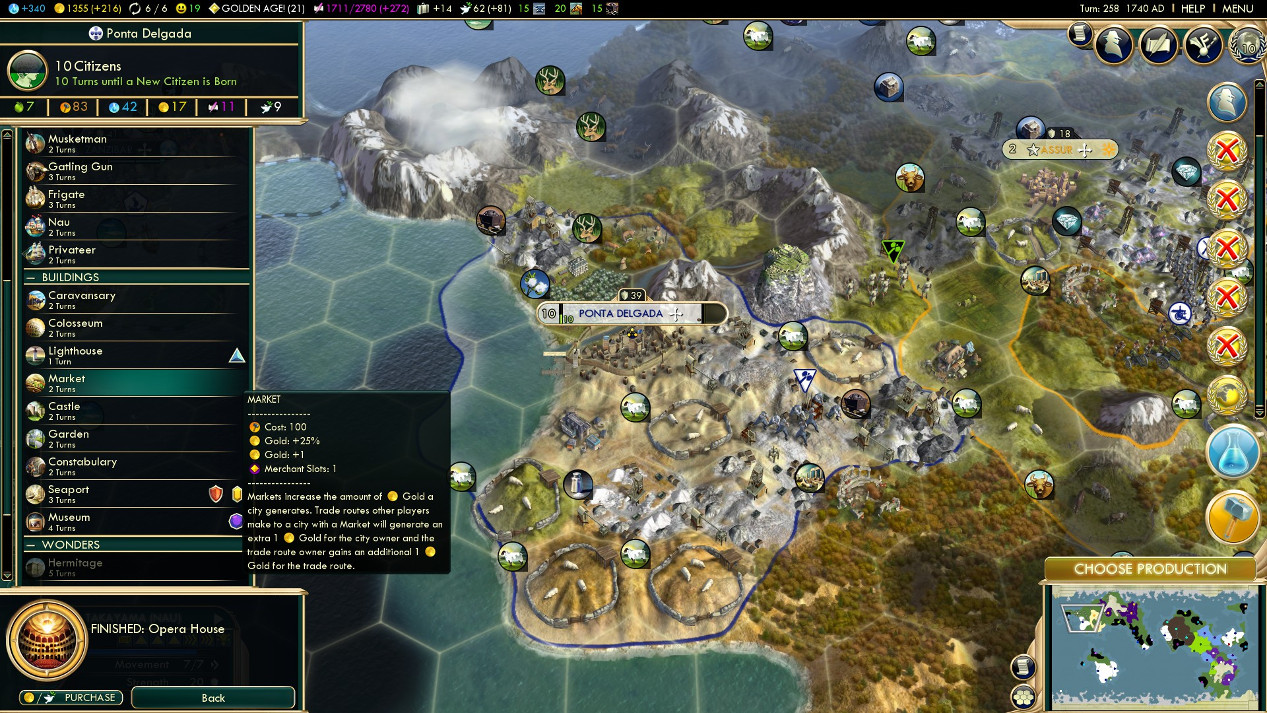 The resultant reform sweeps Portugal like a wind across the sea, and the general level of education rises throughout the country. Everyone suddenly seems to find themselves with more time for pursuing new goals and interests. 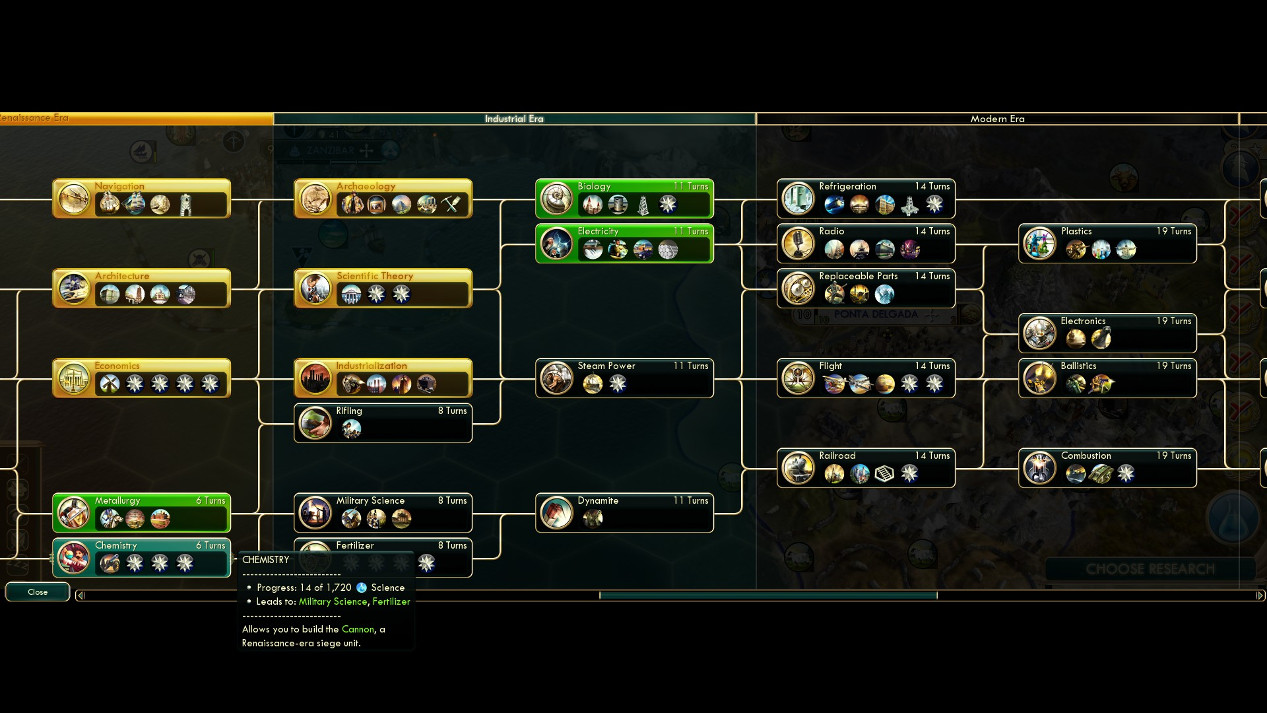 What changes may result from this, only wiser people can say.  The capture of Roman property continues unabated. 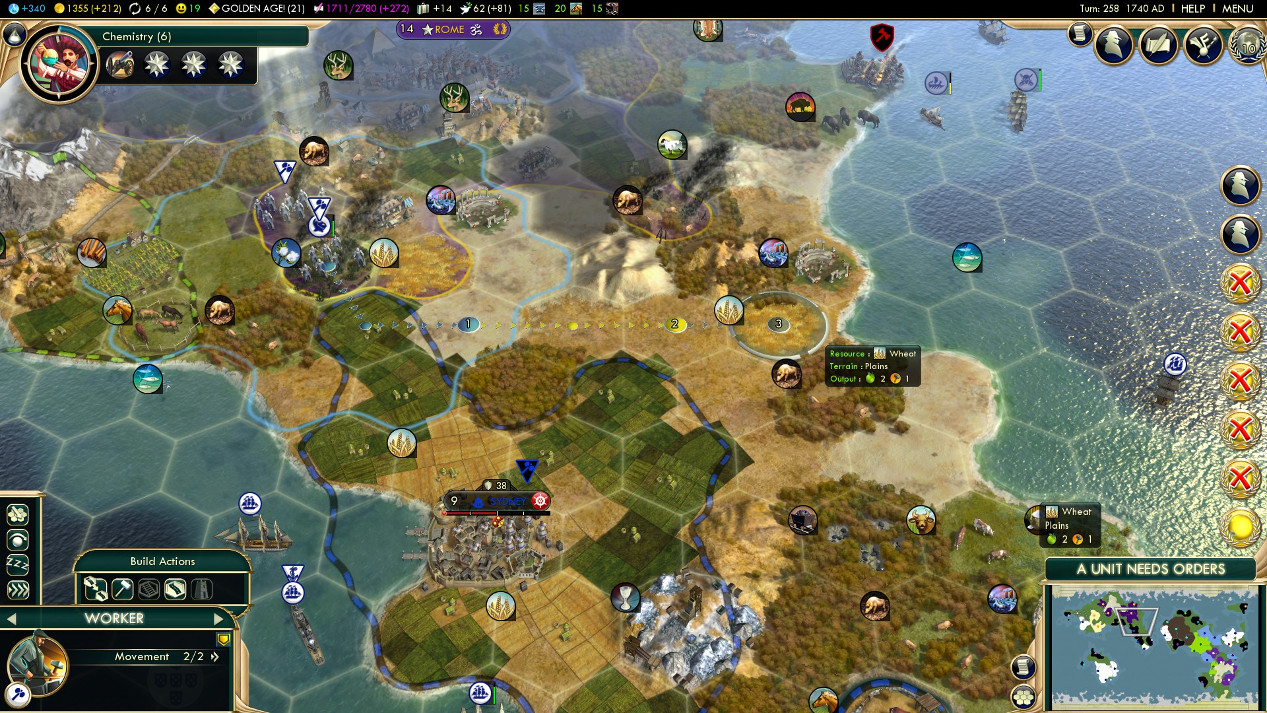 Though the new Workers can begin their task almost immediately. 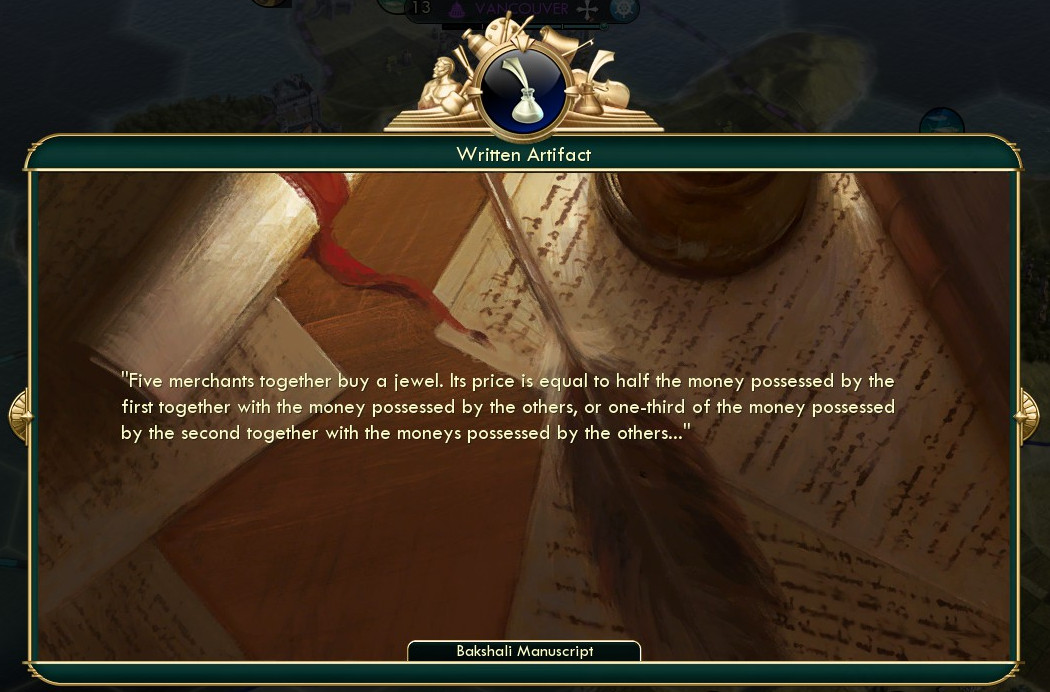 Word from Lisboa is that Archaeologists have found a remarkable text dating back to the time of Sebastião is unearthed some distance from the city, but near one of the region's oldest private academies. The text itself is an instrumentally illustrative piece on mathematical problems and trade, and perhaps establishes a firm proof that the earliest Sebastianists recognized the value of trade as well as education from their inception. 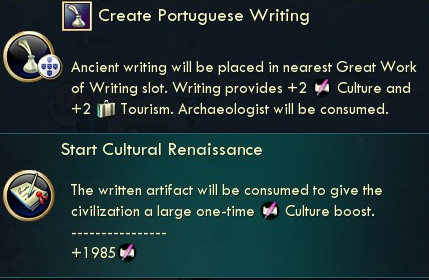 The text is instrumental in driving forward a new way of looking at Portuguese religious history.  Word around Lisboa is that a diplomat overseas has sent shocking news to the capital. However, the President's reported response was an amused "bless her heart."  What apparently did surprise her was the Assyrian desire to go to war so soon after Ashurbanipal's restoration to power, but the President remained committed to the task at hand. 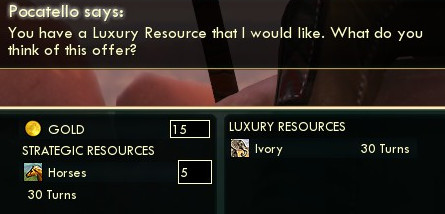 Pocatello makes an unusual offer, but is rejected in the hopes that he will understand that he has done wrong. 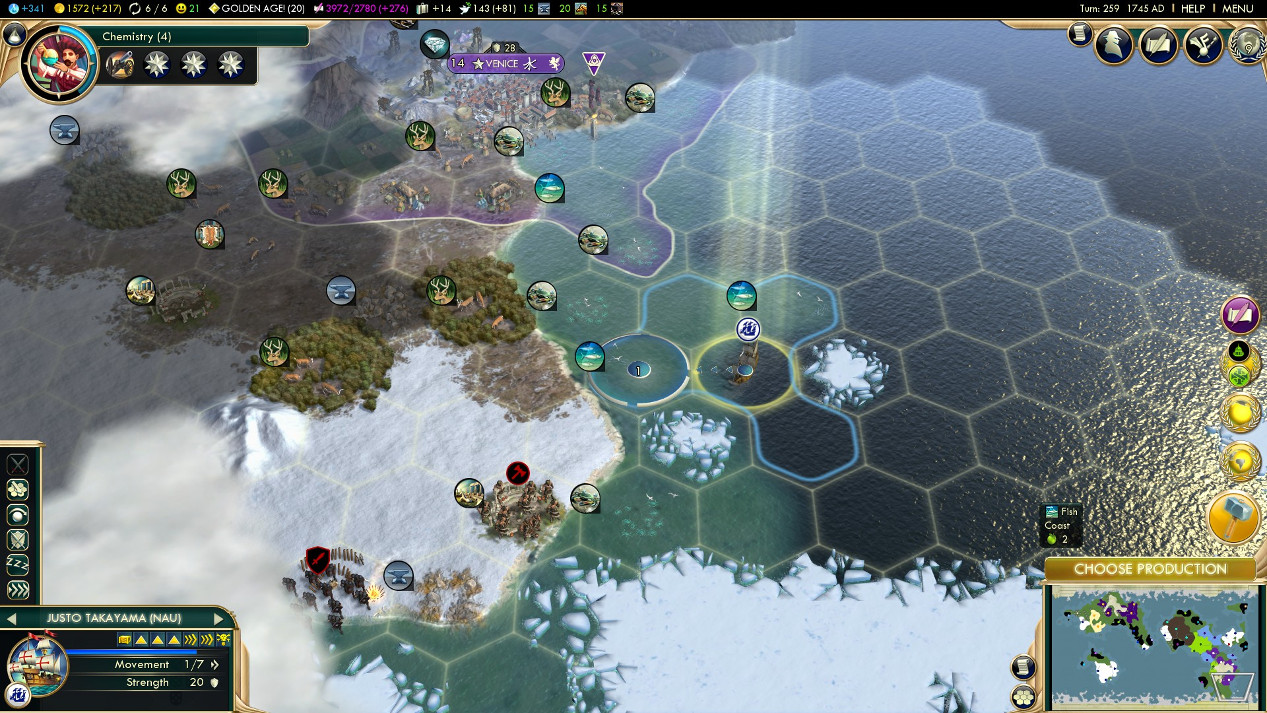 The Justo Takayama notes that there is still an unusual settlement to the south of Venice, and Lisboan scholars make plans to start an expedition to the region. 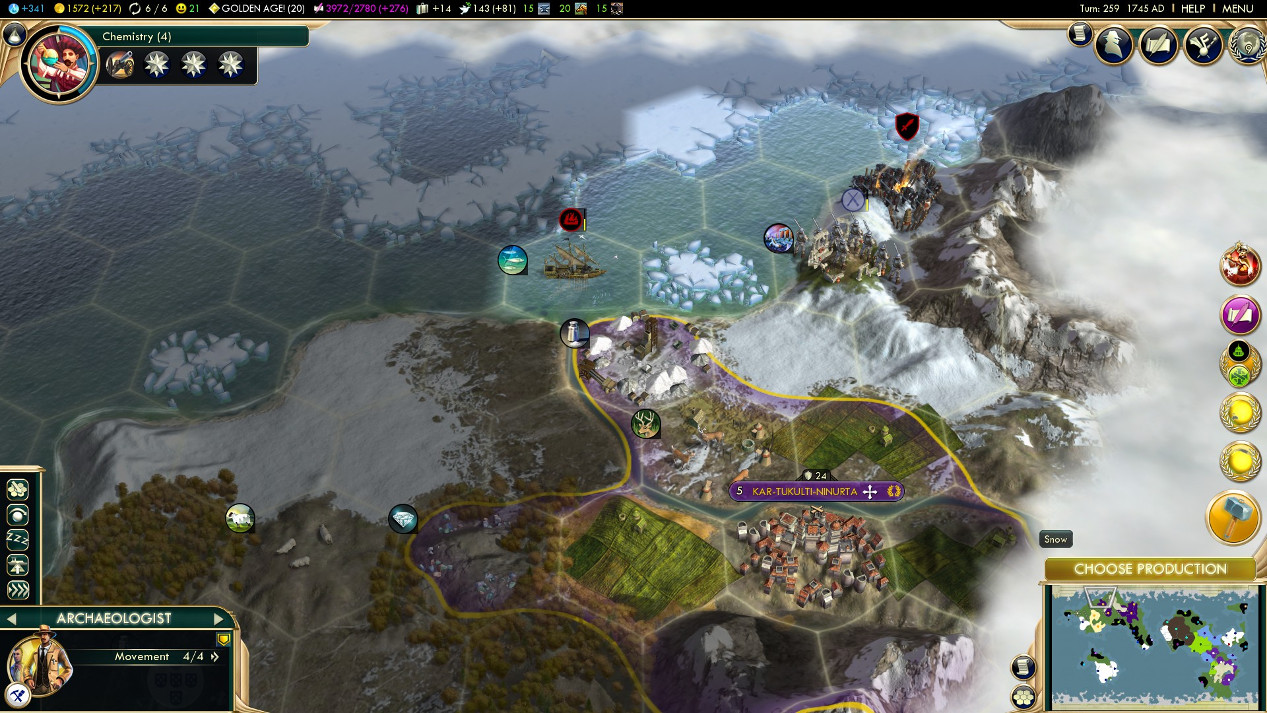 In the distant north, another group of hostile Romans is located near a captured Assyrian city, and though the local scouts try to take cover nearby it is apparent that they are under siege and will not last long.  With this increased focus on military force, the President begins taking steps towards demonstrating that the Portuguese military serves a greater purpose, to guarantee the independence of the nations of the world and the sanctity of their electoral process through military expenditure. 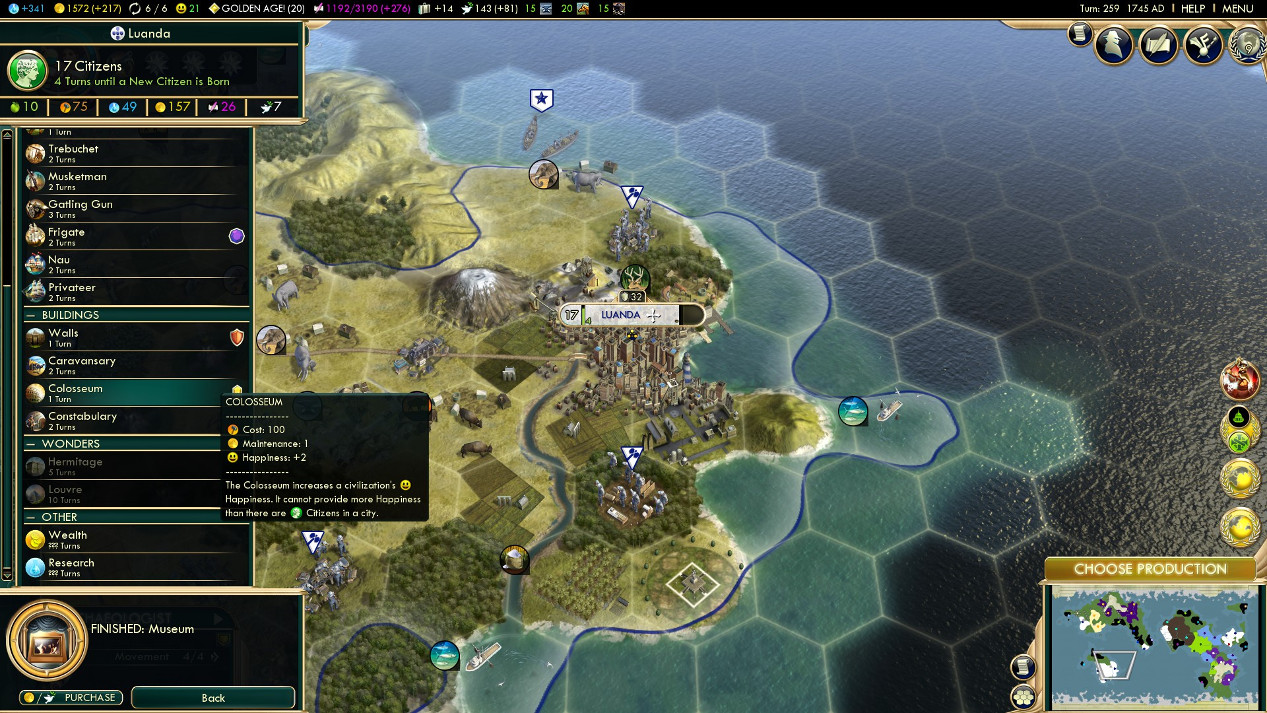 Luanda, however, contents itself with entertainment. 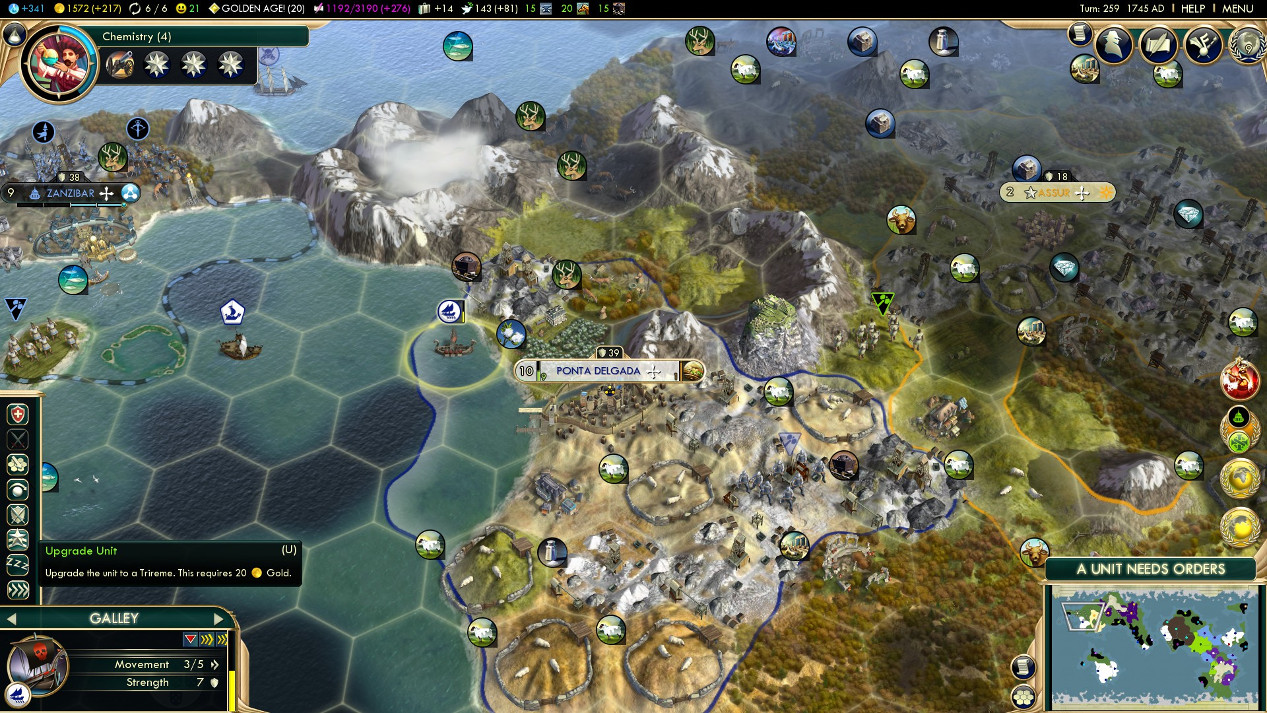 Though the Galley seems to be an artifact of some age, the people of Ponta Delgada are not above repurposing it for modern military use. 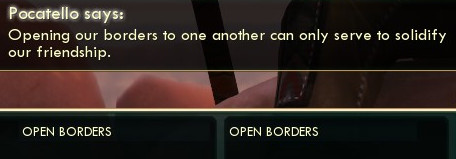 Pocatello makes a diplomatic overture, but the President again rejects it, though not before considering an interesting possibility. 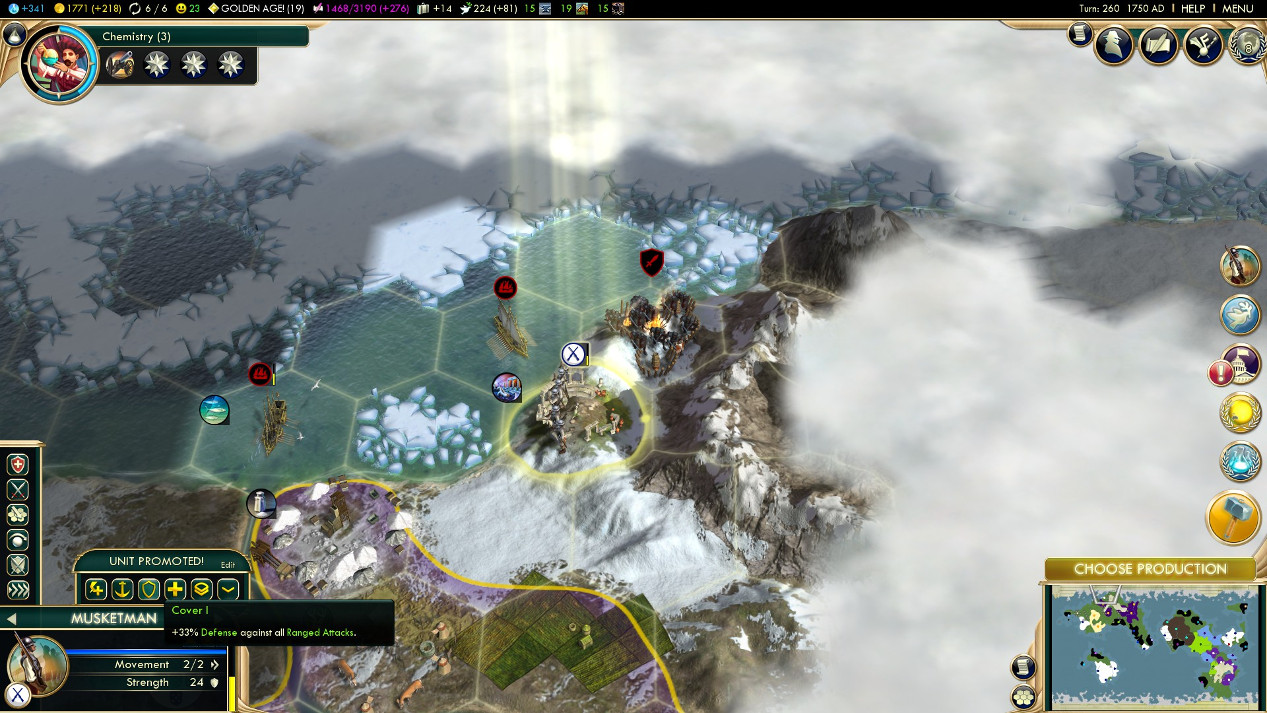 The exploratory force in Northern Assyria locates a second enemy vessel originally hidden from view, and so is forced to take cover in the hills and weather an intense storm in order to survive bombardment. 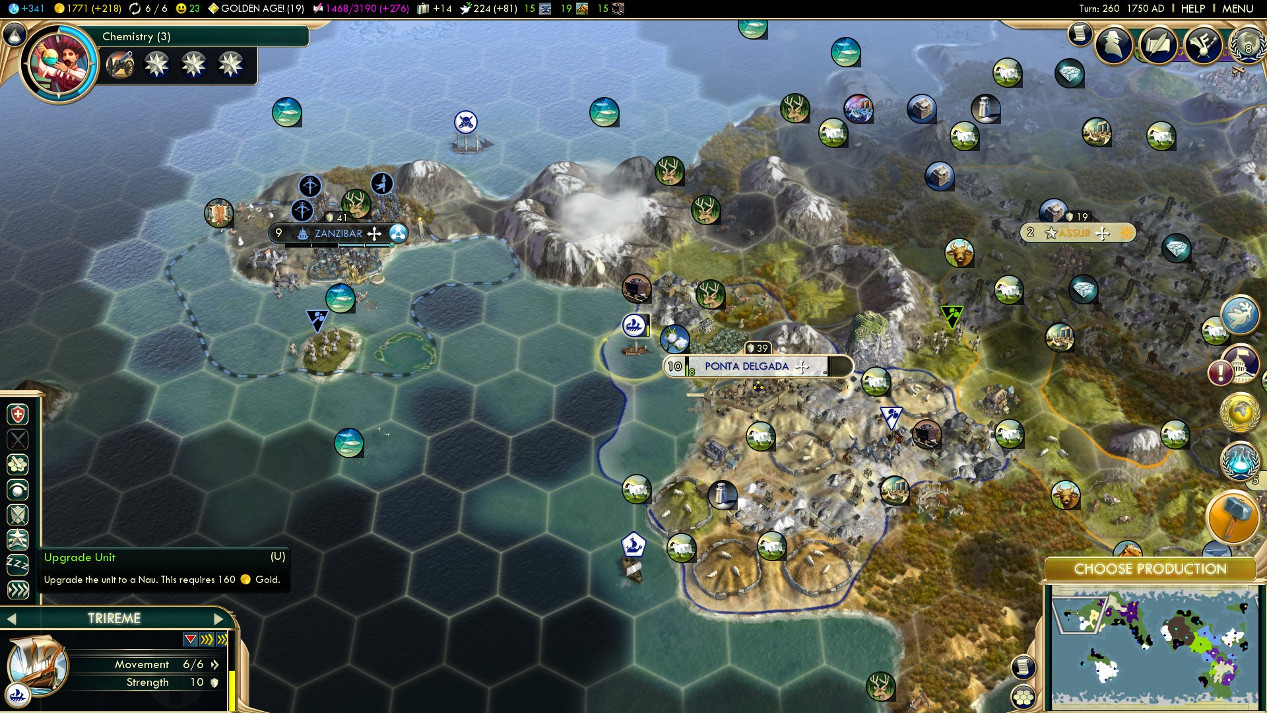 Ponta Delgada fully modernizes the hull of the ancient craft, though the new Nau is considered an almost surplus craft immediately. 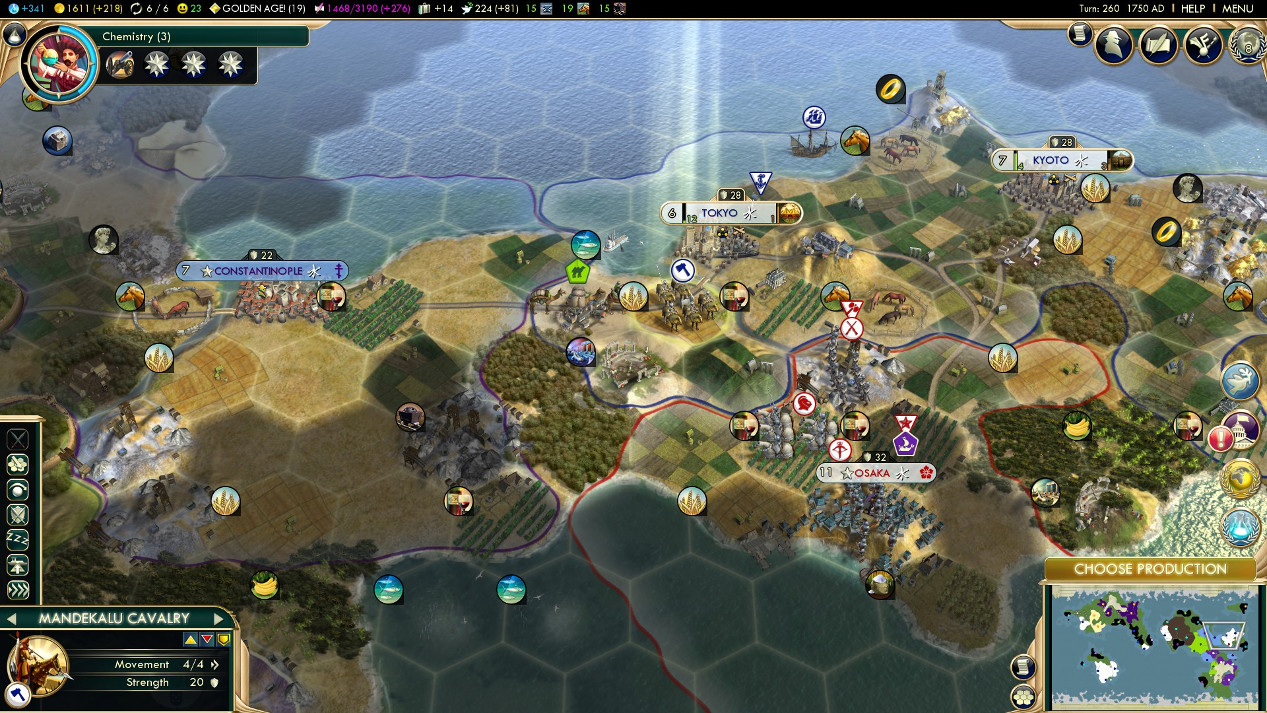 Reports reach the mainland that a volunteer force from Sidon has arrived in Tokyo in order to support strategic efforts in Brazil. 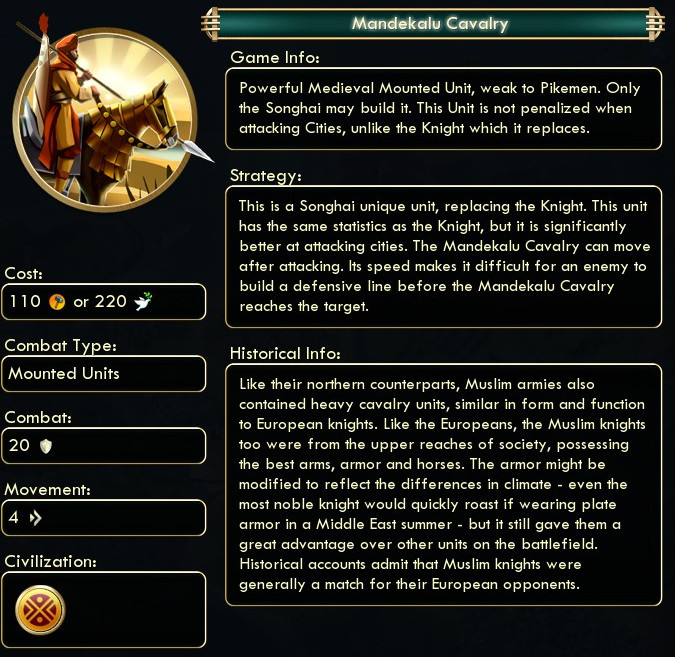 The composition of their unit is completely foreign to the Portuguese, but their efforts are appreciated nonetheless. 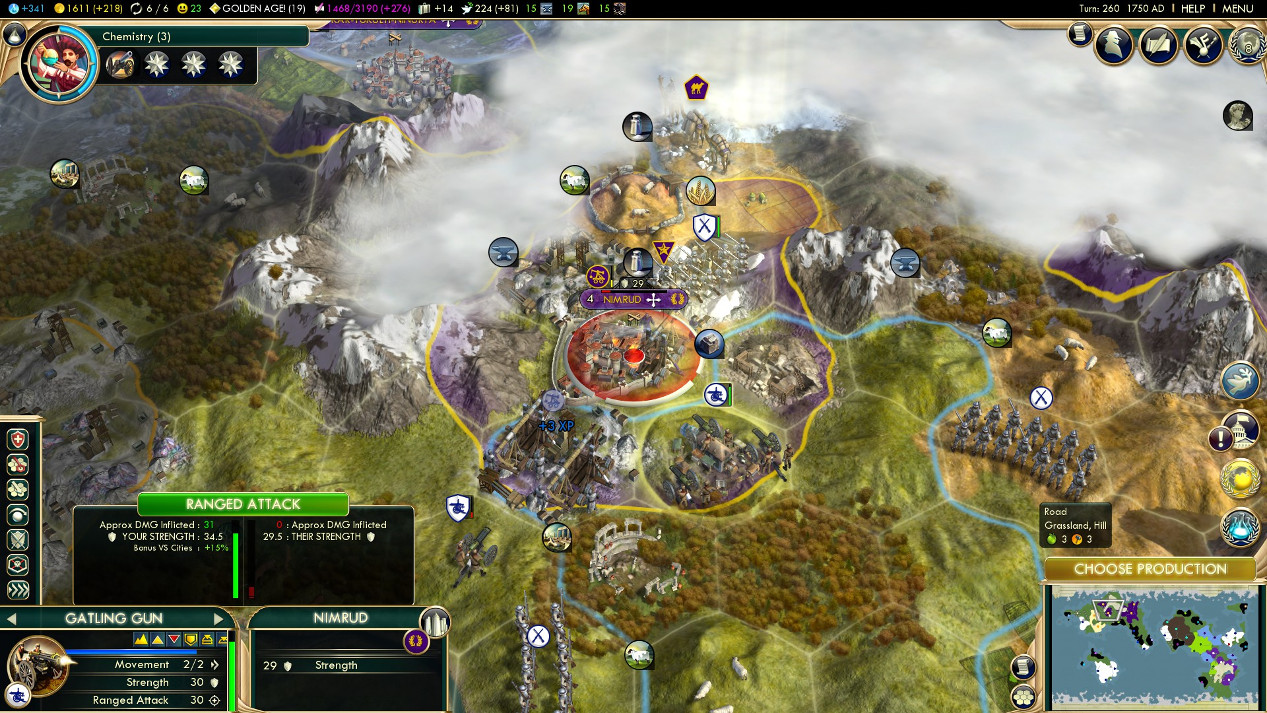 Nimrud's defences disintegrate after some further pressure is applied. 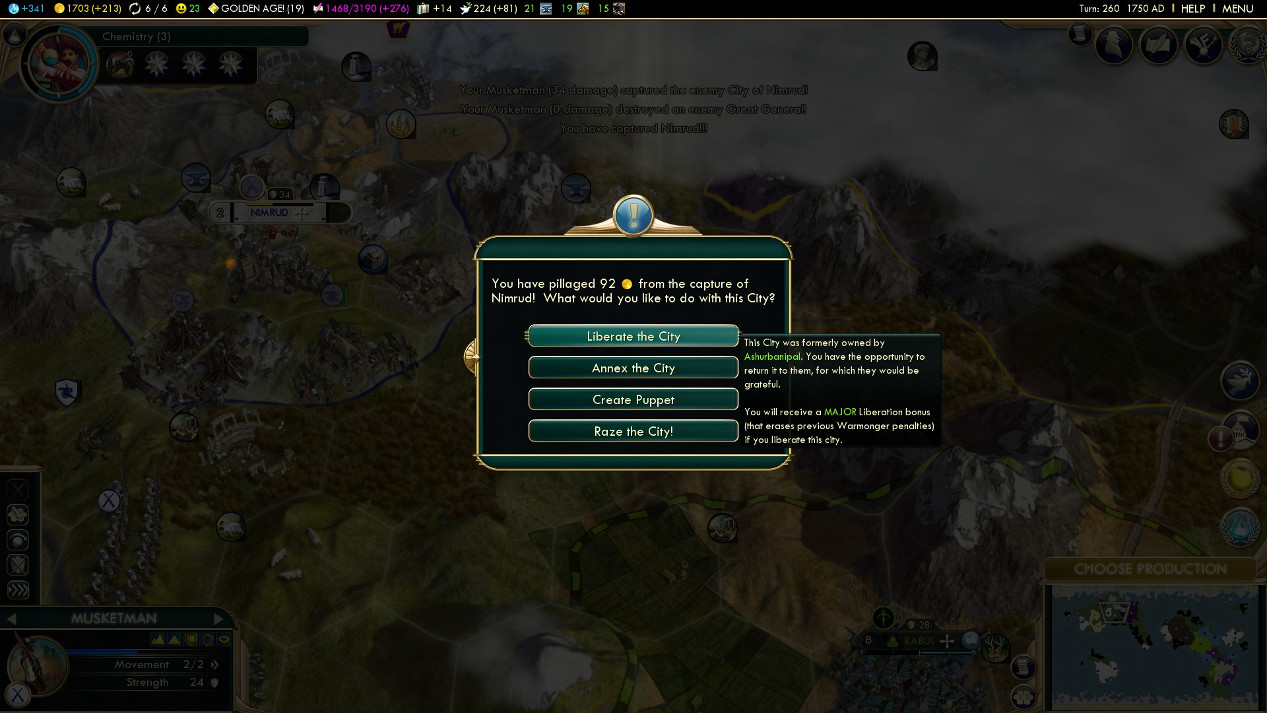 Its subsequent return to Assyria is celebrated by the locals.  Finally, the new settlement is formed in southern Rome, and named the city of Ceuta. 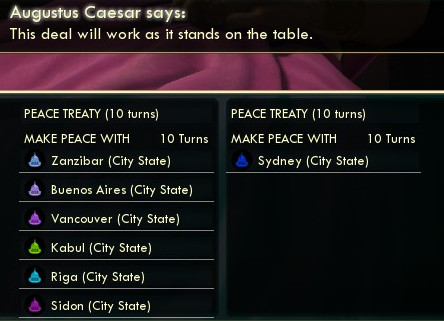 Despite this pressure, however, the Roman refuses to concede to anything better than a white peace, and the President finds herself further embroiled in warfare... A ser continuado.
|
|
|
|
Ooh, that spot south of Venice, right on top of the Deer, looks pretty enticing too with the two sites there along with Crabs and Fur. (have you begun to notice that i tend to play very expansionist hahaha)
|
|
|
|
Gyra_Solune posted:Ooh, that spot south of Venice, right on top of the Deer, looks pretty enticing too with the two sites there along with Crabs and Fur. You don't say!  I'll consider it after we capture the parts of Rome I care about, and we have a chance to see where the global Happiness is at. I may also have to beat up the Shoshone again if they don't drop out of war with Pedro. Venice also seems to be building up an army...hmm...
|
|
|
|
 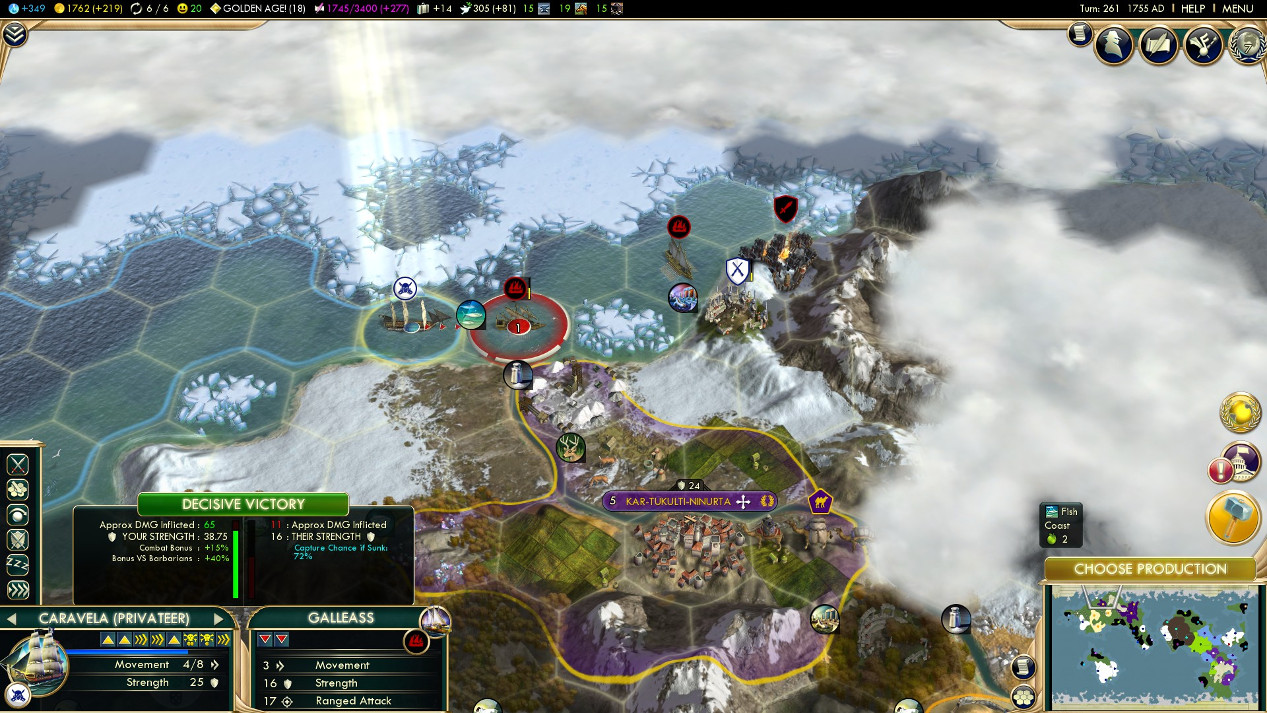 In the frozen Assyrian hinterland, the Caravela moves to remove the threat of two rogue Galleass, hopefully enabling their capture. 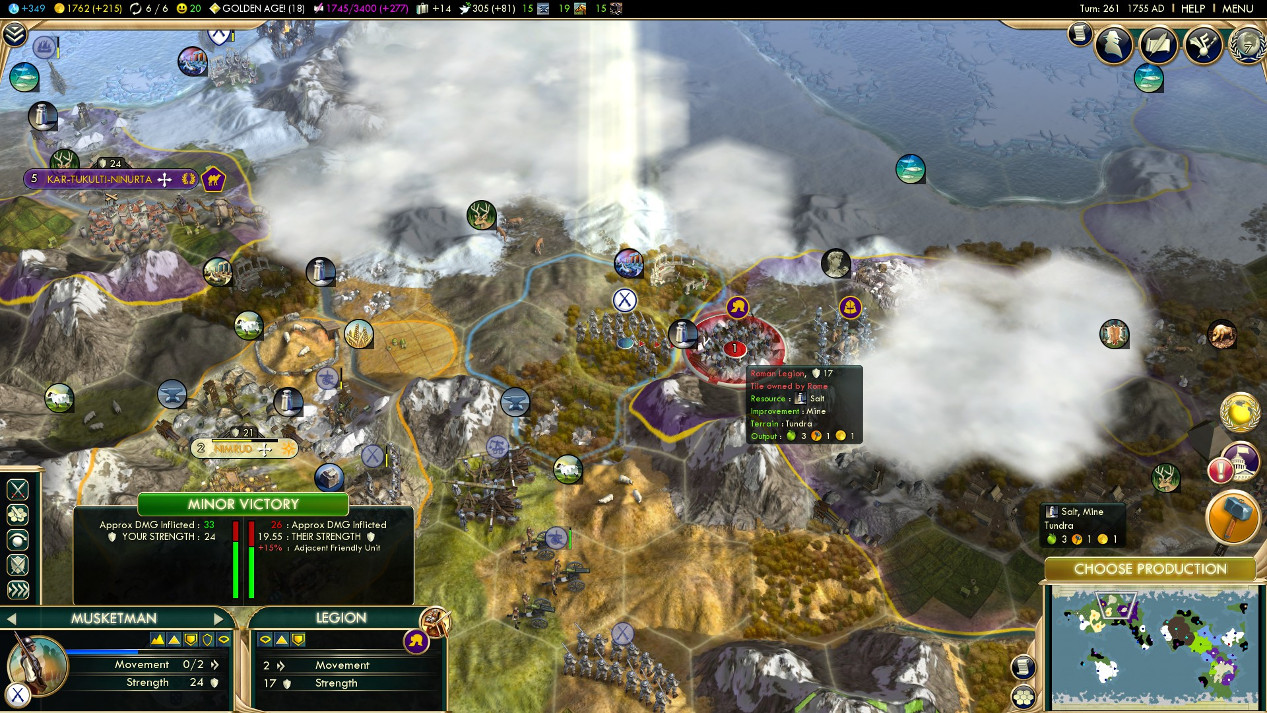 During their push westward, the Portuguese musketeers find themselves having to traverse treacherous hill and forest terrains that make slow their progress as Roman forces retreat behind the front lines.  Their Sebastianist brethren find themselves in Japan spreading the word of their Goddess and saviour, but their words are unpopular in a land of men and women who worship their crustacean ancestors.  Recognizing the potential dangers of these unusual ideas gaining purchase on a greater level, The President finds herself making a deal with her friend in Theodora, hopefully undermining Venetian ambitions subtly.  Pocatello, being subjected to continued acts of passive aggression, is actually rewarded with an acceptance of his unusual offer. The consequences of this, however, are well beyond him.  The strange Confucian doge, however, will continue to find his attempts at giving his ideas purchase in the lands of the Portuguese challenging. 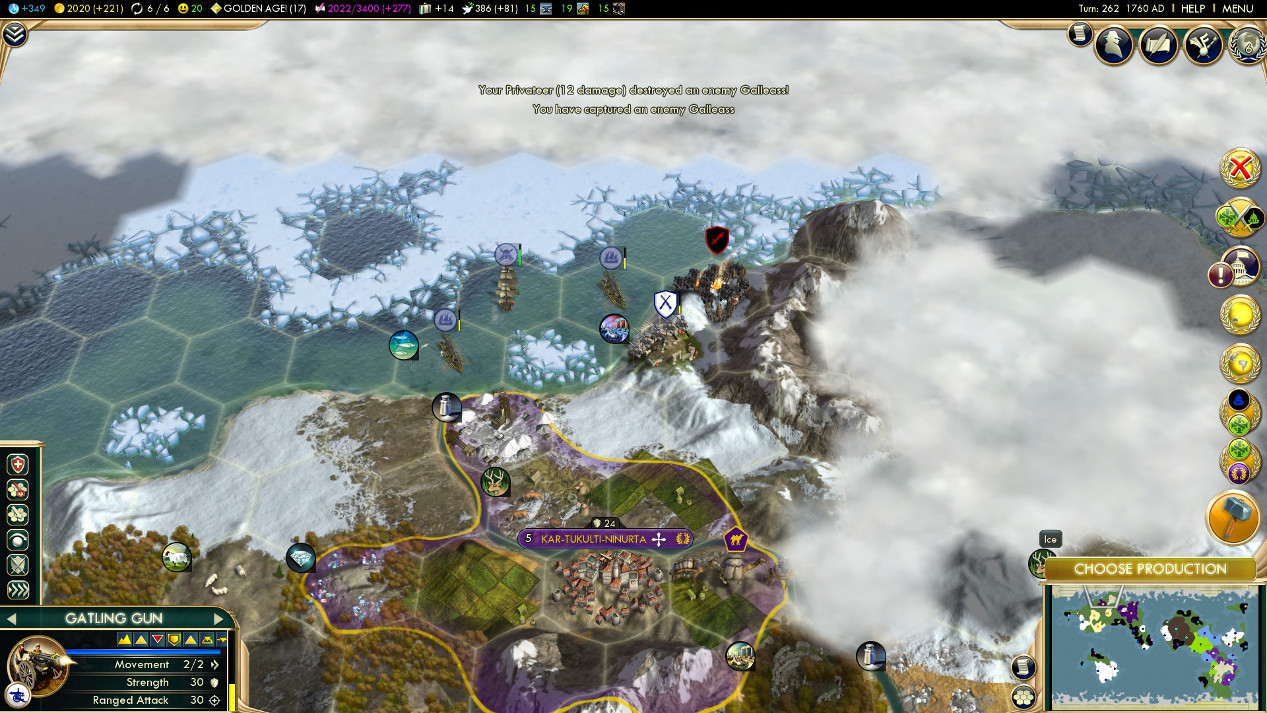 The smaller war in the north proceeds as hoped, and the progress on the eastern front has actually dissuaded the Roman from his attempt at Brazilian domination.  Closing in on the mountains, a Roman city comes into view, protected by natural barriers but able to stymie westward assault.  Though their ideas fail to sway the people of Tokyo, even in spite of the presence of a Portuguese hero, the missionaries continue to do as their Goddess commands them. 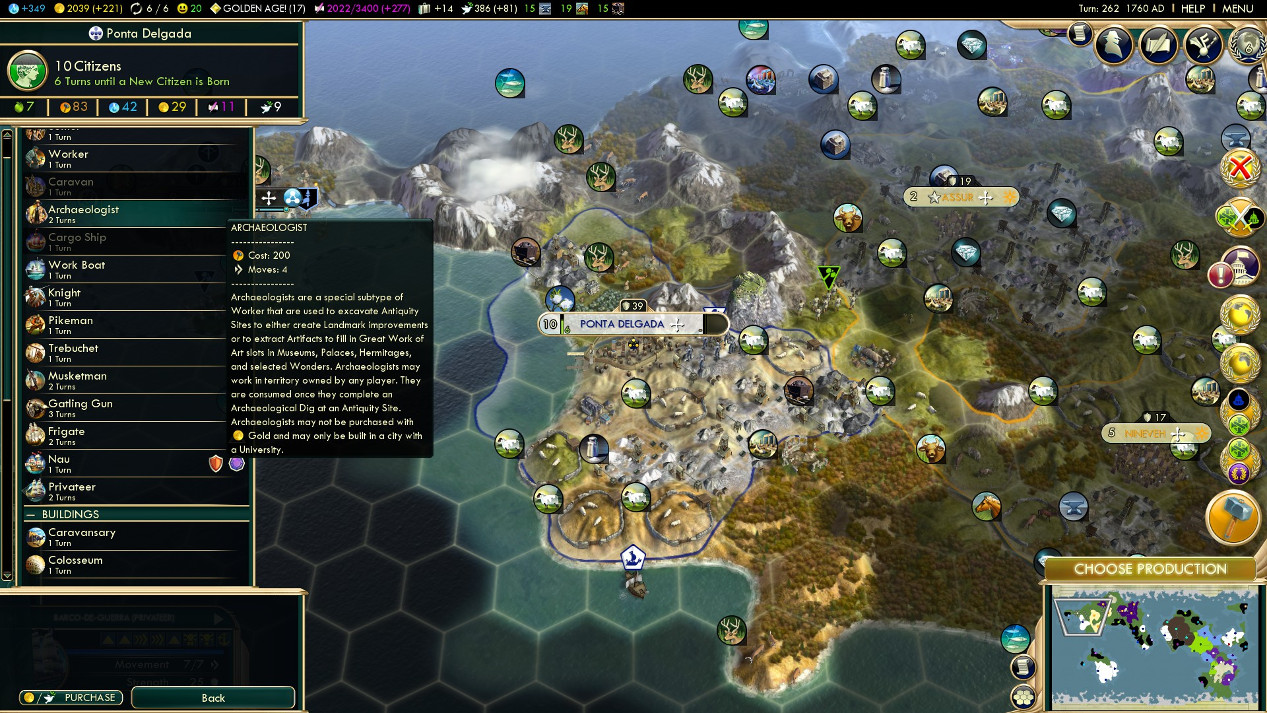 Ponta Delgada understands just as well that the past is a treasure that warrants discovery.  Passive aggression is something that slips from time to time with a snide remark.  Dandolo's latest plea for open borders is re-constituted as a simpler trade deal.  Pedro's situation is dire, and thus deserving of some consideration. 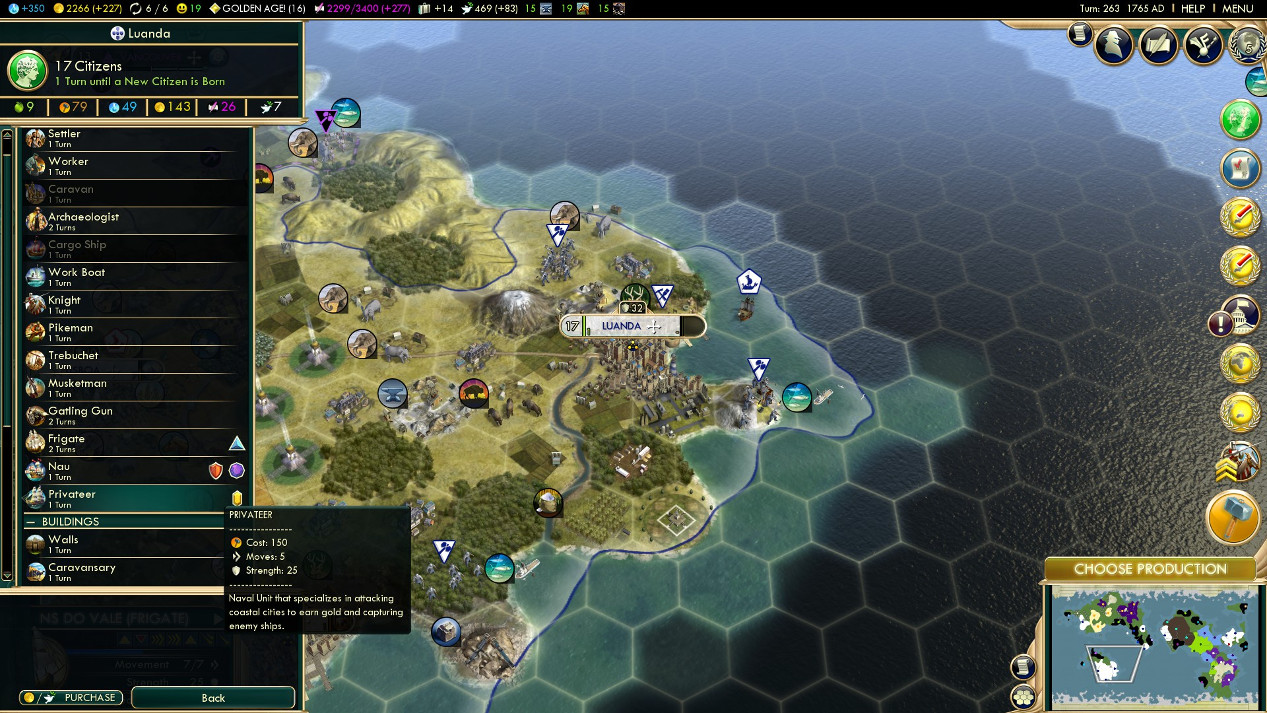 Luanda provides some additional support in the form of yet another Privateer, and local shipyards have it ready in record time. 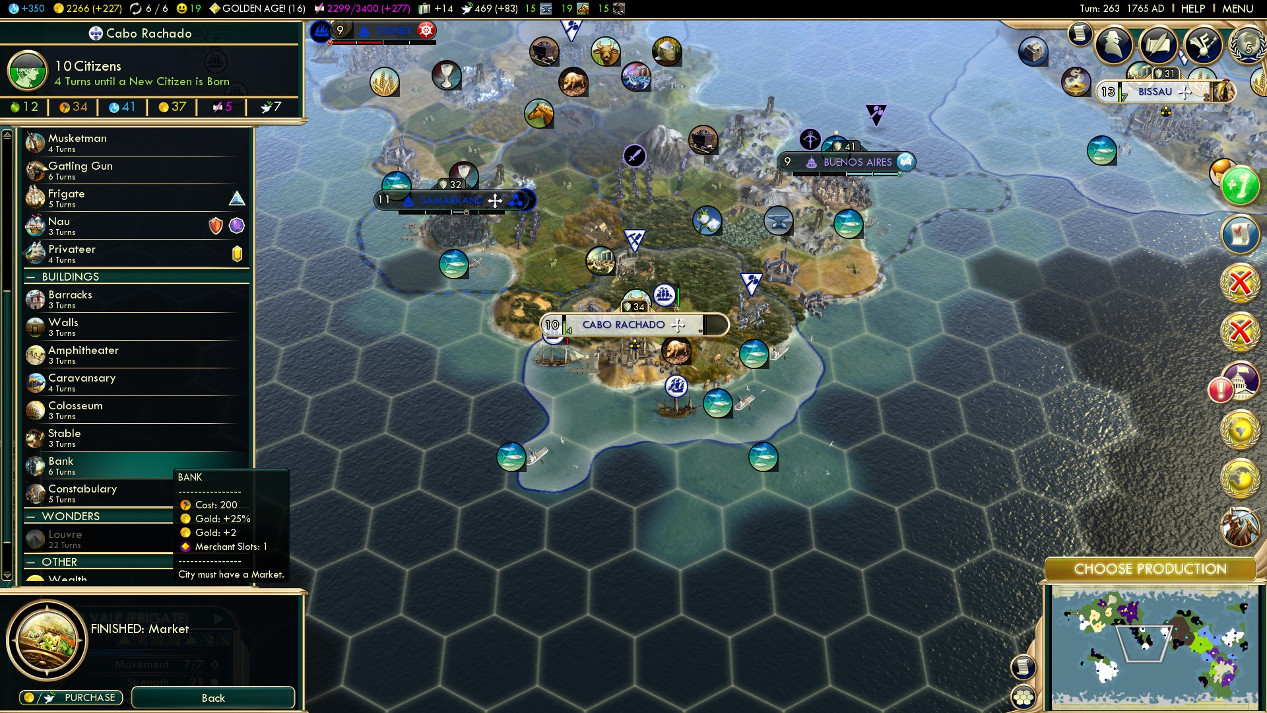 Even Cabo Rachado begins to join the modern world as it becomes a city of some renown. 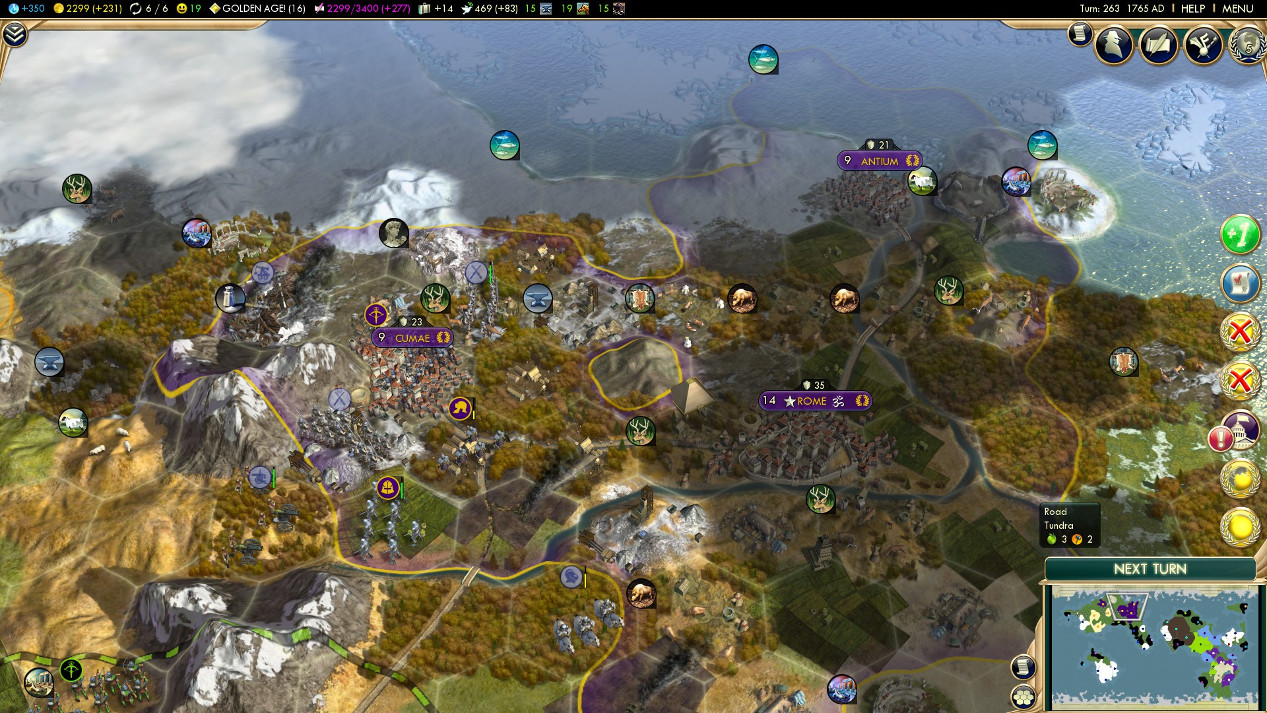 The plan developed by the front is to coordinate with the raiding knights and commence an encirclement of Cumae.  Bissau begins to develop an acknowledgement of its history, and a generation of locals begin to understand that the Shoshone influences and minorities in the city were responsible for many of its earliest innovations. There is a sense that the locals have been marginalized in the current climate of Portuguese social dominance, but the designation of the area as a site of historical importance to the Shoshone helps the local culture bloom in fascinating ways. 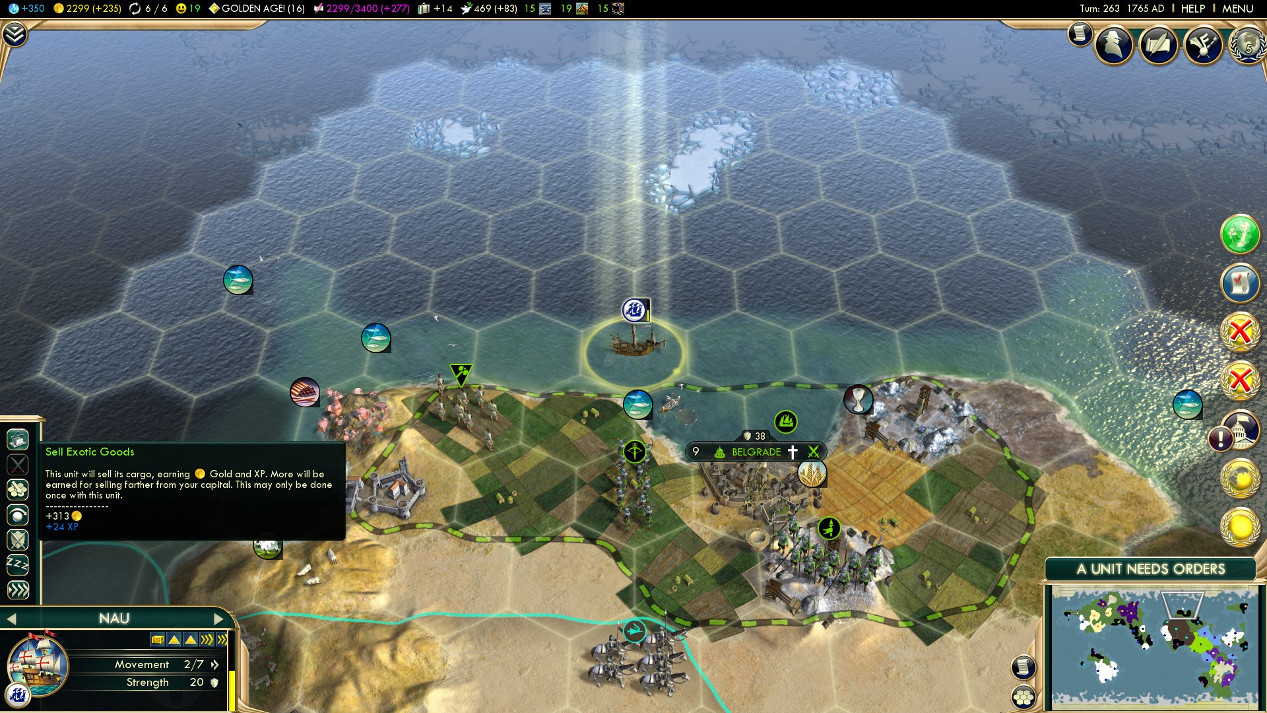 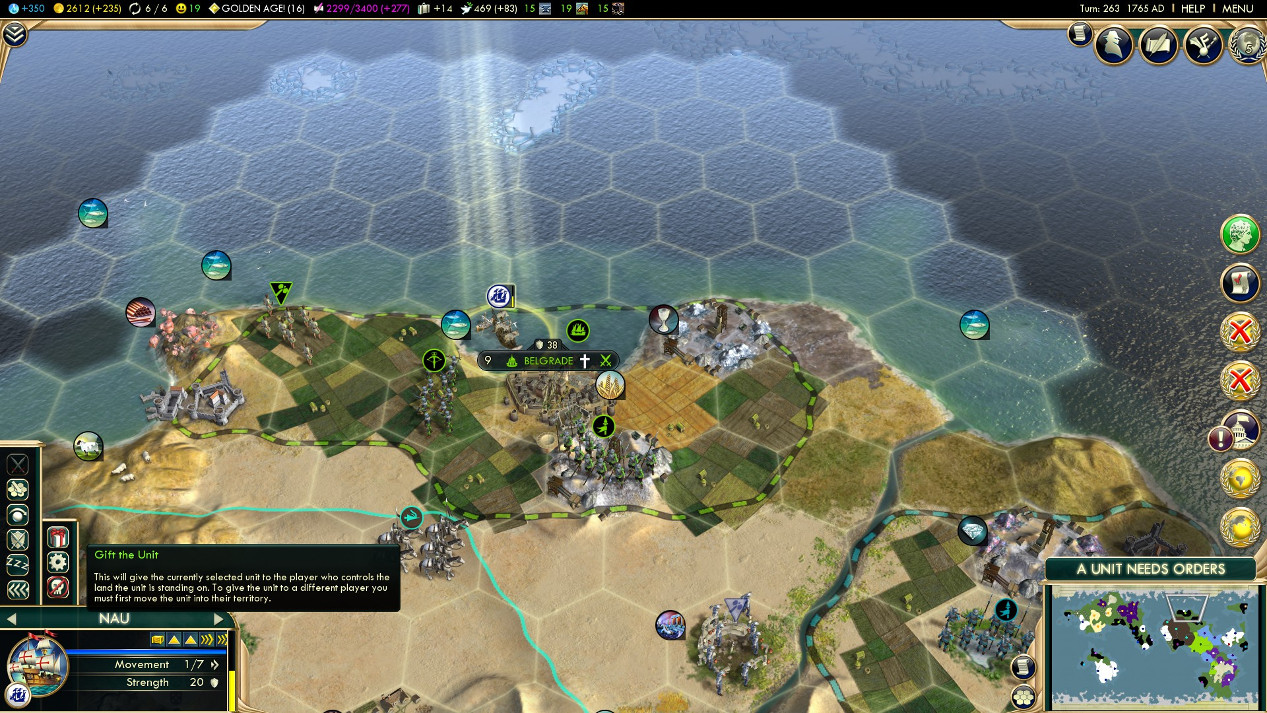 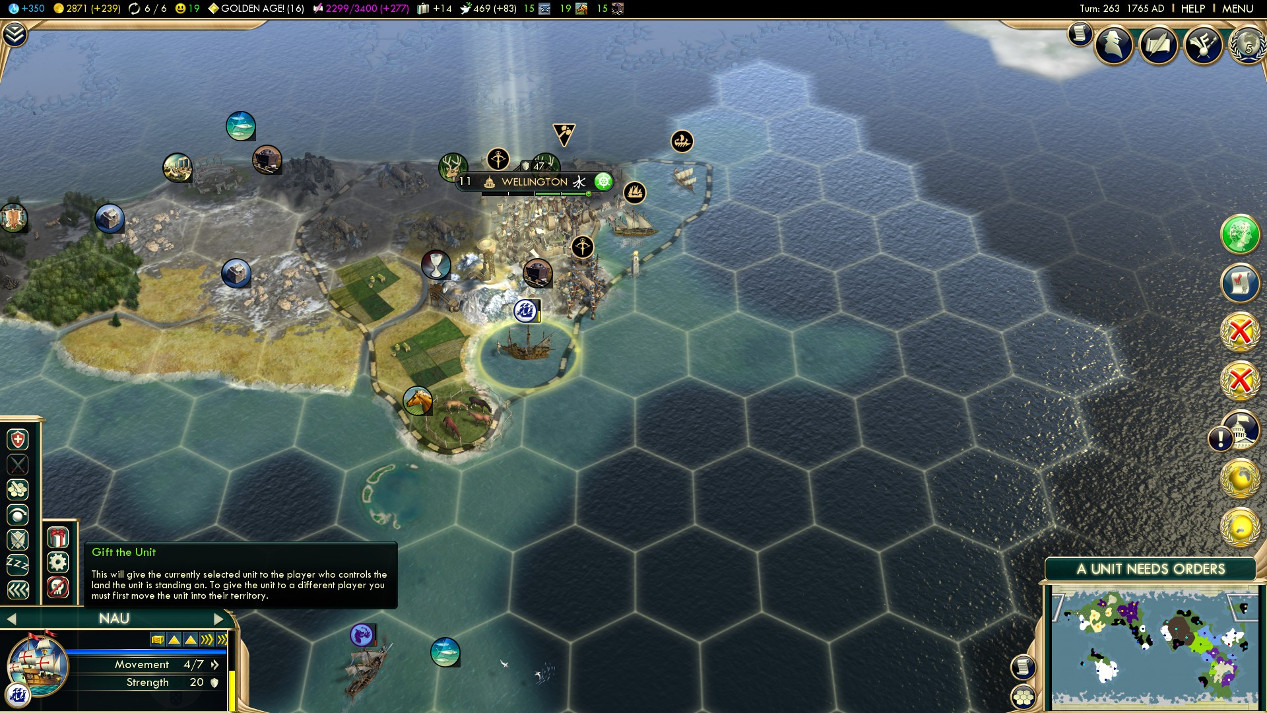 In the interest of developing more favourable reputations with like-minded City-States, the nation implements a plan known as the Vancouver Doctrine, in which surplus Nau such as purpose-built trade vessels complete their tasks and are then offered to the City-State as part of a trade deal for increased concessions towards the Portuguese. 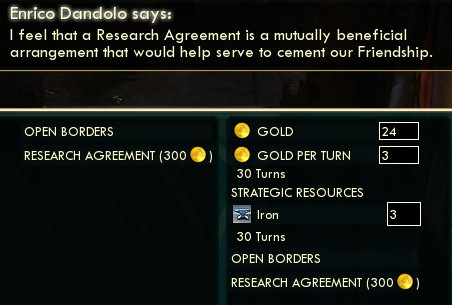 Dandolo is impressed with the wry move, and offers to make a deal with the President, offering to share knowledge contained in the Great Library of Venice in exchange for similar considerations from the Universidades. 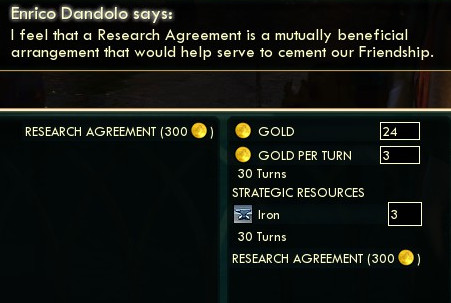 The President strikes a suspicious and familiar line from the agreement, and Dandolo agrees to the revised plan regardless. 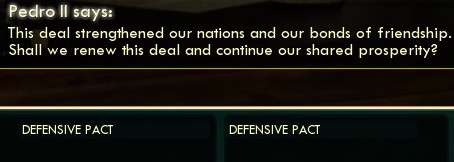 Though it comes slightly too late to be opportune, the treaty of mutual defence with Brazil is renewed for the future. 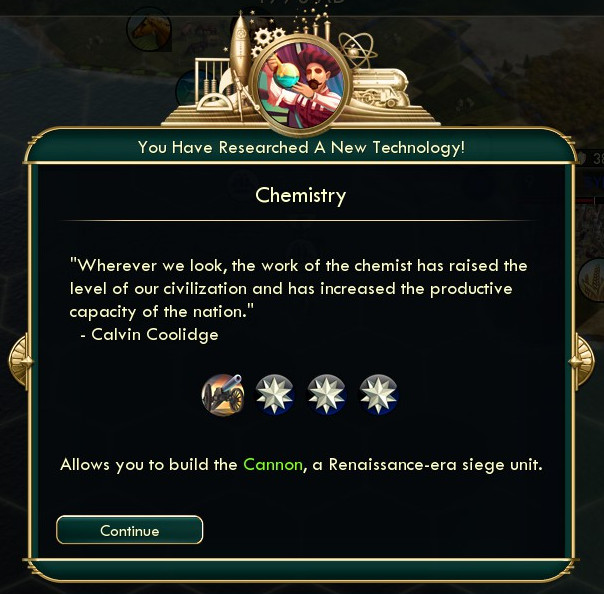 The progress of science is a better measure of time than any.  It is in this age that a new type of music begins to sweep the nation. There are some debates as to the origin of what we now call "Fado", but the most common interpretation is that it emerged from somewhere in Lisboa, where a young guitarist by the name of Maria Severa performed for a small but dedicated audience, who composed poetry and music for her to perform. It is said to fill listeners with a sort of sadness of inevitability, but with undertones of strange joy and fleeting vivacity. It quickly comes to be regarded as a national treasure, though Maria Severa herself died of illness while she was still quite young. 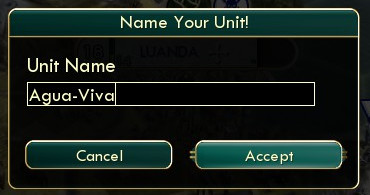 Still, a war continues as always, and Luanda's new jellyfish takes to the seas.   Being purpose-built as a city, Ceuta sees early and significant developments to its manufacturing processes. 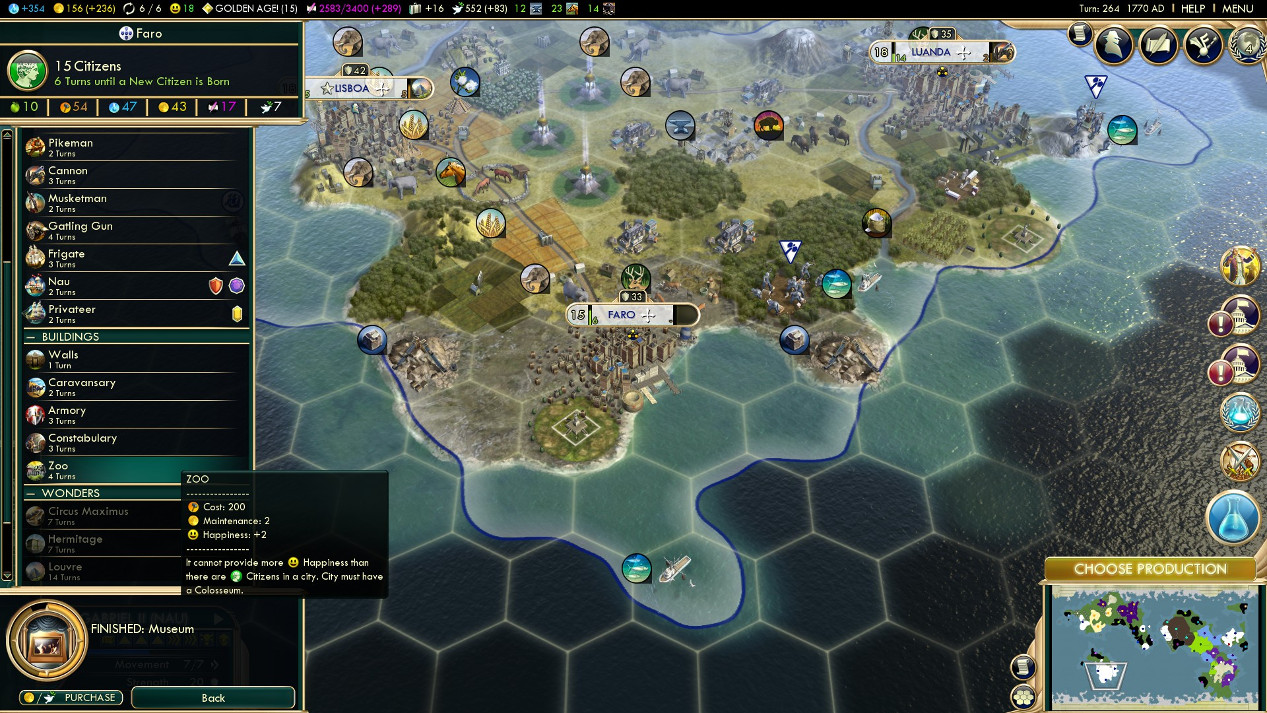 Faro looks to other entertainments as a distraction, and the zoo is used to showcase the hardiness of animals exposed to the difficult local winter 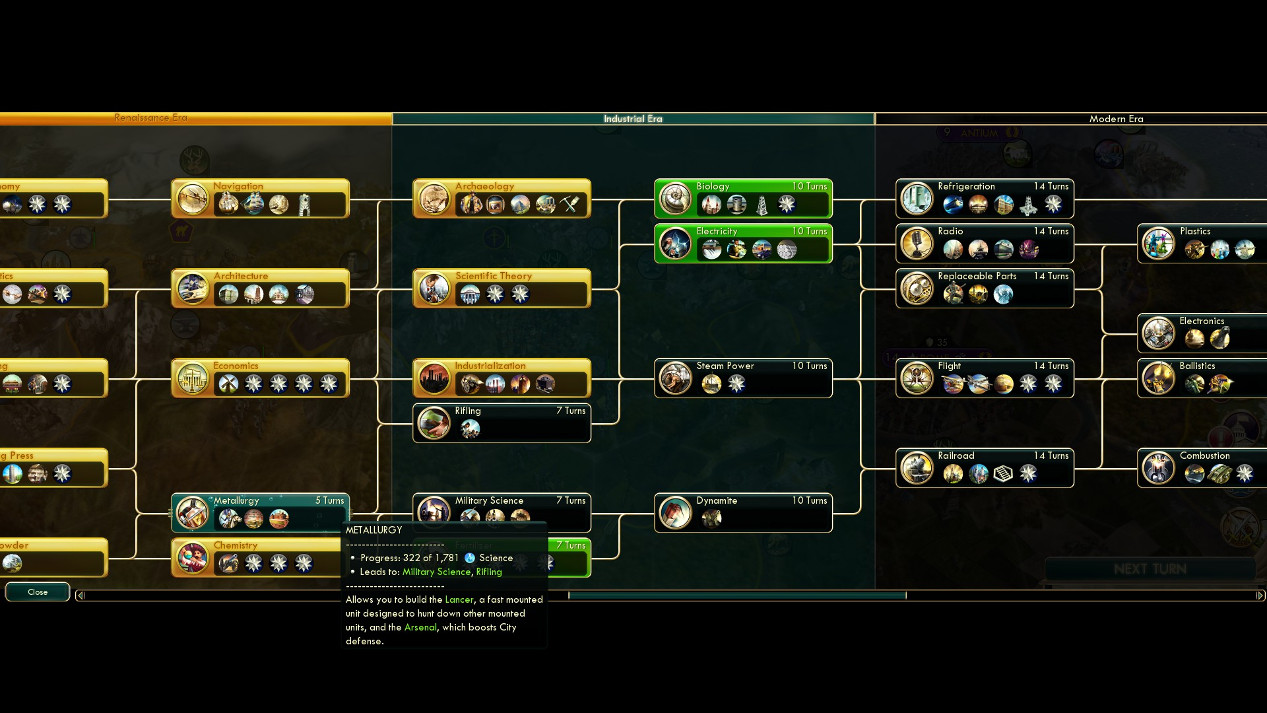 The attentions of sciences must again turn to war. 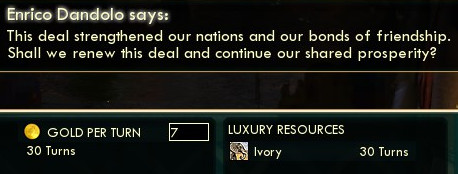 Dandolo seems content to restrict his requests to simple trade for the time being.  Ceuta needs to grow quickly to fulfill its task, and Luanda moves to support it with Casa-bought food imports. 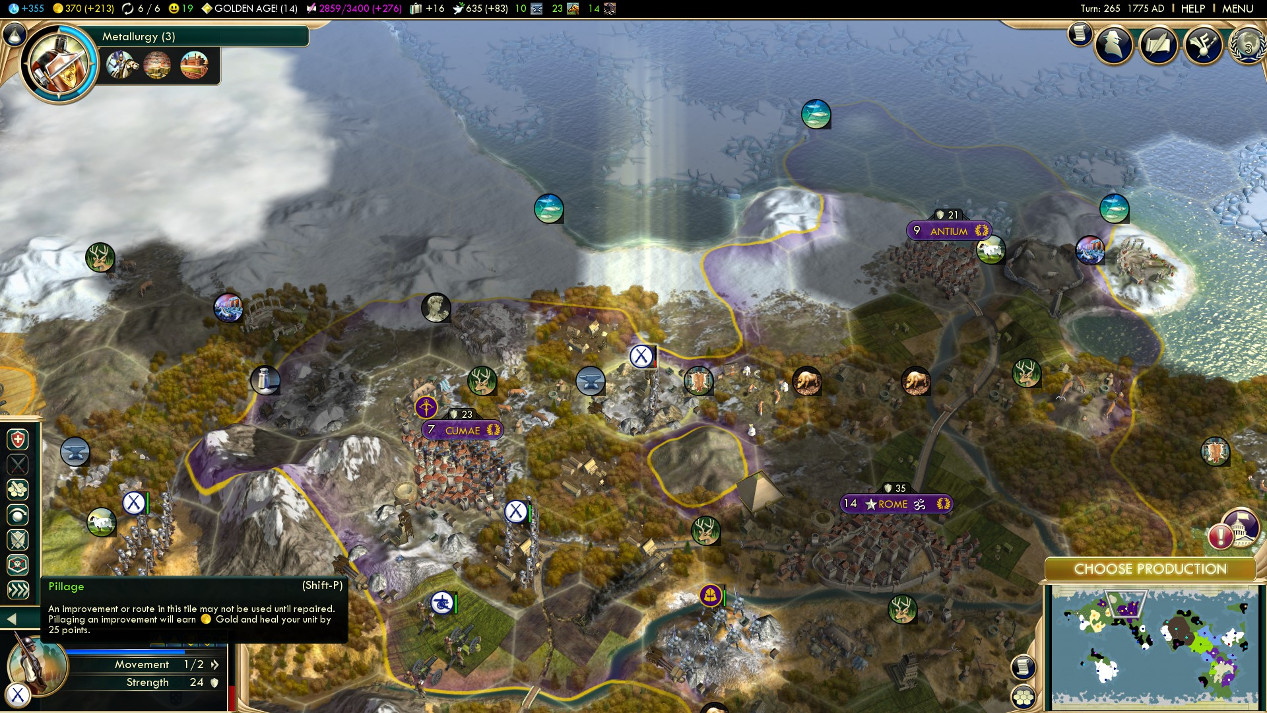 The war was starting to exert considerable pressure on the Portuguese forces, leading to a failed initial encirclement. 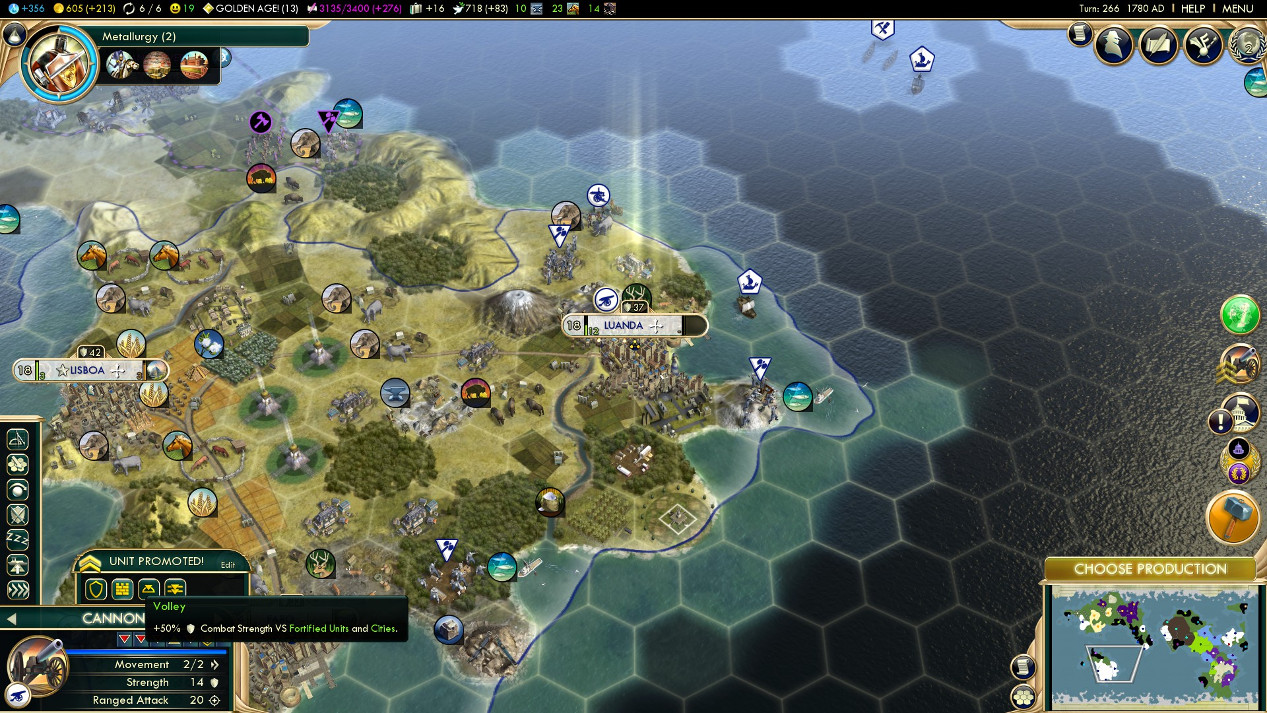 Reinforcements were being built in Luanda, but they would take a significant amount of time to arrive. 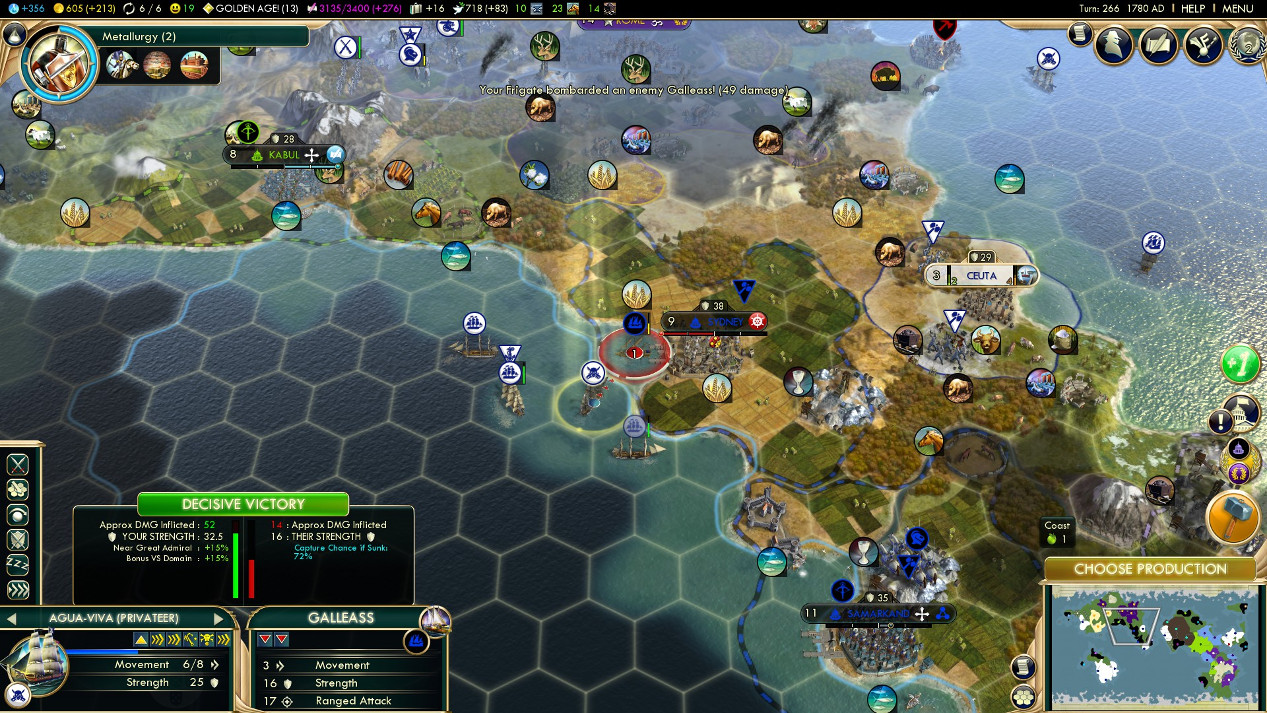 The Agua-Viva had no such trouble, and the Sydneysider fleet (as it were) was quickly outmatched. 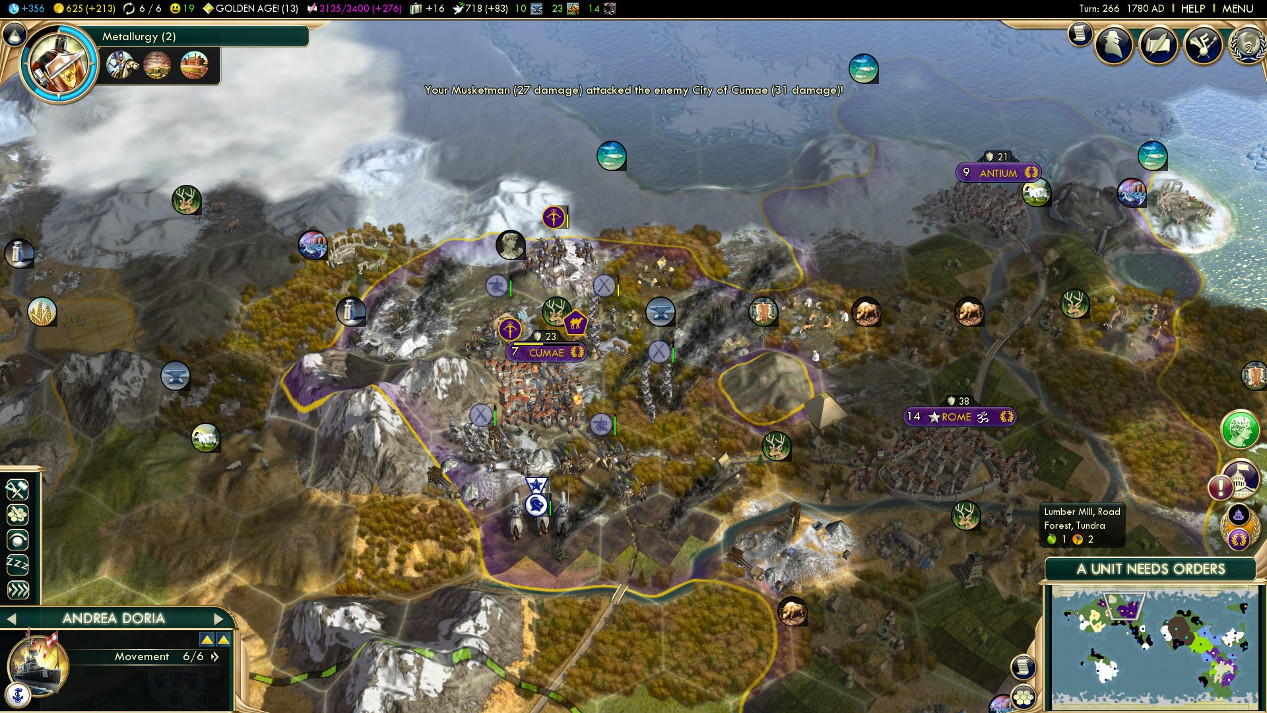 Yet, the pressure was starting to build on the Roman as well. 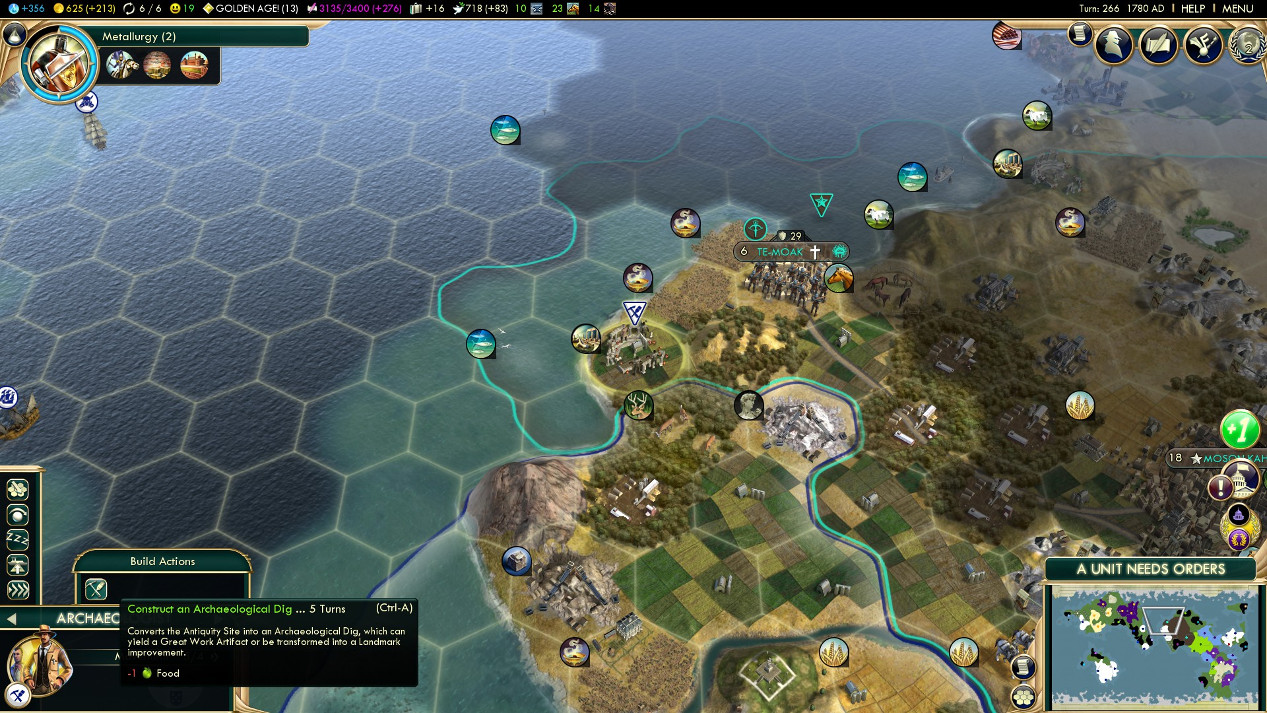 Whether Portuguese aggression is fierce or subtle, it makes life for the despots and warmongers of the world that much poorer.  Yet, the President was starting to tire of the empty gestures of friendship  Though not as much as she was of Dandolo's requests.  With these thoughts, she stood before the assembly at the Conference of Lisboa. The Roman delegate was visibly slouched in the corner, while the Shoshone and Brazilians were yelling at one another with enough force to derail any nearby conversation. However, those assembled fell silent when her turn came to speak.  "We live in times of great difficulty for all people, conflicts are escalating around the world and it seems that every day some new cause is found for us to tear each other asunder. Perhaps the fate proscribed to us by the great Sebastiao is indeed unavoidable." 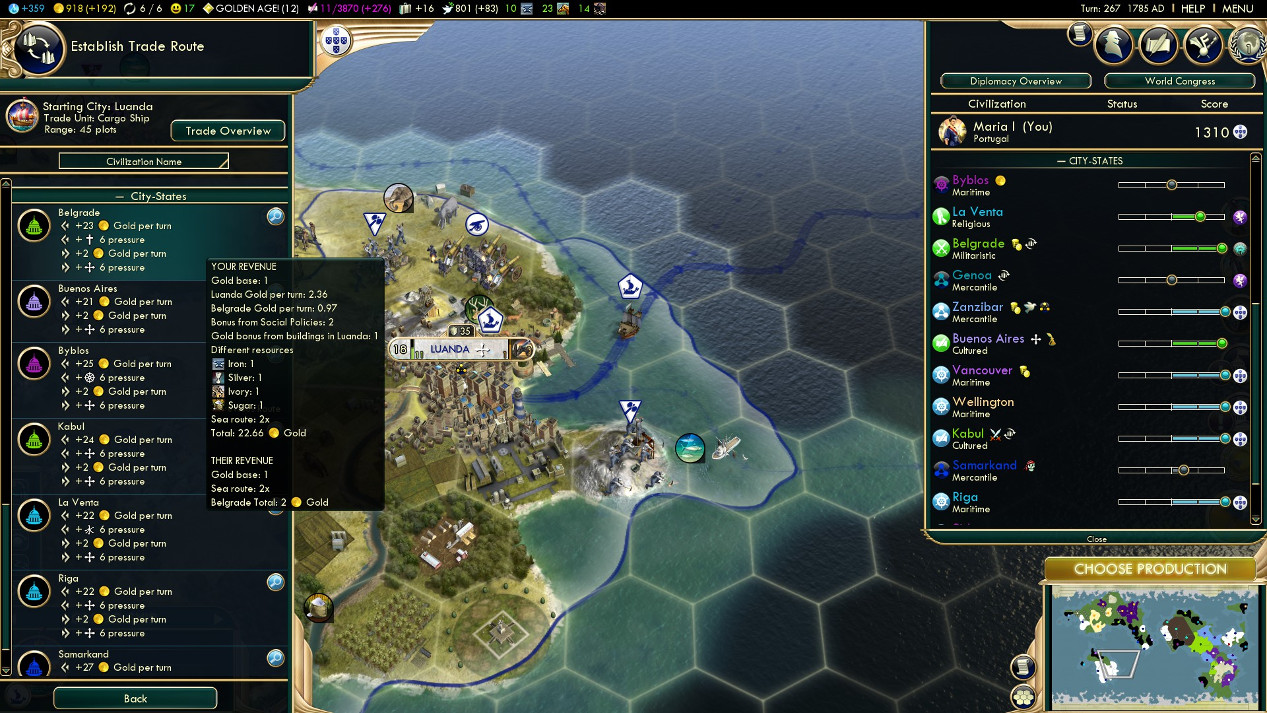 "Yet, in this world there are also bonds worth protecting and treasuring. Everywhere you turn, people are creating art and music, discovering new things about this planet we inhabit, becoming strong, growing older and wiser." 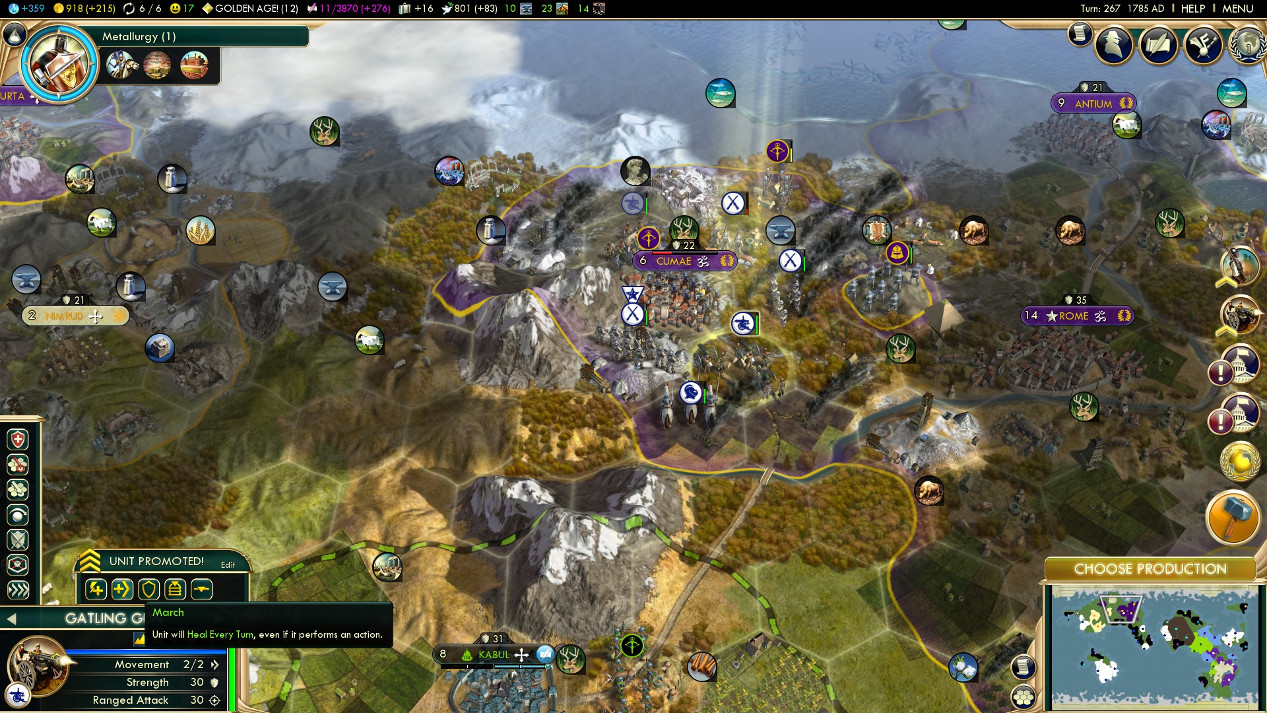 "Our conflicts and wars are transient things, fought to resolve worthy disputes, yes, but they do not fashion the character of our world." 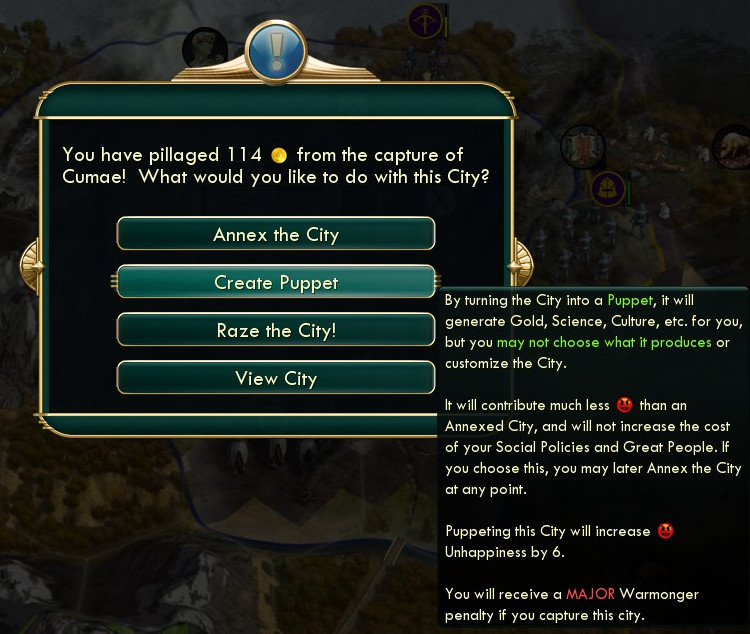 "Our world is one where people deserve to be free, no matter who lays claim to a border, or manages a city." 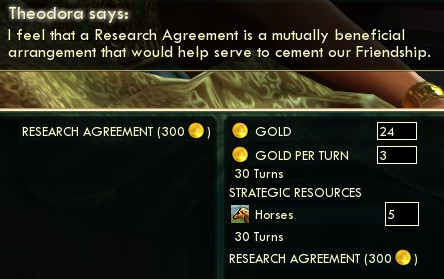 "It is in the spirit of cooperation that we grow greater every day. This ability to cooperate is what makes us truly worthy of this great gift that we call life."  One of the Japanese ambassadors suddenly receives a message from a black-clad man who slips into the building, and both men suddenly leave in a great hurry. "It is in the spirit of this cooperation that I hope to invite those among us who do not claim to be among the empires of this world to find your voice in this assembly." 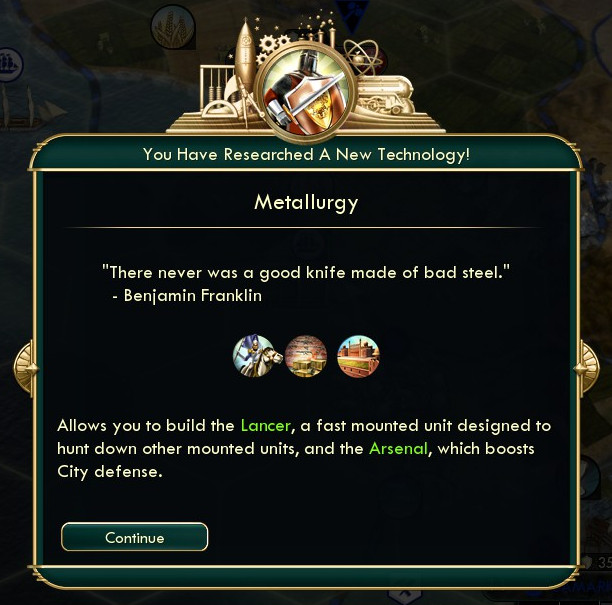 "It is within your power to make changes to this world, as a free populace who claim allegiance only to your histories, ideals, and cultures." 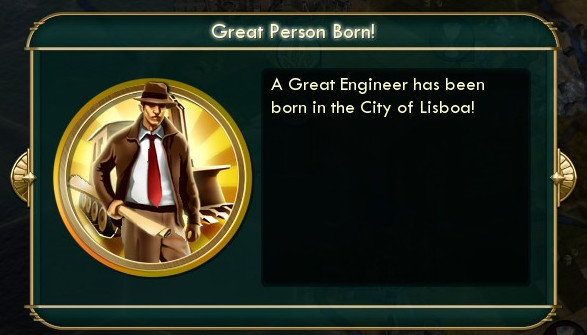 "In this, I see that you are all just as worthy as any of us here to find a place at this assembly, and I hope that when next we meet, you will consider joining us in determining the fate of the nations assembled here."  A brief burst of applause, followed by a hurried scribbling of pens on paper.  João de Almeida approached the President cautiously, informing her that some progress was forthcoming on the military research branch of the Universidade de Lisboa. 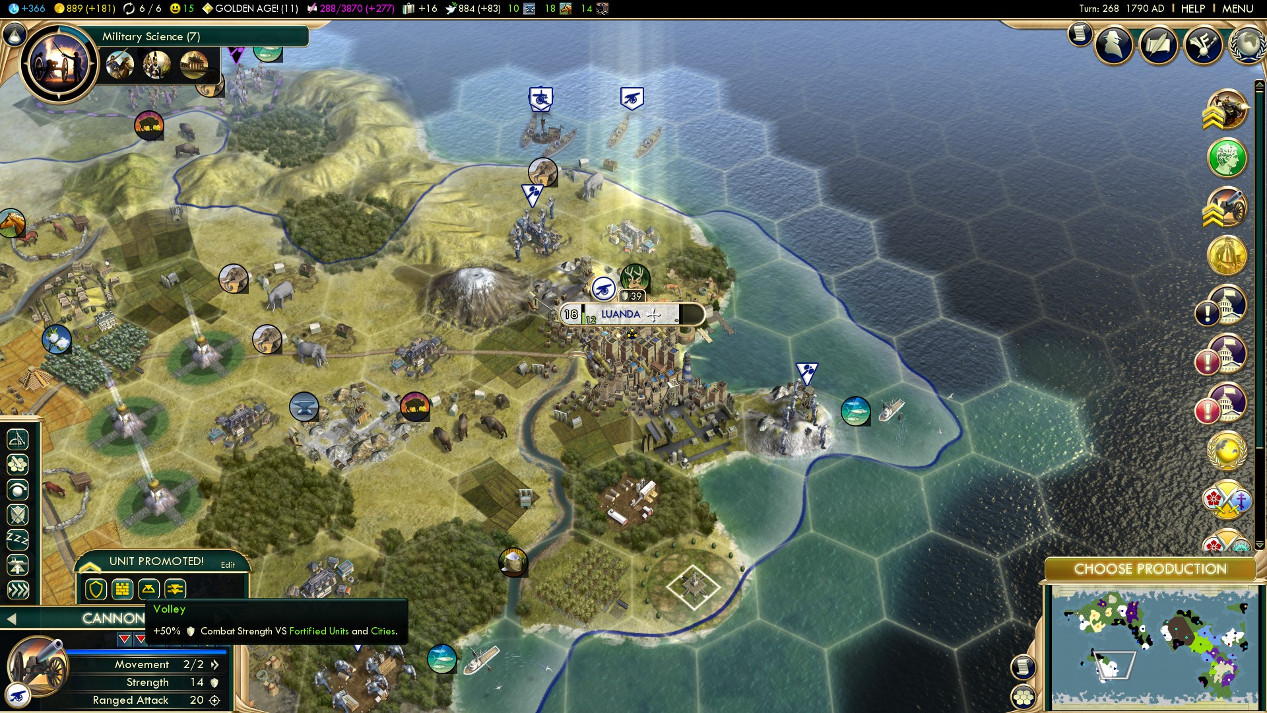 Further reinforcements were preparing to move out, but these had a different destination. 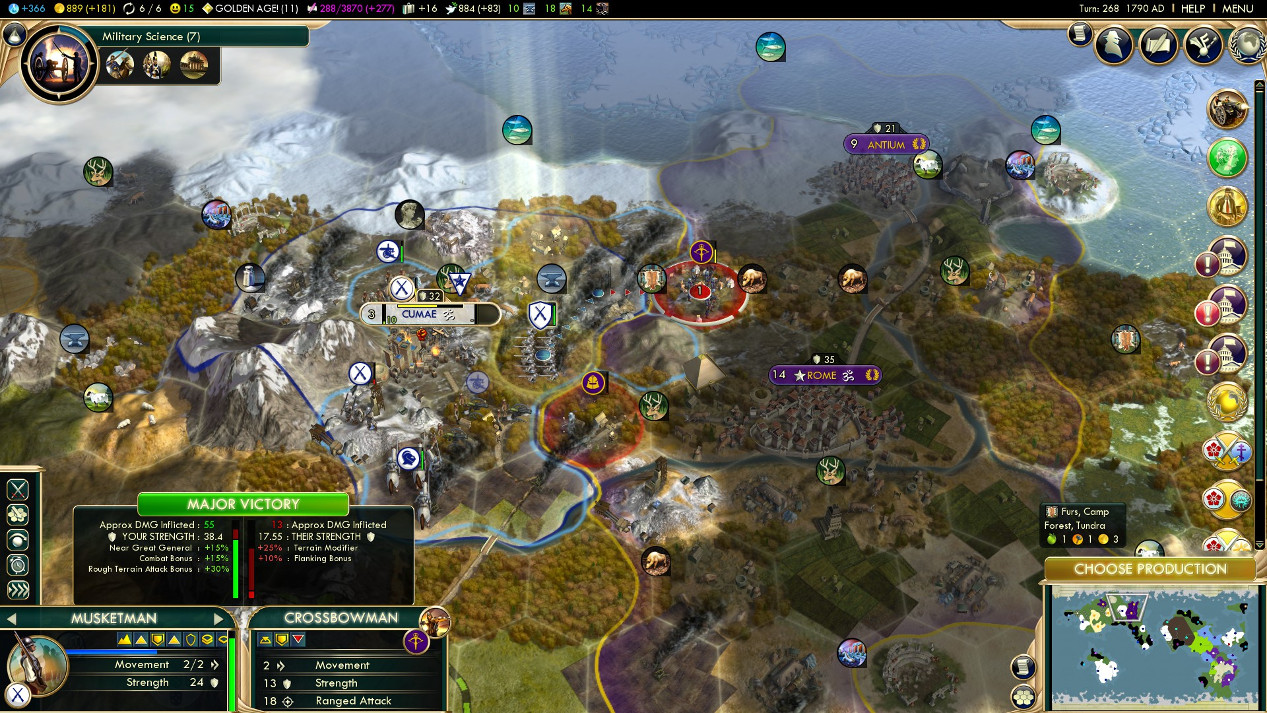 Using Cumae as a staging area for their next assault made the second Portuguese push into Roman territory considerably easier. 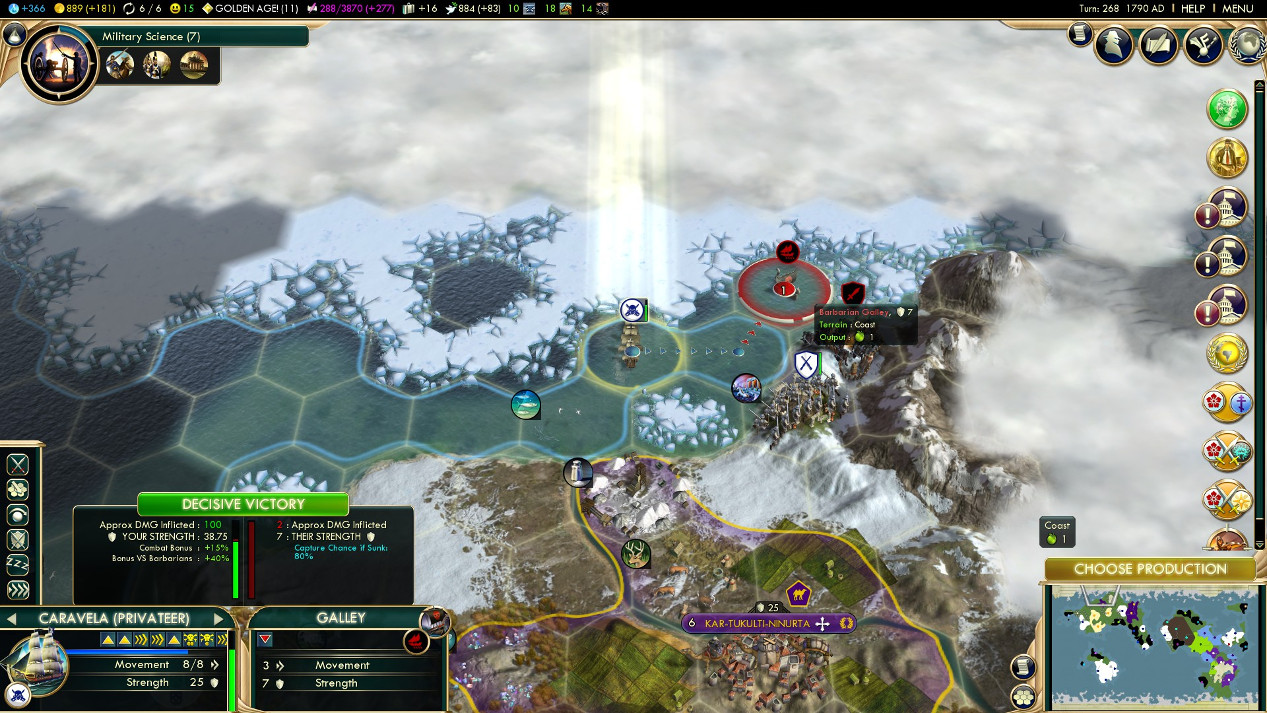 Even a damaged Caravela is more than enough to handle ancient fossils unsheathed from the ice. 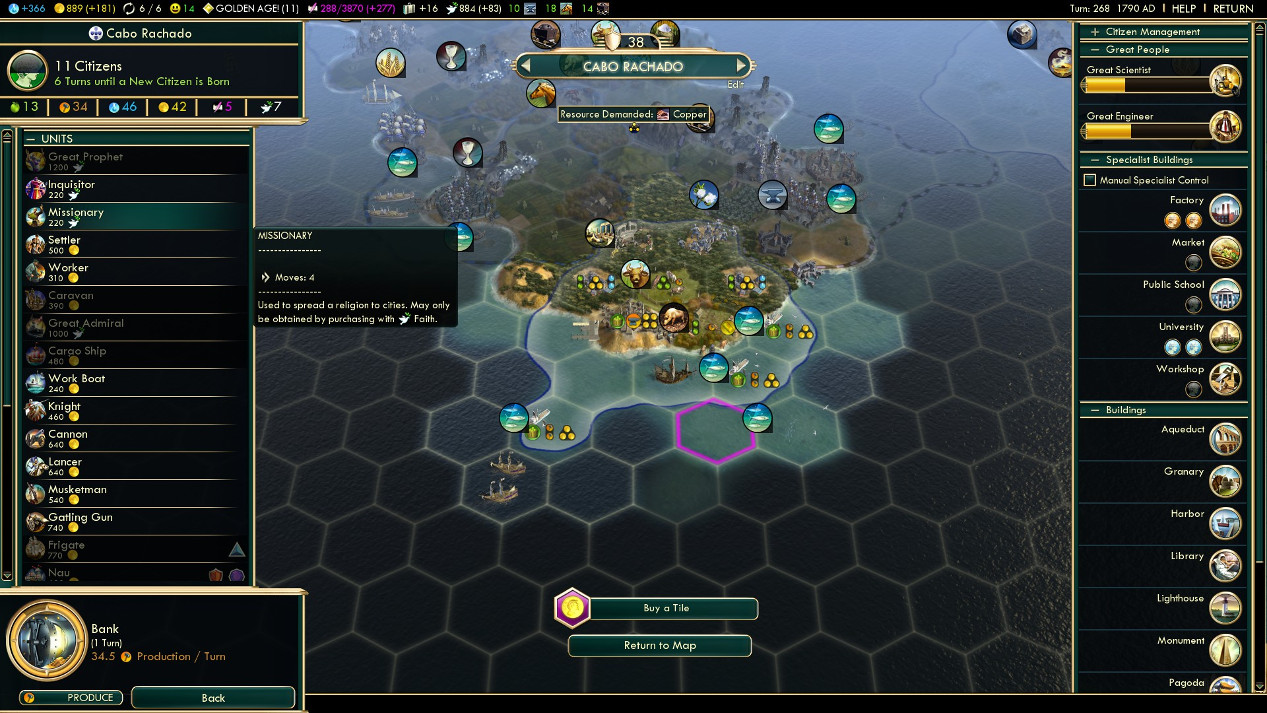 The grandeur of Cabo Rachado makes itself known though its familiarizes with modern Sebastianism, and its subsequent offer to support Ceuta with these knowledges. 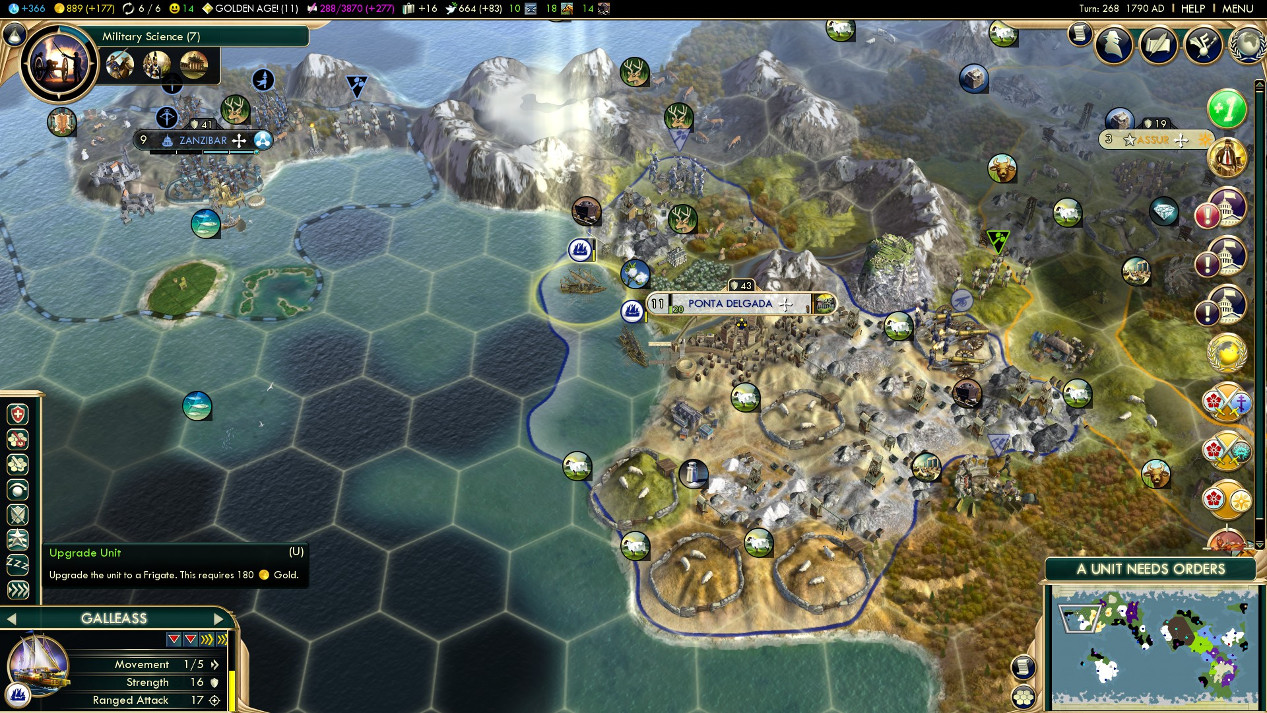 In Portugal, any old dog can learn new tricks, it seems. 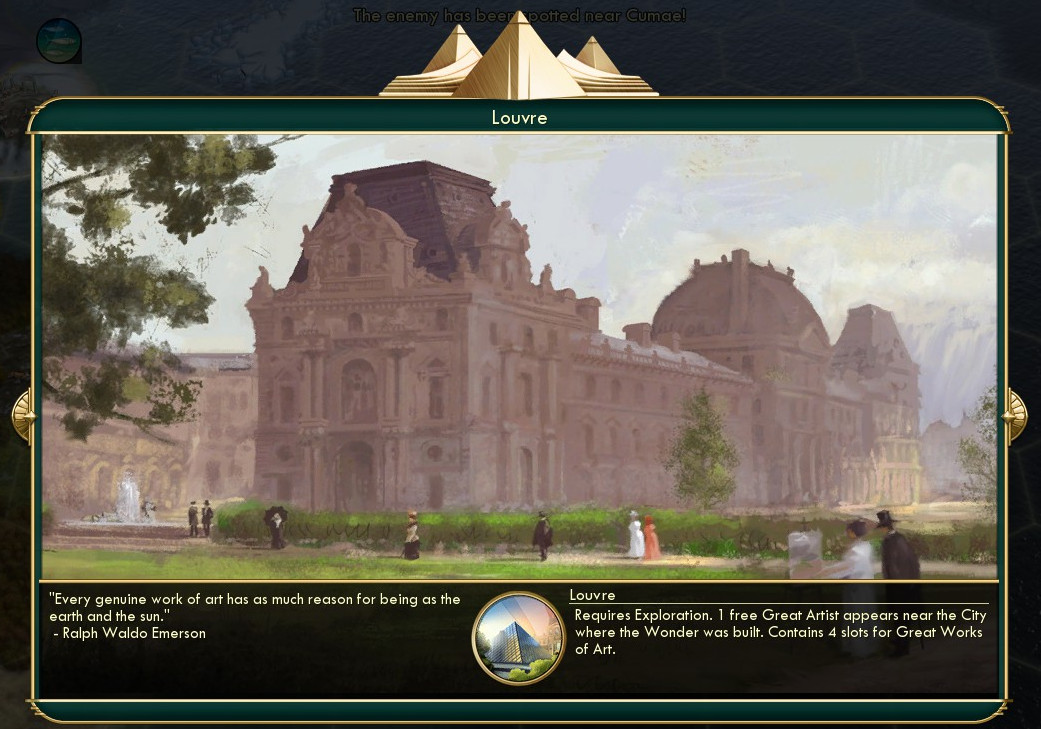 The old is revitalized when seen in just the right way. Perhaps this idea lies at the heart of the popularity of Fado. 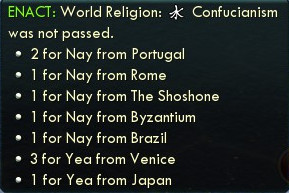  The President's speech is also one that makes waves in the international community, and makes those gathered wonder about a new direction that the Assembly may take when next it convenes. 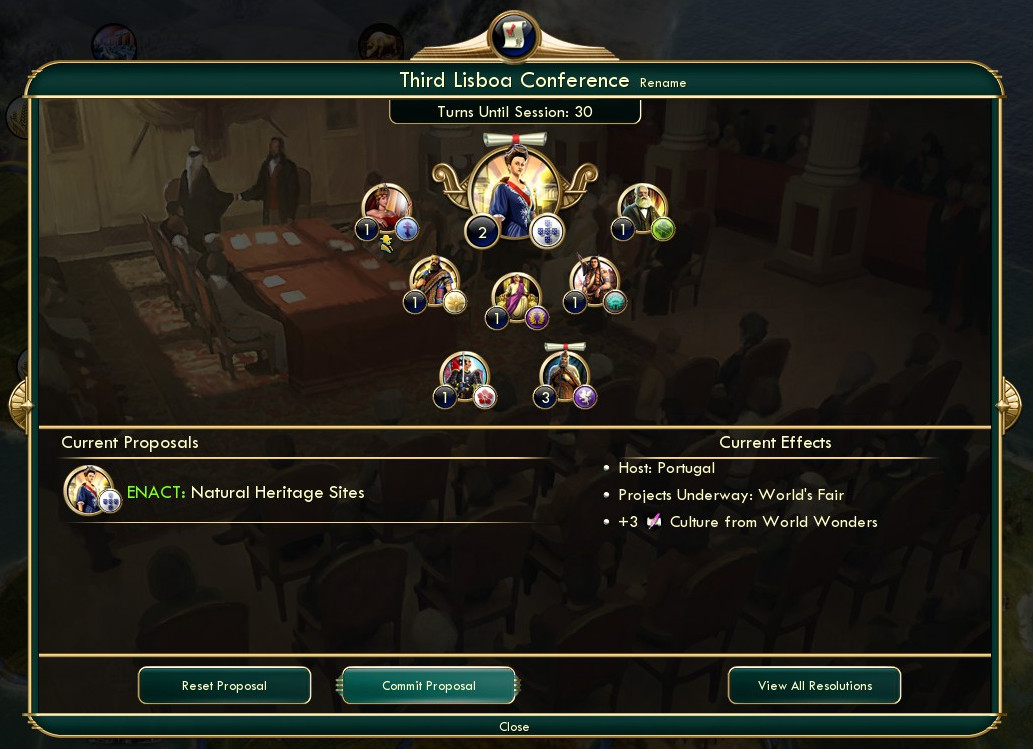 The speech is also one that inspires a sort of common thinking between the Portuguese and those they would consider friends. The idea that people ought to be free to make whatever allegiances they so choose is one that gains considerable traction among the citizenry desiring lives in Lisboa. A famous expression spreads through the mainland as a result: "Somos todos Portugueses." 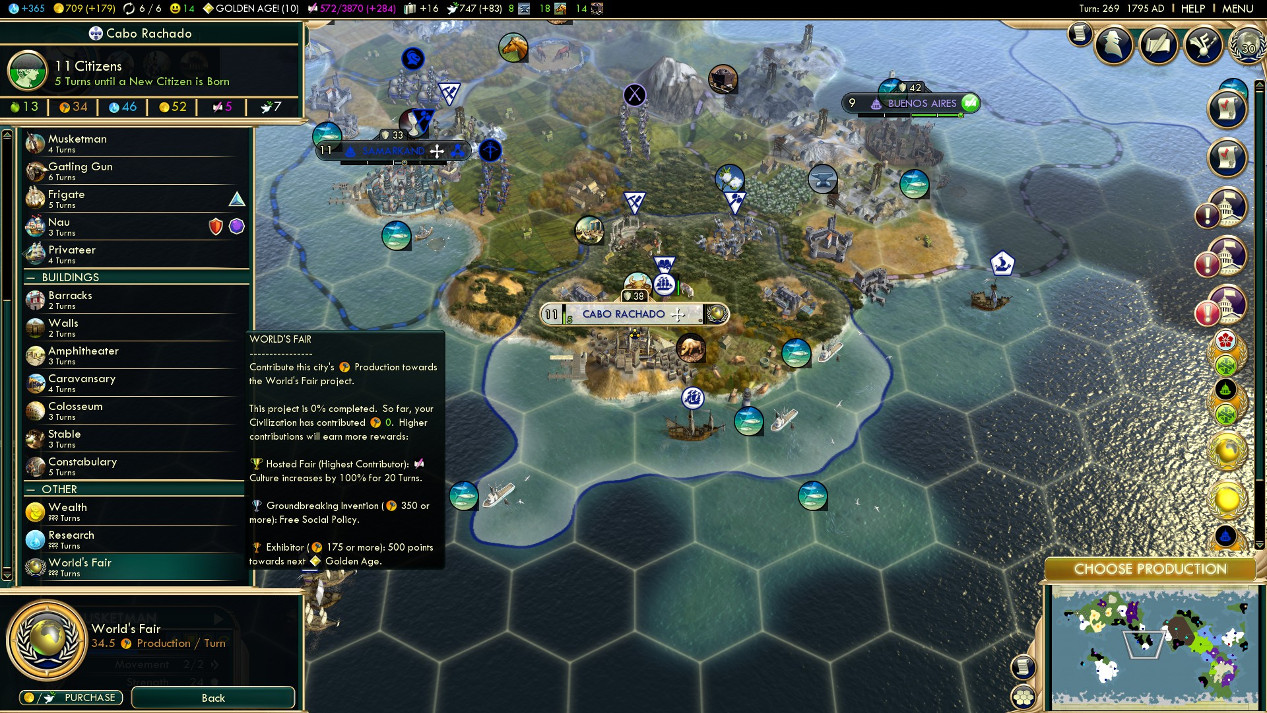 This enthusiasm manifests itself in a desire to demonstrate to the world the ingenuity of Portuguese thinkers and performers in a greater forum. The World's Fair is one of a small number of building projects that cities from all Civs can work on. The project has three target thresholds, visualized as Gold, Silver, and Bronze, which each provide certain benefits to Civs that contribute a certain amount of Production to the project. In all cases, Gold only goes to the single largest contributor, while Silver and Bronze go to all participants who meet certain target contributions. We are, of course, going to dedicate a significant portion of our continent-spanning empire's production to this project, in the hopes of cinching Gold.  The time to strike the North has come at last. The sooner peace returns to Assyria and Rome, the sooner all can enjoy the benefits of the world.  Once again, the Assyrians are savvier traders than most.  The President uncovers some shocking information from her contacts abroad. The Roman's attempts at passive aggression fall to the arrows of Oriana once more.  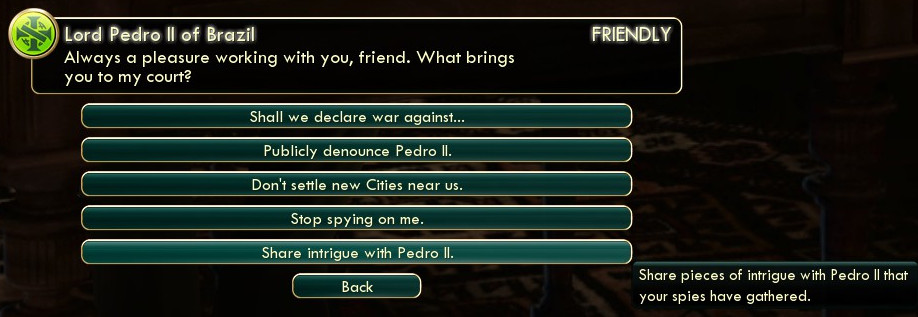 What is considerably more disturbing is the notion that Constantinople's recapture has gone to Theodora's head, and she may be planning military conquests against what should be a common ally. The President, with some dismay, informs Eliana to dispatch a message to Pedro, that they may try to resolve disagreements openly. 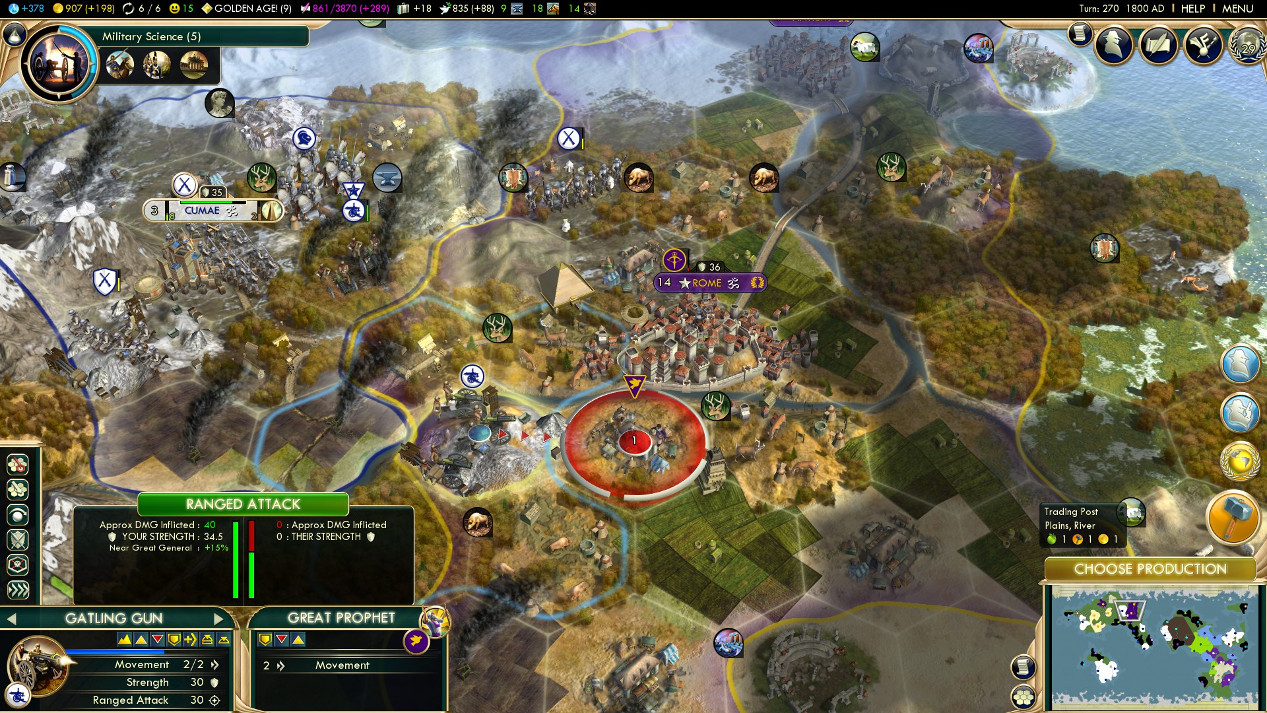 A strange situation arises at the Roman front, as a civilian wanders into the fire line and is captured by the Portuguese. Almeida is dispatched to see what has happened, and finds a Hindu priest of some renown there waiting for him. The two of them speak for some time.  Apparently, he had been convinced to defect to the Portuguese side, which earned some diplomatic capital with Zanzibar. 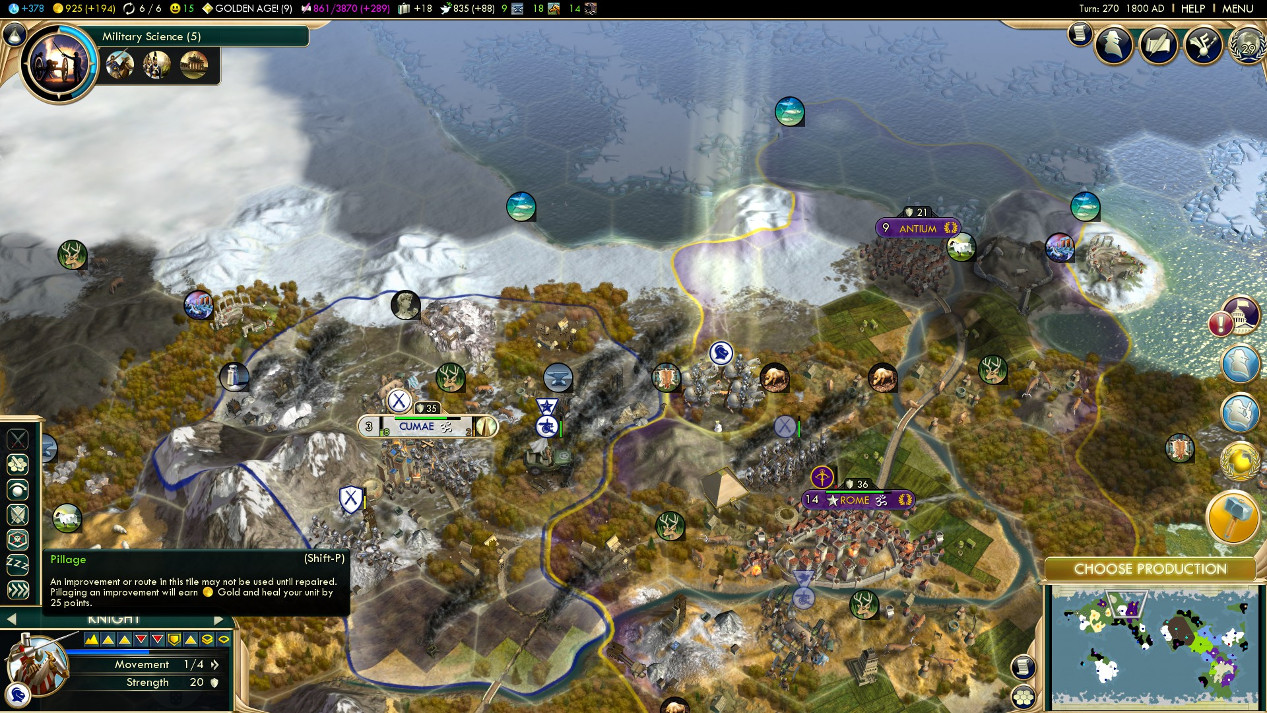 The Knights deal more infrastructure damage to the Romans in the hopes of slowing their military's advance. 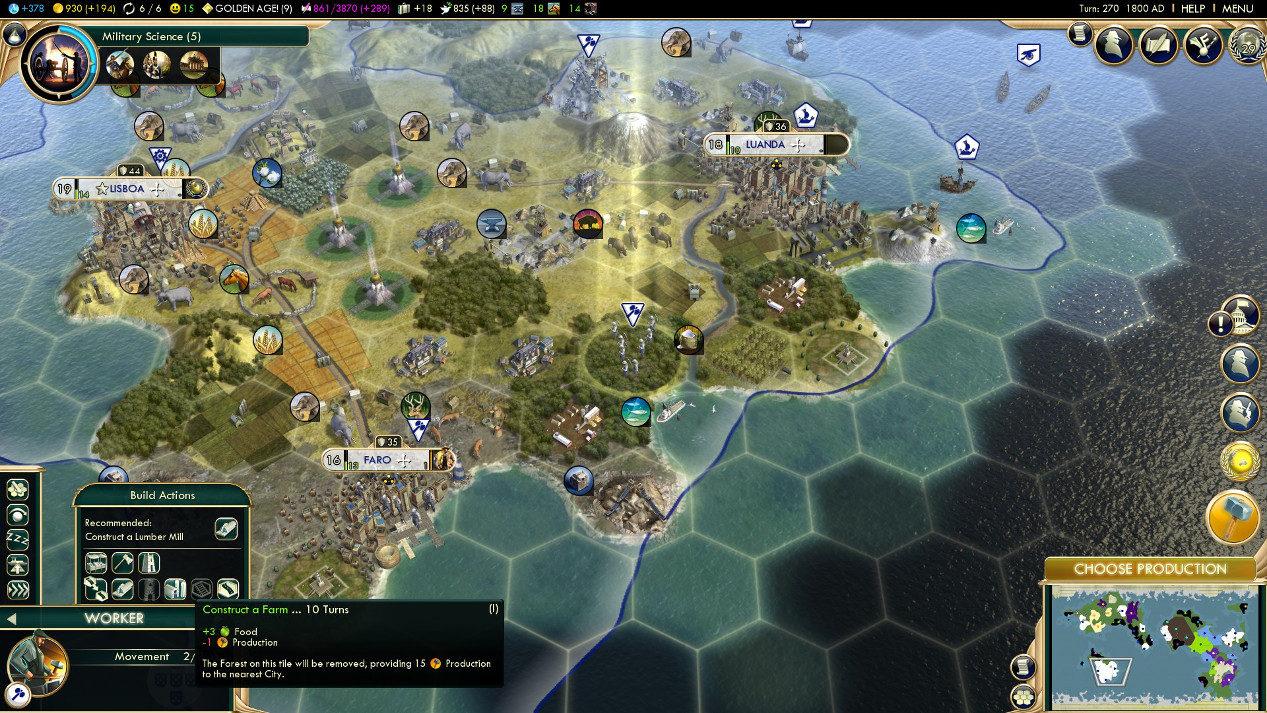 Back home, the infrastructure only becomes more intense. 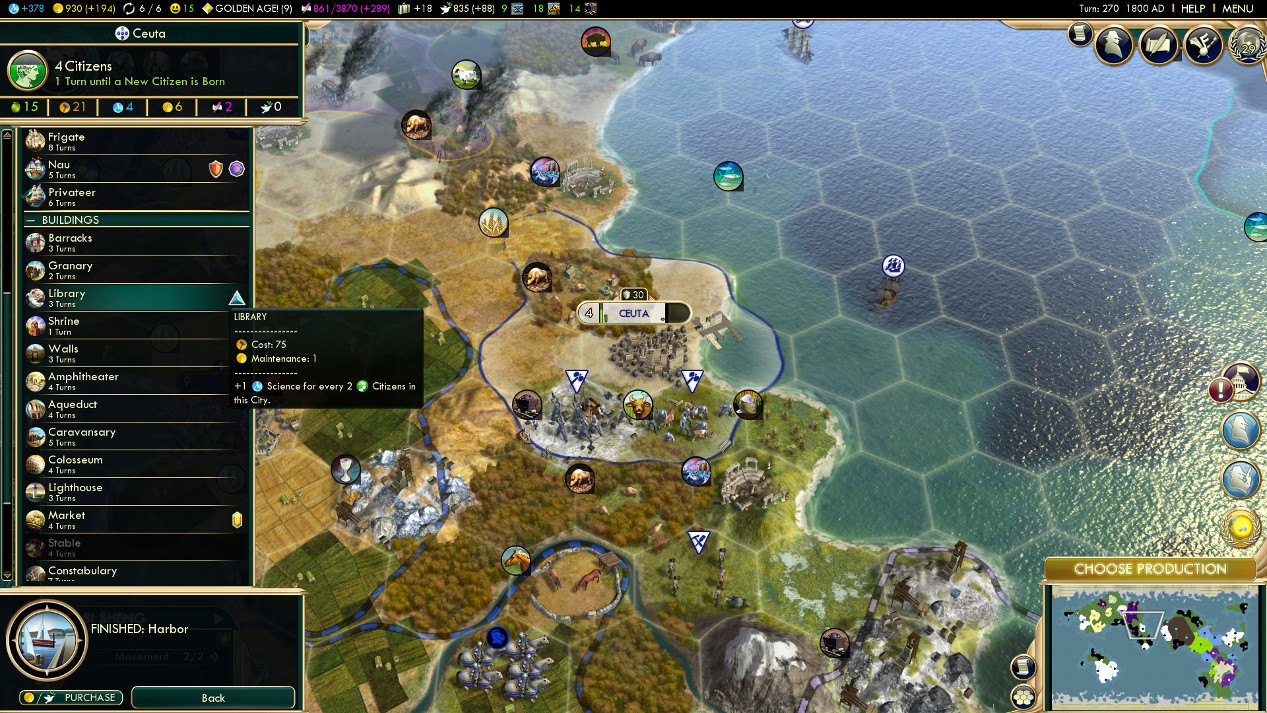 Ceuta continues to enjoy similar expedient advancements. 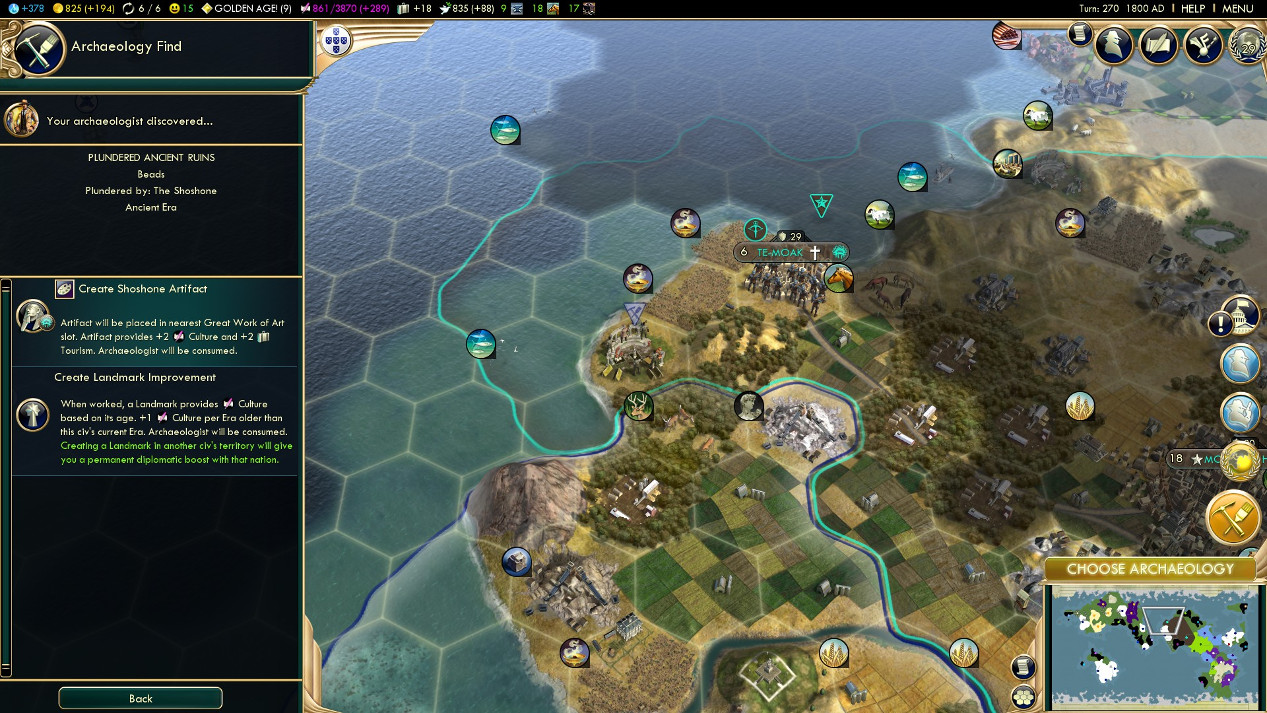 The Shoshone, however, will enjoy very little. 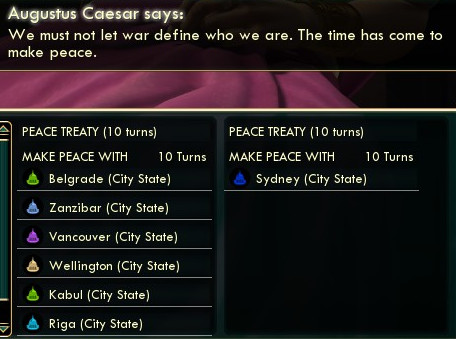 Nor will Romans, for that matter.  Pocatello, despite his ignorance of the historical value of what he has lost, sees fit to demand desistance from the Portuguese, but is rebuked. 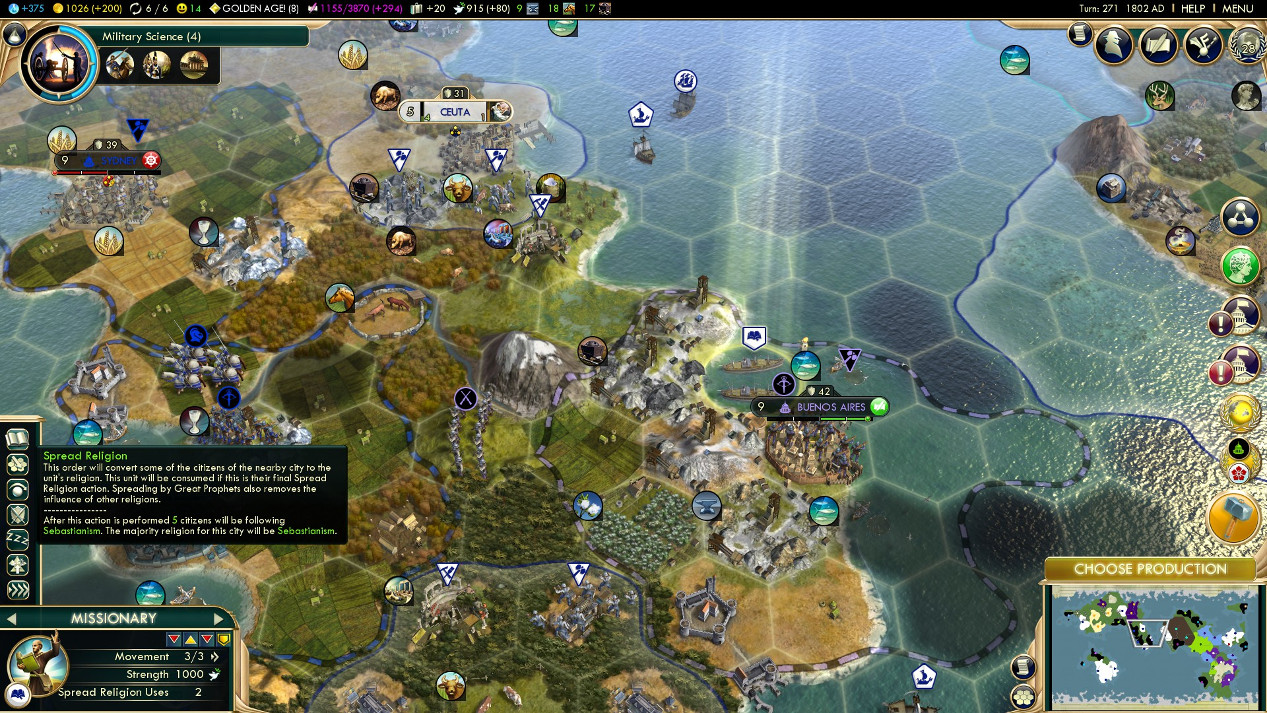 Argentina offers the new missionaries a chance to cut their teeth.  The Shoshone, meanwhile, have apparently demanded tributes from Byblos, despite earlier claiming to by the protectors of the City-State. 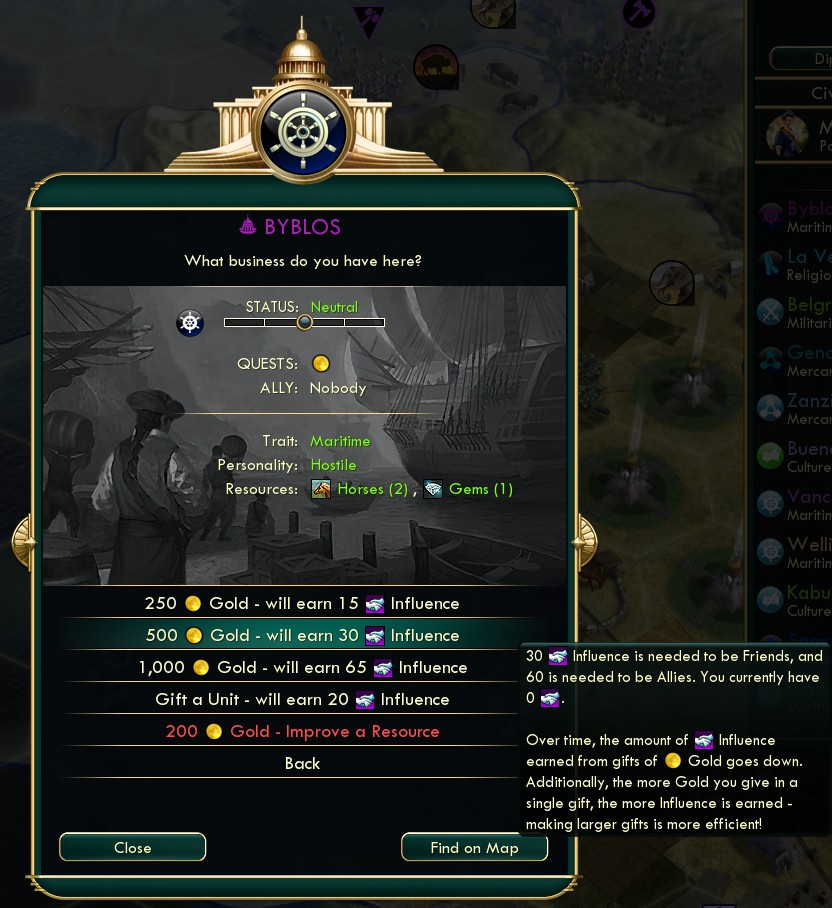 President Bragança thus sees fit to both provide protection and hopefully recompense for past misdeeds. 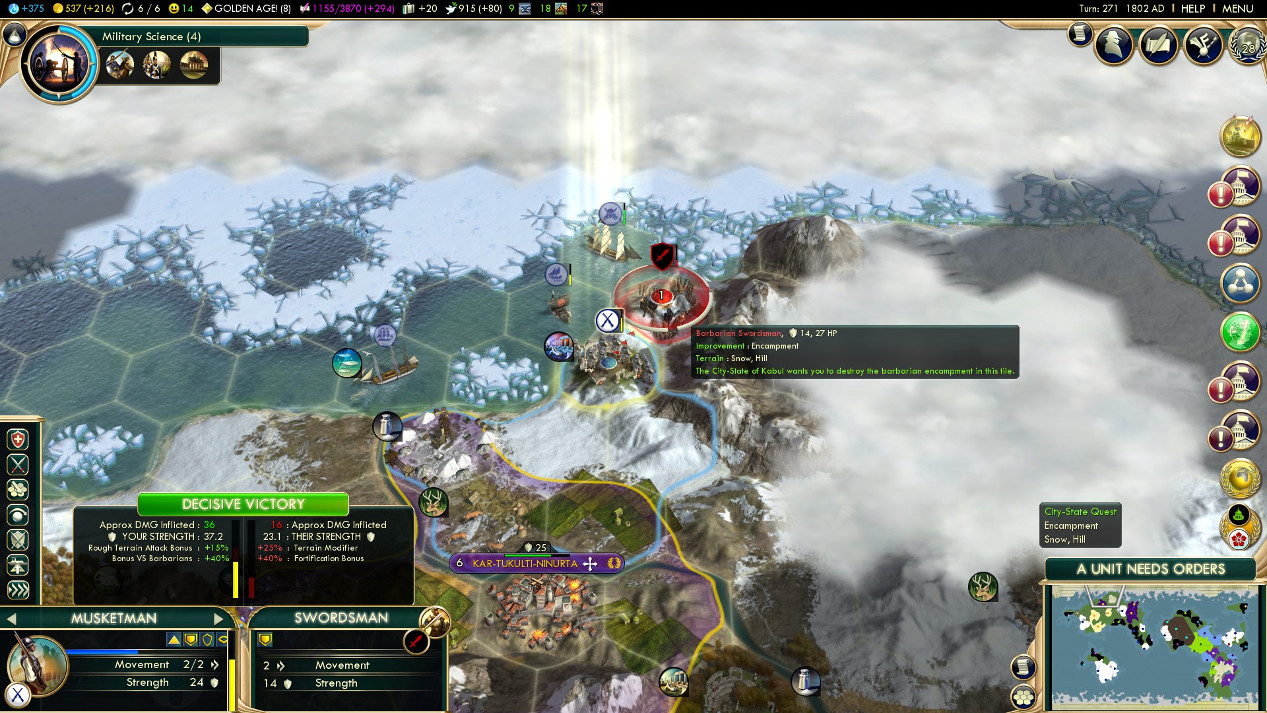 Conflicts in the North begin turning in favour of the Portuguese, thanks to the arrival of the Nossa Senhora. 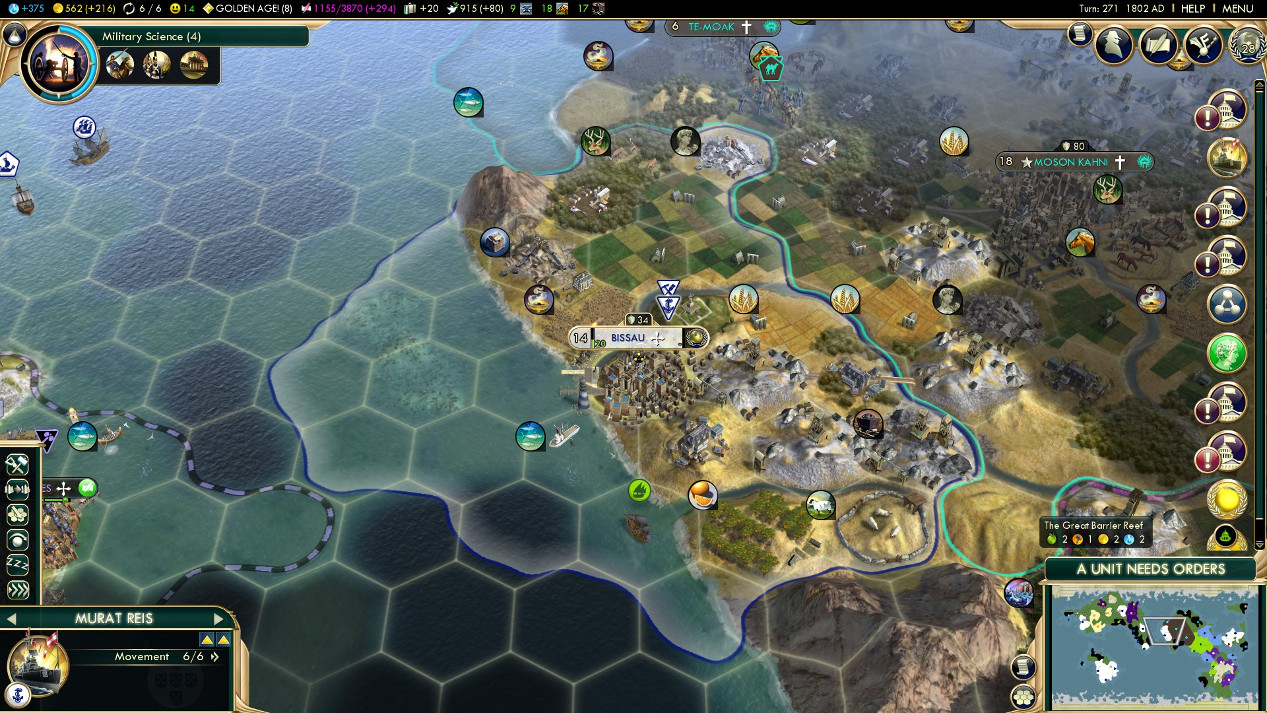 The exploits of the Portuguese naval arm even entice further men of talent to immigrate to Portugal from even former Shoshone territories. Mr. Reis' name is auspicious, but one that draws some curiosity in a land that has renounced monarchy. 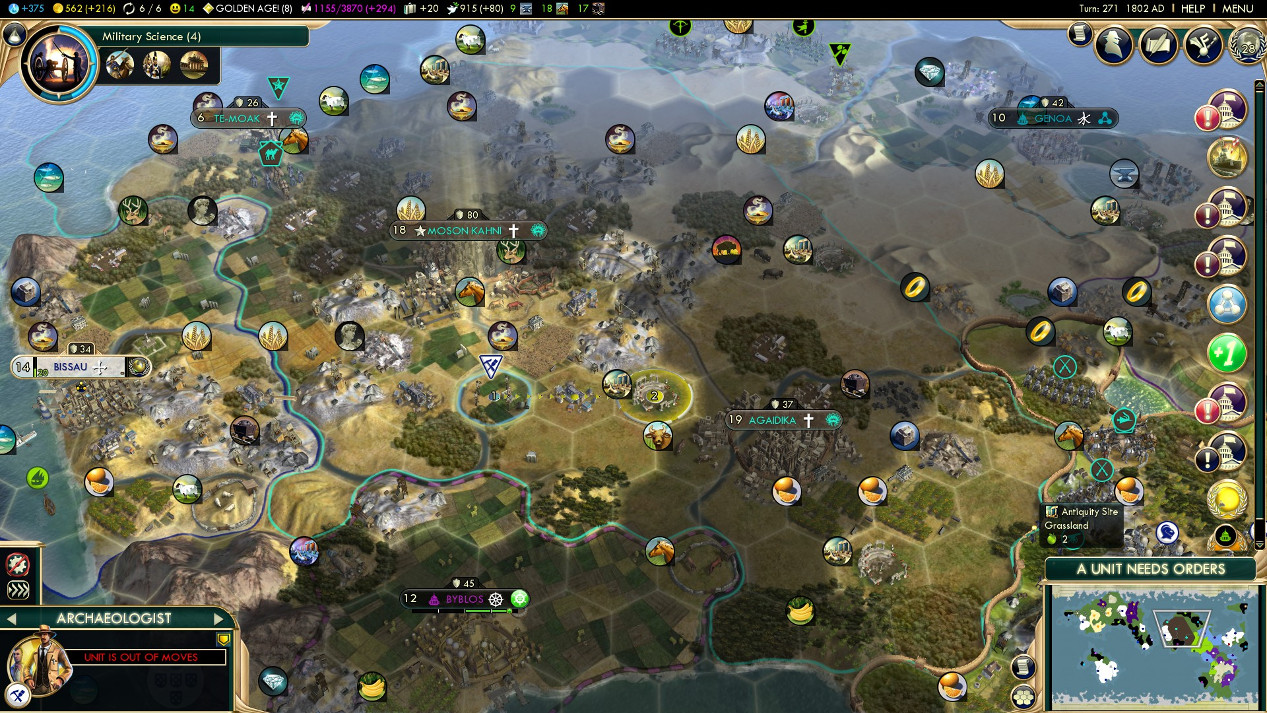 The pursuit of history once again trumps the pursuit of diplomacy. 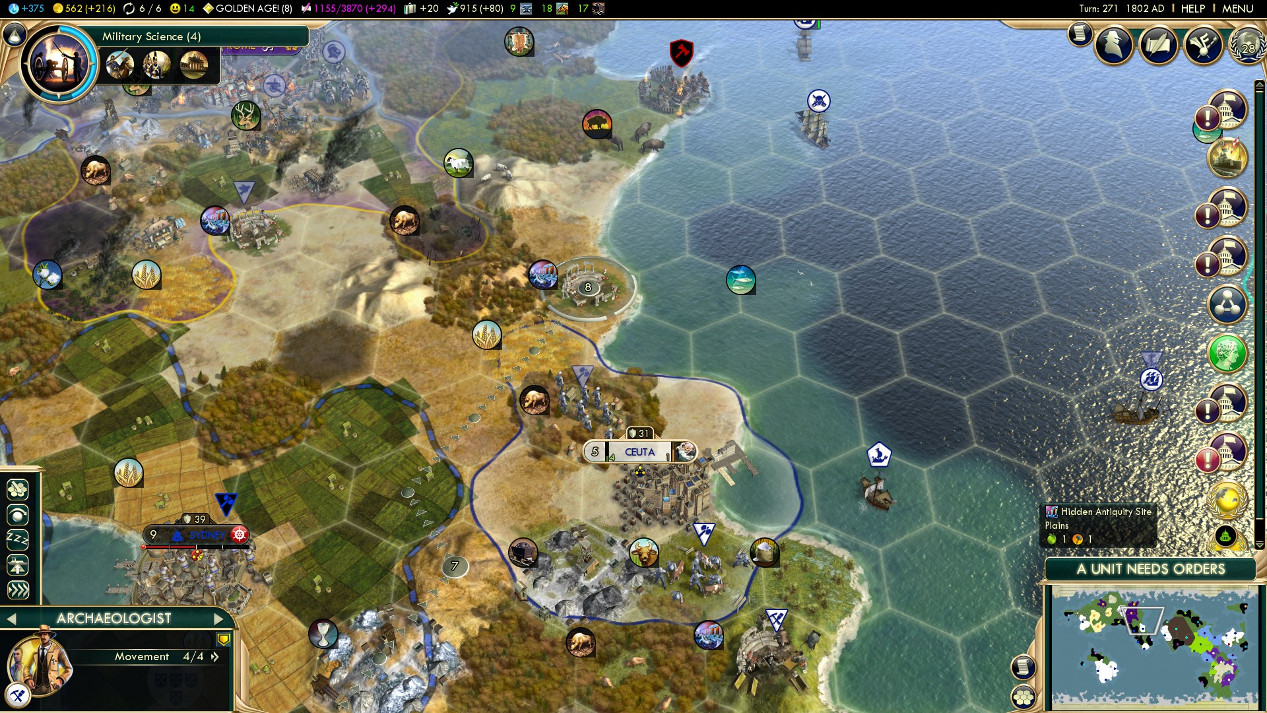 Even a purported military outpost can enjoy the recognition of historians.  In these trying times, another re-affirmation of friendship is always welcome.  Even if it cannot carry quite the same hopeful undertone as it did before. 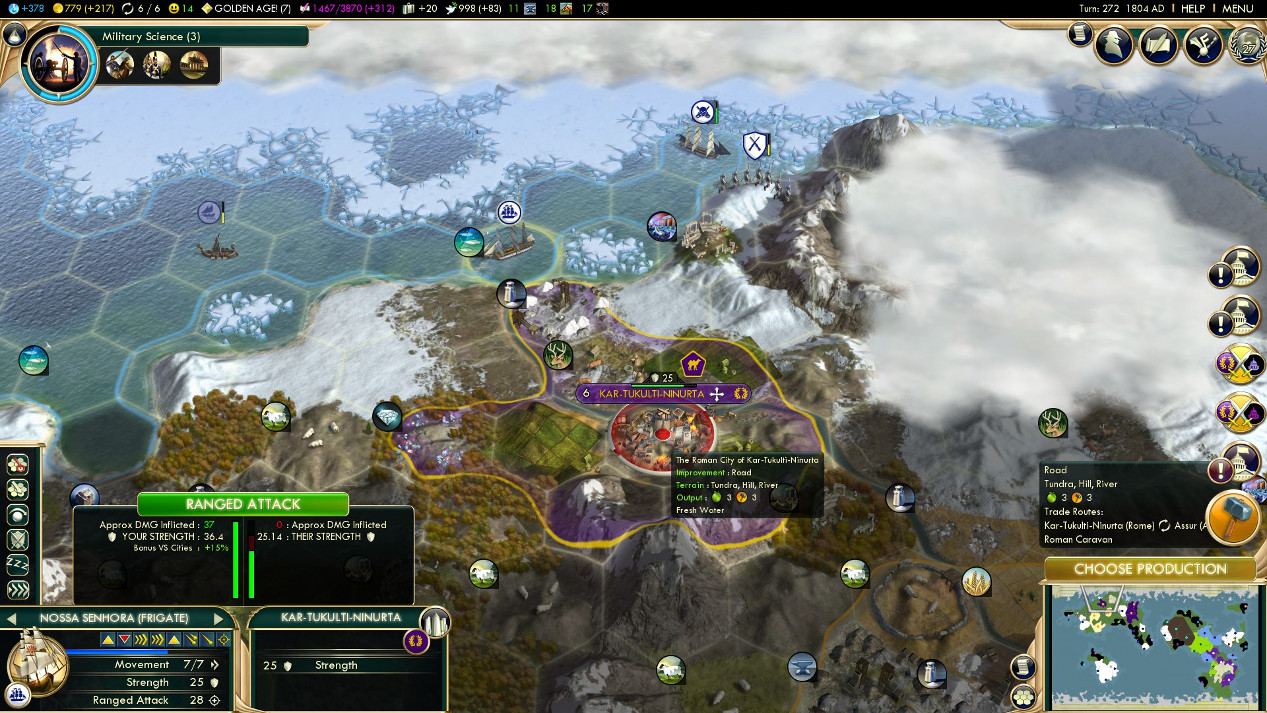 Nossa Senhora has developed an understanding of proper rangefinding, and is able to effectively bombard Kar-Tukulti-Ninurta from outside the city's own effective range.  This success is followed closely by the near-completion of the encirclement of the Roman capital. 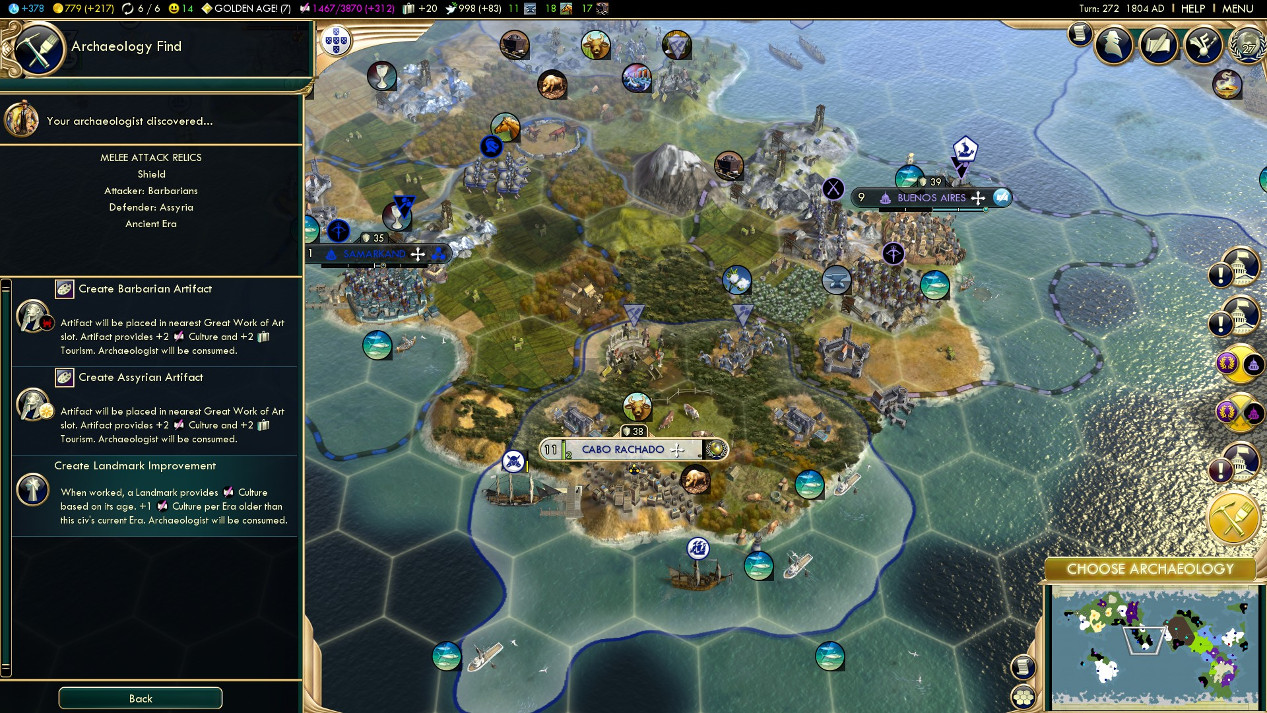 Citizens in Cabo Rachado are surprised to learn about the history of the land that predated their arrival.  Byzantium, meanwhile, becomes increasingly difficult to negotiate with. 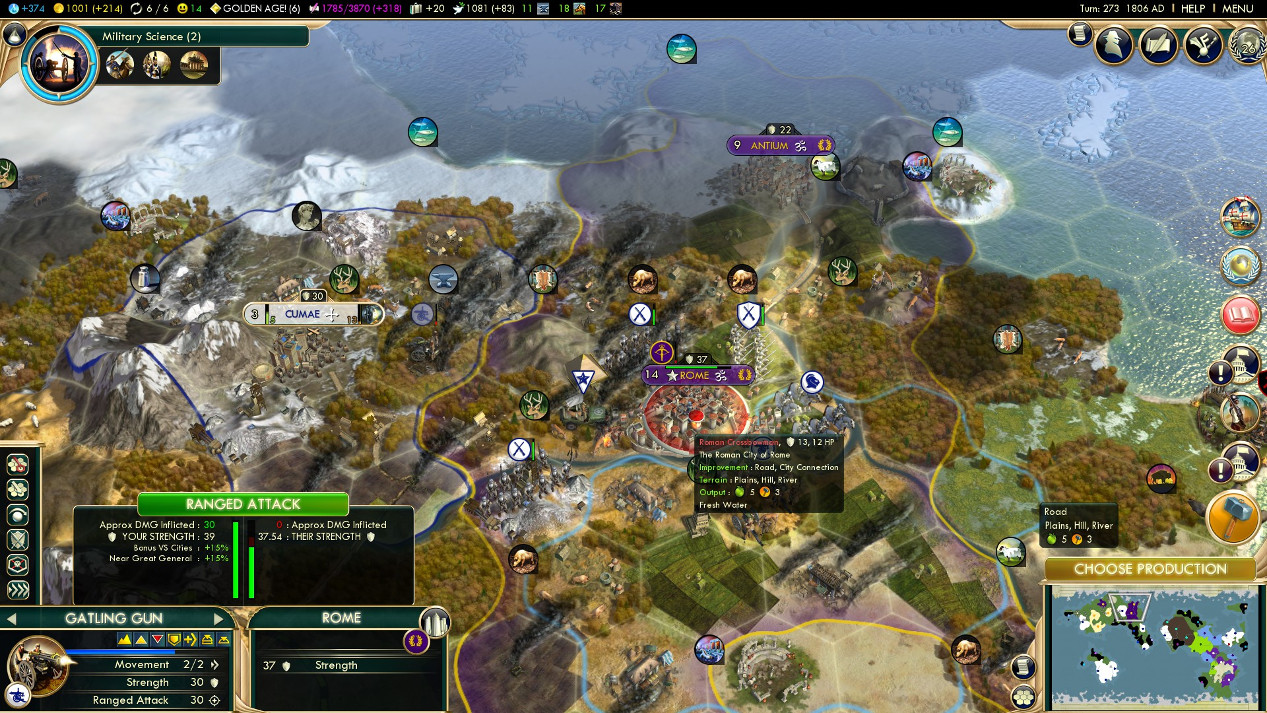 Roman defences are slow to fall, but fall they must. 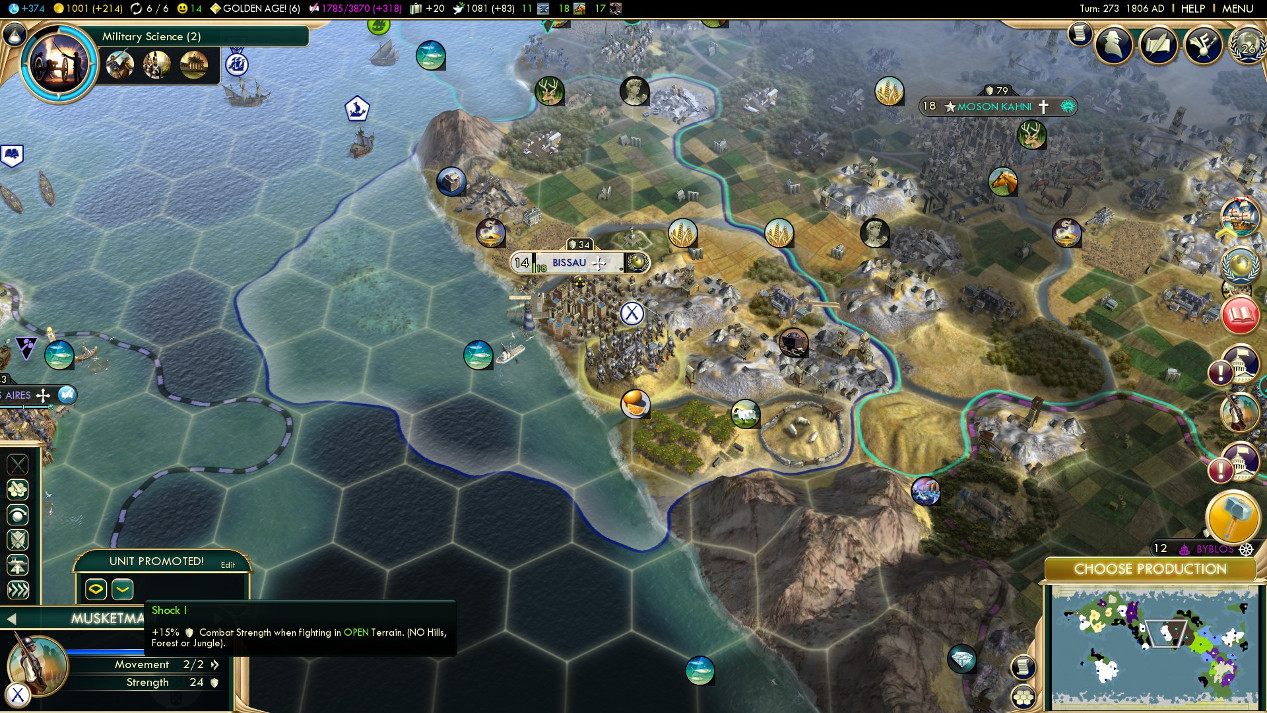 These efforts are supported by friends abroad, who form volunteer forces to better assist the Portuguese.  Their efforts, however, are better spent elsewhere.  Once again, surplus Nau find a new lease on life as vessels of diplomacy. 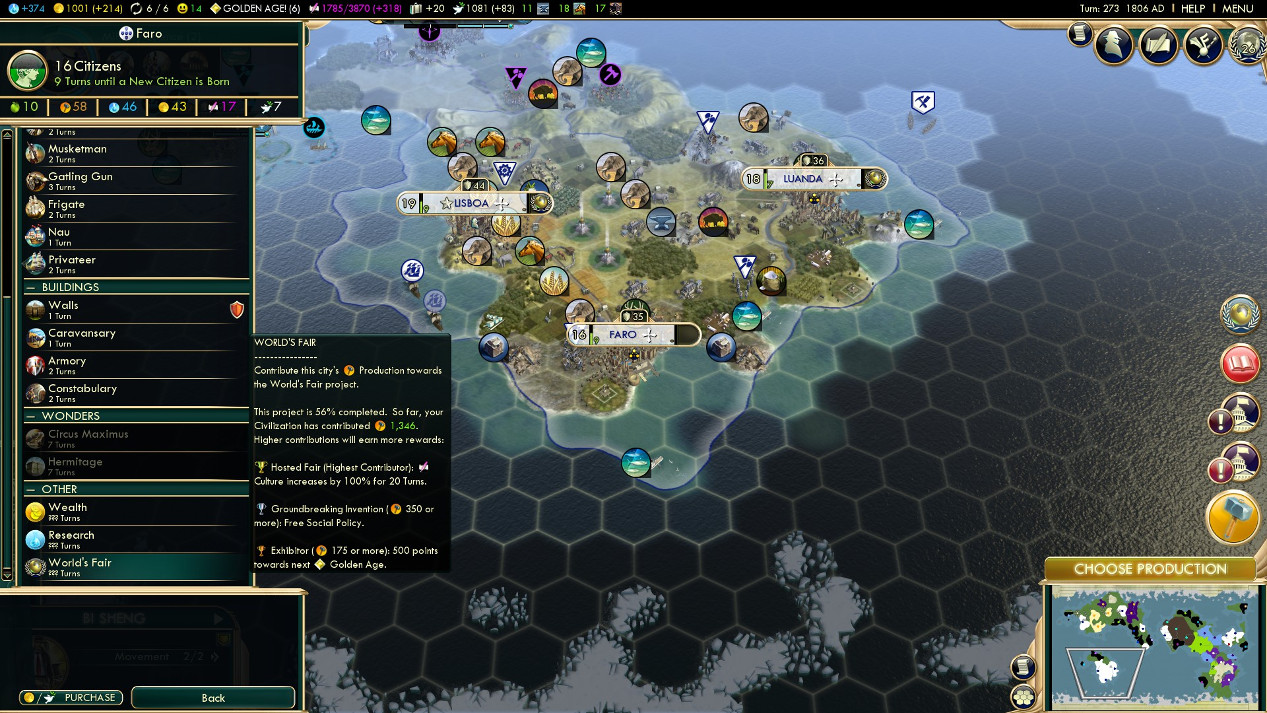 The anticipation of a grand World's Fair electrifies the Portuguese mainland. 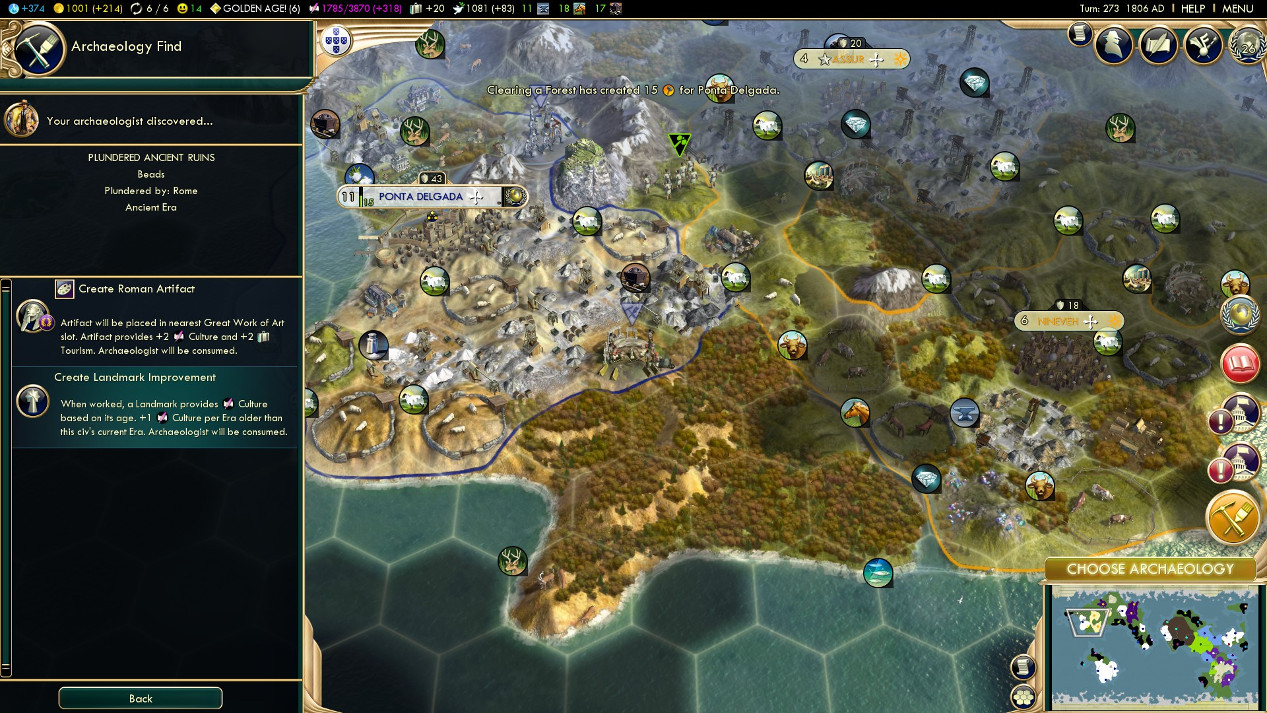 Every city seeks to look their best. 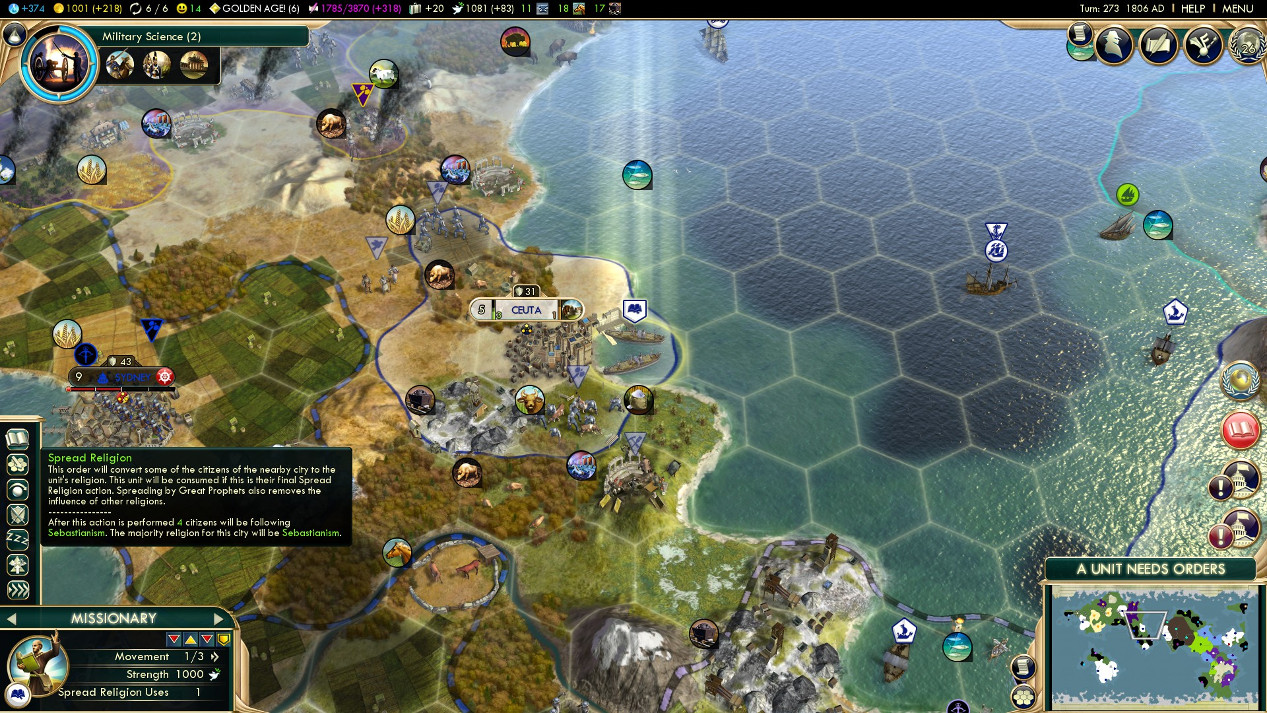 Sebastianism flourishes in Ceuta, bringing with it a renewed focus on learning and the growth of the mind and coffer. 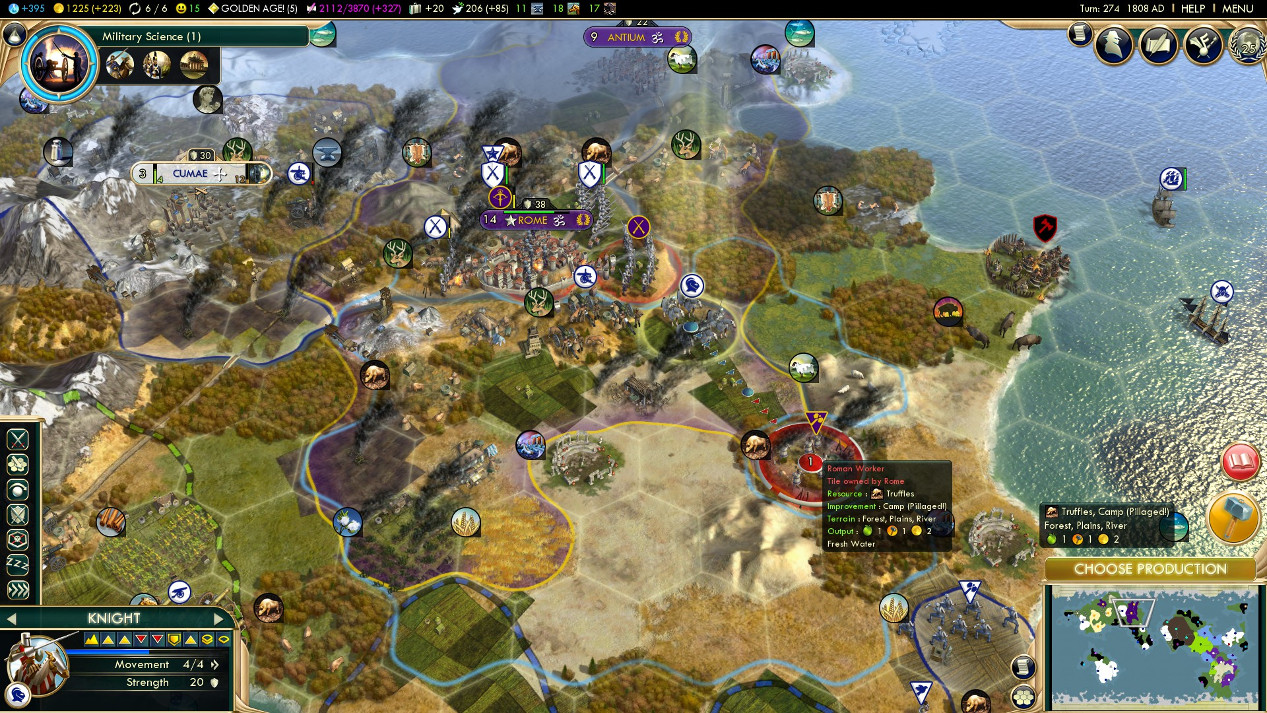 Really, the Knights are doing well by their Roman captives, offering them new lives in Portugal. 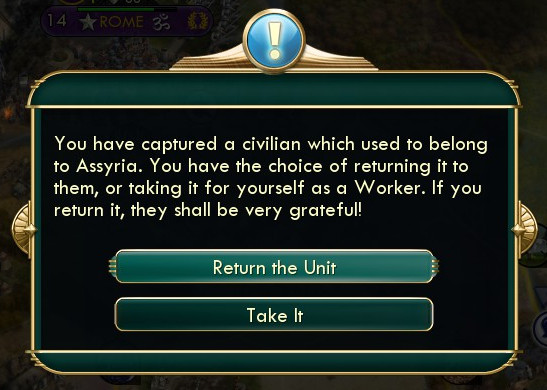 These, however, are only too happy to return home instead.  Diplomacy carries with it some pride in a job well done. 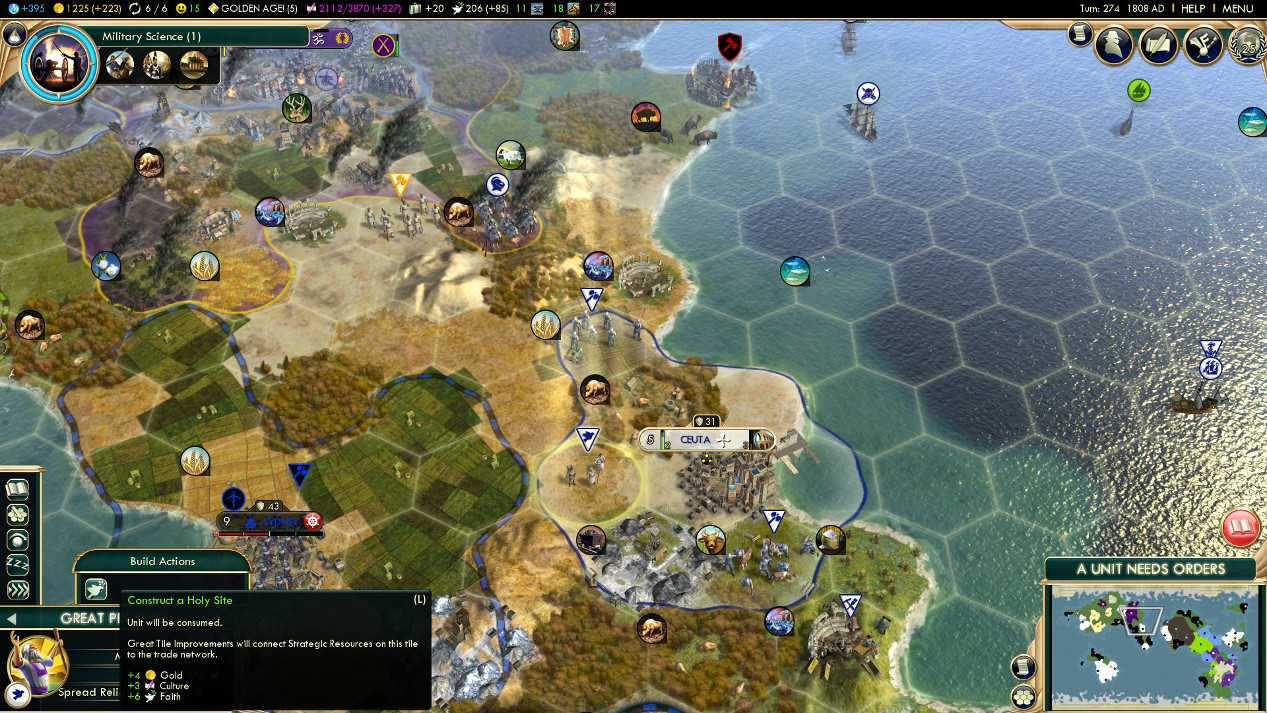 These efforts, and Almeida's impassioned entreaties, convince the Hindu holy man to complete his pilgrimage in Ceuta rather than Roman territory. The land he consecrates brings the city significant international prestige. 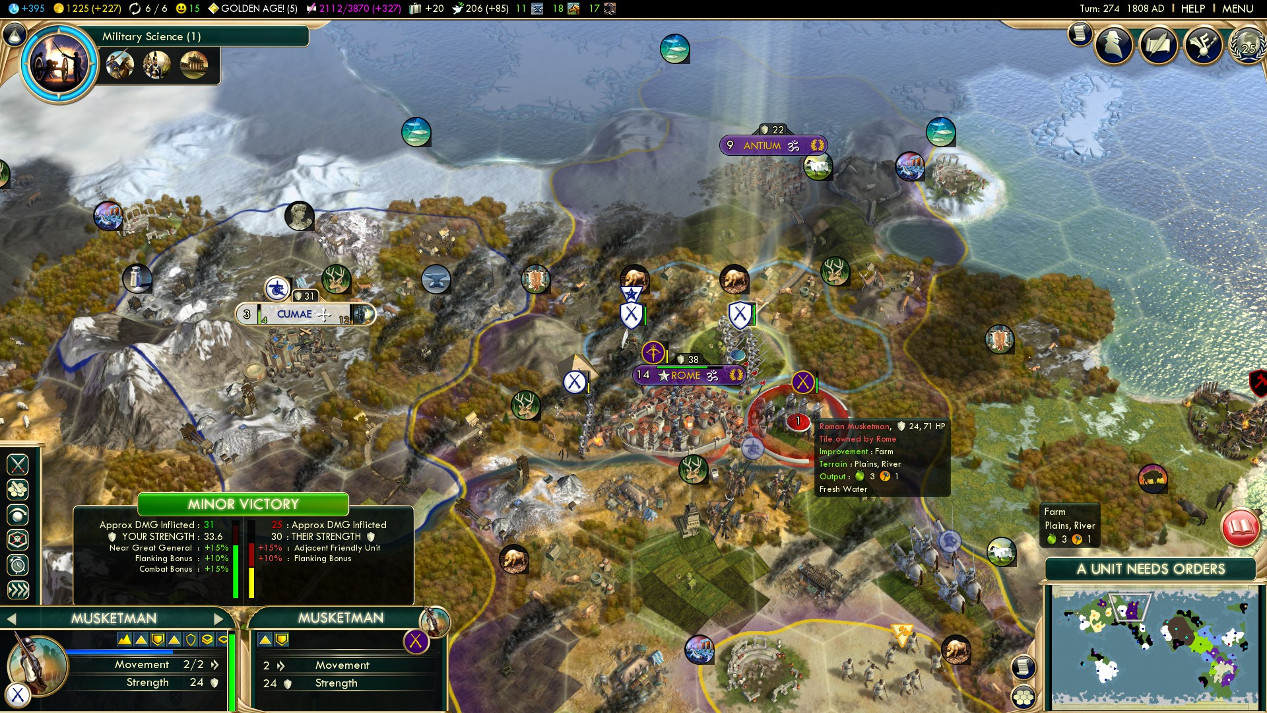 However, the encirclement of the Roman army is weakening. 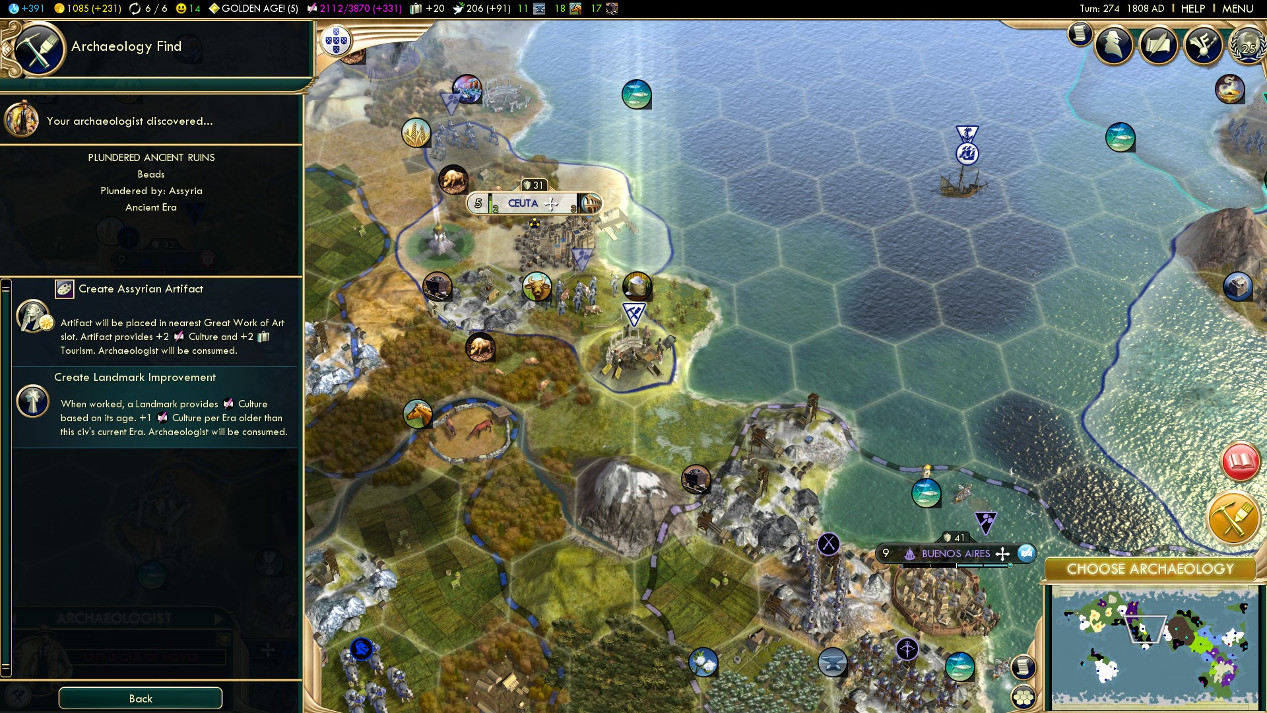 Ceuta, once envisioned as a land of soldiers and sailors, is now a land of priests and historians.  Yet, there is still a sense of unease in times of war, albeit one more for the enemies of Portugal than its allies. Alternatively, Dandolo's countenance suggests that ignorance truly is bliss.  The Portuguese cannot afford ignorance. 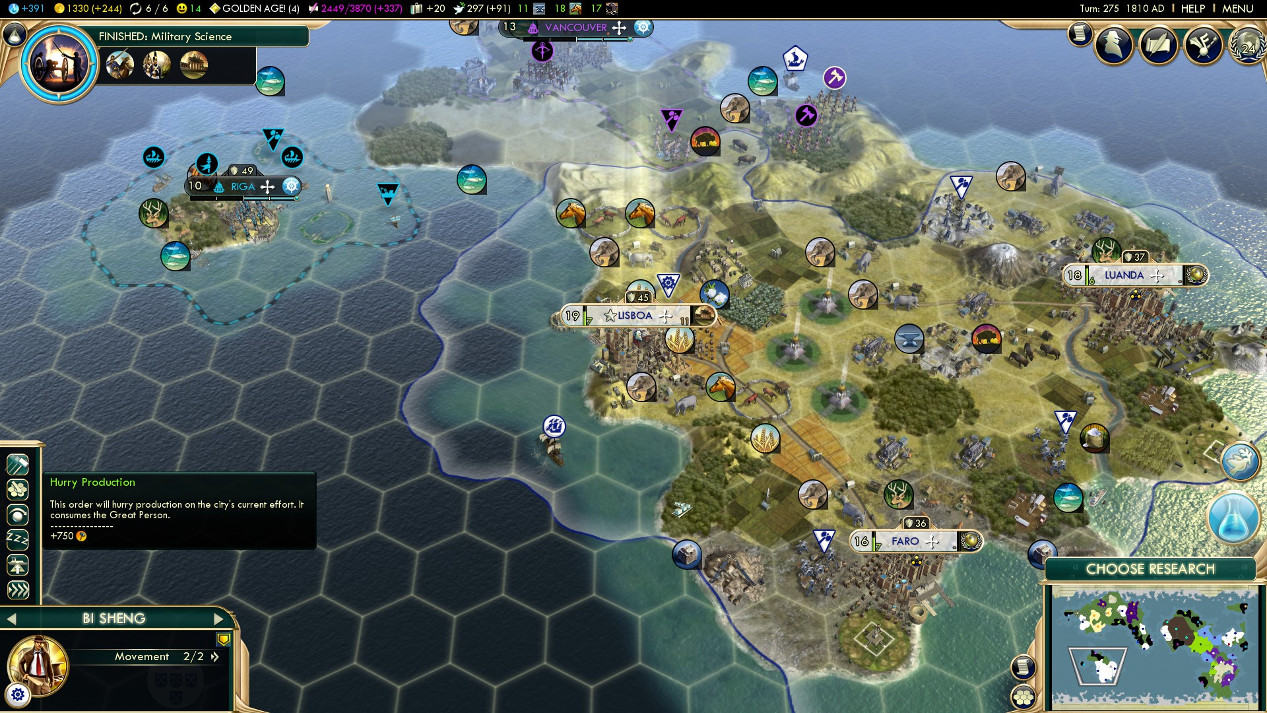 The Universidade completes its wing dedicated to military studies, and a famous architect begins development of a new campus.  The military arm of Portugal has much to be proud of as well. 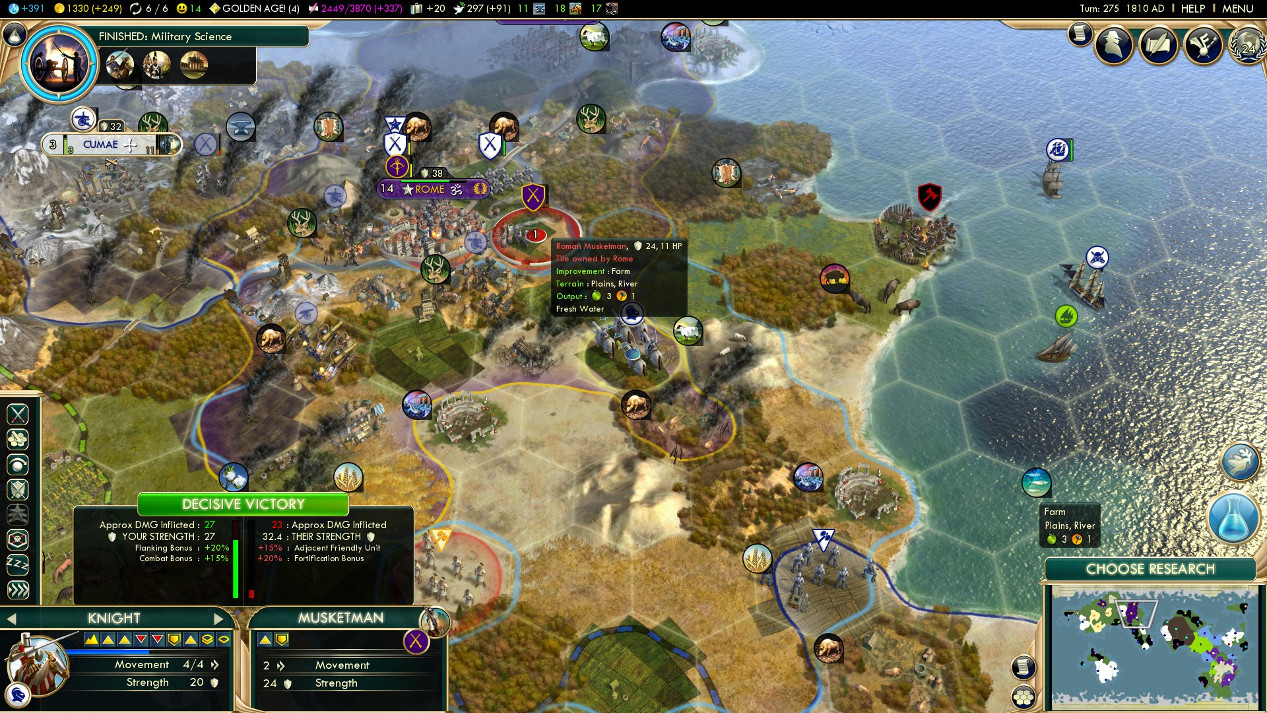 The bravery of its Knights make the political aims of the Portuguese possible.  The ingenuity of its scholars ensures Portuguese dominance. 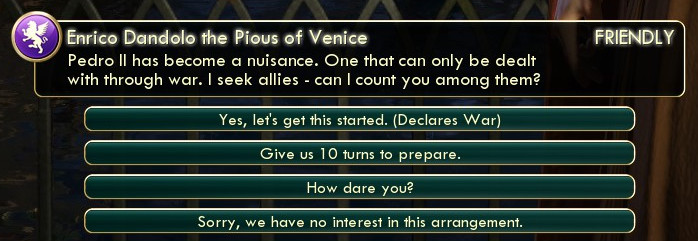 The urge to use it in the face of such threats is overwhelming, but the Portuguese must also temper themselves with patience. 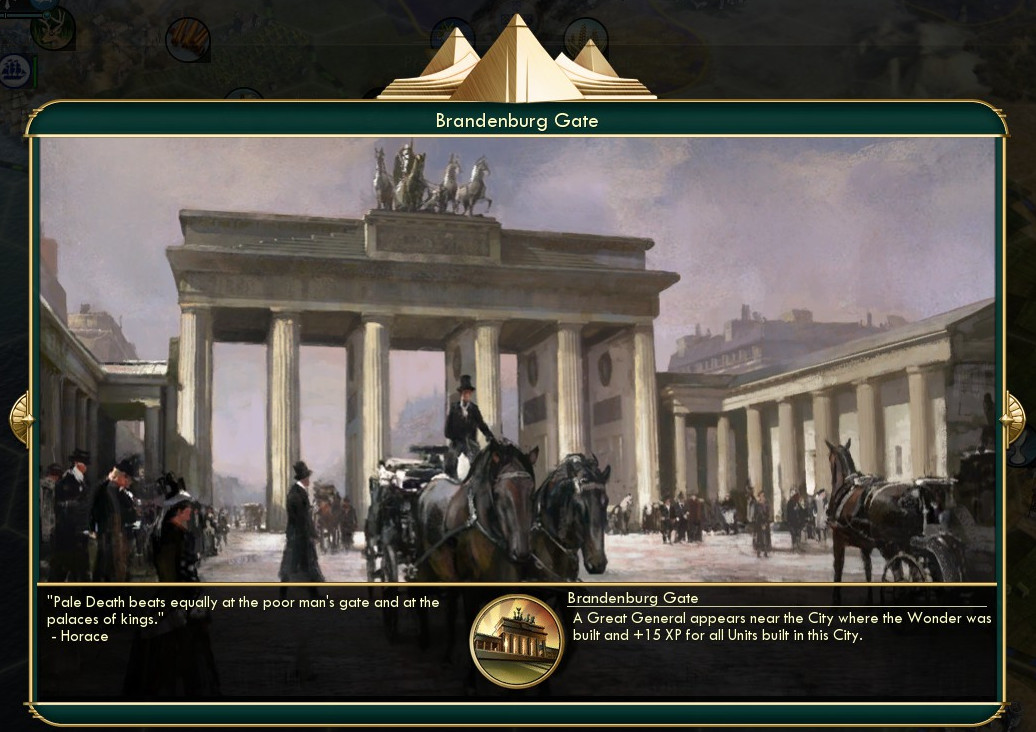 The construction of the new military base at Lisboa marks the beginning of a new age of potential for conquest or peace. 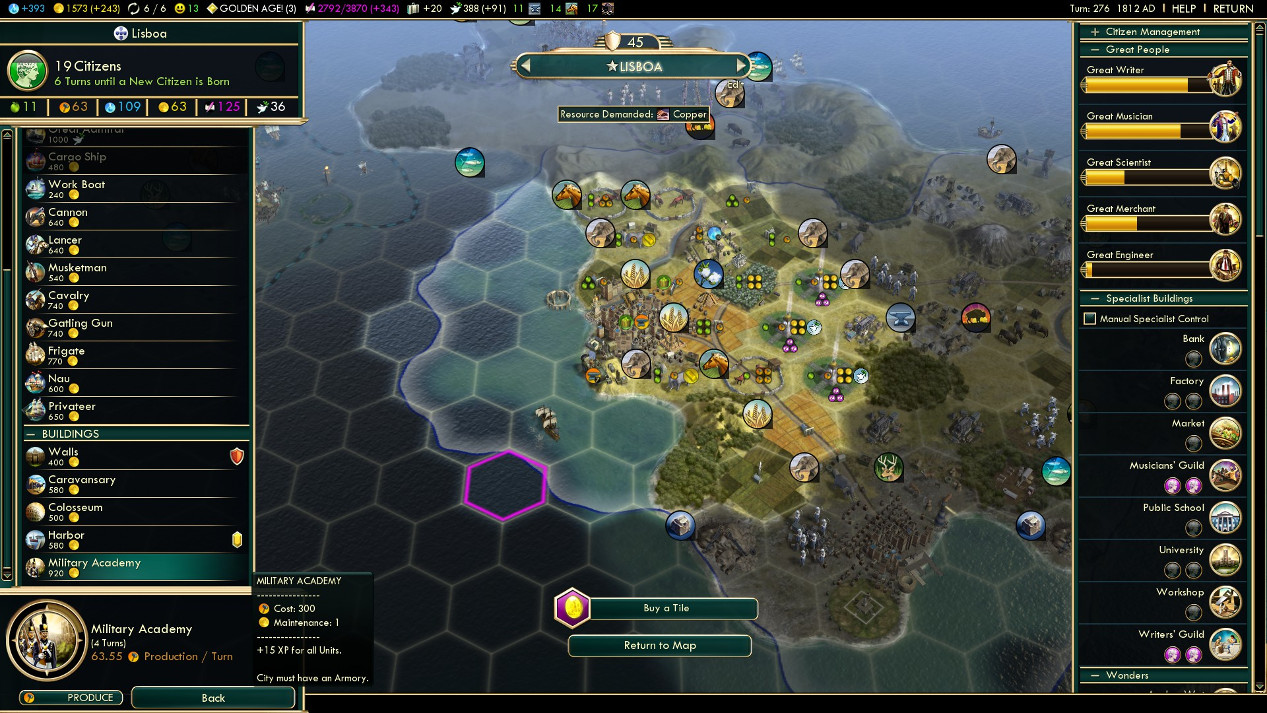 Significant funding is funneled from the Treasury into the military research wing, and new training programs for future defenders of Portuguese Freedom seek to improve the military at every step. 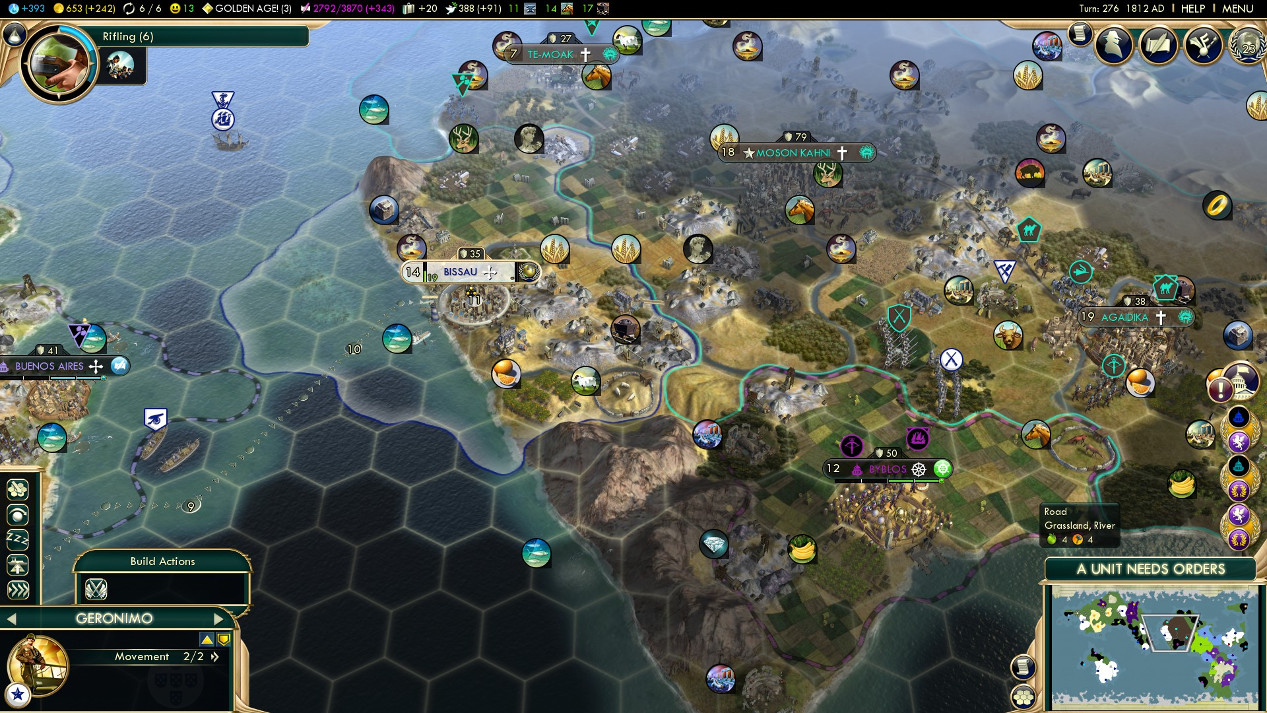 Former enemies of the Shoshone emerge into the fore, in the hopes of securing victory against their foes in the future. 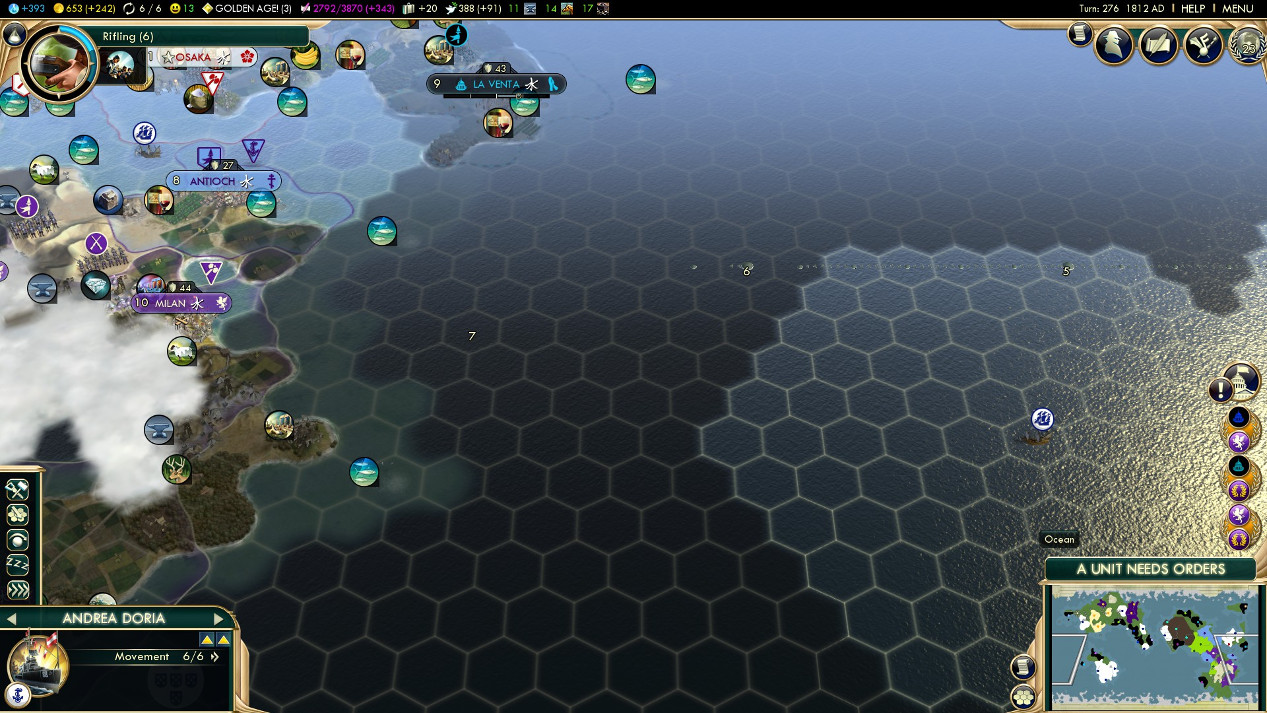 Anticipating the possibility of another conflict at sea, the Genoese mercenary also dispatches quickly to Venetian seas.  It has been suggested that these Portuguese interventions in the defensive interests of other nations are mere excuses to become embroiled in wars to their own advantage. Though the Portuguese advantage is apparent, the will of the people prevails in these decisions. 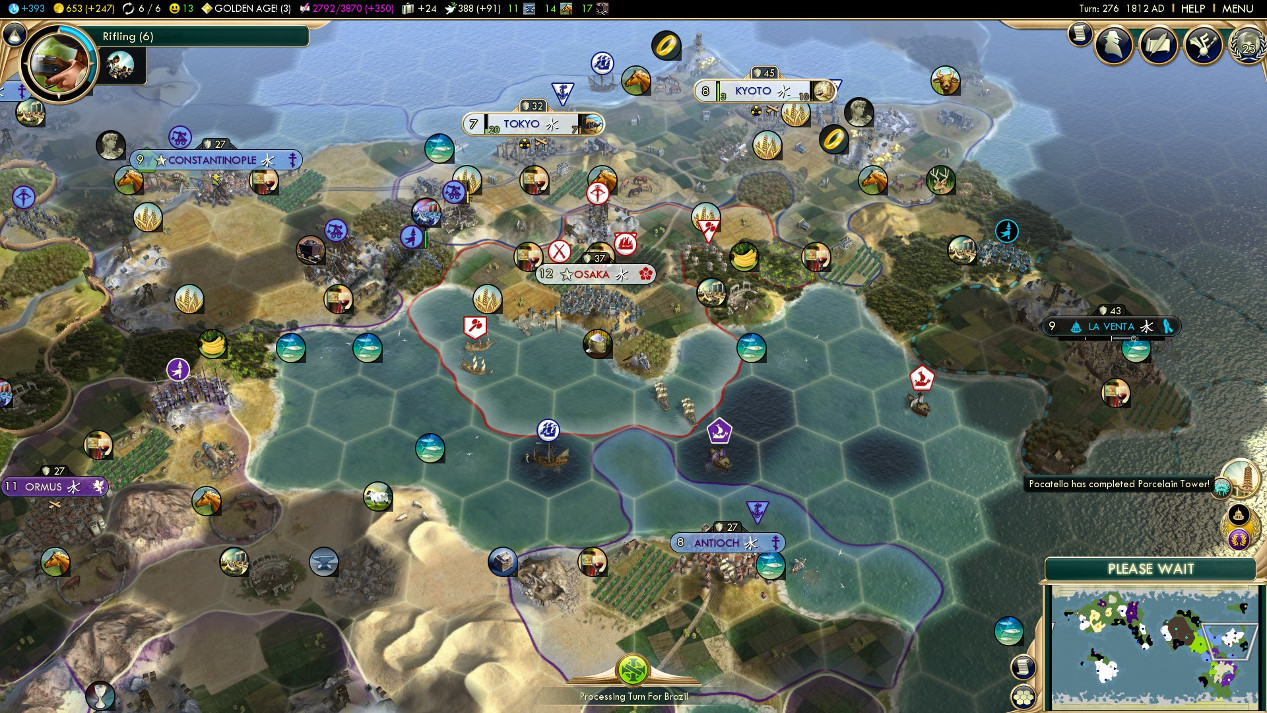 Byzantine-Japanese conflict continues, while the Shoshone discover a passion for learning in other ways. 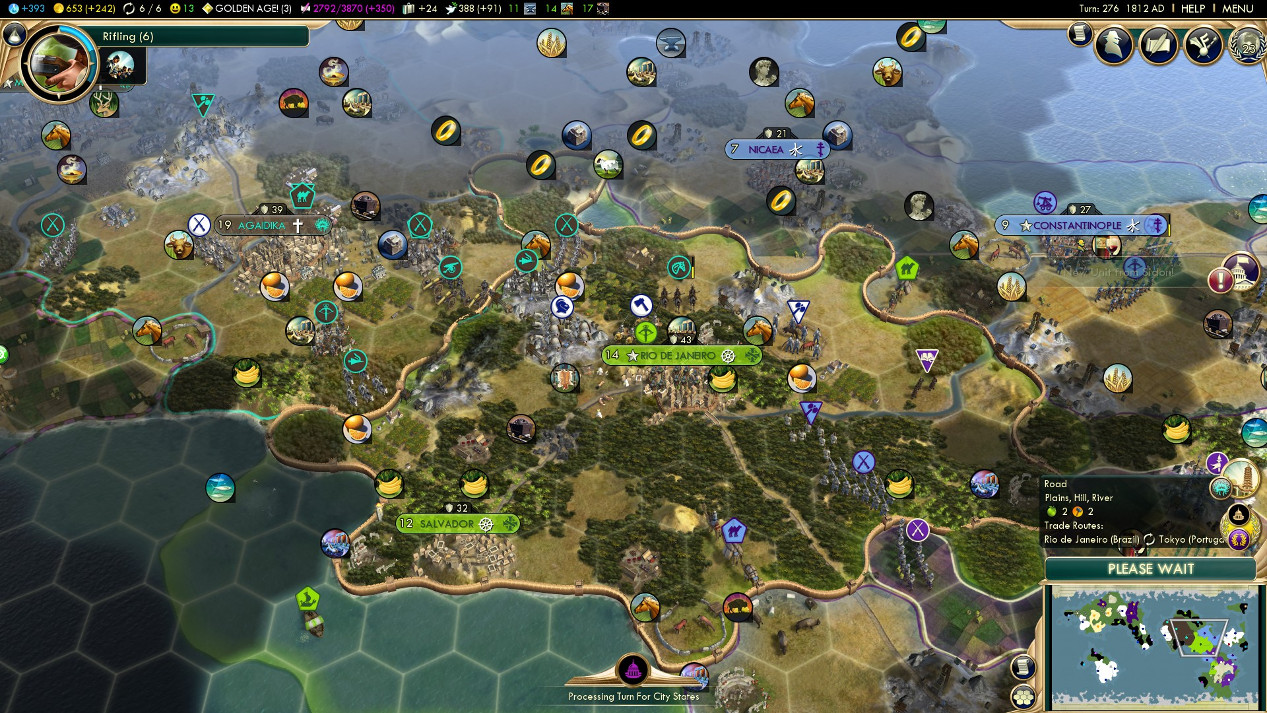 When the time comes for them to march on Brazil, however, the Shoshone find themselves stymied by Portuguese soldiers holding the line. 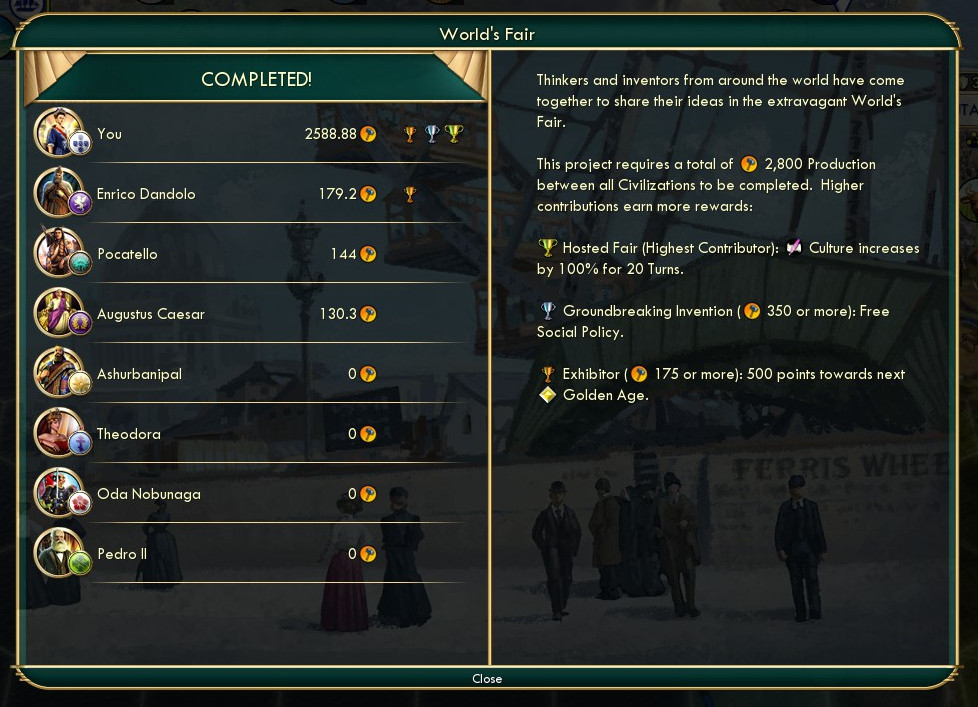 To her astonishment, the President learns that the vast majority of people attending the World's Fair are Portuguese to begin with, and several nations failed to send any sort of representation whatsoever. This only led credence to the popular notion that the Portuguese had truly spread themselves across the world, but caused some disappointment to the President, who only had Dandolo for company at the events she was planning to display for the other world leaders. 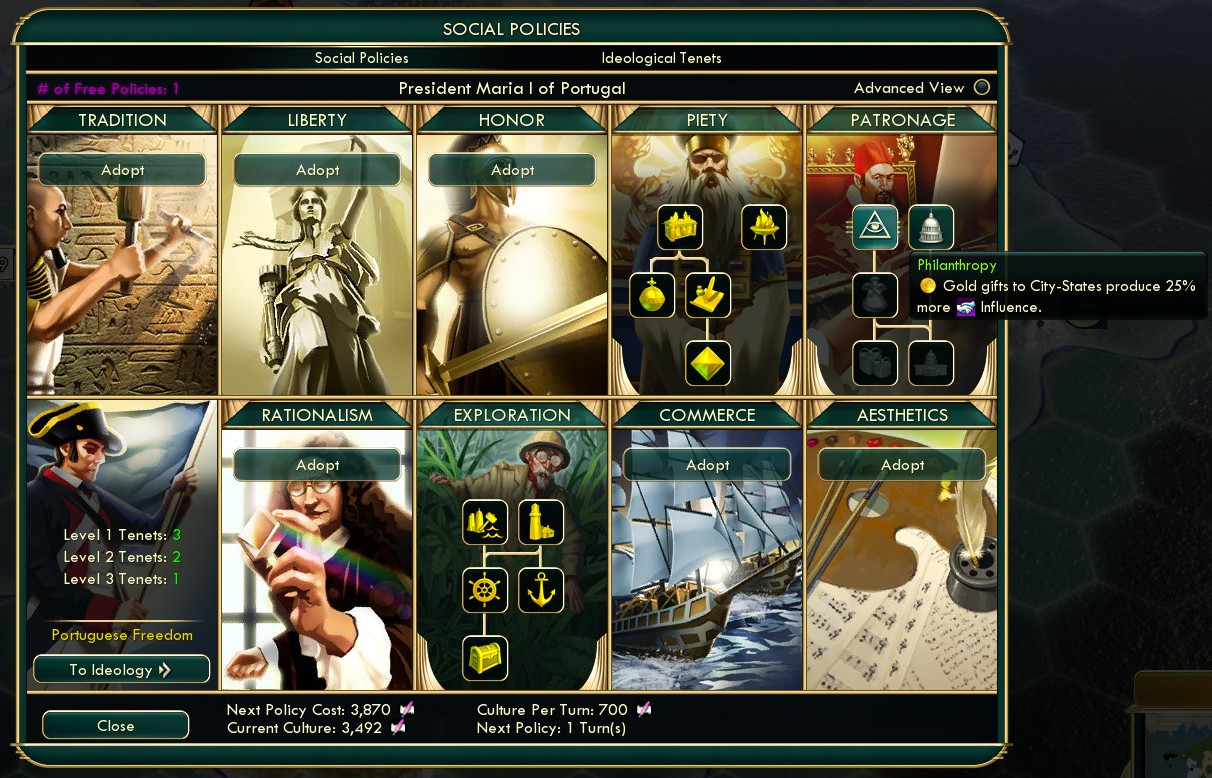 Still, the event carried with it substantial prestige, which she continued to leverage into mastery of diplomacy.  The vessels of trade and warfare the Portuguese once called their own are now called to a different purpose. It is said that their cargo is what holds the world together. 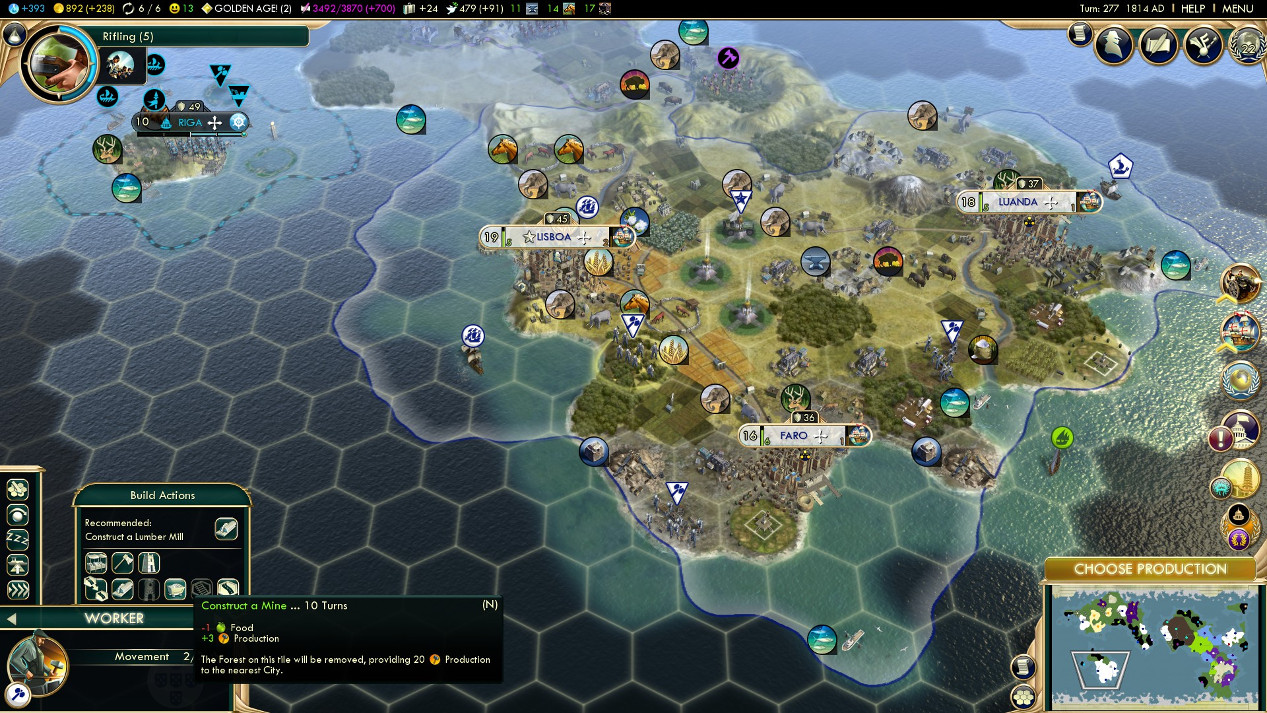 A strange sentiment, considering the enthusiasm with which the Portuguese strip the world asunder in pursuit of reward.  At this point, they have seen enough outdated and outmoded ships to consider adding yet another one to their navy. 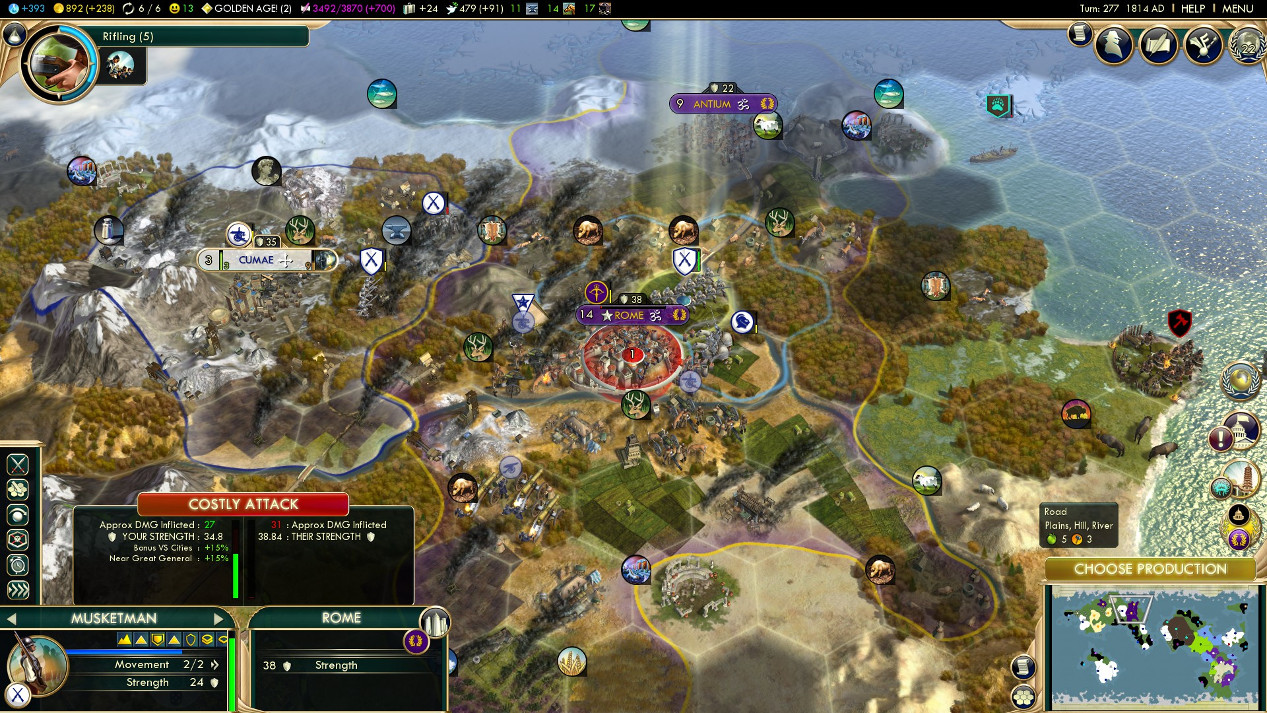 The time has finally come to bring the chapter to a close.  The Roman comes face to face with the triumvirate of Salazar, Almeida, and the President. 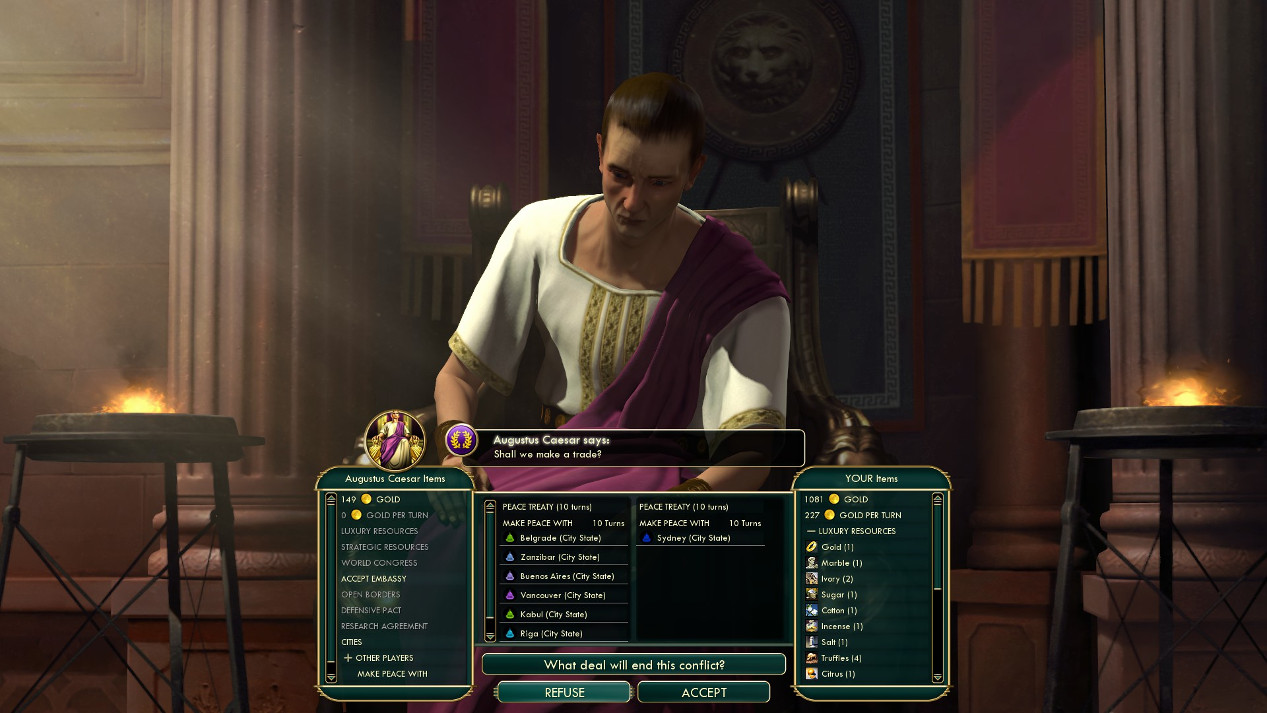 His offer still does not include the last Assyrian city that he has seized.  "Look around you, Senhor. You think that you are in a position to negotiate over one city? We practically rule all others, and you have nary a leg to stand on." Salazar looms over the Roman Imperial throne. 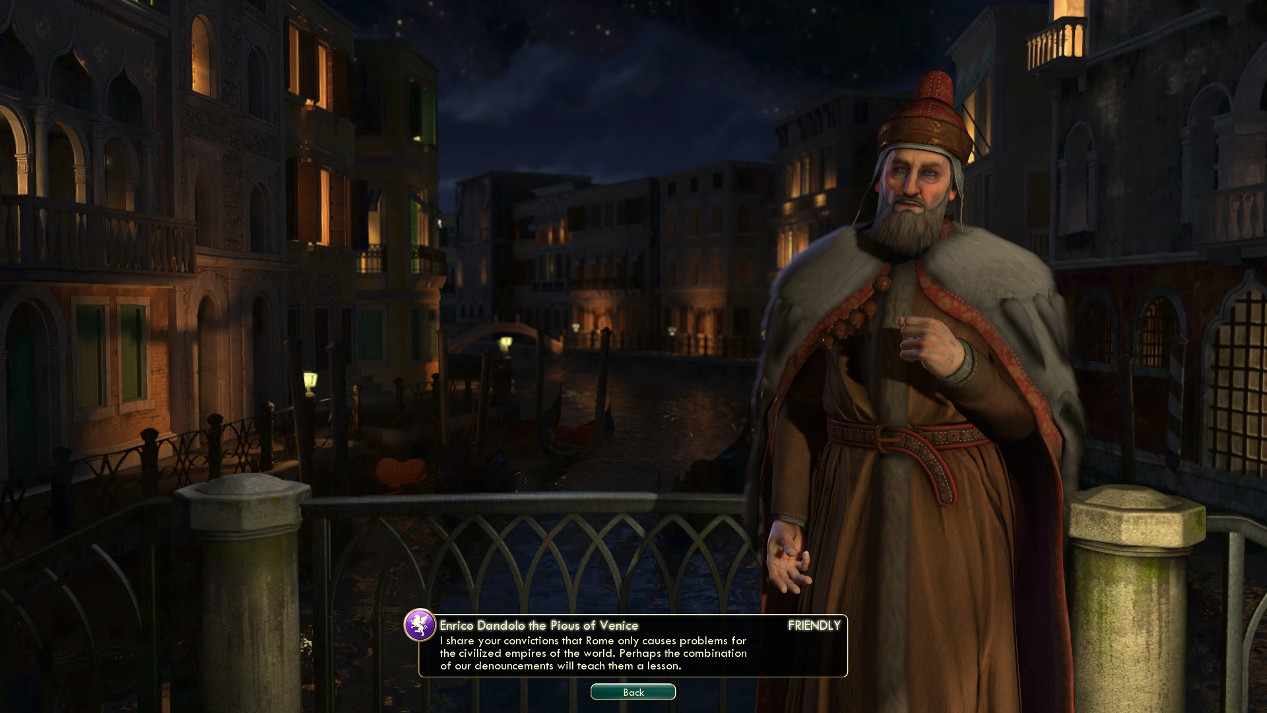 "Even the likes of Dandolo treat you as a hated enemy, and no one will mourn your passing should we decide to end your ambitions here." 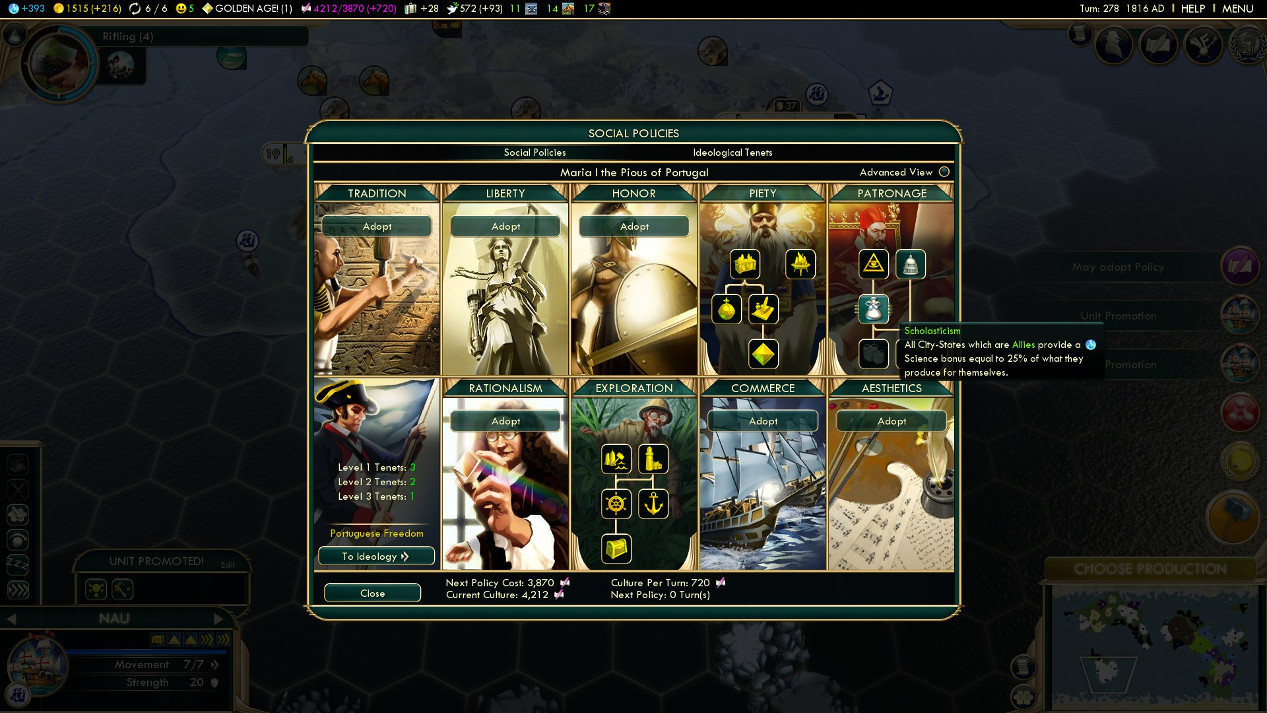 "You have failed to learn from your past mistakes, and Sebastião knows that this is a sin graver than all others."  "However, since you have decided to tarry, it again must fall to us to make your decision for you."  "This is a confirmation that the last Assyrian city has been returned to them. Your magistrate has offered his unconditional surrender.”  “This war is at an end, and you can look forward to ruling over your frozen hovel for what remains of your life.” 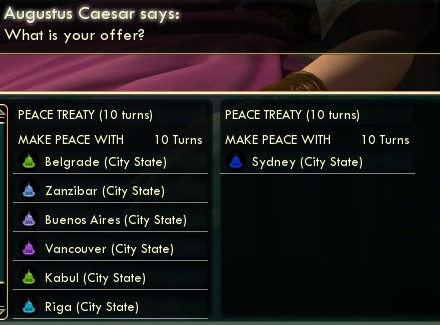 The Roman Emperor signs the papers that Almeida offers him, his hand heavy as his title becomes Governor of Antium. 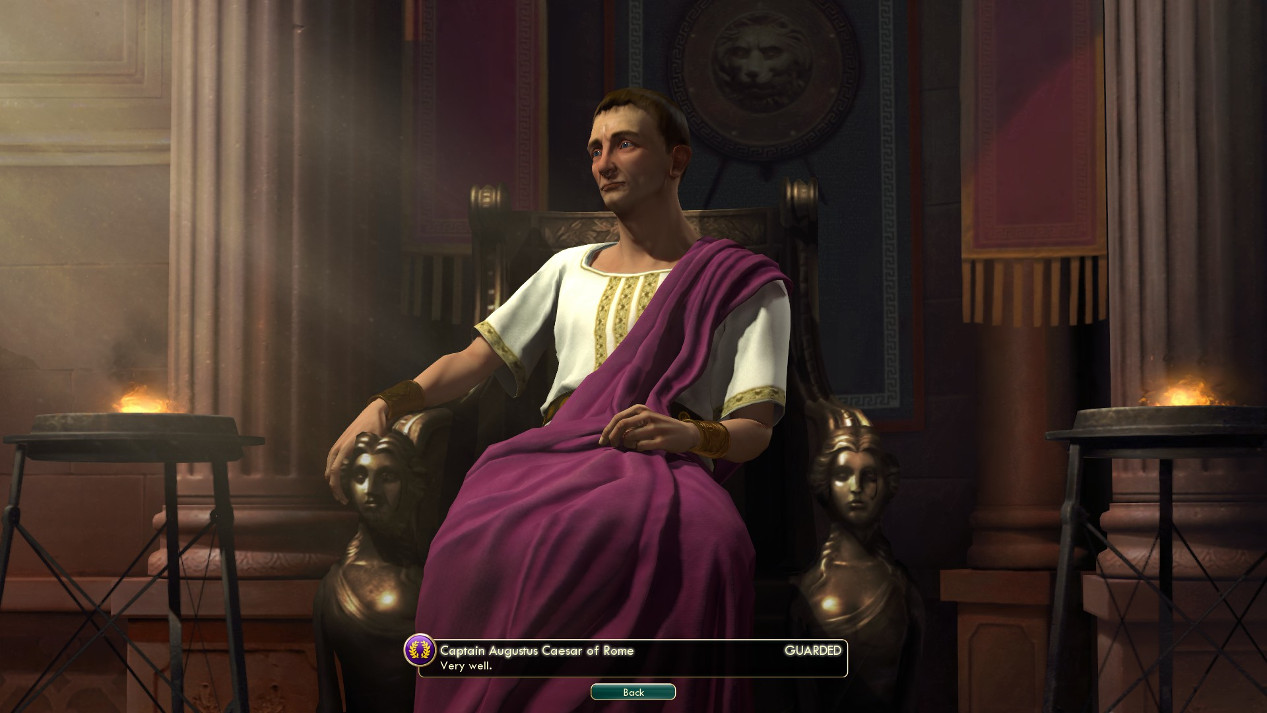 He slides back into his chair, his posture considerably relaxed. He regards the President wearily. “After all this, there is just one message I was hoping to give you.” The President turns her attention to the Roman, and he suddenly surges forward, brandishing a knife. 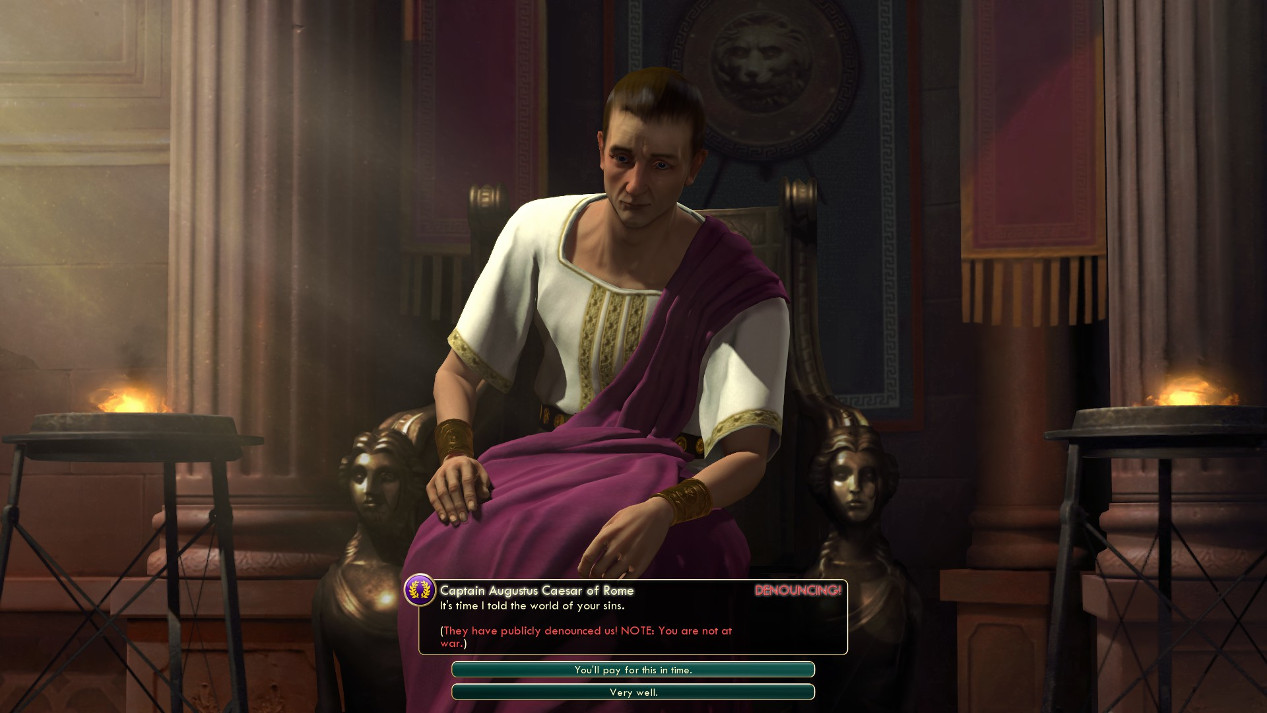 Almeida’s reaction is immediate, and his pistol shot strikes the Roman squarely in the leg. The ex-emperor falls, wincing visibly, but does not betray any cries of pain. The rest of the Portuguese entourage carts him away, and Salazar wryly notes that the Roman’s habit of remaining seated for discussions is henceforth no longer due to his choice. 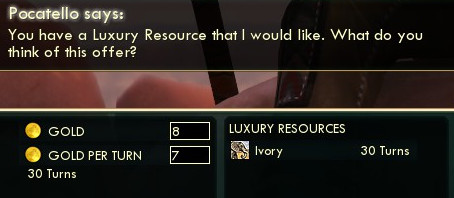 Pocatello still makes a generous offer considering his treatment at the hands of the Portuguese, and for their part, the Portuguese accept favourable deals on principle above diplomatic finger-wagging. 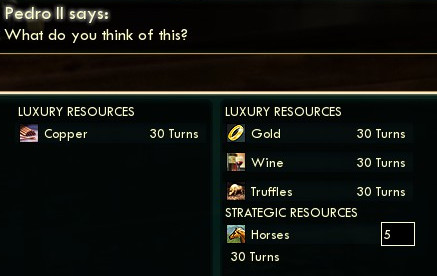 Pedro receives a much more favourable deal for his last remaining stockpile of Copper. 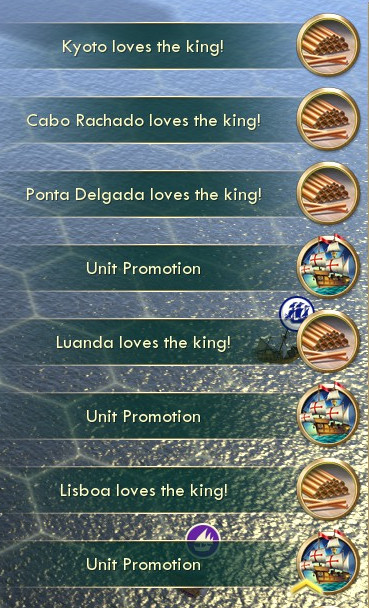 The people of Portugal are ecstatic for the opportunity to work with this strange new metal.  Yet, as it must always, there remains a sense that somehow, the best years for the Portuguese people are behind them. Such is Fado. Well, sorry for taking so long with this update, but in the hopes of making it up to you, I would like to propose that we mix things up a bit on the front of determining what happens next. For now until Saturday at 9 PM Eastern time, please feel free to suggest any measure that I should undertake going forward for the next update. Whether it be a change to the research plan, a diplomatic measure, a war declaration, a construction project, whatever. Name it, and I will do my utmost to not only implement it into the game, but integrate it into the narrative. However, to ensure that the ideas in question ensure some consistent popularity, the only rule is that two people must agree on the course of action for it to become reality. If the thing gets two votes, it is in, but only if it gets two votes. Maria still has some crazy in her yet, after all. Até Sabado!
|
|
|
|
ModeWondershot posted:We are, of course, going to dedicate a significant portion of our continent-spanning empire's production to this project, in the hopes of cinching Gold. Well, I think you dedicated enough. At least you didn't have to wait forever, and only Dandolo even managed to pull bronze. Although, you could go a step further in your description here. Portugal isn't a continent-spanning empire. For some time now it's been globe-spanning, an empire upon which the sun never sets. Now, unless I'm mistaken, it looks like the world congress is still in the renaissance era. Let's push towards Radio on the tech tree, which will advance the congress to the industrial era and give us an additional vote for each of our city state allies, on top of unlocking hydro plants, police stations, and broadcast towers along the way. e: Oh yeah, and Radio also unlocks World Ideology. I'll second AlphaKretin's proposal below to try to get Freedom as the World Ideology at the next opportunity, for narrative reasons. Montegoraon fucked around with this message at 15:31 on Jun 17, 2016 |
|
|
|
I am seconding the push for Radio. Narratively, it's pretty important to have a better means of global communication! Well, it would be, if the President didn't have her magic visions.
|
|
|
|
Radio is cool. I forget does anyone else have an ideology yet? I always love to push mine as world before anyone objects, and Maria forcing freedom kinda fits narratively.
|
|
|
|
Make Freedom the World Ideology, as a good idea. It fits in with the ideals of Portugal. But so does trade. The world runs on the backs of Portuguese shipping, and must continue to be the center of Portuguese life. Try to get every luxury good available in the game to show how good our trade lanes really are.
|
|
|
|
I also vote for Freedom for Everybody. By acclaim if possible, by force if necessary.
|
|
|
|
I'd like to suggest you start no more wars for the rest of the game, but be willing to make defensive pacts. The will of Sebastio is that we all live in harmony, and the only ones who are to be pnished are those who would threaten that, after all.
|
|
|
|
Valgaav posted:I'd like to suggest you start no more wars for the rest of the game, but be willing to make defensive pacts. The will of Sebastio is that we all live in harmony, and the only ones who are to be pnished are those who would threaten that, after all. I'm going to throw my support behind this.
|
|
|
|
I'd suggest rescinding imperialism by returning cities to their native Civs. I'd say start no later then we get Radio, but as soon as possible. I think we've made our point.
|
|
|
|
Added Space posted:I'd suggest rescinding imperialism by returning cities to their native Civs. I'd say start no later then we get Radio, but as soon as possible. I think we've made our point. No. We're dominant right now, but it's still a loooong time until diplomatic victory becomes possible. Rome and Japan will absolutely start trouble we don't need if we let them. Although, just out of curiosity, what does our tourism game look like right now?
|
|
|
|
I too like pushing towards Radio and making Freedom the World Ideology before anyone even has an Ideology. But we cannot take war off the table. For the rest of the world, conquest in the name of the opposition being weaker is still viewed as valid, and no value is placed on the sovereign rights of the people. We conquer the Romans because they have proved themselves unwilling to partake in the new paradigm - and we cannot know if Brazil, the Shoshone, or Venice would do the same or not.
|
|
|
|
I'd say we continue pushing towards declaring Sebastianism the World Religion before World ideology.
|
|
|
|
Xelkelvos posted:I'd say we continue pushing towards declaring Sebastianism the World Religion before World ideology. World Ideology is better for us. We don't really need the tourism bump from World Religion. Besides, I don't think we could pull that off very easily. Too much of the world is Confucian, or generally not Sebastian.
|
|
|
|
Montegoraon posted:No. We're dominant right now, but it's still a loooong time until diplomatic victory becomes possible. Rome and Japan will absolutely start trouble we don't need if we let them. Montegoraon posted:World Ideology is better for us. We don't really need the tourism bump from World Religion. Besides, I don't think we could pull that off very easily. Too much of the world is Confucian, or generally not Sebastian. ModeWondershot posted:The Difficulty basically determines whether you or the AI opponents have any advantages from the game start. Prince difficulty just means that the player and the AI opponents all have almost exactly the same number of units and resources at game start, meaning that advantage is skewed slightly towards the player as the AI generally does not play as well as a human with some idea of what they are doing. However, as I will be taking orders from the thread for certain actions and behaviours, I think this should put everyone in this game on equal footing. It seems inappropriate to try to play this game 'correctly' considering the OP's own reasoning. And besides, Maria Theresa wasn't the most stable of rulers even in her own time. So I'm going to vote a blanket No to all suggestions based on the metagame, if no-votes are a thing.
|
|
|
|

|
| # ? Apr 25, 2024 20:03 |
|
Thanks for the votes, all. The breakdown of necessary actions will be as follows: 1. Rush Radio. 2. Make World Ideology: Freedom happen. 3. No more initiating wars, but act on legitimate defensive pacts when necessary. Additionally, we will revisit issues such as returning of foreign cities to former owners in the future, if, for instance, Venice or Byzantium foolishly attempt to conquer Brazil on a whim. Update to follow.
|
|
|








